
|
TORAH PORTIONS
wrty
YITHRO (Jethro)
Exodus 18:1-20:26
There are 50 Aleph-Tavs in this week's Torah portion
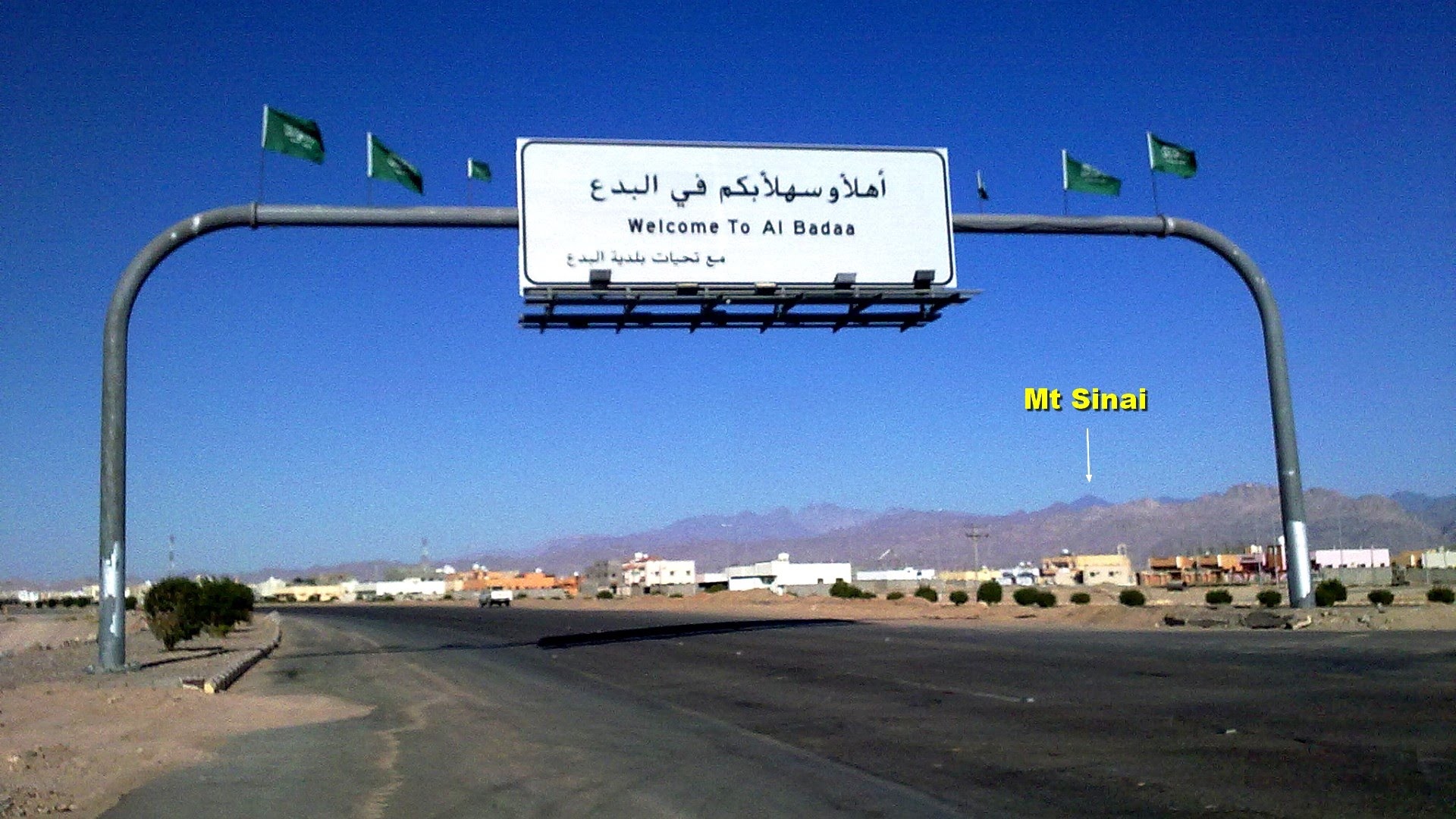
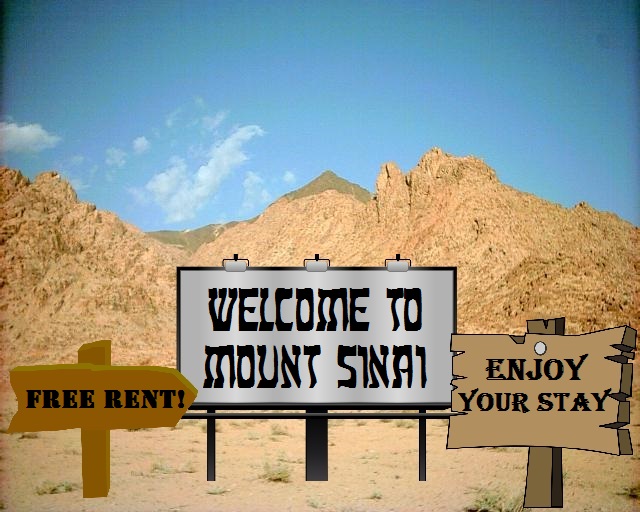
Note: you will need the oldheb.ttf (old Hebrew) and the SGreek Mediuim fonts to see the Hebrew and Greek text, as well as the three English fonts: Cooper Black, Impact and Frontlight MT Light. Right click the links and choose "Save Target As". Then go to the file, and either right click them and choose "install", or drag them into the font page.
oldheb.ttf
SGreek Medium
Cooper Black
Impact
Frontlight MT Light
NOTE: All of the yous and yours underlined as "you" and "your" indicates that the you and the your are plural. Also any of the words that are in bold pink lettering as "you" refers to the feminine gender, but it is only applied when it does not commonly refer to a woman. This only is applied to this week's Torah portion text at this time.
CHAPTER 18
Exodus 18:1-27
Exo 18:1 And Jethro, priest of Midian, father-in-law of Moses, heard of ta all which Elohim did for Moses and for Israel, his people, for hwhy had brought out ta-Israel from Egypt; 2 And Jethro, father-in-law of Moses, took ta-Zipporah, woman (wife) of Moses, after sending her away, 3 and ta her two sons; which the name of the one was Gershom; for had said, I have become a sojourner (stranger) in a foreign land: 4 And the name of the one was Eliezer; for the Elohim of my father was among my help, and delivered me from the sword of Pharaoh:
5 And Jethro, father-in-law of Moses, and his sons, and his woman (wife), came to Moses to the wilderness which he camped there at the Mountain of The Elohim: 6 And said to Moses, I, your father-in-law, Jethro, have come to you, and your woman (wife), and her two sons with her. 7 And Moses went out to encounter meet (encounter) his father-in-law, and bowed, and kissed to him; and they asked a man for the peace (welfare) to his neighbor; And they came to the tent.
8 And Moses accounted (enumerated, enrolled, scrolled, numbered) to his father-in-law ta all whch hwhy did to Pharaoh and to Egypt upon the occasions (sake, concern, pokings) of Israel, and ta all of the weariness (trouble, travail, distress) which had found them among the way, and hwhy delivered them. 9 And Jethro was joined (united?) over (upon) all of the goodness which hwhy had done to Israel which He had delivered from the hand of Egypt. 10 And Jethro said, Blessed be hwhy which has delivered you from the hand of Egypt and from the hand of Pharaoh which delivered ta-the People from under the hand of Egypt. 11 Now I know for hwhy is greater than all of the elohim: For in the word which they were proud upon (over, above) them. 12 And Jethro, father-in-law of Moses, took an Elevation Offering (Ascension Offering, Burnt Offering) and Sacrifices to Elohim: And Aaron and all of the Elders of Israel came to eat bread with the father-in-law of Moses to the face of The Elohim.
13 And was from the morrow, and Moses sat to judge (ordinate) ta-the People: and the People stood upon (over) Moses from the breaking period (morning) unto the mixing period (evening). 14 And the father-in-law of Moses saw ta all which he was doing to the People, and said, What is this word which you are doing to the people? Why were you sitting by your aloneness, and all of the people were standing upon (over) you from breaking period (morning) unto mixing period (evening)? 15 And Moses said to his father-in-law, For the People have come to me to seek (inquire) Elohim: 16 For a word shall be to them, have come to me; and I judge (ordinate) between a man and between his neighbor, and I make known ta-the Statutes of The Elohim, and ta-His Teachings (Torahs).
17 And the father-in-law of Moses said to him, The word which you are doing is not good. 18 Wearing (Fainting), you will wear out (faint), also you, also this People which are with you: for the word is heavy with (from) you; You are not able to do him by your aloneness. 19 Now listen in my voice. I will counsel (consult, advise) you, and Elohim shall be with you: You will be for the People opposite (at the front of, a circumcision of) The Elohim, and you, you will bring ta-the words to The Elohim: 20 And you shall delegate (admonish, enlighten, warn) them ta-the Statutes and ta-the Teachings (Torahs), and you shall make known to them ta-the way they shall walk (go) in her and ta-the doings (work) which they should do. 21 And you, you shall provide (perceive, envision, gaze) from all of the People men of valor (valiance), revering (aweing, fearing) Elohim, men of truth, haters of gain (profit, covetousness, unjust gain); and you will set over (upon) them of princes of thousands, princes of hundreds, princes of fifties, and princes of tens: 22 And they will judge ta-the People in all times: And shall be, they shall bring (come) to you any of the great word, and any of the small word they, they shall judge (ordinate): And shall be easier (lighter) from upon yourself, and they shall bear (carry, lift up) with you. 23 If you do ta-this word, and Elohim commands you, and you shall be able at standing, and also all of this People shall go over (upon) their place in peace.
24 And Moses listened to the voice of his father-in-law, and did all which was said. 25 And Moses chose men of valor (valiance) from all of Israel, and gave them of heads over (upon) the People, of princes of Thousands, of princes of Hundreds, of princes of Fifties, and of princes of Tens. 26 And they judged (ordinated) ta-the People in all times: They brought to Moses ta-the hard (severe, fierce) word, and they judged (ordinated) themselves any of the small word. 27 And Moses sent away ta-his father-in-law; and went by himself to his land.
(NOTE: Not all verses will have comments)
Verses one through six
JETHRO AT MOUNT SINAI
FIRST DAY: DAYTIME
1 And Jethro, priest of Midian, father-in-law of Moses, heard of ta all which Elohim did for Moses and for Israel, his people, for hwhy had brought out ta-Israel from Egypt; 2 And Jethro, father-in-law of Moses, took ta-Zipporah, woman (wife) of Moses, after sending her away, 3 and ta her two sons; which the name of the one was Gershom; for had said, I have become a sojourner (stranger) in a foreign land: 4 And the name of the one was Eliezer; for the Elohim of my father was among my help, and delivered me from the sword of Pharaoh: 5 And Jethro, father-in-law of Moses, and his sons, and his woman (wife), came to Moses to the wilderness which he camped there at the Mountain of The Elohim: 6 And said to Moses, I, your father-in-law, Jethro, have come to you, and your woman (wife), and her two sons with her.
This is the first day of Jethro's arrival to Mount Sinai, and he heard of all that hwhy did for Moses. The word of Moses and the Israelites somehow reached to him, but it is not known when. There is no mention when in time Jethro met Moses at Mount Sinai. It is probable that it was the same day when Moses was told the People to prepare in three days before hwhy came down onto the mountain to speak the Ten Words (Commandments), which I will reveal later in this week's Torah portion.
Question: "When did Moses send his family back to Midian"? The best theory I can figure is based in the Torah portion of Sh'moth, in the book of Exodus
Exodus 4:24 And was on the way in the lodging place, and hwhy confronted (contacted, concurred) him, and sought the death of him [(at having him die)]. 25 And Zipporah, she took a sharp stone (flint stone, knife), and she cut off ta-the foreskin of her son, and she made touch (smitten) to his feet, and she said, For a bridegroom of bloods you are to me, 26 and forsook (slackened, ceased, abated) from him: Then said of her, A bridegroom of bloods for the circumcision.
This would have most likely been the location where Moses returned Zipporah and his two sons back to Jethro, or Zipporah self-volunteered to return with the children to Jethro. Either way, Zipporah returned at this archived account moment. Also, based on this account, it was probable that when they were at their home, when the son was born, Zipporah resented circumcising their son.
Anyone wondered how Zipporah knew to circumcise their son? Out of all those who circumcised, Zipporah was the only female to be recorded to do it. How did she know how to do it? There are a couple of possibilities:
Possibility Number One: Moses kept contacts with his Hebrew People during his life as a prince in Egypt, and somehow observed the circumcision acts of the newborn males. When he left for Midian, married Zipporah, and had their firstborn child, Gershom, Moses circumcised their son and explained it to Zipporah regarding the Covenant of Abraham. But when Eliezer was born, either Zipporah told him not to circumcise their son, or Moses didn't do it and was too lazy.
Possibility Number Two: When Moses went to Midian, married Zipporah and had their first child, Gershom, Zipporah's father, Reuel/Jethro, was a priest in Midian. Since Midian was a descendant of Abraham, through his third wife, Keturah, as noted earlier, Reuel/Jethro kept the Abrahamic Covenant of the Circumcision. Since he was priest in Midian, he would had most likely been the one in charge of the circumcision activities, and throughout the years. And Zipporah could have observed her father's circumcision ceremonies at times when she had free time and saw her father's act to do the circumcision rituals and knew how to do it through her observations.
Either way, Zipporah knew how to circumcise, and she did it to keep her husband alive. Afterwards she was really upset with him, that she decided to go back home and take their sons with her. How thinskinned she was.
Moses probably debated with Zipporah about the need to circumcise their son, but after talking, Moses gave in to his wife.
When Moses and his family arrived at the lodging place, the Messenger of hwhy pursued Moses to kill him, possibly for giving in to his wife. That was why Zipporah was angry with Moses and blamed him for forcing her hand to circumcise their son. Now thinking about it, this is the first and only time in Biblical history that a female did any circumcision on a male baby, because only the men did that.
After the issue with the circumcision of one of Moses' two sons, Moses and Zipporah might have had an argument, and Moses decided for his family for them to stay at the lodging place until his son recuperated from the circumcision and they returned to Jethro. Then afterward, hwhy told Aaron to meet Moses, which they did at Mount Sinai.
In verse three of this week's Torah portion passage, it says that Gershom and Eliezer were "her two sons". Why didn't it mention that they were also Moses' sons? In the account of the Sh'moth passage mentioned above, in the incident of Zipporah's act of circumcision, it also says "her son". It did not say "their son". In verse five of this week's Torah portion passage, it states that Jethro came with "his sons", meaning Moses' sons. Then in verse six of this week's Torah portion passage, Jethro states to Moses' that the sons were "her sons". Why this alternations of "him" and "her"- more "her" than "him"? I don't have answer to that at this time.
Looking at the following words:
JETHRO
The Hebrew word for Jethro is "Yeeth-roh"- Yod, Tav, Resh, Vav (wrty). It is from Strong's Concordance number 3503, and its definition
From H3499 with pronominal suffix; his excellence; Jethro, Moses’ father in law: - Jethro. Compare H3500.
from 3499 "yeh-thehr" (rty), and its defintion
Properly an overhanging, that is, (by implication) an excess, superiority, remainder; also a small rope (as hanging free): - + abundant, cord, exceeding, excellency (-ent), what they leave, that hath left, plentifully, remnant, residue, rest, string, with.
Jethro, in this relevence, means "remnant", meaning hwhy brought out "his remnant" from Egypt.
ZIPPORAH
The Hebrew word for Zipporah is "Tseep-poh-rah"- Tsade, Peh, Resh, Heh (hrpu). It is from Strong's Concordance number 6855, and its defintion
Feminine of H6833; bird; tsipporah, Moses’ wife: - Zipporah.
from 6833 "tseep-pohr" (rpu), and its definition
From H6852; a little bird (as hopping): - bird, fowl, sparrow.
from 6852 "tsah-phahr" (rpu), and its definition
A primitive root; to skip about, that is, return: - depart early.
Zipporah means "bird", but it also translates "return" which Zipporah "returned" to Moses at Mount Sinai.
GERSHOM
The Hebrew word for Gershom is "Geyr-shohm"- Gimel, Resh, Shin, Mem Sophit (Msrg). It is from Strong's Concordance number 1647, and its definition
For H1648; Gereshom, the name of four Israelites: - Gershom.
from 1648, "geyr-shohm" (Mwsrg), and its definition
From H1644; a refugee; Gereshon or Gereshom, an Israelite: - Gershon, Gershom.
from 1644 "gah-rash" (srg), and its definition
A primitive root; to drive out from a possession; especially to expatriate or divorce: - cast up (out), divorced (woman), drive away (forth, out), expel, X surely put away, trouble, thrust out.
Gershom means "stranger".
ELIEZER
The Hebrew word for Eliezer is "Eh-lee-eh-zehr"- Aleph, Lamed, Yod, Ayin, Zayin, Resh (rzeyla). It is from Strong's Concordance number 461, and its definition
From H410 and H5828; God of help; Eliezer, the name of a Damascene and of ten Israelites: - Eliezer.
El
Go to Reuel's name above to get the definition
El means "El".
Ezer
from 5828 "ey-zehr" (rze), and its definition
From H5826; aid: - help.
from 5826 "ah-zahr" (rze), and its definition
A primitive root; to surround, that is, protect or aid: - help, succour.
Ezer means "help".
Eliezer means "El is My Help".
Putting the meaning of the three names together including Moses, meaning "drawn out", and Jethro, this could be put into a phrase:
"The remnant are departed early by the returning refugee, who is the El of my help"
The "Returning Refugee" is Yeshua, who will draw us, the remnant, out from the judgment of this world, and He will have us depart early to be with Him, which is based in the apostle Paul's letter to the assembly in Thessalonica
1 Thessalonians 4:13 But I would not have you to be ignorant, brethren, concerning them which are asleep, that ye sorrow not, even as others which have no hope. 14 For if we believe that Yeshua died and rose again, even so them also which sleep in Yeshua will the Adon bring with him. 15 For this we say unto you by the Word of the Adon, that we which are alive and remain unto the coming of the Adon shall not prevent them which are asleep. 16 For the Adon himself shall descend from the Heavens with a shout, with the voice of the archangel, and with the Shofar (Trump) of hwhy: and the dead in Messiah shall rise first: 17 Then we which are alive and remain shall be caught up together with them in the clouds, to meet the Adon in the air: and so shall we ever be with the Adon. 18 Wherefore comfort one another with these words.
There is a pattern in Moses sons' names and meanings. Moses firstborn, Gershom, represents Moses' life as a sojourner in the land, and his second born, Eliezer, represents Moses looking to El is my help. Notice that the first son is more or less a negative meaning and the second born is a positive meaning.
In comparison, there is another account of a father bearing two sons with the similar matters and patterns, which is noted in the Torah portion of Mikeyts, in the book of Genesis
Genesis 41:50 And to Joseph were birthed two sons, before she came the years of the famine, which Asenath, daughter of Poti Pherah, Priest of On, birthed her to him. 51 And Joseph called ta-the name of the firstborn, Manasseh: For Elohim made me forget ta-all of my toil (worries, weariness), and ta all of the house of my father. 52 And called ta the name of the second, Ephraim: For Elohim has fructified me in the land of my affliction.
Joseph's first born's name Manasseh, meaning to forget, was more or less a negative meaning, and his second born son, Ephraim, meaning fruitful, is a positive meaning, just like the matters and patterns of Moses' sons.
Verse seven
7 And Moses went out to encounter meet (encounter) his father-in-law, and bowed, and kissed to him; and they asked a man for the peace (welfare) to his neighbor; And they came to the tent.
Uh, what about Moses' wife and sons? Why didn't he ask them of their welfare? Why didn't Moses kiss his wife and his sons? Didn't Moses care about his children? Was there a disconnect between he and his sons? It was not as if Moses was away for many years, for it was approximately, at most, one year since he last saw them. There must have still been a riff between Moses and Zipporah that still was not settled regarding the circumcision account.
Verse eight
8 And Moses accounted (enumerated, enrolled, scrolled, numbered) to his father-in-law ta all whch hwhy did to Pharaoh and to Egypt upon the occasions (sake, concern, pokings) of Israel, and ta all of the weariness (trouble, travail, distress) which had found them among the way, and hwhy delivered them.
It is like Jacob telling Laban in Padan Aram saying that everything happened to him back in Hebron, which is noted in the Torah portion of Vay-Yeytsey, in the book of Genesis
Genesis 29:13 And was, as Laban heard ta-the hearing (report) of Jacob, son of his sister, and ran to meet (encounter) him, and embraced to him, and kissed to him, and brought him to his house. And accounted (recorded, enumerated, scrolled) to Laban ta all of these words.
It's all in the blabber mouthing family.
Verses nine through twelve
9 And Jethro was joined (united?) over (upon) all of the goodness which hwhy had done to Israel which He had delivered from the hand of Egypt. 10 And Jethro said, Blessed be hwhy which has delivered you from the hand of Egypt and from the hand of Pharaoh which delivered ta-the People from under the hand of Egypt. 11 Now I know for hwhy is greater than all of the elohim: For in the word which they were proud upon (over, above) them. 12 And Jethro, father-in-law of Moses, took an Elevation Offering (Ascension Offering, Burnt Offering) and Sacrifices to Elohim: And Aaron and all of the Elders of Israel came to eat bread with the father-in-law of Moses to the face of The Elohim.
Jethro recognized that hwhy is the Elohim from the stories he had heard from sources, and noted it to Moses. Jethro made an Elevation Offering to show his dedication and acknowledgment to hwhy, and fulfilled it through the Food Covenant by eating bread with Moses, Aaron and the Elders of Israel before hwhy. What a sight that must have been. This should be a scene for a movie in which directors should stick to the Biblical text.
Verse thirteen
JETHRO AT MOUNT SINAI
SECOND DAY: MORNING
13 And was from the morrow, and Moses sat to judge (ordinate) ta-the People: and the People stood upon (over) Moses from the breaking period (morning) unto the mixing period (evening).
Anyone want Moses' job? Moses took all of the day to hear case after case. How did he take a lunch break? By the end of this verse, it took the time line to the end of the second day of Jethro's visit.
Verses fourteen through sixteen
JETHRO AT MOUNT SINAI
THIRD DAY: EARLY DURING THE NIGHT
14 And the father-in-law of Moses saw ta all which he was doing to the People, and said, What is this word which you are doing to the people? Why were you sitting by your aloneness, and all of the people were standing upon (over) you from breaking period (morning) unto mixing period (evening)? 15 And Moses said to his father-in-law, For the People have come to me to seek (inquire) Elohim: 16 For a word shall be to them, have come to me; and I judge (ordinate) between a man and between his neighbor, and I make known ta-the Statutes of The Elohim, and ta-His Teachings (Torahs).
This is Jethro, being a true father to Moses, playing another role, and his role is based on the meanings of Jethro's name, which noted earlier means "excellence" and "superiority" regarding Moses' way of handling the matters toward the people all day long. It shows a side of Jethro that he cared about his son-in-law. I wished Zipporah would show that she cared for her husband as well.
Verses seventeen and eighteen
17 And the father-in-law of Moses said to him, The word which you are doing is not good. 18 Wearing (Fainting), you will wear out (faint), also you, also this People which are with you: for the word is heavy from (with) you; You are not able to do him by your aloneness.
This is Jethro's response in his role play based on the "excellence" of his observation toward Moses, which I will show in a moment.
In verse eighteen of this week's Torah portion passage, the phrase Jethro said to Moses
...for the word is heavy from (with) you;...
is the phrase Edward G. Robinson, playing Dathan in The Ten Commandments movie, said to Moses at Mount Sinai by saying "You take too much upon yourself". The script writer took Jethro's words and applied it to Dathan instead. Jethro should have sued Cecil B. DeMille for copyright infringment. :)
Notice that in verse eighteen of this week's Torah portion passage that the word "you" is bold in pink. In the Hebrew text, the you is in the feminine gender which tells us that Jethro, Moses' father-in-law, was speaking to Moses' "soul", in which the soul, whether of a man or of a woman is "feminine".
Verses nineteen and twenty
19 Now listen in my voice. I will counsel (consult, advise) you, and Elohim shall be with you: You will be for the People opposite (at the front of, a circumcision of) The Elohim, and you, you will bring ta-the words to The Elohim: 20 And you shall delegate (admonish, enlighten, warn) them ta-the Statutes and ta-the Teachings (Torahs), and you shall make known to them ta-the way they shall walk (go) in her and ta-the doings (work) which they should do.
Jethro continues with the other meaning of his name
Looking at the word JETHRO
The Hebrew word for Jethro is "Yeeth-roh"- Yod, Tav, Resh, Vav (wrty). It is from Strong's Concordance number 3503, and its definition
From H3499 with pronominal suffix; his excellence; Jethro, Moses’ father in law: - Jethro. Compare H3500.
from 3499 "yeh-thehr" (rty), and its defintion
Properly an overhanging, that is, (by implication) an excess, superiority, remainder; also a small rope (as hanging free): - + abundant, cord, exceeding, excellency (-ent), what they leave, that hath left, plentifully, remnant, residue, rest, string, with.
Jethro was giving his "excellence" and "superiority"- through his counsel to Moses.
The first Aleph-Tav is next to the phrase "the way". This phrase is noted in the Gospel of John
John 14:4 And whither I go ye know, and the way ye know. 5 Thomas saith unto him, Lord, we know not whither thou goest; and how can we know the way? 6 Yeshua saith unto him, I am the Way...
Yeshua revealed to them that He, the Aleph and the Tav, is "the Way".
The second Aleph-Tav is next to the phrase "the work". This phrase is also noted in the Gospel of John
John 4:34 Yeshua saith unto them, My Meat is to do the Will of Him that sent Me, and to finish His Work.
John 6:29 Yeshua answered and said unto them, This is the Work of hwhy, that ye believe on Him whom He hath sent.
John 9:4 I must work the Works of Him that sent Me, while it is day: the night cometh, when no man can work.
John 17:4 I have glorified Thee on the earth: I have finished the Work which Thou gavest Me to do.
Yeshua is the Aleph and the Tav who is "the Work", which was "the Father's Work".
Also, in the first century, there is notion that the believers of Yeshua were called "Followers of The Way".
Notice that in verse nineteen of this week's Torah portion passage that the word "you" is bold in pink. In the Hebrew text, the you is in the feminine gender which tells us that Jethro was speaking to Moses' "soul", in which the soul, whether of a man or of a woman is "feminine". It means that Jethro is saying to Moses that Elohim will be with his "soul".
Verses twenty-one through twenty three
21 And you, you shall provide (perceive, envision, gaze) from all of the People men of valor (valiance), revering (aweing, fearing) Elohim, men of truth, haters of gain (profit, covetousness, unjust gain); and you will set over (upon) them of princes of thousands, princes of hundreds, princes of fifties, and princes of tens: 22 And they will judge ta-the People in all times: And shall be, they shall bring (come) to you any of the great word, and any of the small word they, they shall judge (ordinate): And shall be easier (lighter) from upon yourself, and they shall bear (carry, lift up) with you. 23 If you do ta-this word, and Elohim commands you, and you shall be able at standing, and also all of this People shall go over (upon) their place in peace.
In other words, Moses was to set different levels of authority to hear cases. This is just like the United States judicial system, or so it is supposed to be. Nevertheless, we have a local court, followed by a District or County Court, then a state court, then a Federal Circut court, and finally the Supreme Court. These U.S. courts were based on the rulers of thousands, hundreds, fifties and tens. It has been working that way, more or less, for a long time, until the U.S. went overboard with the system saying "We will take it all the way to the Supreme Court, no matter what the results are from the lower courts". This is an act of abuse of the Judicial system.
Indirectly related, this principle of the princes of thousands, hundreds, fifties and tens was used during Yeshua's life, which is noted in the Gospel of Mark
Mark 6:34 And Yeshua, when He came out, saw much people, and was moved with compassion toward them, because they were as sheep not having a shepherd: and He began to teach them many things. 35 And when the day was now far spent, His disciples came unto Him, and said, This is a desert place, and now the time is far passed: 36 Send them away, that they may go into the country round about, and into the villages, and buy themselves bread: for they have nothing to eat. 37 He answered and said unto them, Give ye them to eat. And they say unto Him, Shall we go and buy two hundred pennyworth of bread, and give them to eat? 38 He saith unto them, How many loaves have ye? Go and see. And when they knew, they say, Five, and two fishes. 39 And He commanded them to make all sit down by companies upon the green grass. 40 And they sat down in ranks, by hundreds, and by fifties. 41 And when He had taken the five loaves and the two fishes, He looked up to the heavens, and blessed, and brake the loaves, and gave them to His disciples to set before them; and the two fishes divided he among them all. 42 And they did all eat, and were filled. 43 And they took up twelve baskets full of the fragments, and of the fishes. 44 And they that did eat of the loaves were about five thousand men.
Yeshua honored the basis of Jethro's suggestion that Moses honored through separating the people into groups of hundreds and fifties.
Notice that in verse twenty two of this week's Torah portion passage that the word "you" is bold in pink. In the Hebrew text, the you is in the feminine gender which tells us that Jethro was speaking to Moses' "soul", in which the soul, whether of a man or of a woman is "feminine". What it tells us is Jethro was saying to Moses that the various rulers will bear Moses' "soul". We as believers in Yeshua are bearing Yeshua's "Soul" via the Ruakh HaKodesh (the Holy Spirit) in doing His Work.
!!!hwhy Kl dbk
Verses twenty four through twenty six
24 And Moses listened to the voice of his father-in-law, and did all which was said. 25 And Moses chose men of valor (valiance) from all of Israel, and gave them of heads over (upon) the People, of princes of Thousands, of princes of Hundreds, of princes of Fifties, and of princes of Tens. 26 And they judged (ordinated) ta-the People in all times: They brought to Moses ta-the hard (severe, fierce) word, and they judged (ordinated) themselves any of the small word.
There were two different matter later in the Torah of hard cases that came to Moses. One matter was the case of a father having no male heirs, which is noted in the Torah portion of Pinkhas, in the book of Numbers
Numbers 27:1 And the daughters of Zelophehad, son of Hepher, son of Gilead, son of Machir, son of Manasseh, of the family of Manasseh, son of Joseph, they came near: and these are the names of his daughters; Mahlah, Noah, and Hoglah, and Milcah, and Tirzah. 2 And they stood to the face of Moses, and to the face of Eleazar, the Priest, and to the face of the Rulers and all of the Congregation, at the Entrance of the Tent of Appointment, to say, 3 Our father died in the wilderness, and he was not in the midst of the Congregation that were appointed upon (over) hwhy in the congregation of Korah; that had died in his sin, and there were no sons to him. 4 To why should the name of our father be scraped away (shaved away) from the midst of his family, for was not to him a son?! Give to us a possession (seize) among the midst of the brothers of our father. 5 And Moses brought near ta-their charge (cause, custom issue) to the Face of hwhy. 6 And hwhy spoke to Moses, to say, 7 Thus the daughters of Zelophehad had spoken: Giving, you shall give to them a scraping (shaving) of an inheritance in the midst of the brothers of their father; and you shall have ta-the inheritance of their father go over to them. 8 And you shall speak to the Sons of Israel, to say, When a man shall die, and has not a son to him, And you shall have ta-his inheritance go over to his daughter. 9 And if has not a daughter to him, and you shall give ta-his inheritance to his brother. 10 And if has not to him brothers, and you shall give ta-his inheritance to the brother of his father. 11 And if have no brothers to his father, and you shall give ta-his inheritance to his relative that is near to him from his family, and shall possess her: and she shall be to the Sons of Israel for a Statute of Judgment, as the which hwhy commanded ta-Moses.
Another matter was a follow-up case regarding daughters being heirs of one tribe potentially marrying a man from another tribe and the tribe losing that part of the territory, which is noted in the Torah portion of Masei, in the book of Numbers
Numbers 36:1 And came near the heads of the fathers of the families of the sons of Gilead, son of Machir, son of Manasseh, from the families of the sons of Joseph, and they spoke to the face of Moses, and to the face of the Rulers, the Heads of the Fathers of the Sons of Israel: 2 and they said, hwhy commanded ta-my lord (master) to give ta-the land among an inheritance on the lot to the Sons of Israel: and my lord (master) was commanded on hwhy to give ta-the inheritance of Zelophehad, our brother, to his daughters. 3 And they shall be to one from the sons of the tribes of the Sons of Israel for wives, and their inheritance shall be scraped away (shaved away, removed) from the inheritance of our fathers, and shall be added upon the inheritance of the tribe which they shall belong to them: and our inheritance from the lot shall be scraped away (shaved away, removed). 4 And if the Jubilee shall be to the Sons of Israel, and their inheritance shall be added upon the inheritance of the tribe which they shall belong to them: and from the inheritance of the tribe of our fathers, their inheritance shall be scraped away (shaved away, removed). 5 And Moses commanded ta-the Sons of Israel upon (over) the Mouth of hwhy, to say, Thus, the tribe of the sons of Joseph speaks. 6 This is the Word which hwhy commanded to the daughters of Zelophehad, to say, For the goodness in their eyes, they shall surely (only) be wives to the family of the tribe of their father, they shall be for wives. 7 And she shall not circumvent (revolve) the inheritance of the Sons of Israel from tribe to tribe: for a man of the Sons of Israel shall cling on the inheritance of the tribe of his fathers, 8 and any daughter possessing an inheritance from the tribes of the Sons of Israel, she shall be for a wife to one from the families of the tribe of her father, by that, the Sons of Israel, they shall possess a man an inheritance of his fathers. 9 and she shall not circumvent (revolve) the inheritance from a tribe to another tribe, for the tribes of the Sons of Israel, they shall cling a man on his inheritance. 10 As the which hwhy commanded ta-Moses, so the daughters of Zelophehad, they did: 11 And Mahlah, Tirzah, and Hoglah, and Milcah, and Noah, the daughters of Zelophehad, they were for wives to the sons of their uncles (father brothers): 12 they were for wives with the families of the sons of Manasseh, son of Joseph. and she was their inheritance upon (over) the tribe of the family of their father. 13 These are the Commandments and the Judgments, which hwhy commanded on the hand of Moses to the Sons of Israel, in the plains (going overs) of Moab, upon Jordan at Jericho [(Jordan-Jericho)].
Verse twenty seven
JETHRO AT MOUNT SINAI
THIRD DAY: DURING THE EARLY MORNING
27 And Moses sent away ta-his father-in-law; and went by himself to his land.
Jethro stayed three days with Moses at Mount Sinai before returning to his land. As noted earlier, there is a strong probability that the duration of Jethro's stay with Moses was the same three days time that the Sons of Israel were told to sanctify themselves for the third day that hwhy was to come down on Mount Sinai, which I will note later.
At times, we in Messiah need some Jethros in our lives to give us some "experience" and expertise to better our lives, and make our lives easier, so that we don't wear ourselves out.
CHAPTER 19
Exodus 19:1-25
Exo 19:1 In the third renewed month, on this day to the going out of the Sons of Israel from the land of Egypt, they came at the Wilderness of Sinai. 2 And they journeyed (pulled up) from Rephidim, and they came at the Wilderness of Sinai, and they camped at the wilderness; and Israel camped there before (at the front of) the Mountain. 3 And Moses ascended her to The Elohim, and hwhy called to him from the mountain, to say, Thus you shall say to the House of Jacob, and you shall tell (declare) to the Sons of Israel; 4 You, you have seen which I did to Egypt, and I have bore (carried, lifted up) you upon wings of eagles, and I brought you to Me. 5 And now, if listening, you will listen in My Voice, and you will guard (keep, observe, heed) ta-My Covenant, and you shall be to Me a Special Treasure (Jewel, Peculiar Treasure) from all of the peoples: for all of the Earth belongs to Me: 6 And you, you shall be to Me a Kingdom of Priests, and a Sacred (Holy) Nation. These are the Words which you shall speak to the Sons of Israel.
7 And Moses came and called to the Elders of the People, and put (set) to their faces ta all of these Words which hwhy commanded him. 8 And all of the People, they answered together, and they said, All which hwhy has spoken we will do [(We will do all which hwhy has spoken)]. And Moses returned ta-the words of the People to hwhy.
9 And hwhy said to Moses, Behold, I will come to you in a Thick (Dense, Dark) Cloud in over (in order) that the People may hear in My speaking with you, and also in you, they may (will) believe Me for ages. And Moses told (declared) ta-the words of the People to hwhy.
10 And hwhy said to Moses, Go to the People, and you shall sanctify them the day (today) and tomorrow, and they shall trample wash their clothes, 11 And they will be ready (prepared, established) for the third day: for on the third day, hwhy will descend (go down) to the eyes of all of the People upon Mount Sinai. 12 And you shall border off (boundarize) ta-the People all around, to say, Guard (Keep, Observe, Watch, Take heed) to yourselves, at ascending on the Mountain, and touching on his edge: Anyone that touches on the Mountain, dying, shall die: 13 A hand, she shall not touch on him, for skullstoning (scullcasting, stoning), shall be skullstoned (scullcasted, stoned), or yara-shot, shall be yara-shot; if an animal, if an man, shall not live: In the long sound (extended sound, prolonging) of the Jubilee Horn (yovel-long blast, yovel horn), they shall ascend on the Mountain.
14 And Moses descended (went down) from the Mountain to the People, and sanctified ta-the People; and they trample washed their clothes. 15 And said to the People, Be ready (prepared, established) for three days: you shall not approach to a woman.
16 And was on the third day in being the breaking period (morning), and were sounds and lightnings, and a Heavy Cloud was upon (over) the Mountain, and the voice of a Shofar was much strong; and all of the People which were in the Camp shuddered (quaked, discomfited, trembled). 17 And Moses brought out ta-the People from the Camp to meet (encounter) The Elohim; and they stood on (among) the bottom [(on (among) under, on (among) below)] the Mountain. 18 And Mount Sinai was smoking, all of him, from the facing which hwhy descended (came down) upon (over) him in the Fire: and His Smoke ascended like the smoke of the smelting furnace, and all of the Mountain shuddered (quaked, discomfited, trembled) much. 19 And the sound of the Shofar was continuing (walking), and much strong. Moses spoke, and The Elohim answered him in a Voice. 20 And hwhy descended (came down) upon (over) Mount Sinai to the head of the Mountain: and hwhy called to Moses to the head of the Mountain; And Moses ascended.
21 And hwhy said to Moses, Descend (Go down), at the testifying (the witness, the warning) against the People, lest (facing) they pull (break through) to see to hwhy, and multiple of them will fall. 22 And also the Priests that are approaching to hwhy, they shall be sanctified, lest (facing) hwhy shall breach (burst forth, press forth) among them. 23 And Moses said to hwhy, The People are not able to ascend to Mount Sinai: for you, you had the testifying (witnessing, warning) against us, to say, border (boundarize) ta-the Mountain, and sanctify him. 24 And hwhy said to him, Go, descend (go down), and you shall ascend, you, and Aaron with you: and the Priests and the People, they shall not pull (break through) to ascend to hwhy, lest shall breach (burst forth, press forth) among themselves. 25 And Moses descended (went down) to the People, and spoke to them.
(NOTE: Not all verses will have comments)
Verses one and two
1 In the third renewed month, on this day to the going out of the Sons of Israel from the land of Egypt, they came at the Wilderness of Sinai. 2 And they journeyed (pulled up) from Rephidim, and they came at the Wilderness of Sinai, and they camped at the wilderness; and Israel camped there before (at the front of) the Mountain.
The Israelites finally arrived at Mount Sinai!!!
This is the traditional location of Mount Sinai in the Sinai Peninsula in Egypt
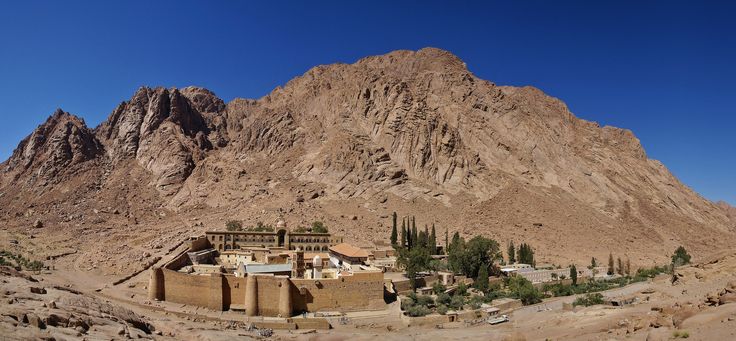
This is a general map showing the traditional location of Mount Sinai, circled in red
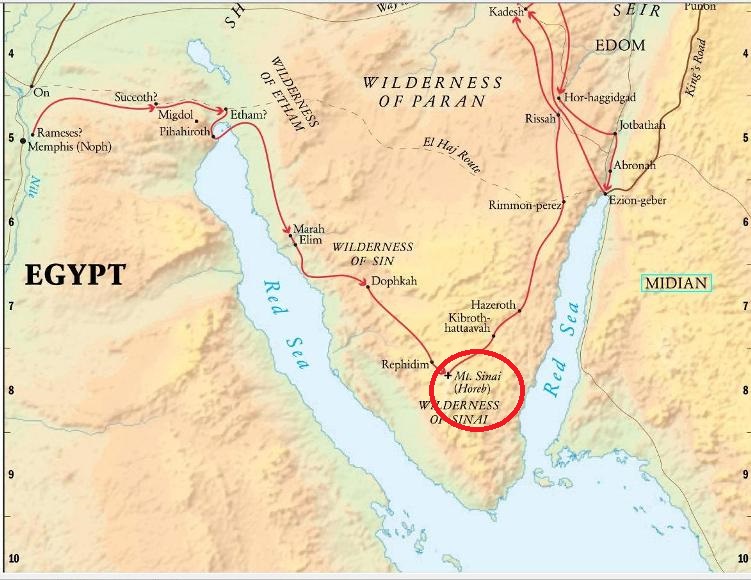
There is a problem with this location. The Sinai Peninsula was part of the ancient Egyptian Empire. This map image below, which was made for the time before 1400 BC, shows in pink the entire Egyptian Empire around the time of Moses, and it includes the Sinai Peninsula, highlighted in pink
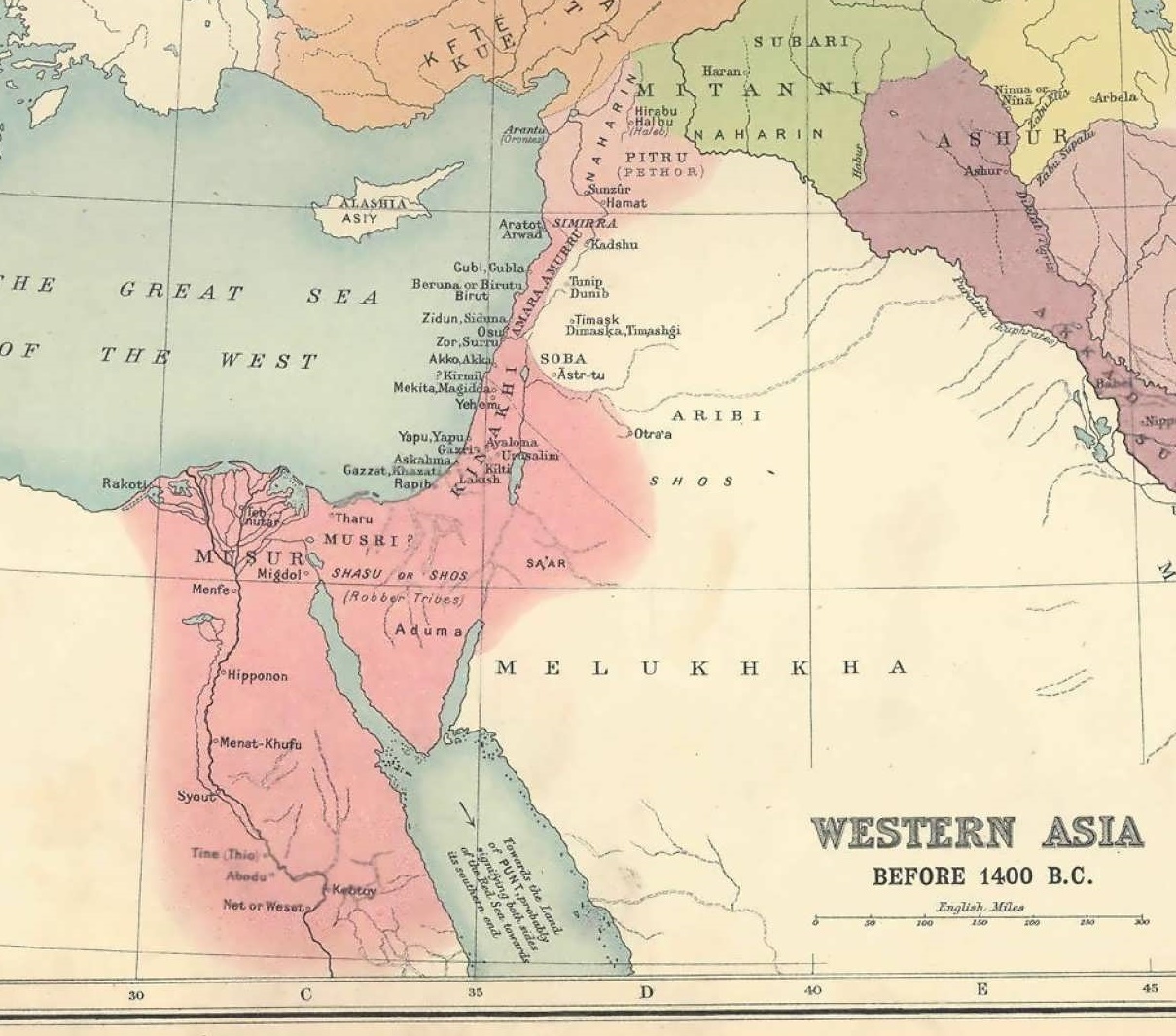
This is a close up revealing the ancient Egyptian empire, during the time of Moses, revealing that the ancient Egyptian empire ruled the traditional Sinai Peninsula territory, surrounded in black
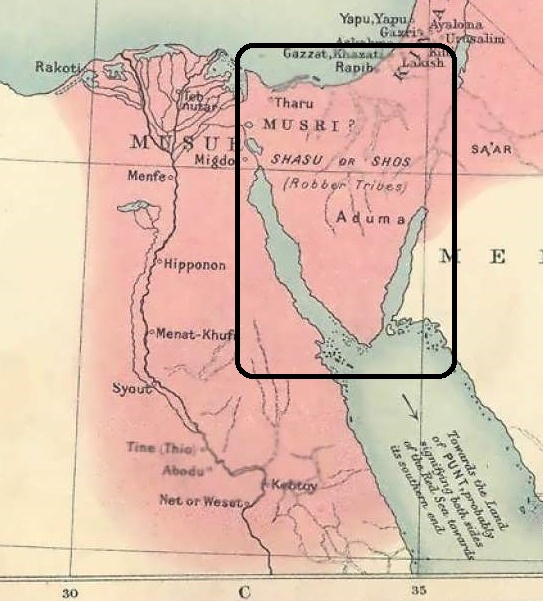
As I mentioned in my Passover/Feast of Unleavened Bread teaching of the Exodus, if they crossed over the Gulf of Suez, and landed at this location, considered the traditional Mount Sinai, they would still be in Egyptian territory. Egypt would have pursued the Israelites again with whatever force they can gather. Also looking at the mountain, there is nothing to consider that something happened up there. Looking at the previous map above, the land of Midian is located in modern northeastern Saudi Arabia, and as noted in the Torah portion of Sh'moth, in the book of Exodus, Moses saw the burning bush while tending sheep "in Midian". The traditional Mount Sinai location is not located in the Egytptian Sinai Peninsula.
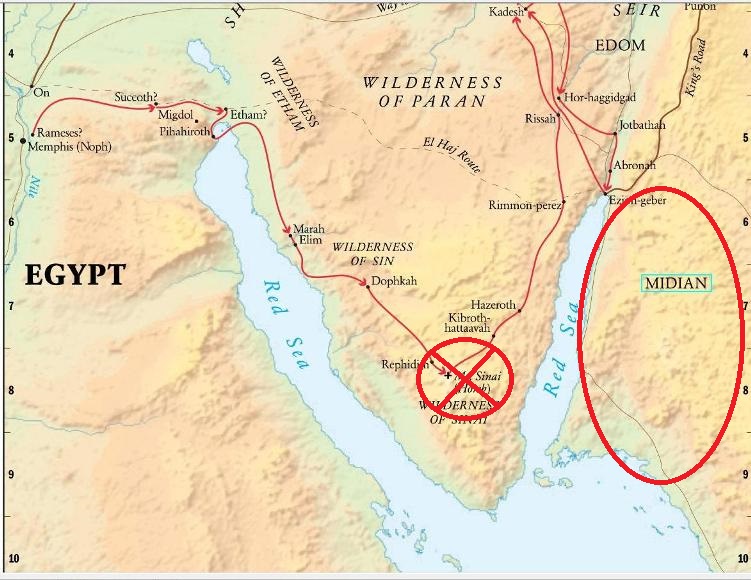
The apostle Paul confirmed this in his analogy, which is noted in his letter to the assembly in Galatia
Galatians 4:25 For this Agar is Mount Sinai in Arabia, and answereth to Jerusalem which now is, and is in bondage with her children.
This is the more probable route from Rameses to Mount Sinai at Jebel Al Lawz, in northeastern Saudi Arabia
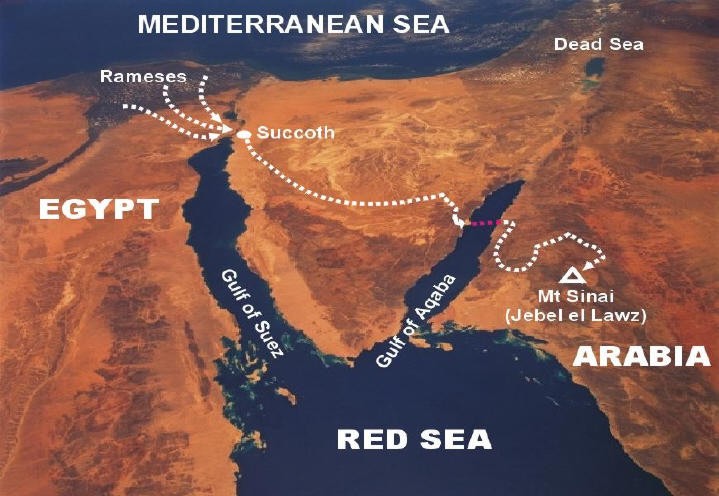
These are satellite images leading to the location of Mount Sinai, in Eastern Saudi Arabia
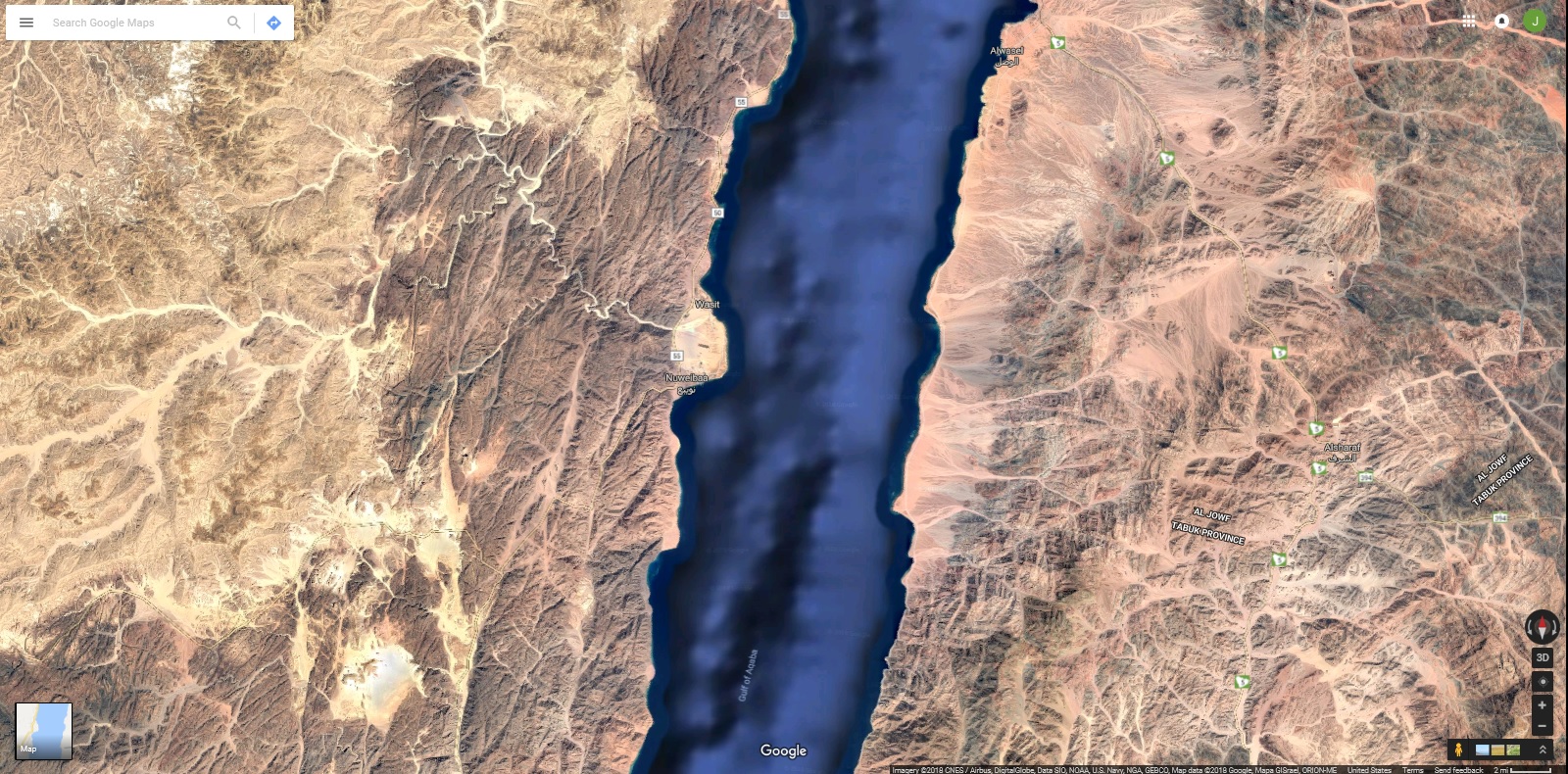
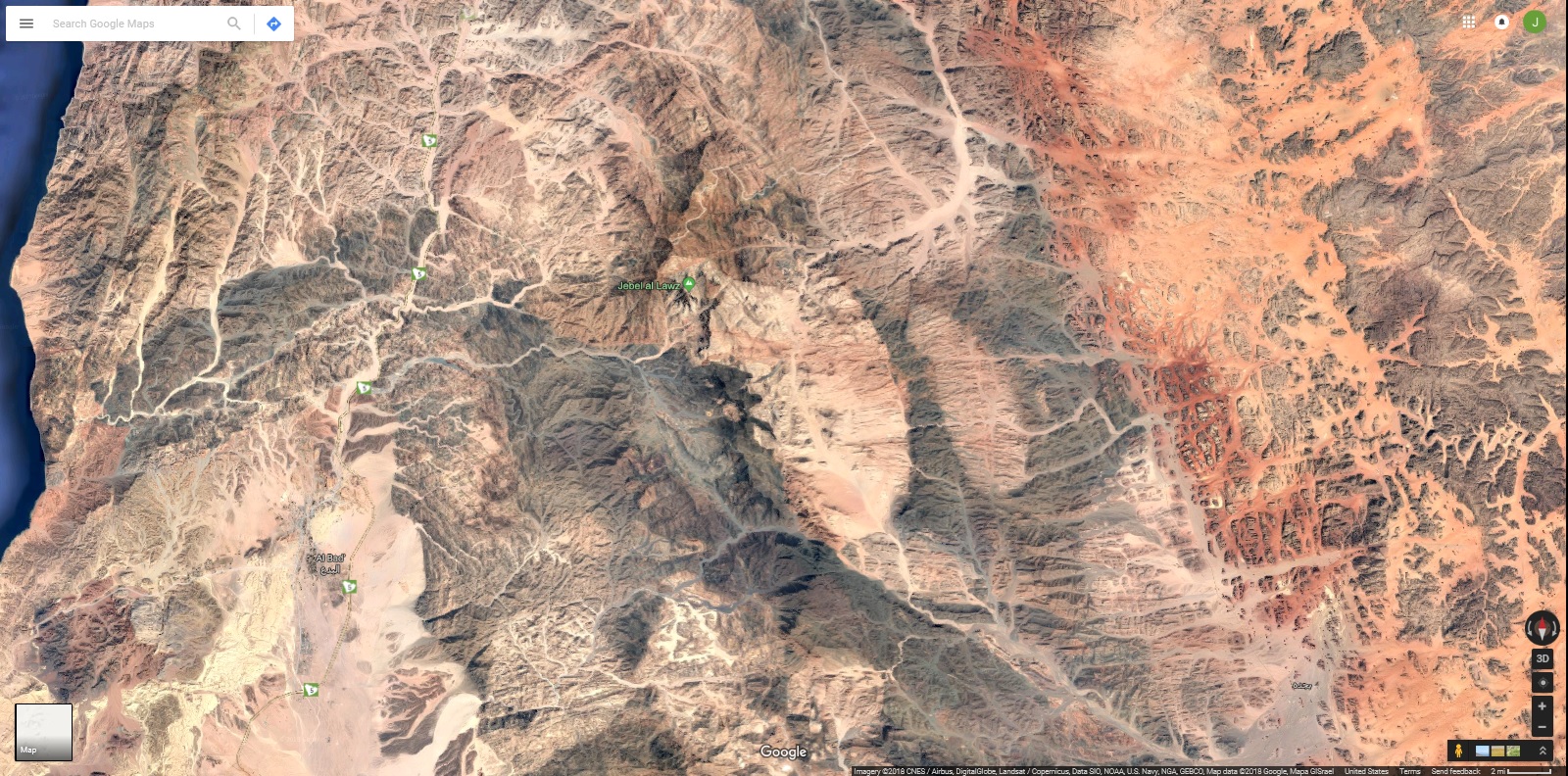
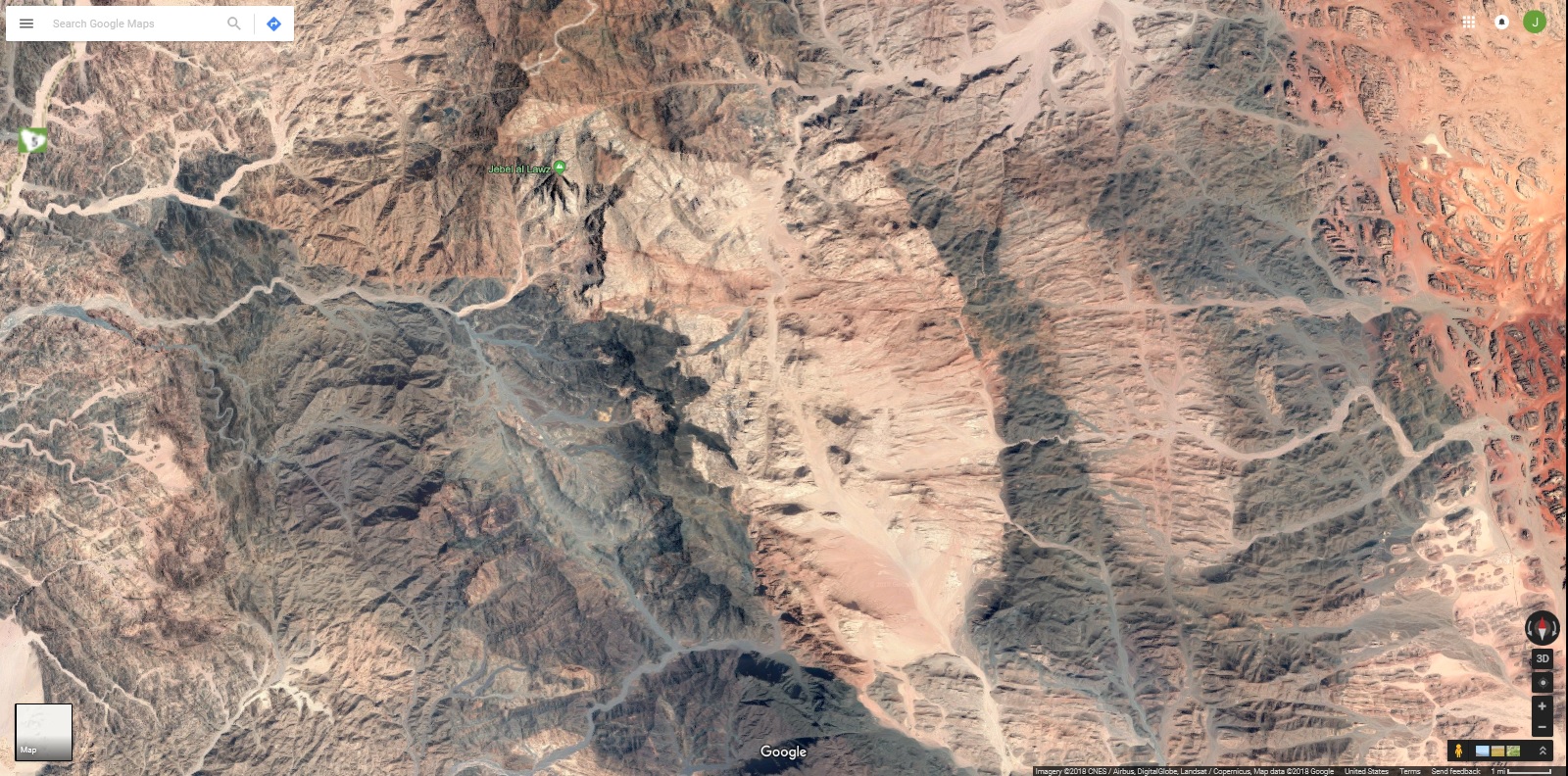
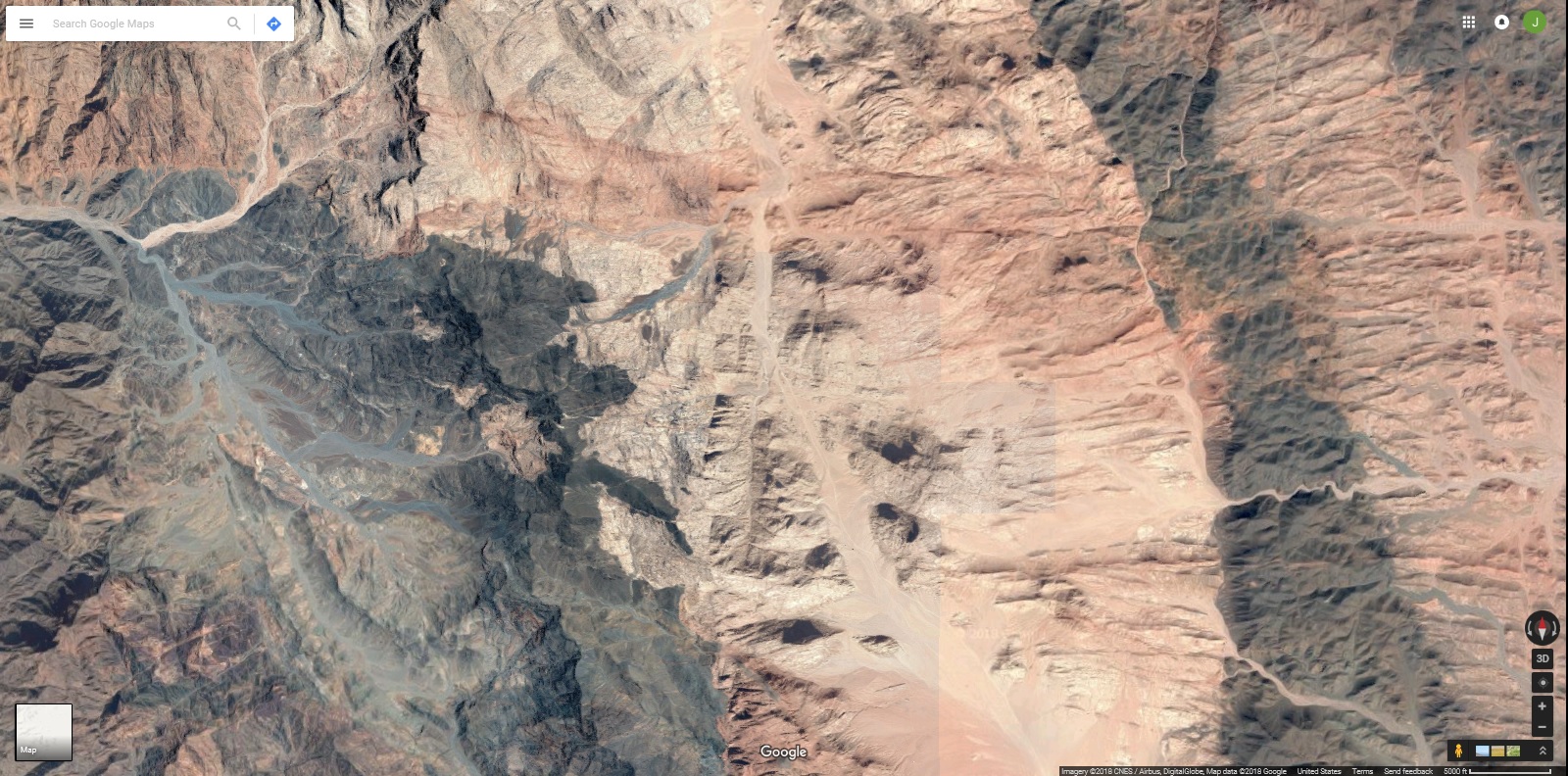
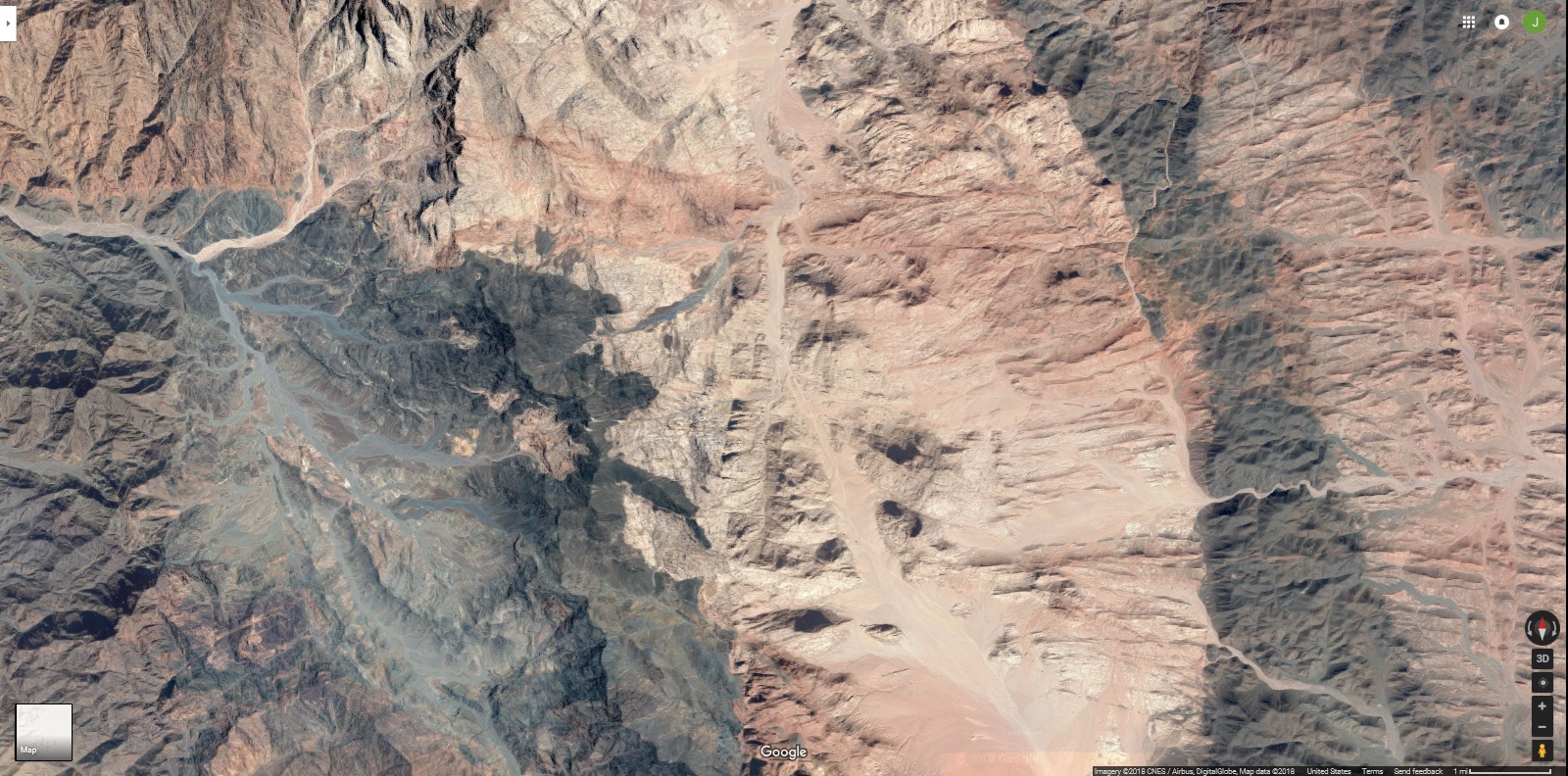
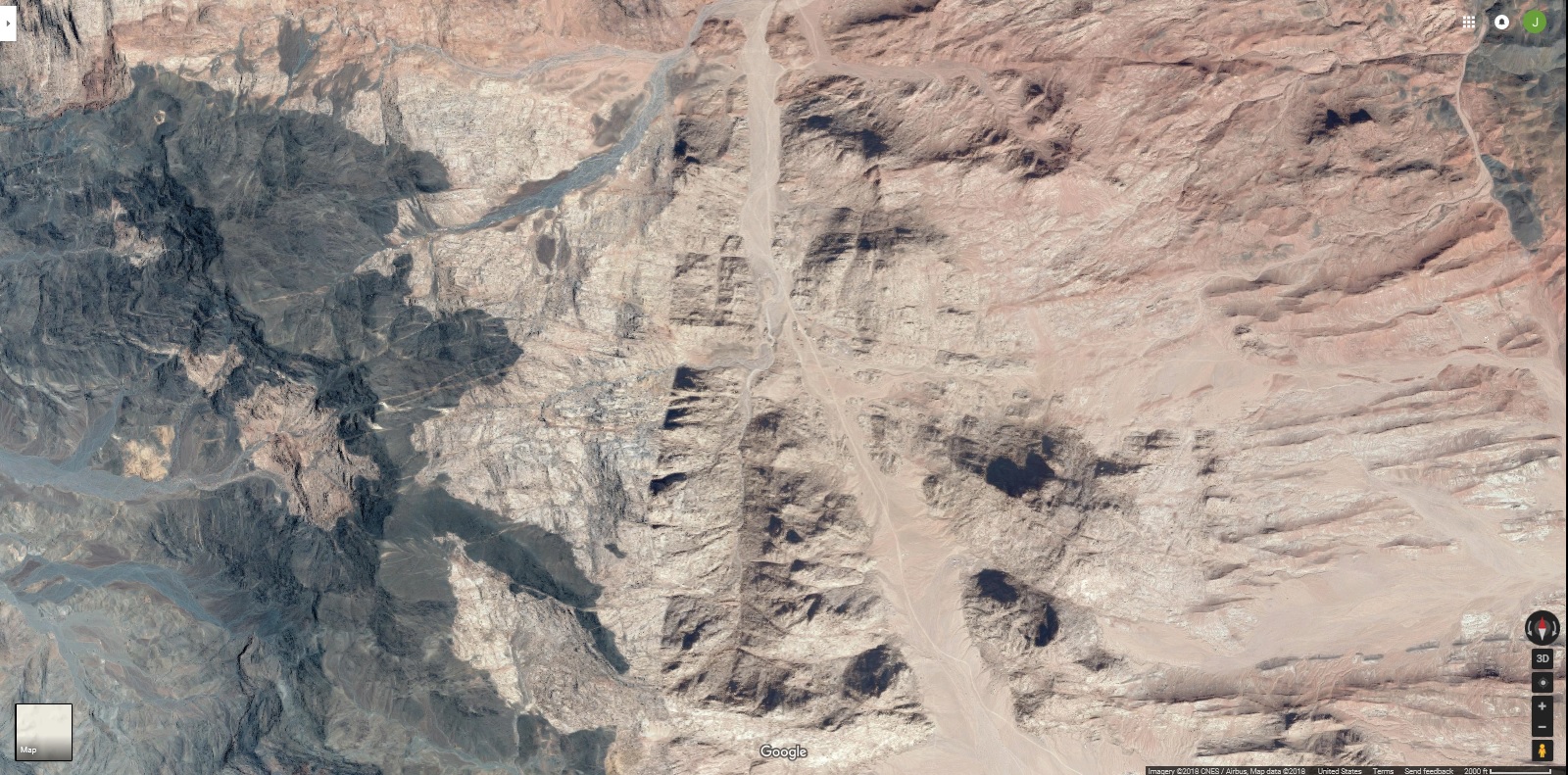
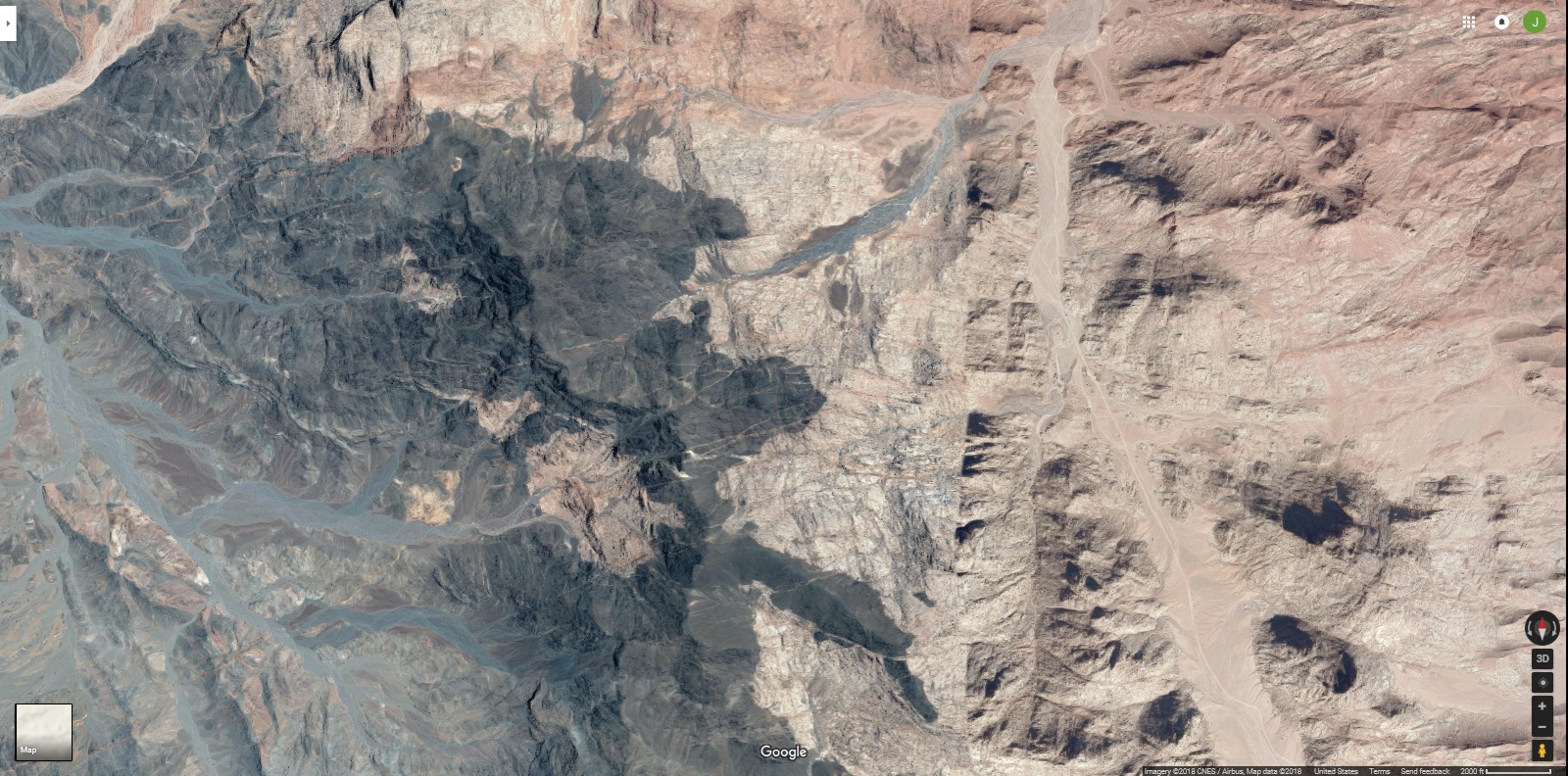
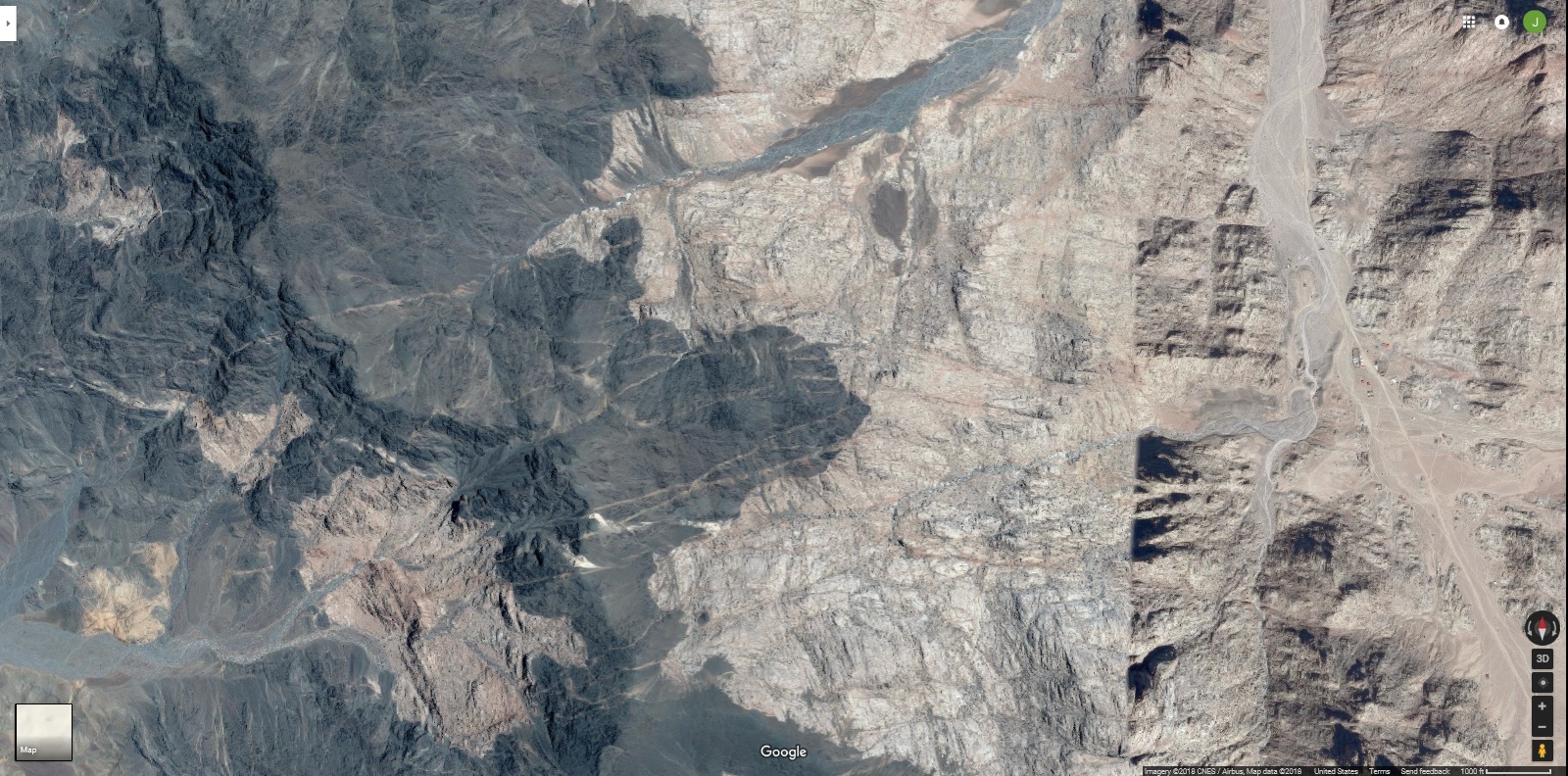
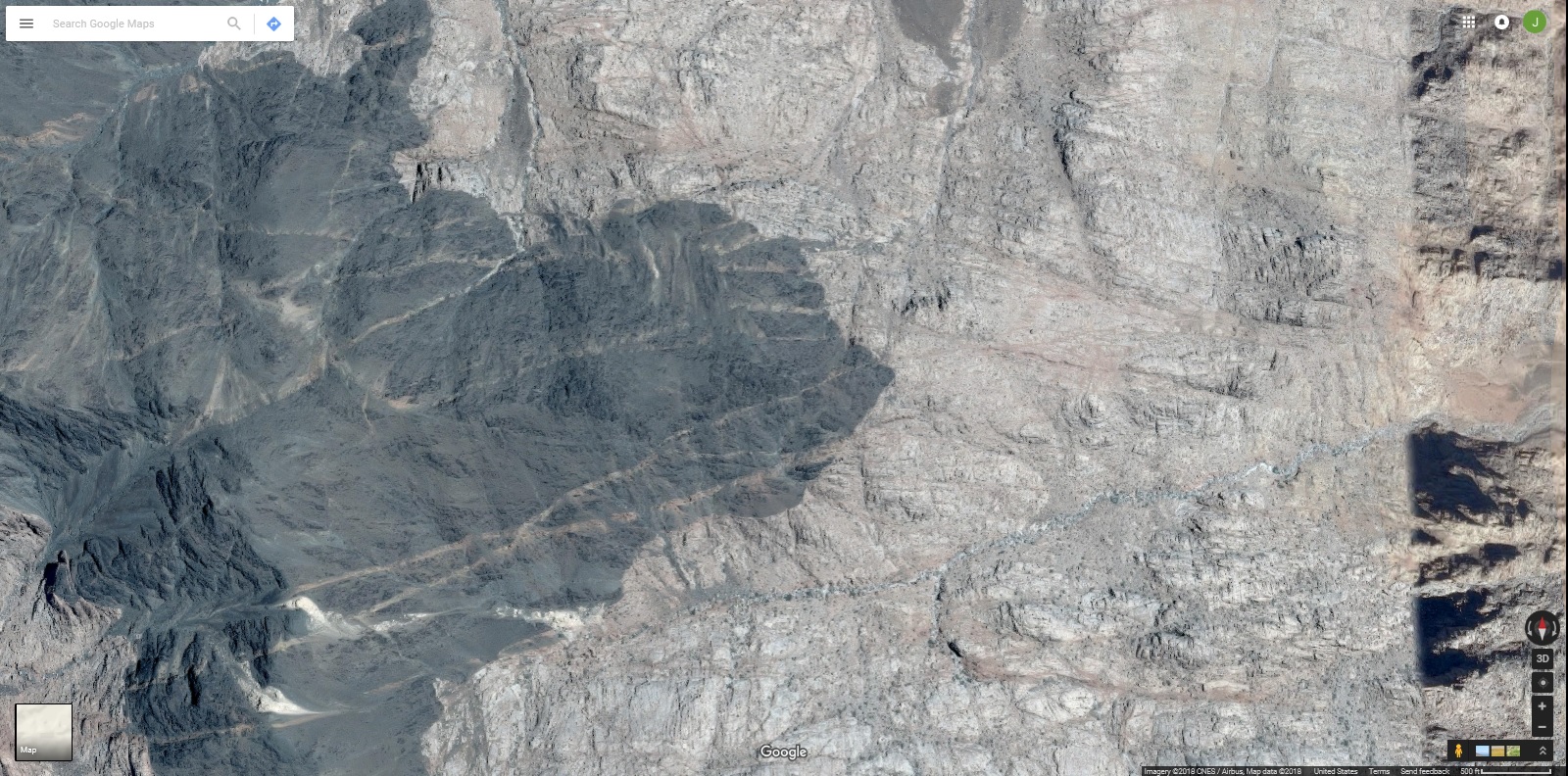
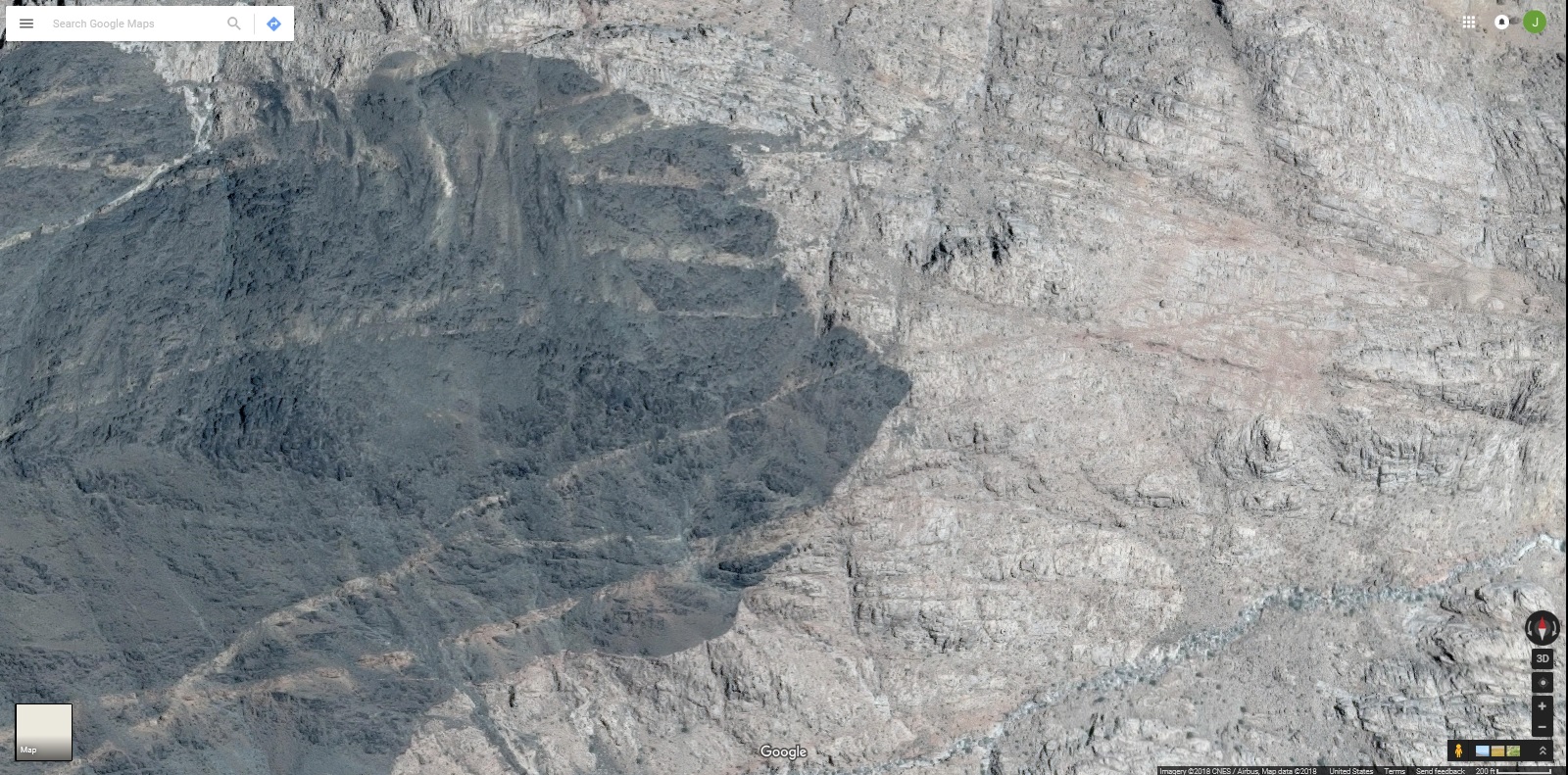
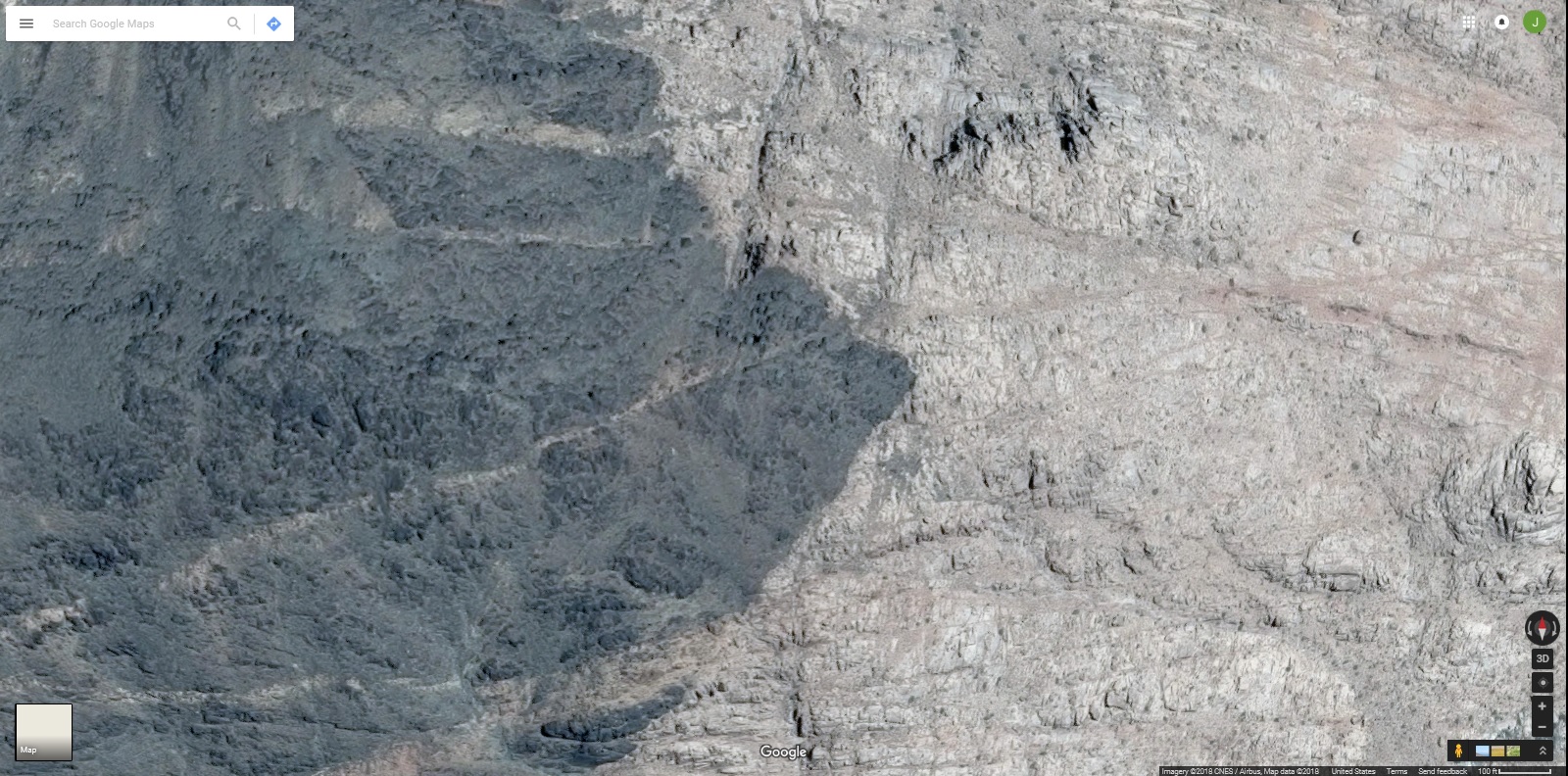
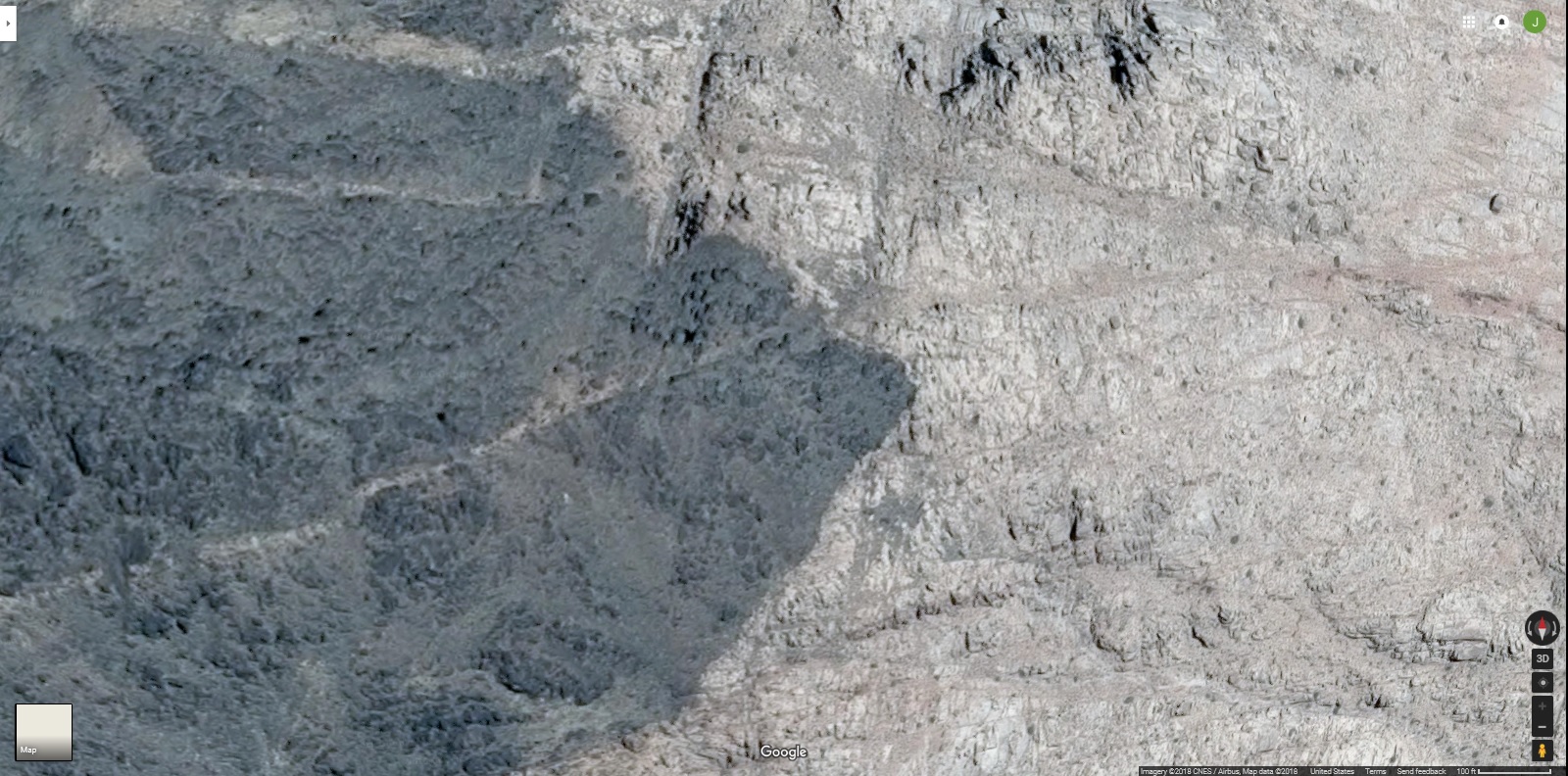
The late Ron Wyatt of The Wyatt Family Website and Ark Discovery International, and Jim and Penny Caldwell of Split Rock Research Foundation, and Rob Cornuke of Base Institute all agree that Mount Horeb is located in Midian, and is today in Saudi Arabia, and is known as Jebel al Lawz. The darkened top of the mountain is the area that hwhy came down and met Moses.
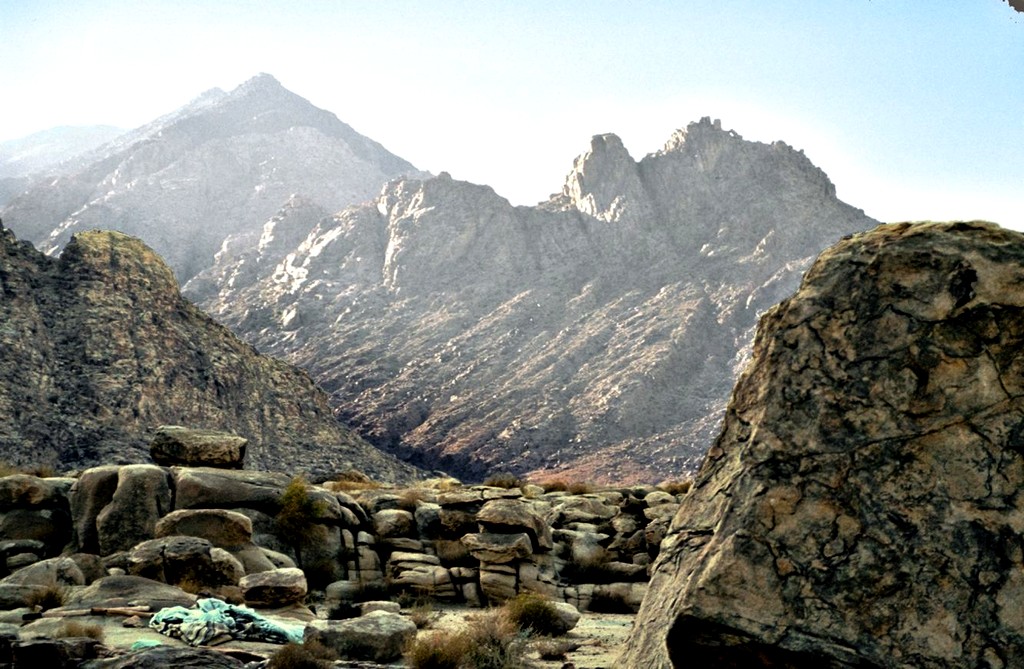
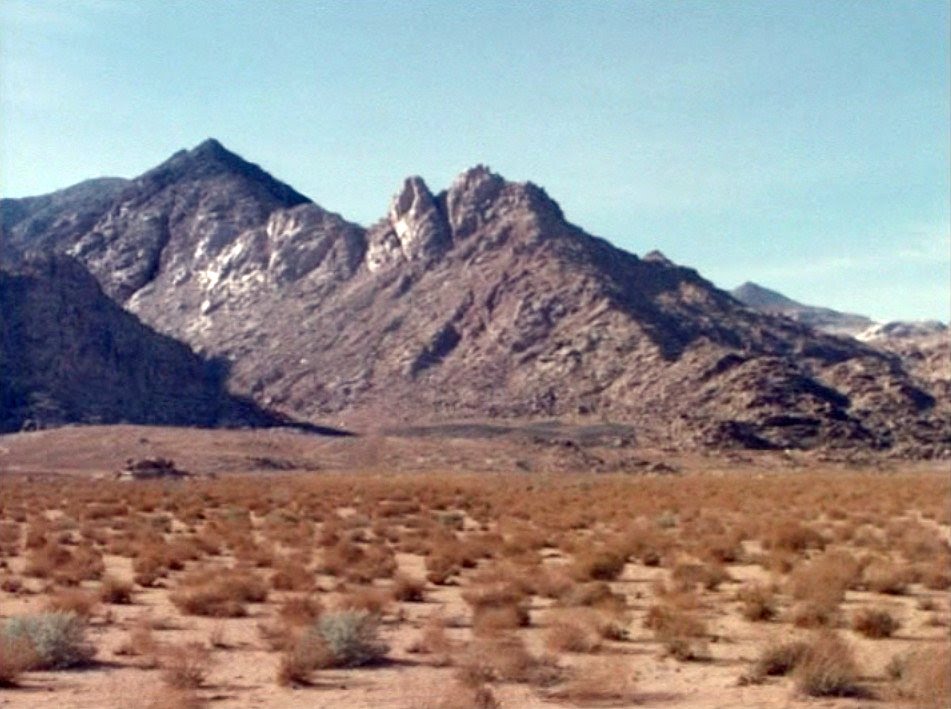
This is one of Ron Wyatt's personel at Jubal Al Lawz
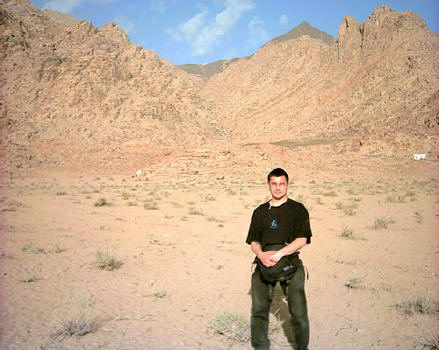
This is located in the ancient land of Midian. You can see the guard post on the right edge of the person in the picture above.
These are more images of Mount Sinai and its area taken from differnt 360 degree views. These first images were taken from a mountain from a distance away
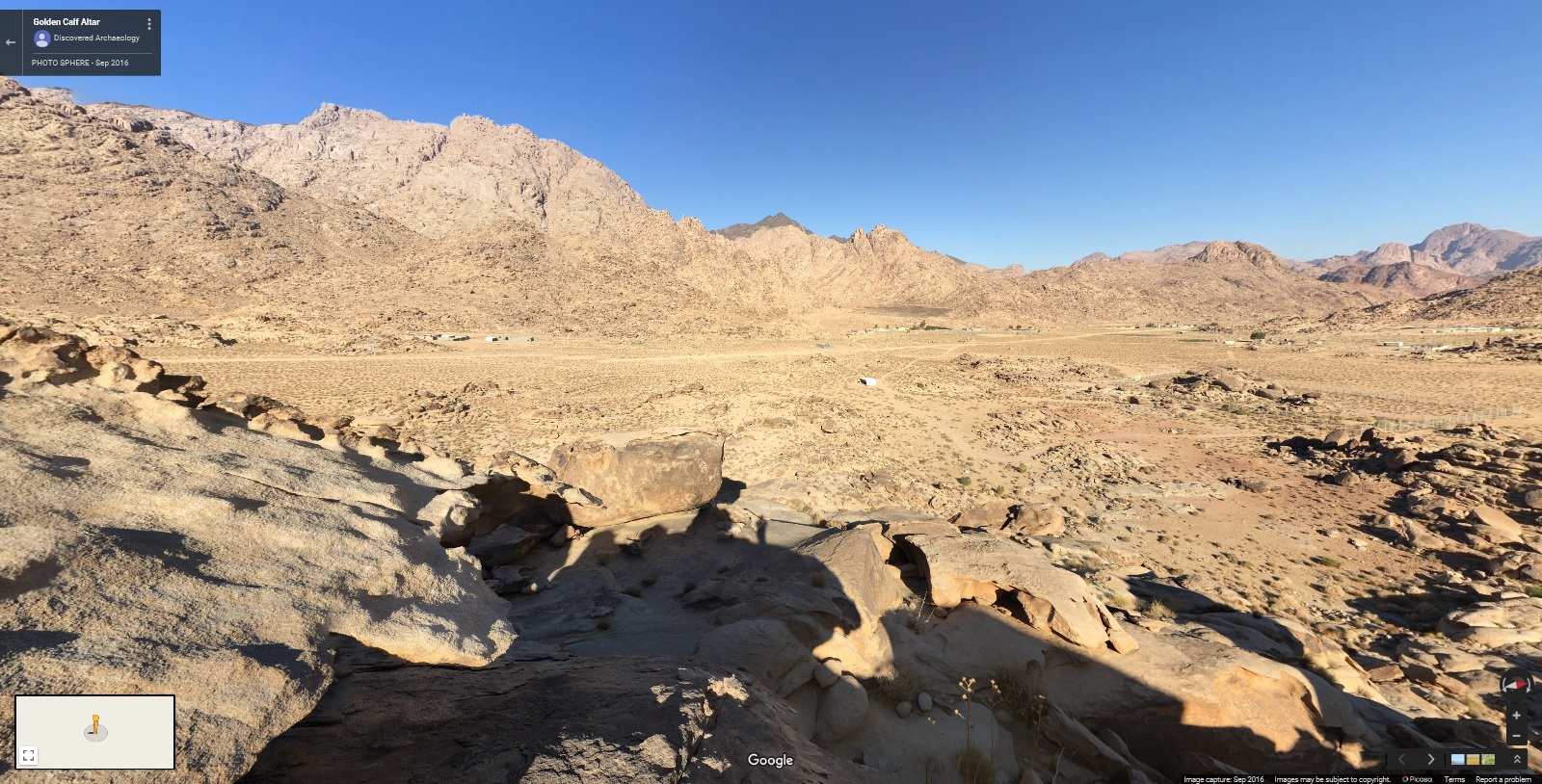
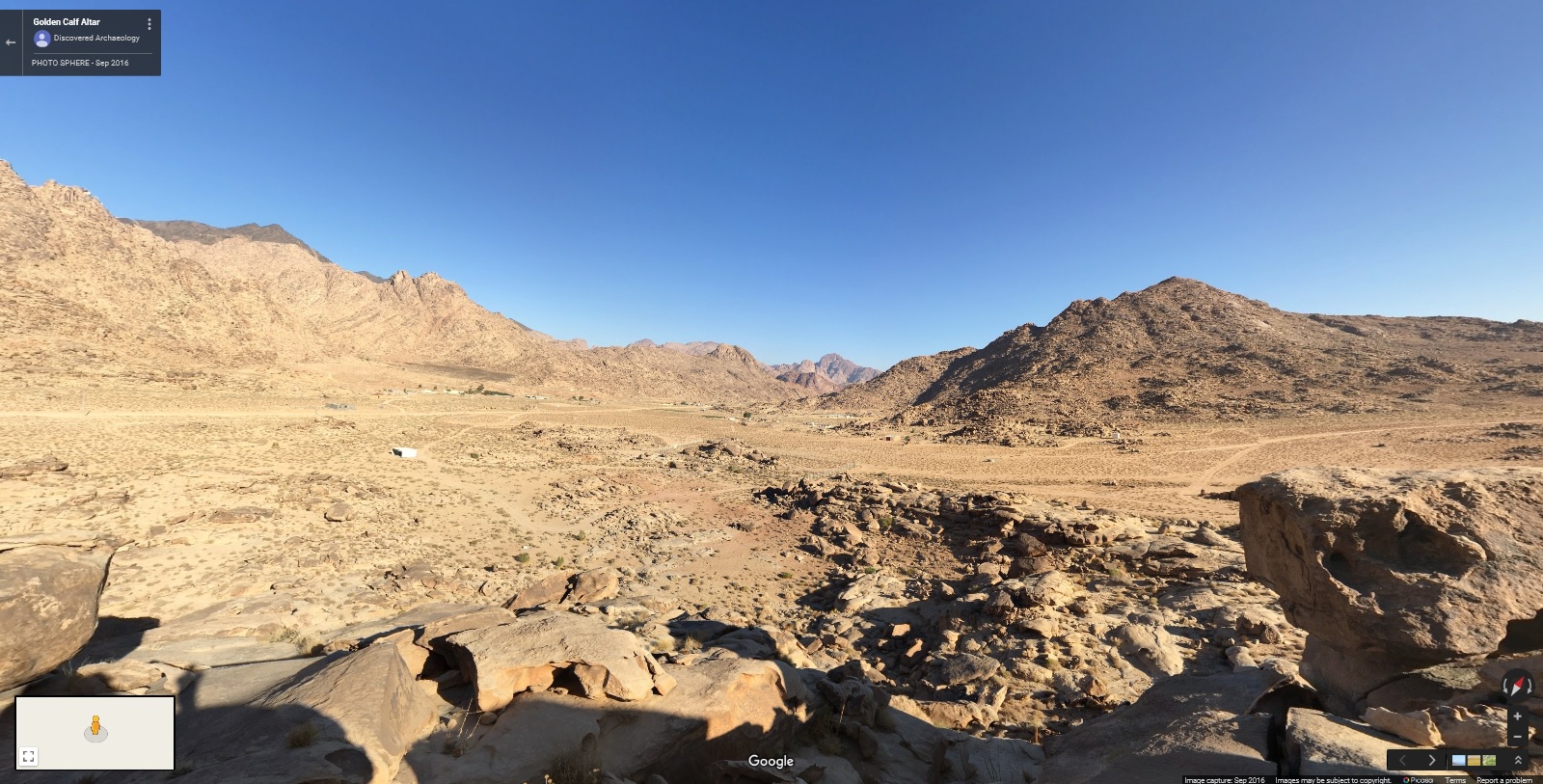
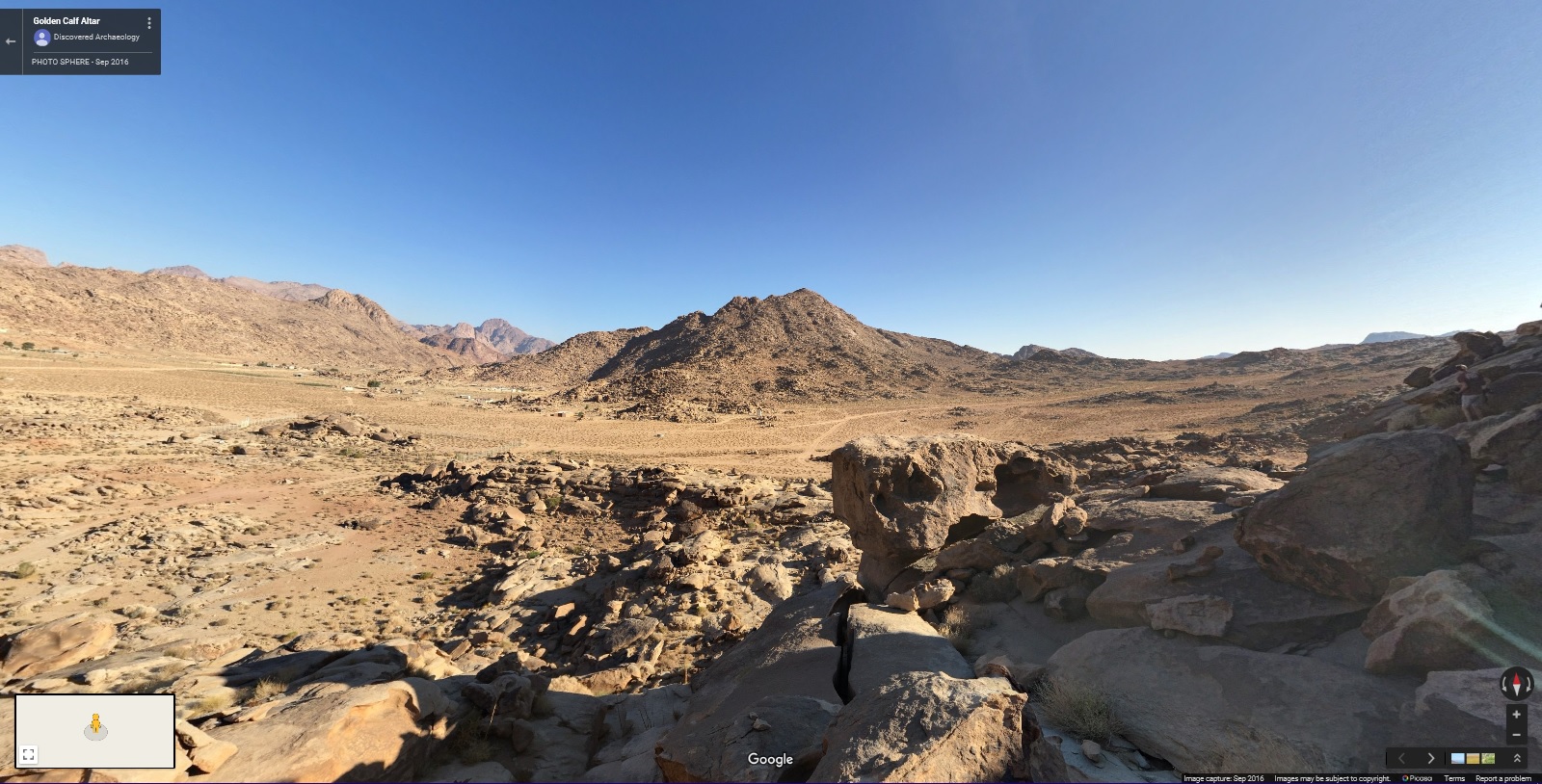
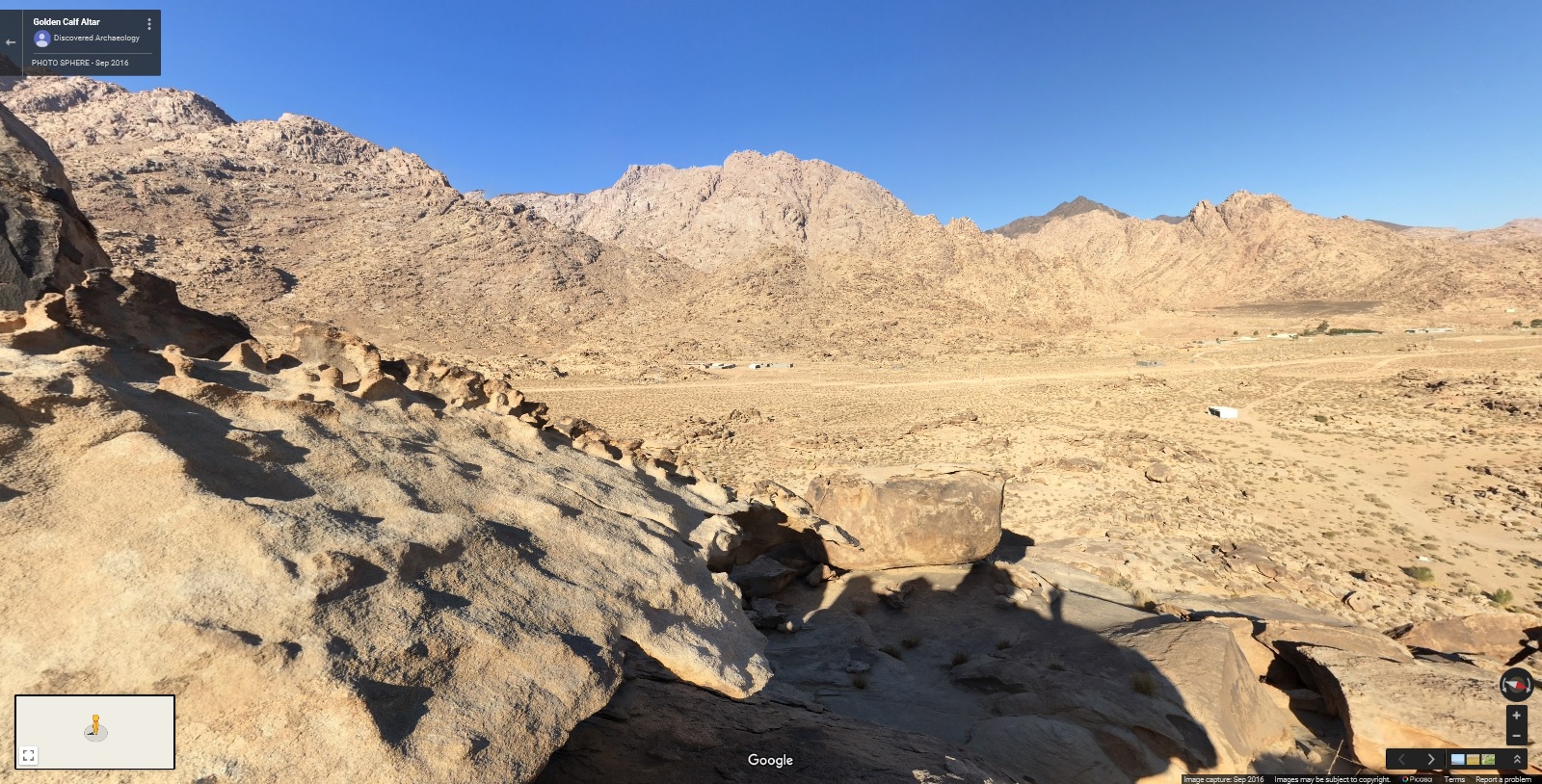

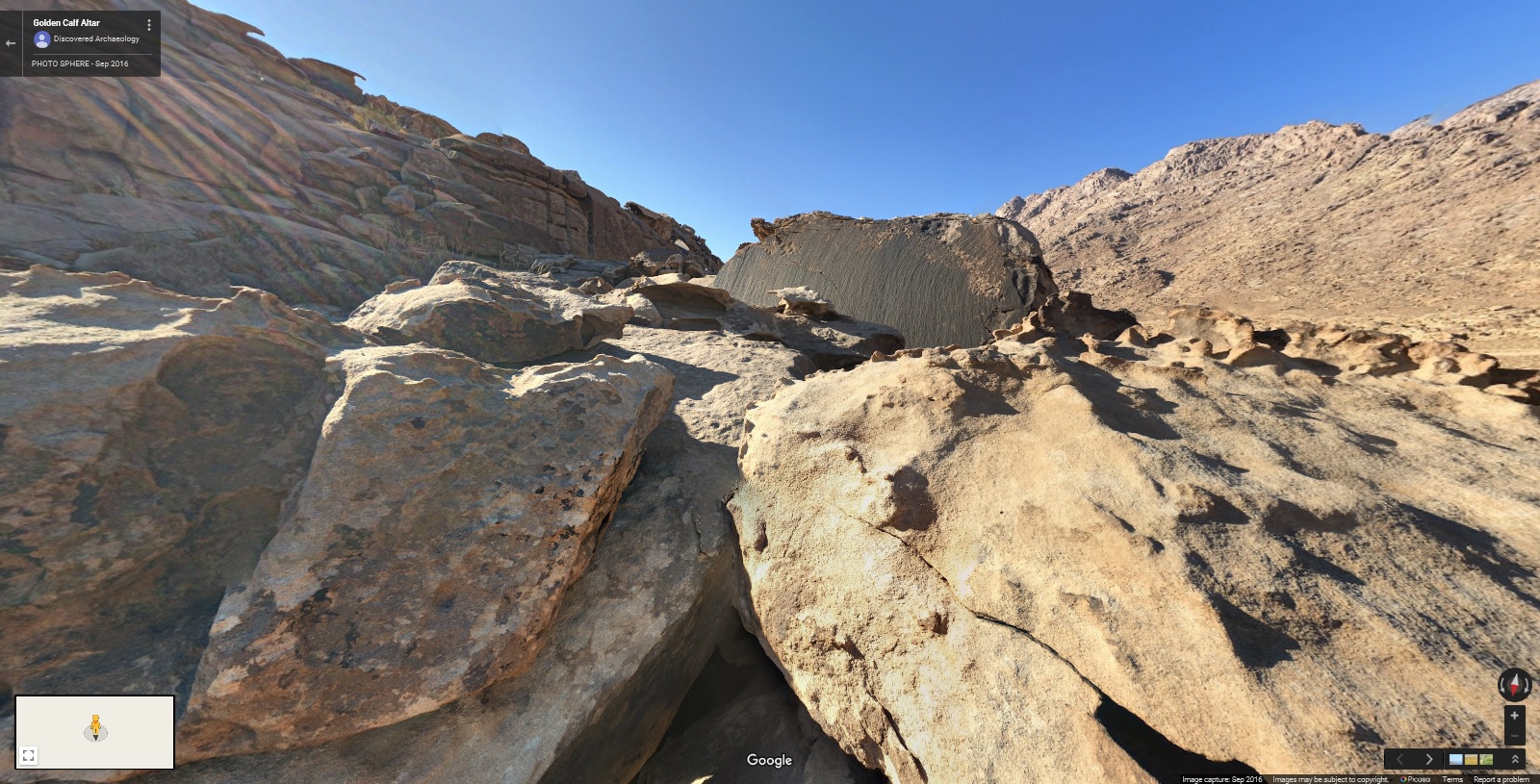
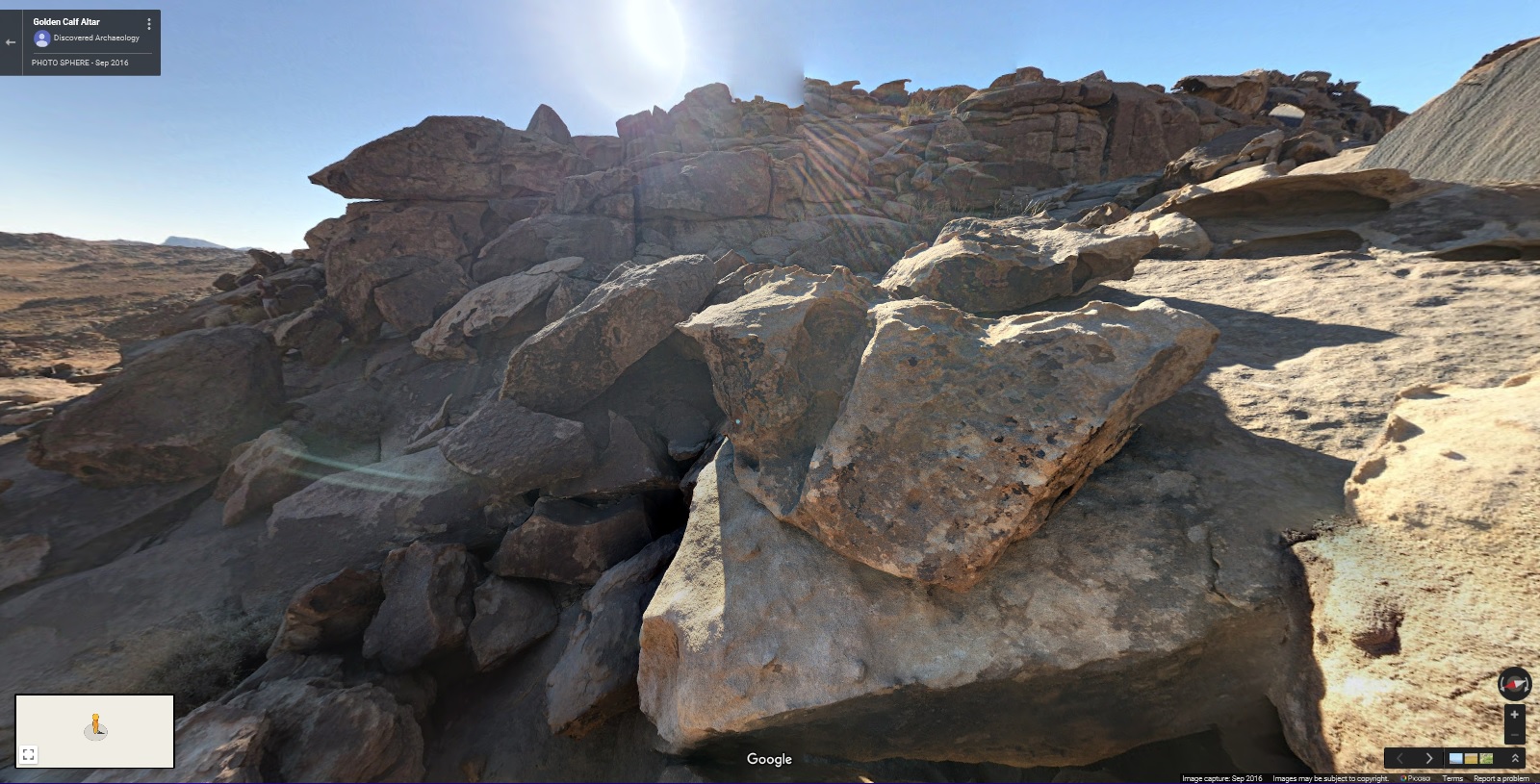
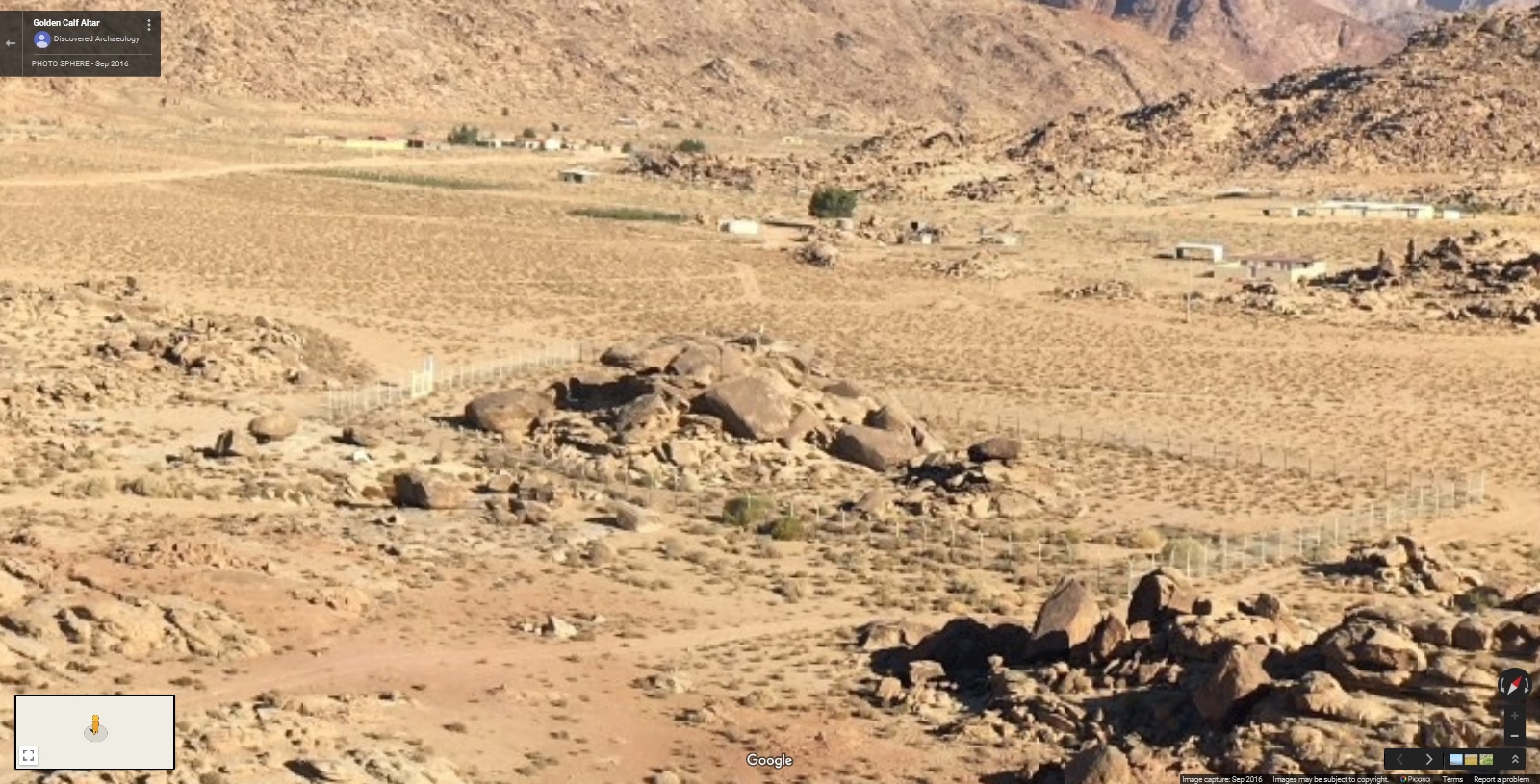
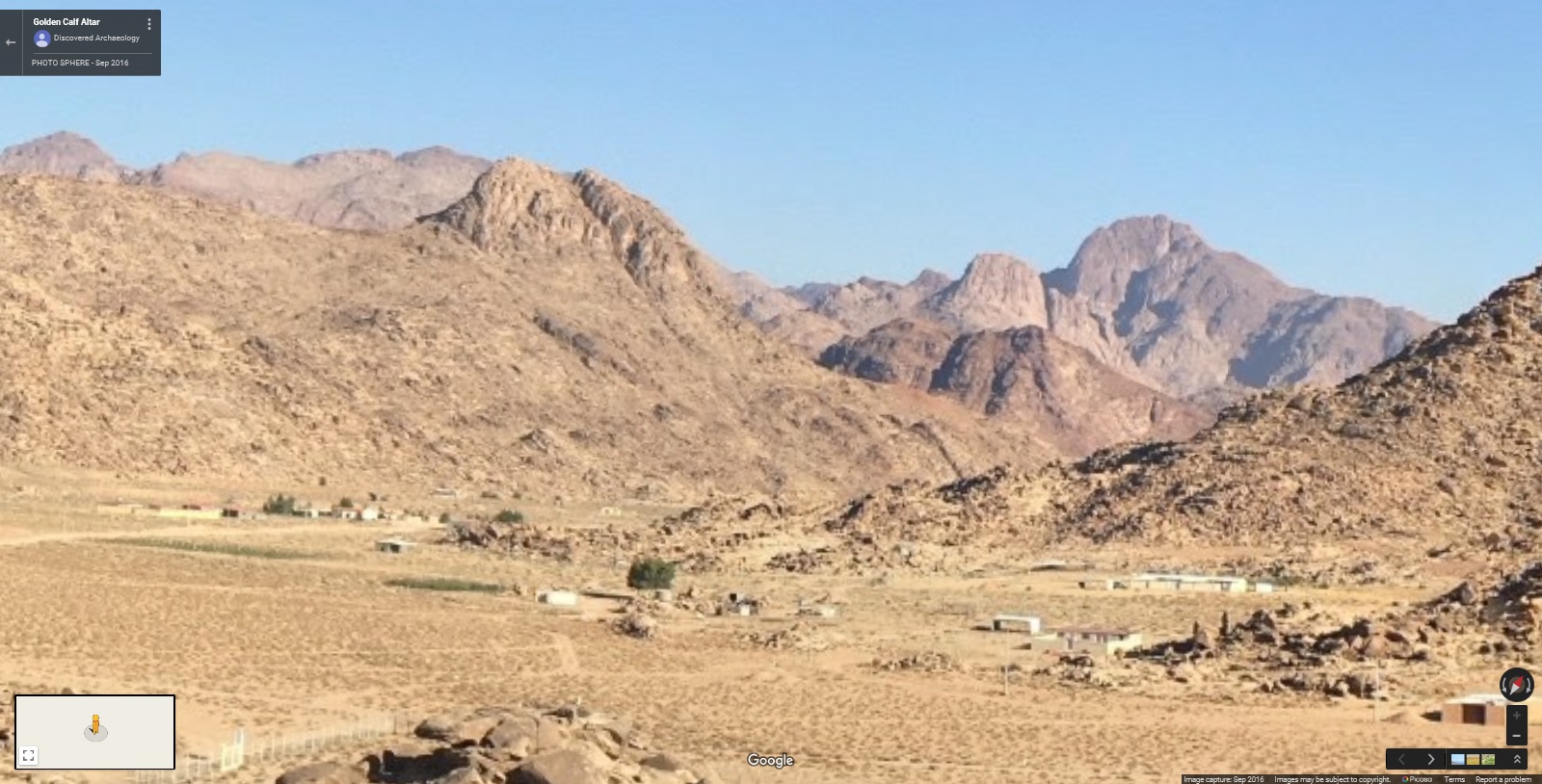
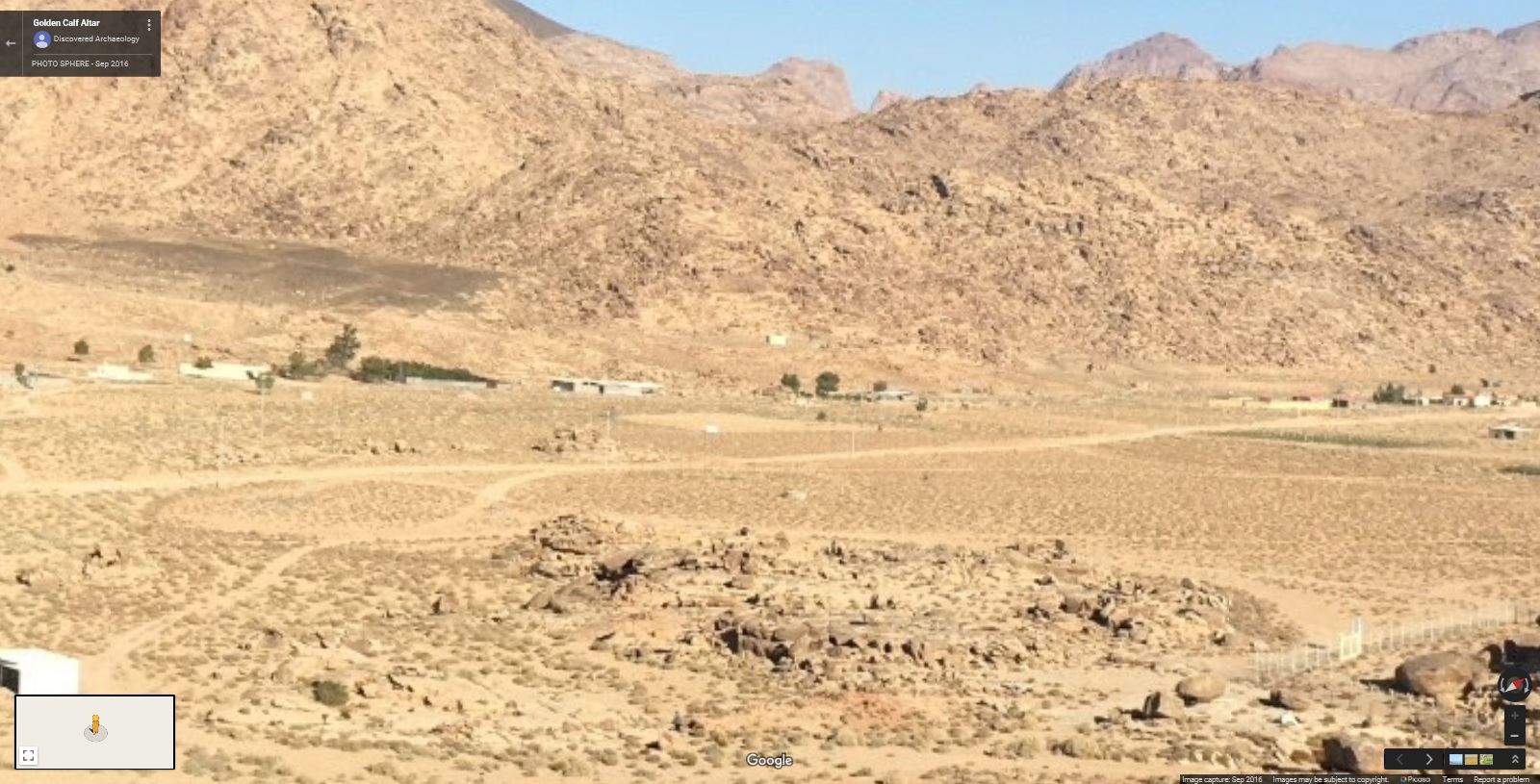
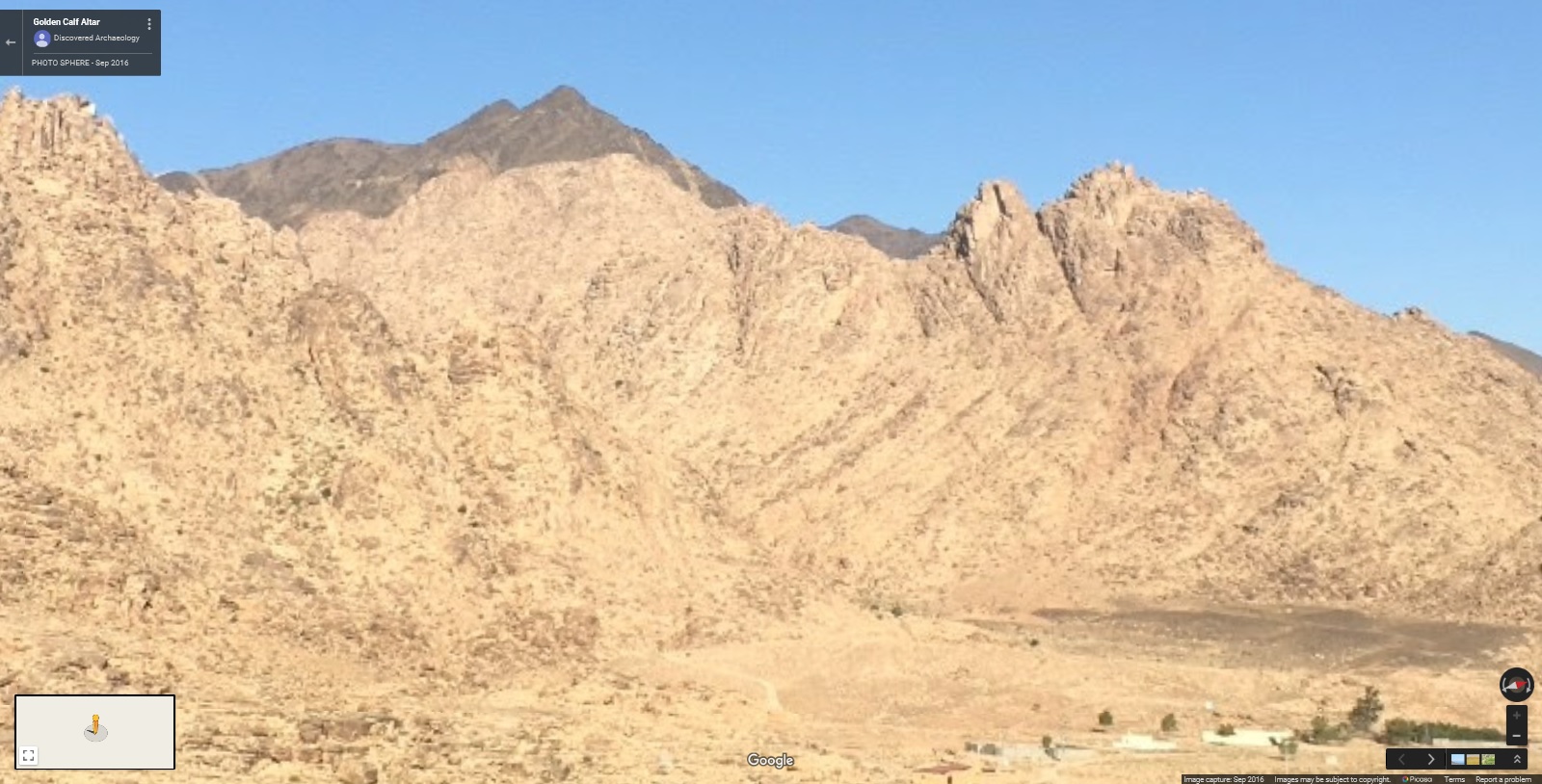
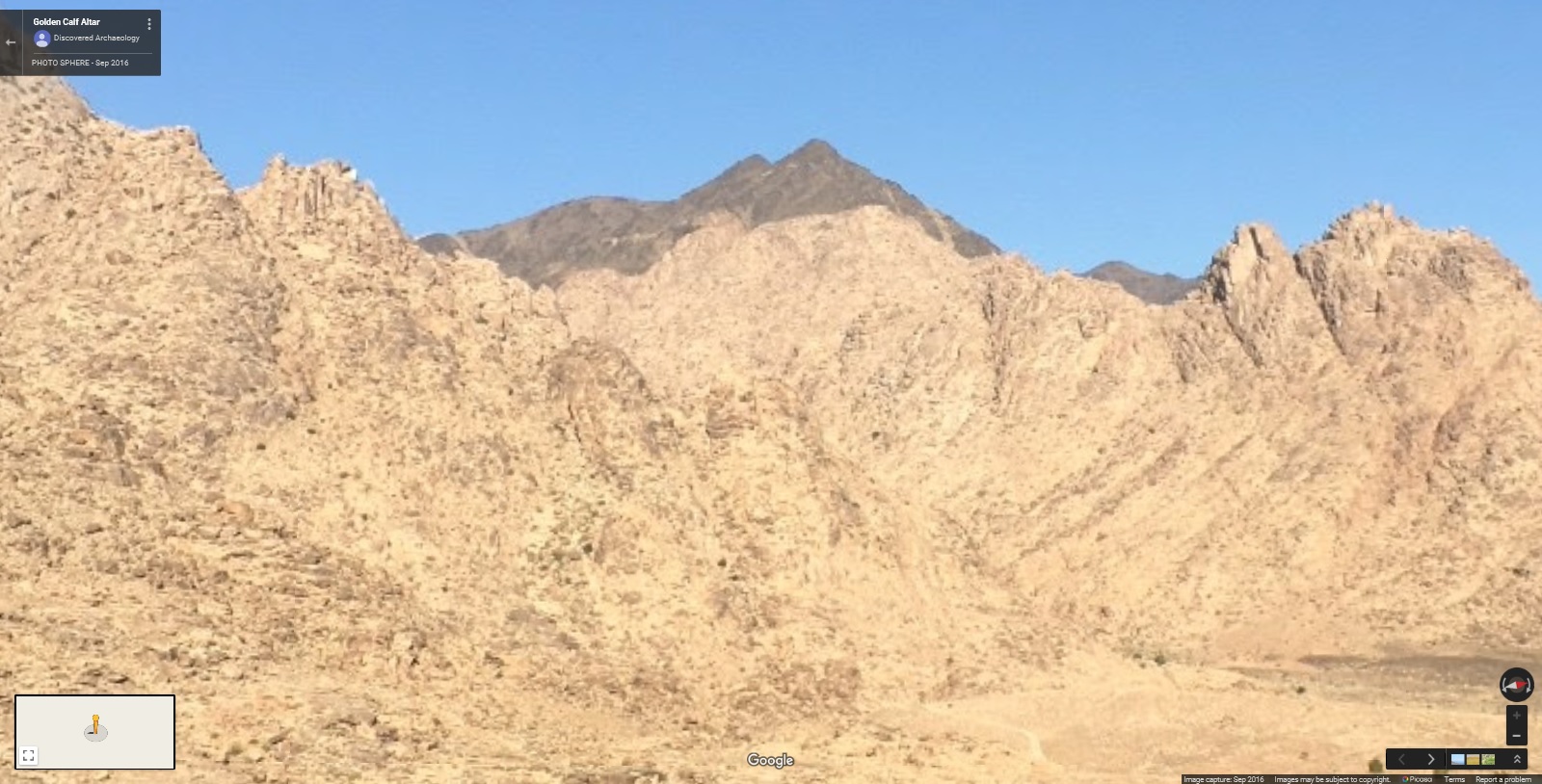
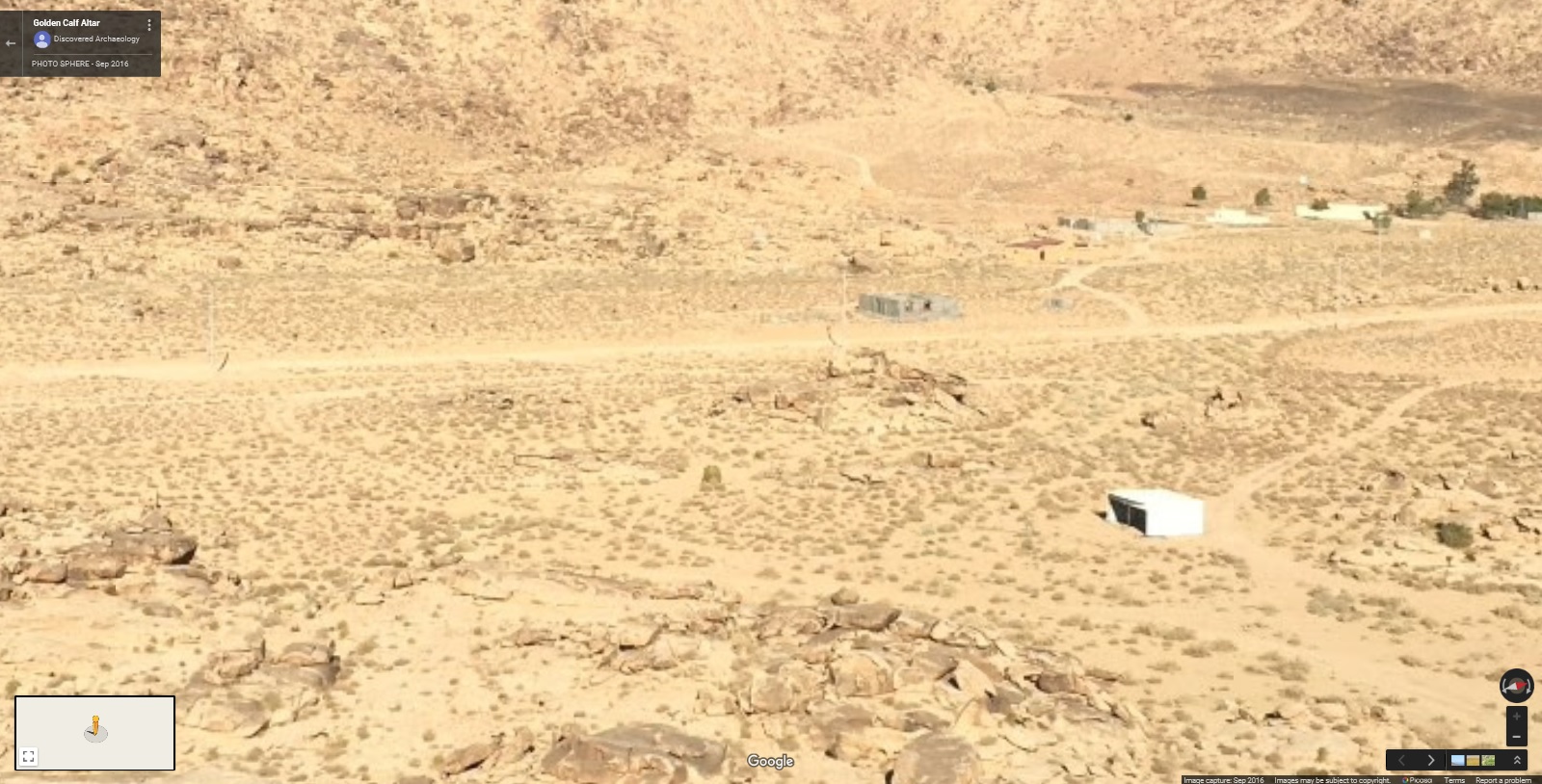
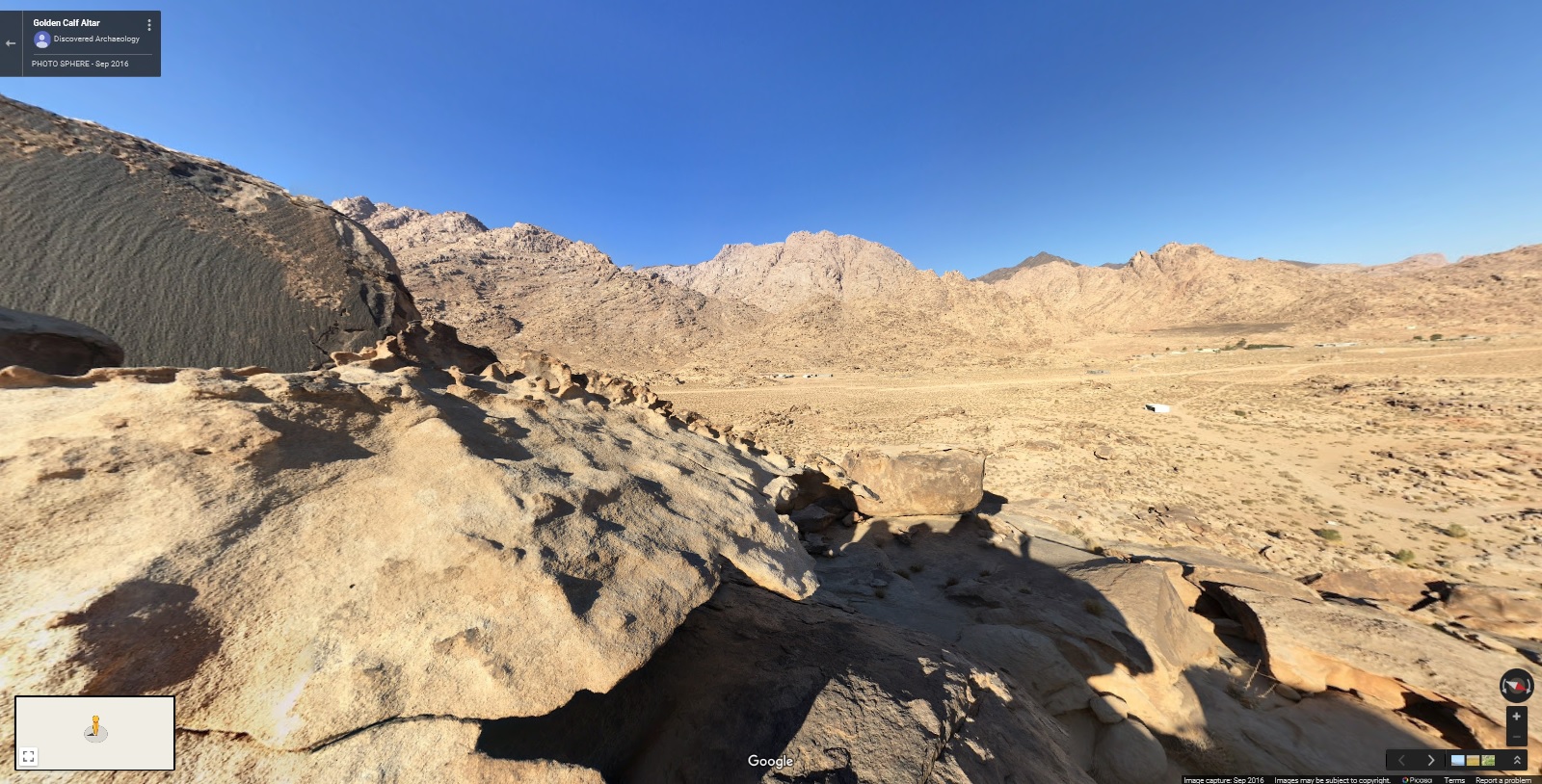
These next images below were also taken in a 360 degree view from the base of Mount Sinai
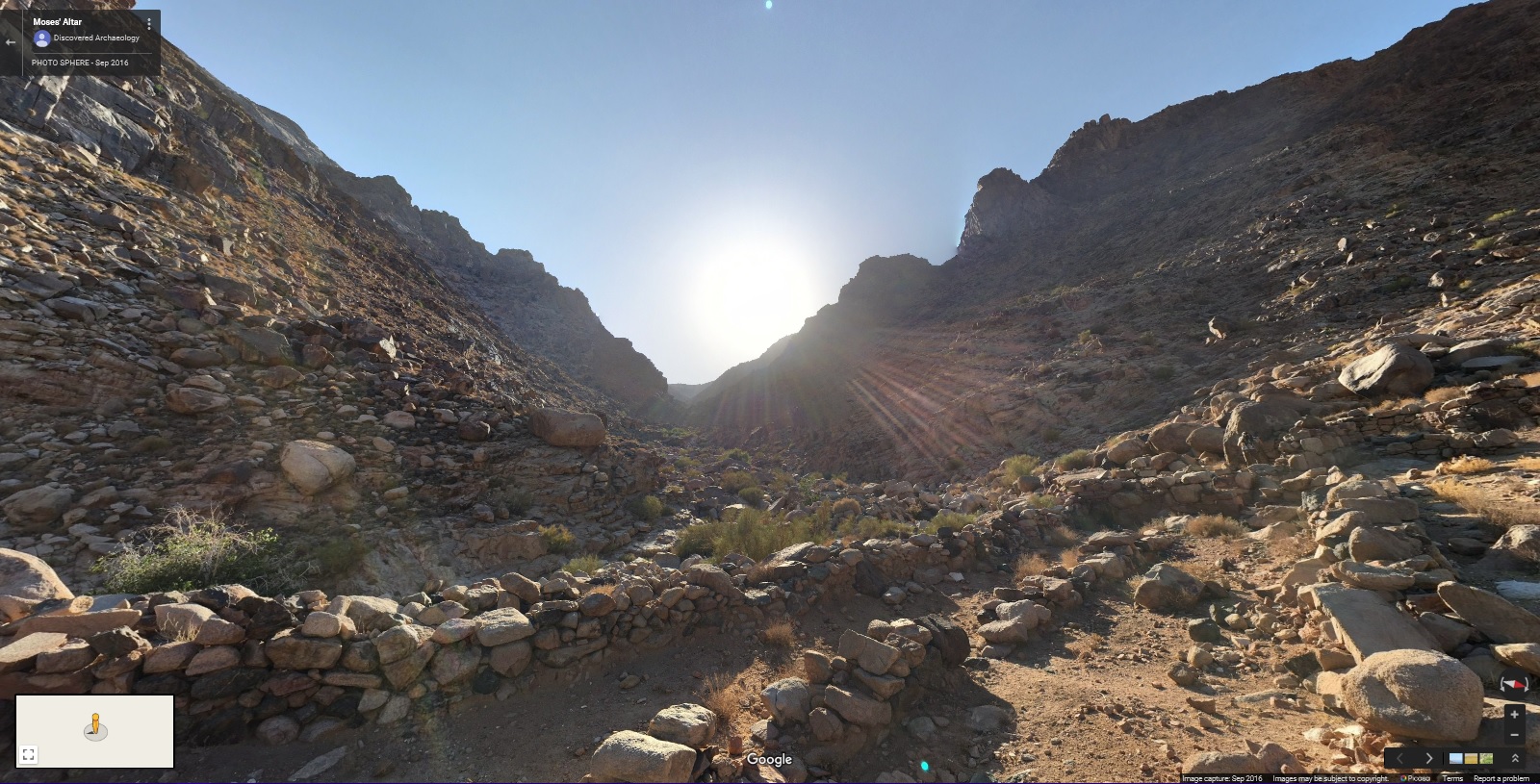
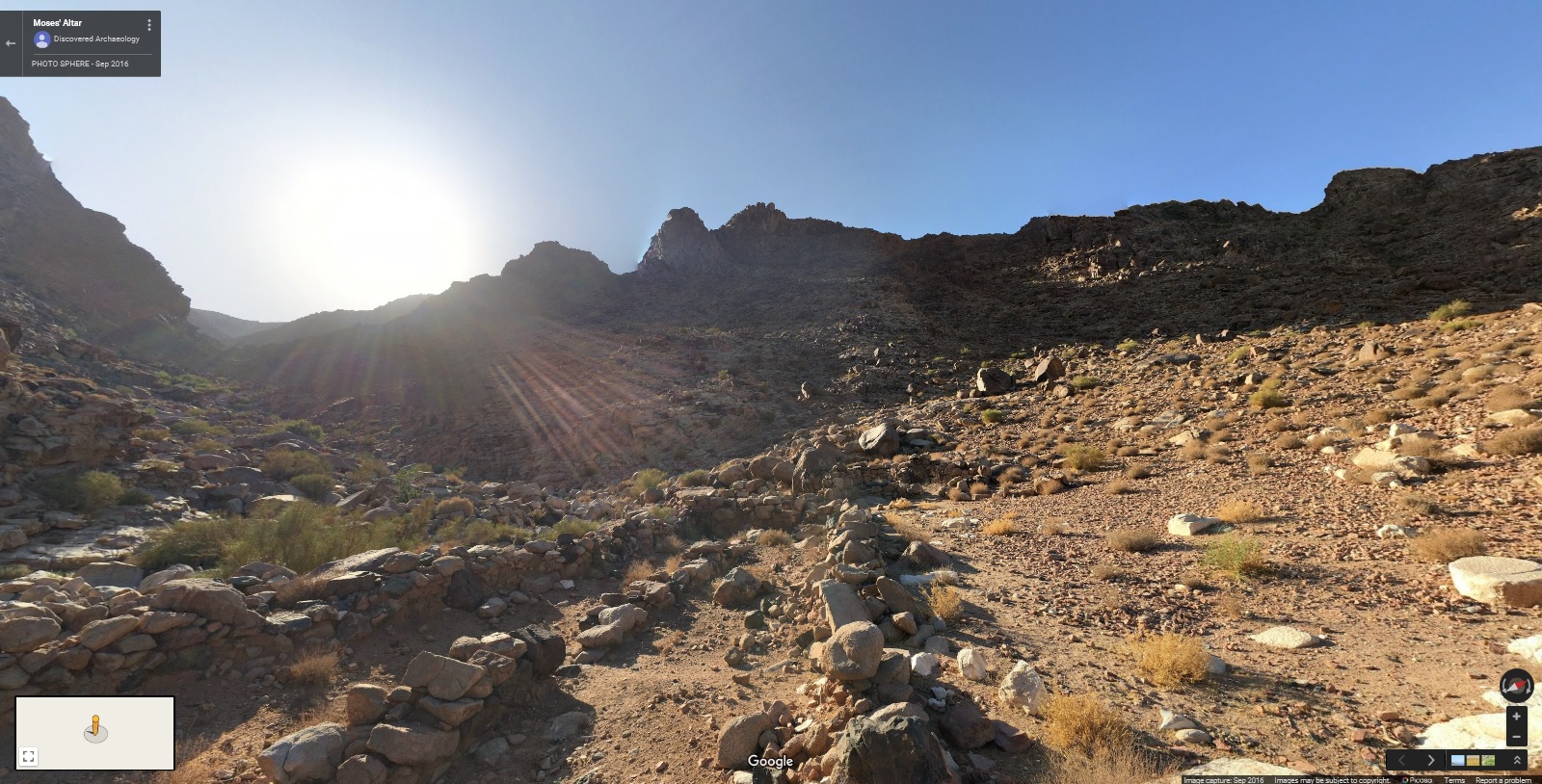
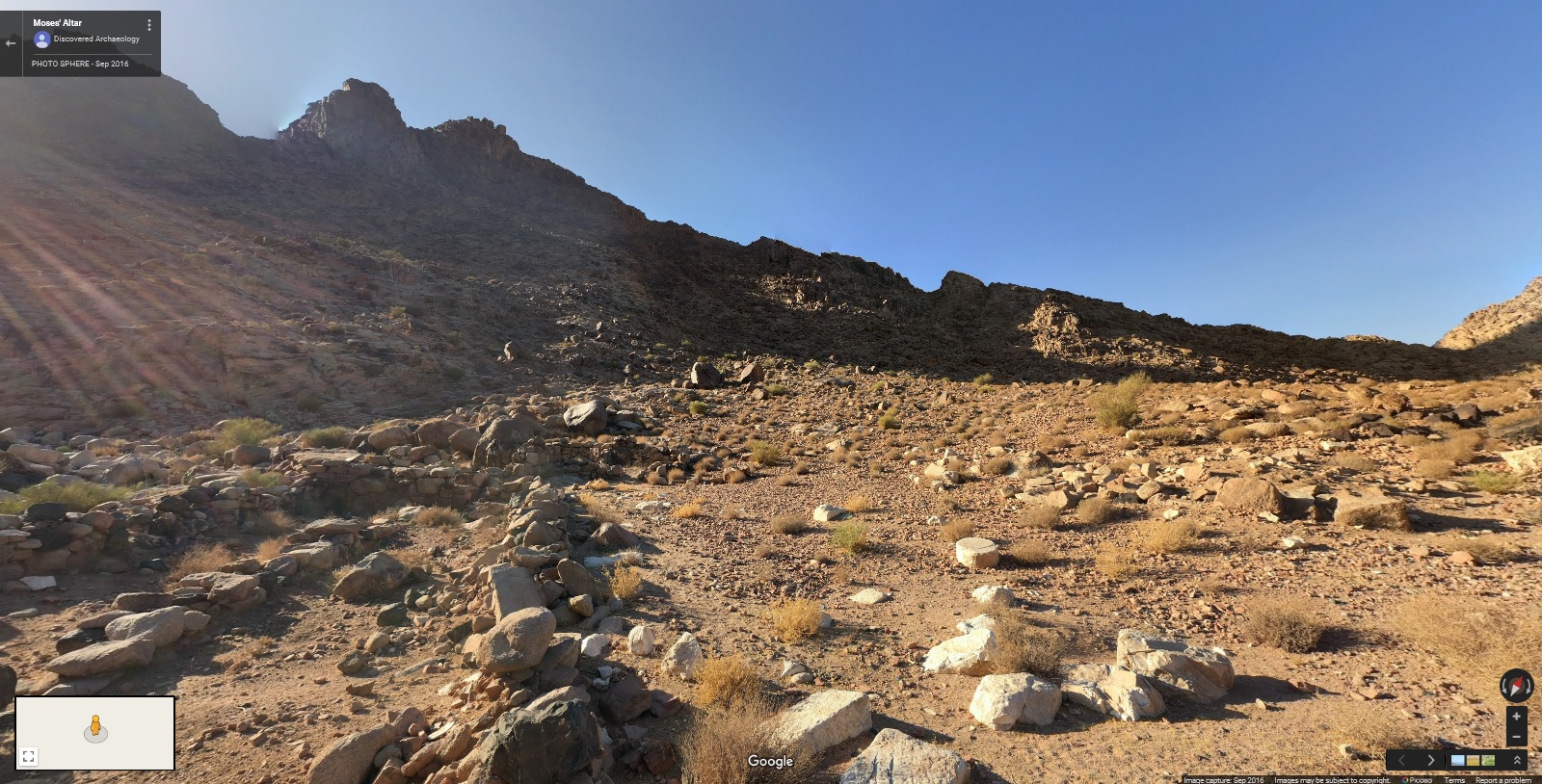
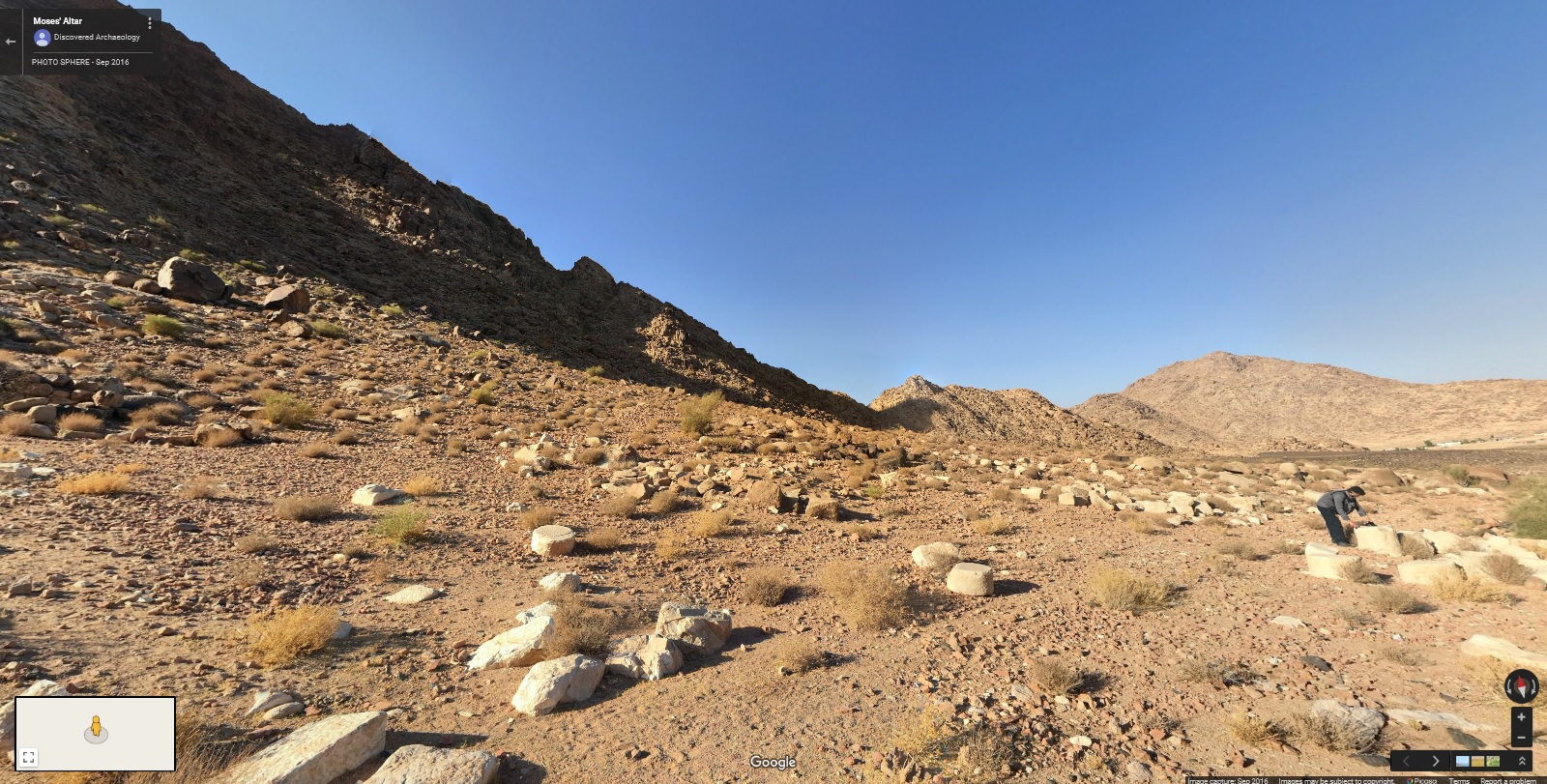
The mountain below on the right is where the first few images above were taken
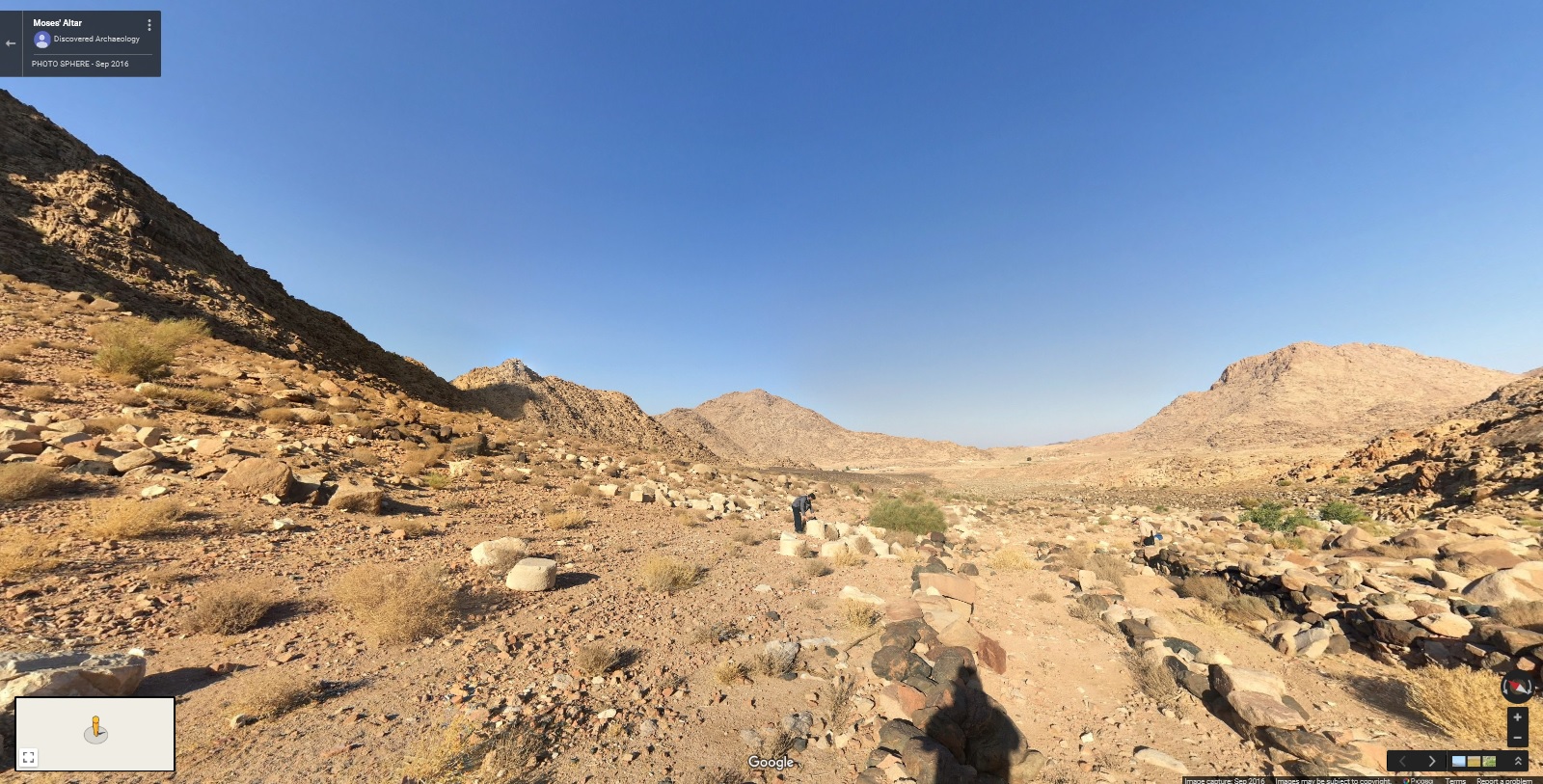
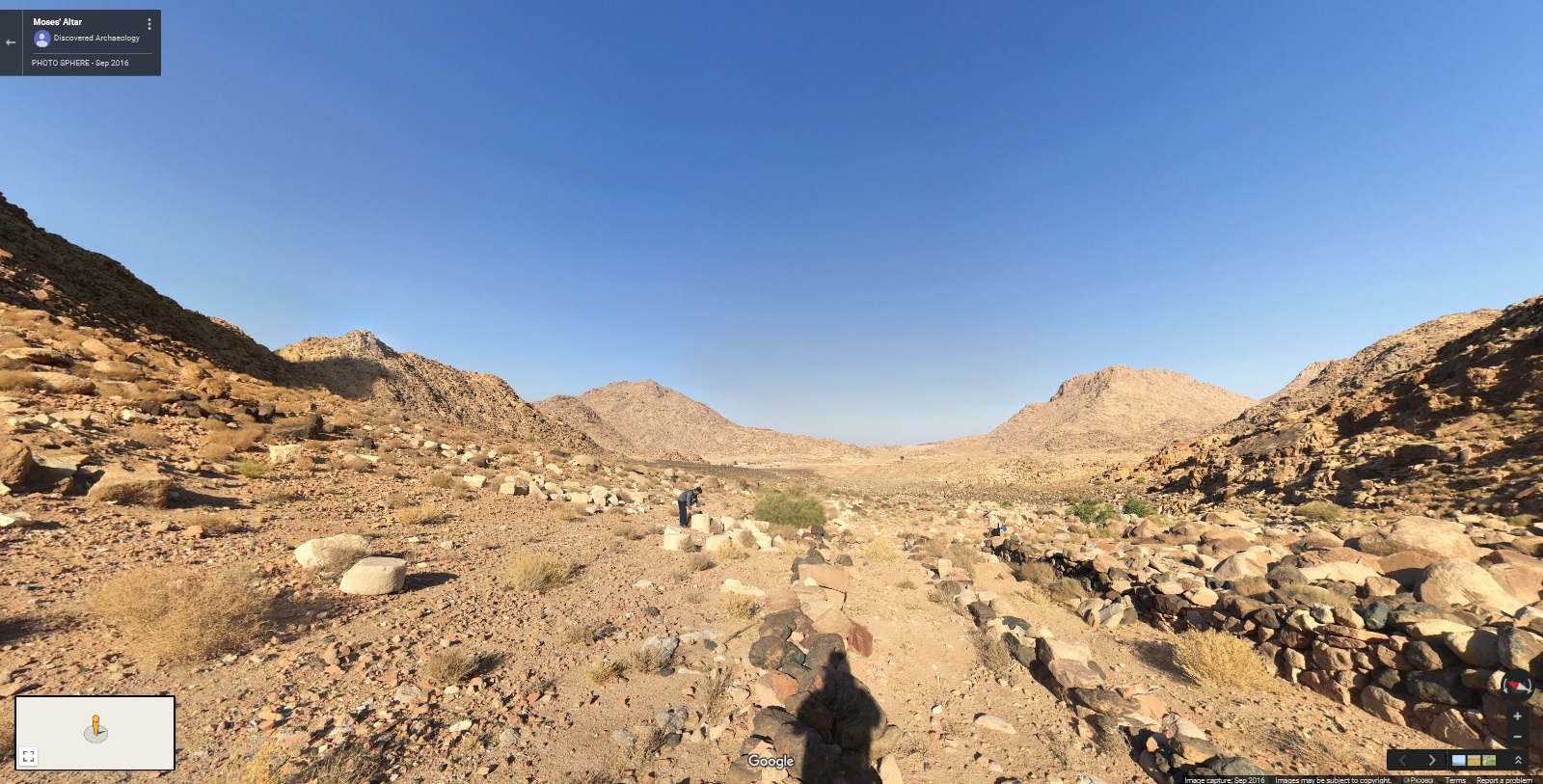
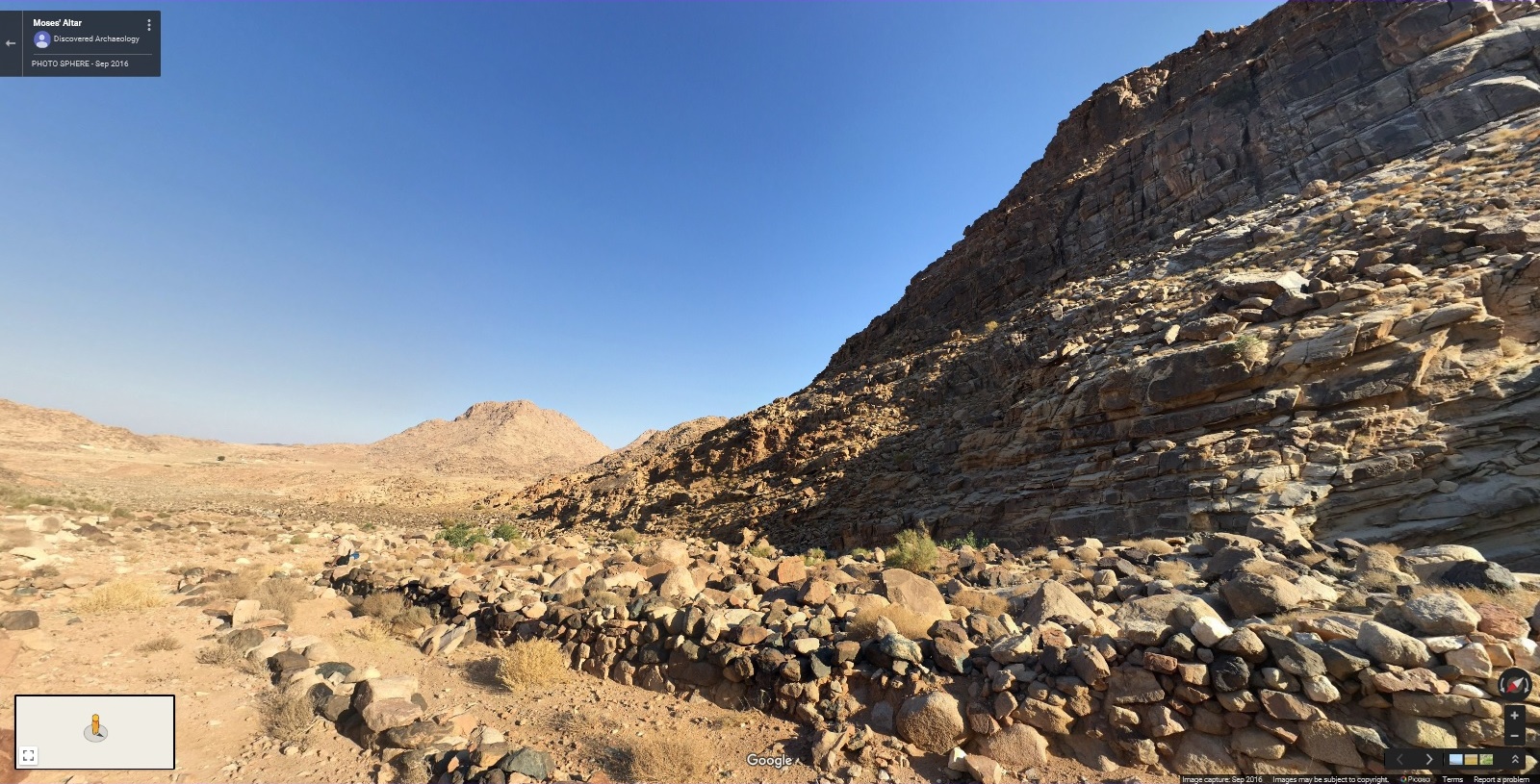
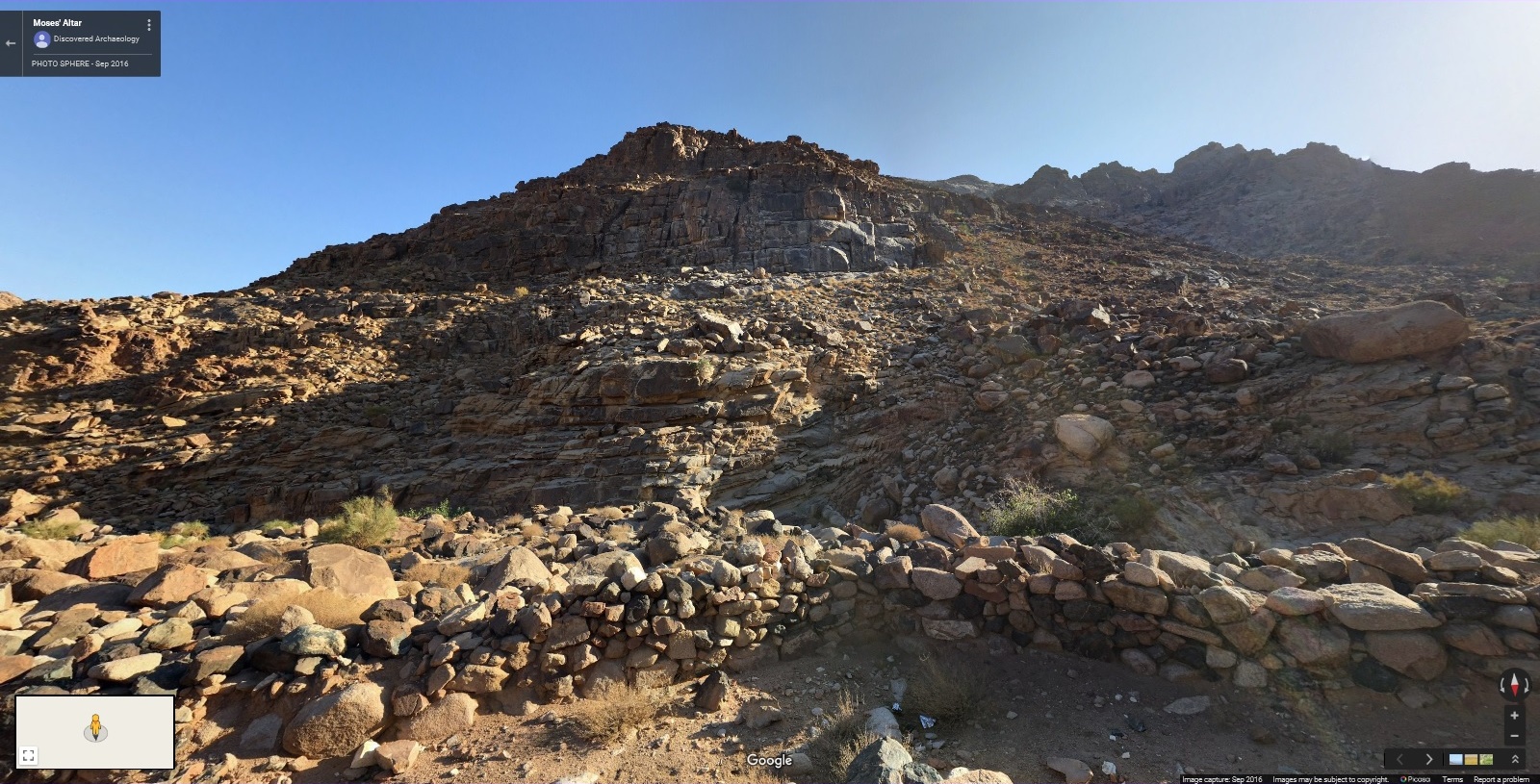
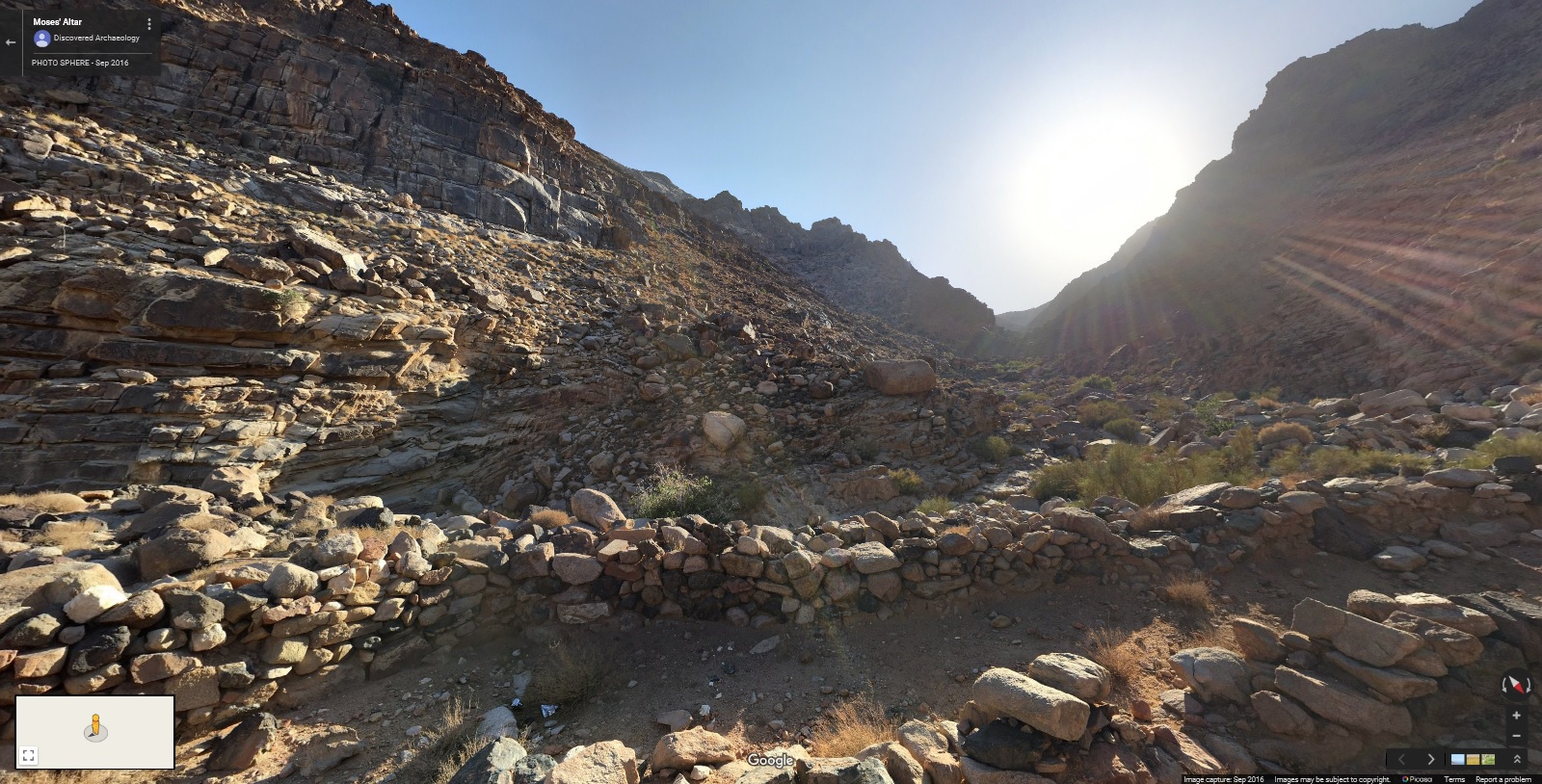
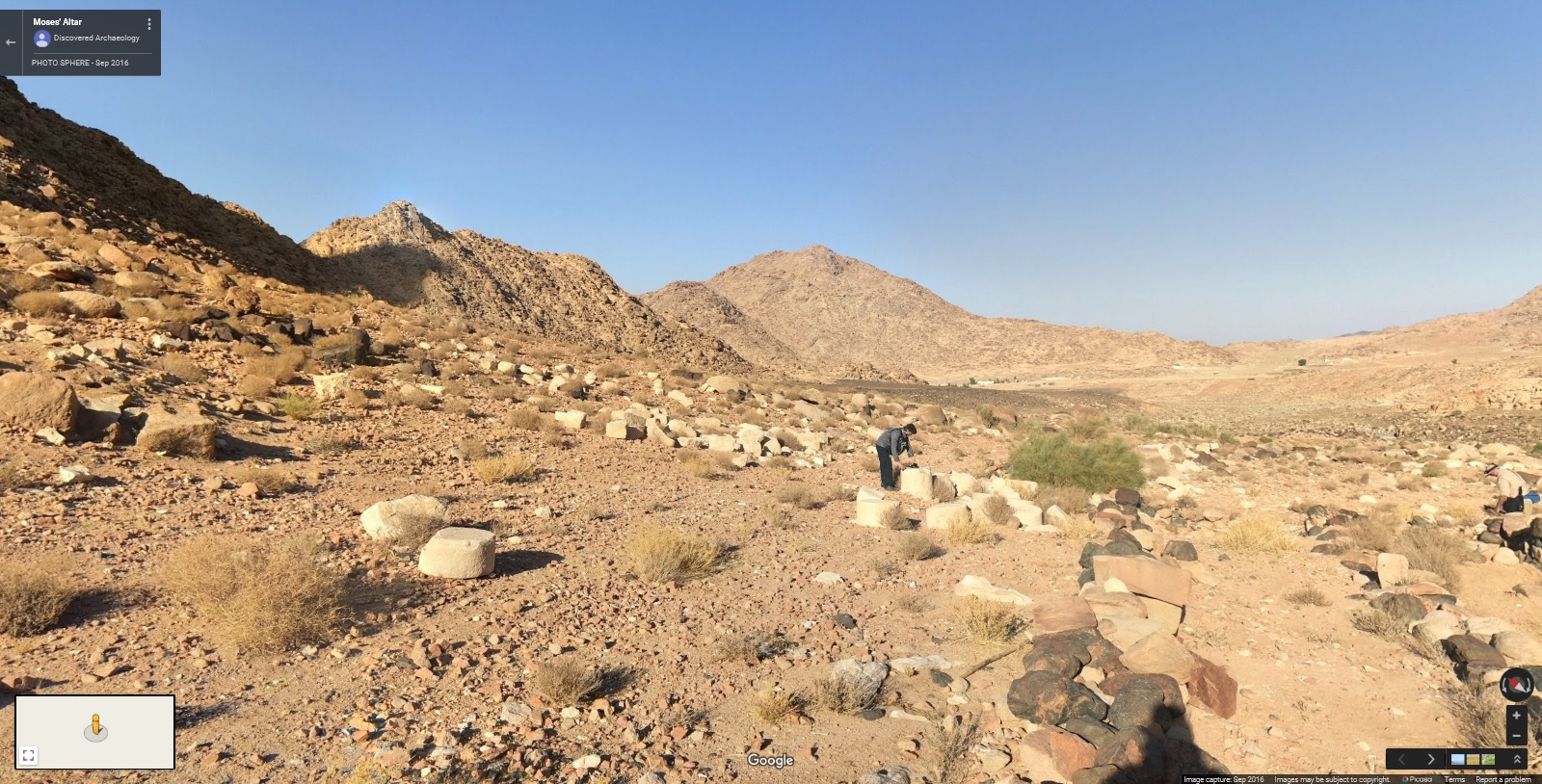
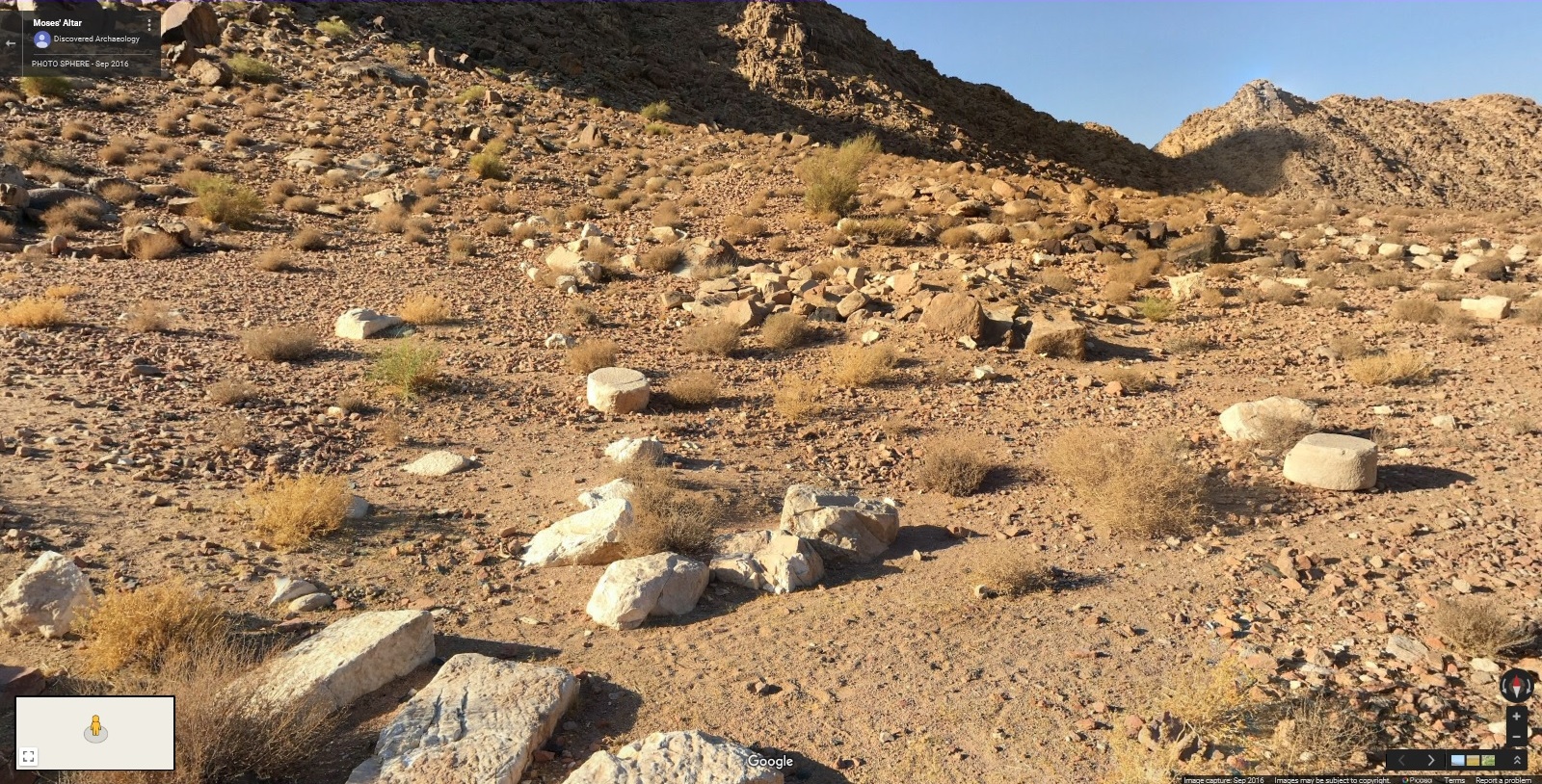
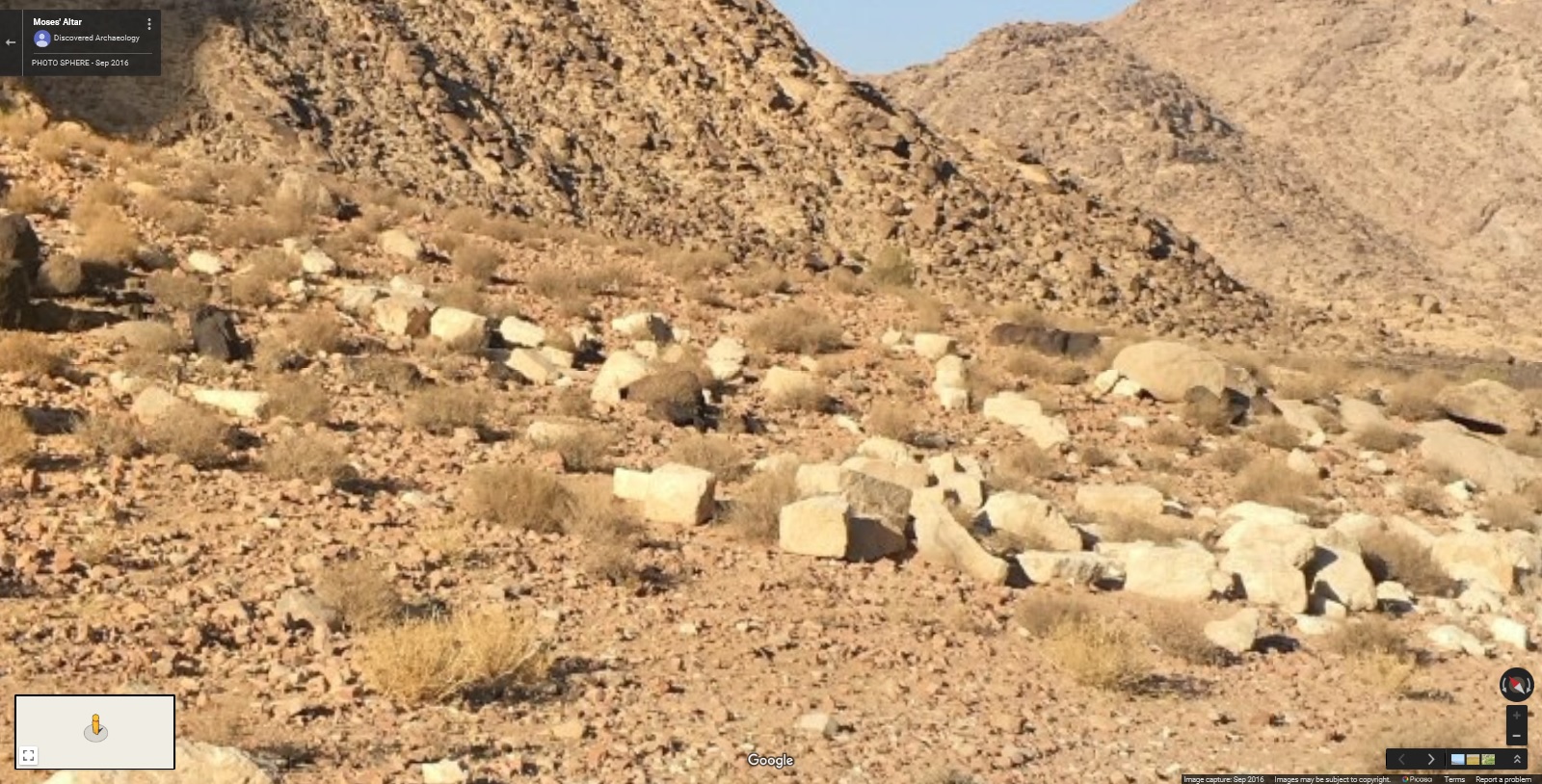
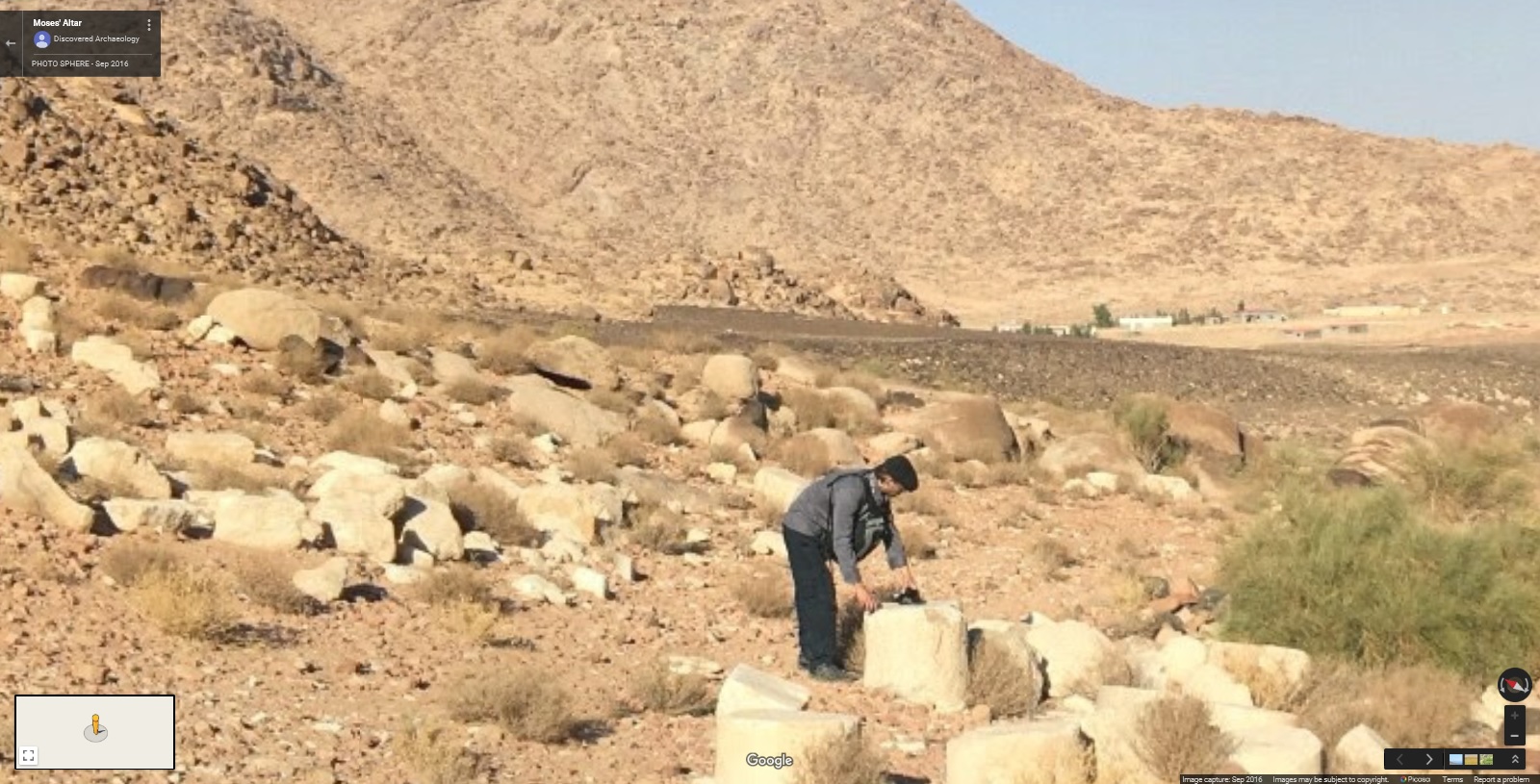
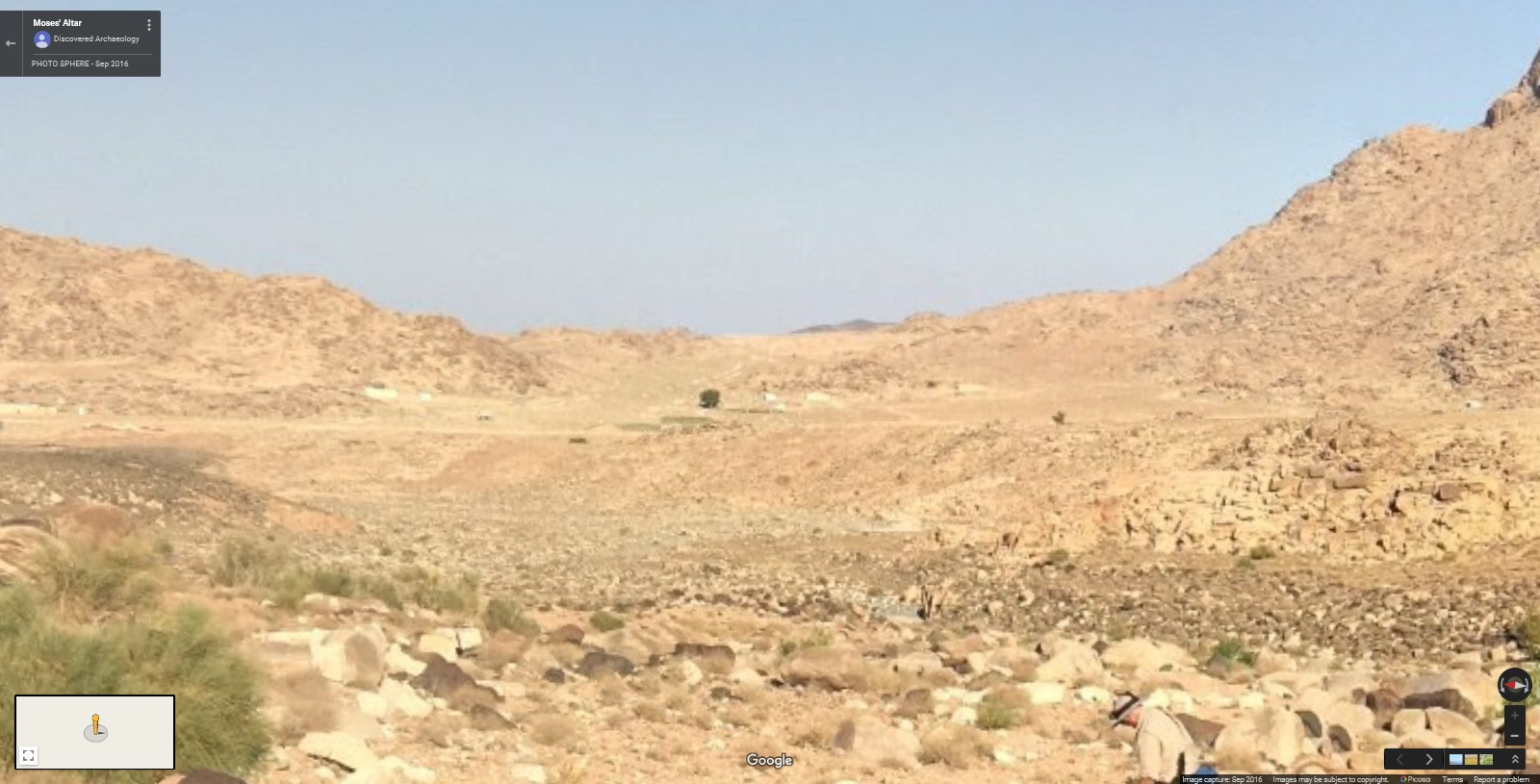
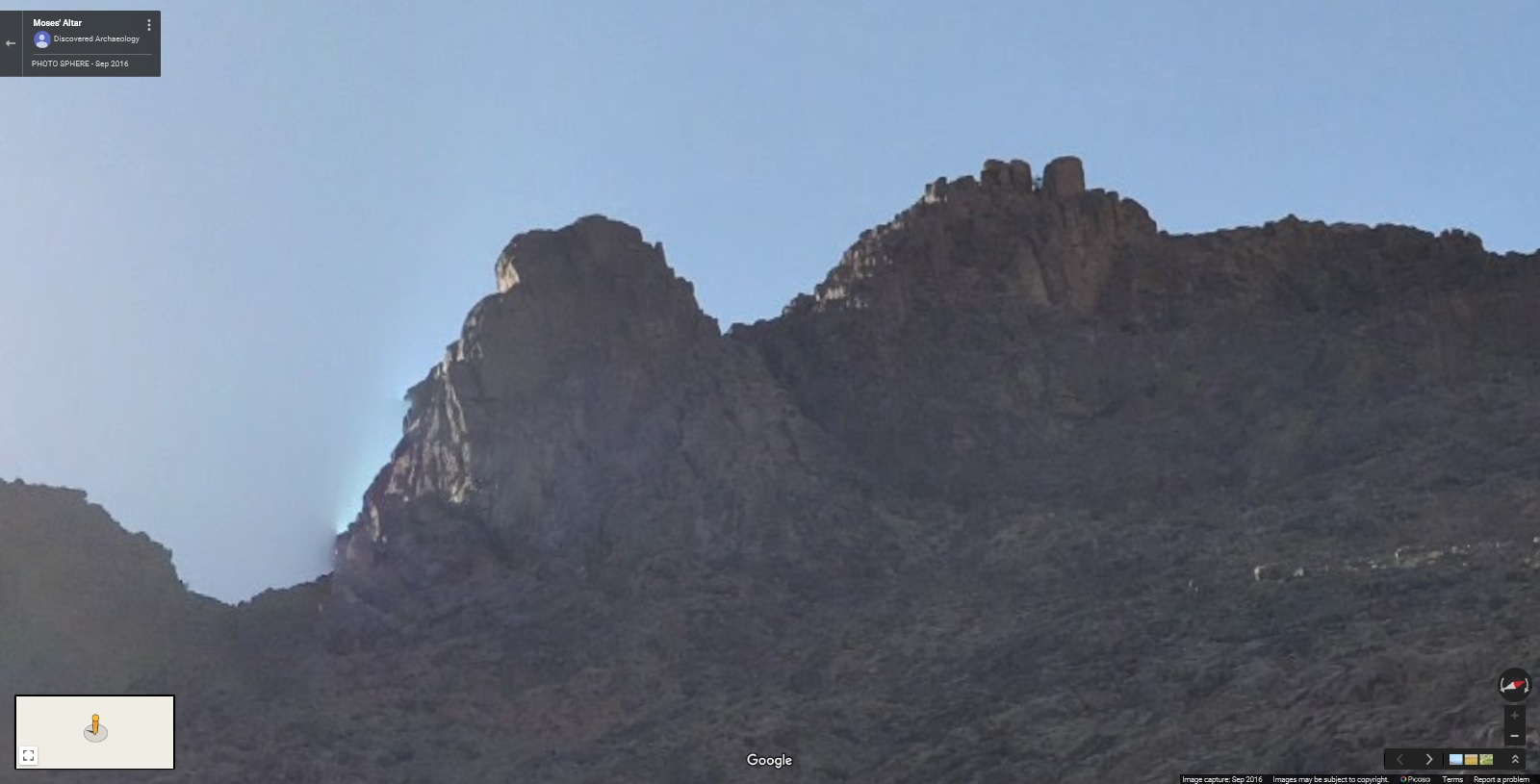
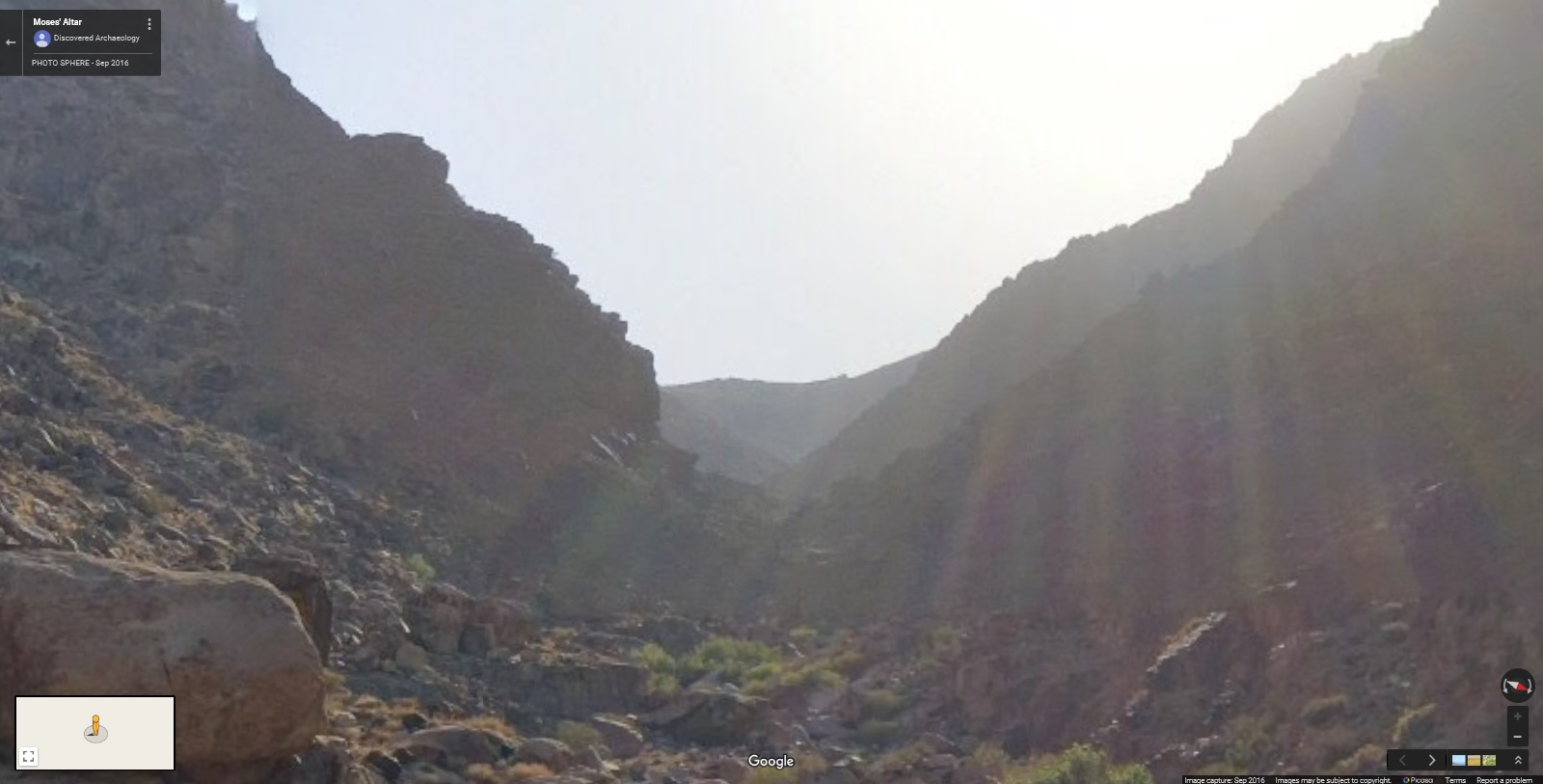
Looking at the word SINAI
The Hebrew word for Sinai is "Seenai"- Samek, Yod, Nun, Yod (ynyo). It is from Strong's Concordance number 5514, and its definition
Of uncertain derivation; Sinai, a mountain of Arabia: - Sinai.
It has no meaning. There is a word similar to it. It is the Hebrew word "s'neh"- Samek, Nun, Heh (hno). It is from Strong's concordance number 5572, and its definition
From an unused root meaning to prick; a bramble: - bush.
It could also mean "shrub", and the word "prick" relates to a thorn bush. Recalling at the picture of Mount Sinai showing thorn bushes below

one can see little bushes level on the ground. This would be called "Mount Thorn Bush".
These are images of a bramble (thorn) bush
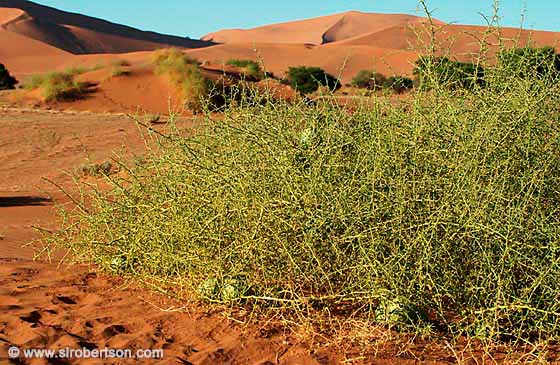
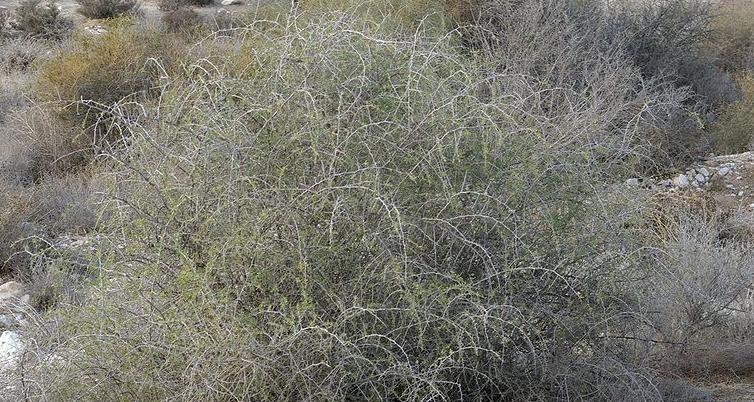
In my opinion, this would be the accurate defintion. The name of the region would be called "The Wilderness of the Thorn Bush". This is the same region where the mountain is located, where Moses saw "The Burning Bush". It is also noted in the Torah portion of Sh'moth, in the book of Exodus
Exodus 3:4 And hwhy saw when (for) had bent aside (turned aside) to see. And Elohim called to him from the midst of the bramble bush (thorn bush) (hno), and said, Moses! Moses! And said, Behold I. 5 And said, Do you not draw near hither: Slip off your sandals from upon your feet, for the place which you are standing upon him, he is Sacred (Holy) Ground.
The Hebrew text for thorn bush in the Sh'moth portion's text is "hah-s'neh"- "the thorn bush" (hnoh), the same Strong's concordance number 5572 noted above.
These thorn bushes could likely be the same thorn bush branches that Yeshua wore on His head, resembling His kingship as King of the Jews, at the cross in Jerusalem, which is noted in the Gospel of John
John 19:2 And the soldiers platted a crown of thorns, and put it on His Head, and they put on Him a purple robe,... 5 Then came Yeshua forth, wearing the crown of thorns, and the purple robe. And Pilate saith unto them, Behold, the Man!
It is my opinion that the crown of thorns on Yeshua's head was symbolic sign to the Jewish People during Yeshua's time that it was Yeshua in the burning thorn bush at "the head" of Mount Sinai (Mount Thorn Bush) who spoke to Moses.
Before Moses went back to Egypt from Midian, in the Torah portion of Sh'moth, in the book of Exodus, Moses was at the mountain with hwhy to start his mission to lead the People out of Egypt, this was where hwhy was "pricking" Moses to start his new mission and occupation, based on the definition of Jethro's name, to save the People of Israel. This is comparable to my commentary in the Torah portion of Va-Y'khi, in the book of Genesis, when the Israelites were located at the threshing floor at Almah, before they crossed over to the land of Canaan to bury their father, Jacob, and the Egyptians stayed behind, which was the brothers' act to thresh out the Egyptians through the Thorn Trees (Almah). Similarly, this is what Moses is about to experience by being pricked from his previous occupation to his new "Kingdom Occupation". In this Torah portion's case, this is where Moses and the People will be "pricked" to be "spiritually married" to hwhy through this upcoming "Marriage Contract".
This is what the Heavenly Father does to us as believers in Yeshua in our lives by being "spiritually pricked" to begin our new "Spiritual Occupations" as believers in Yeshua, the Messiah, in our walk in Him, as well as being pricked to become "spiritually betrothed" to Yeshua when we become His "Spiritual Bride".
A REALIZATION!!!
Glory be to you Abba Father, hwhy, for revealing this. Zooming out, this is the image of the area of the Wilderness of Sinai and its vicinity
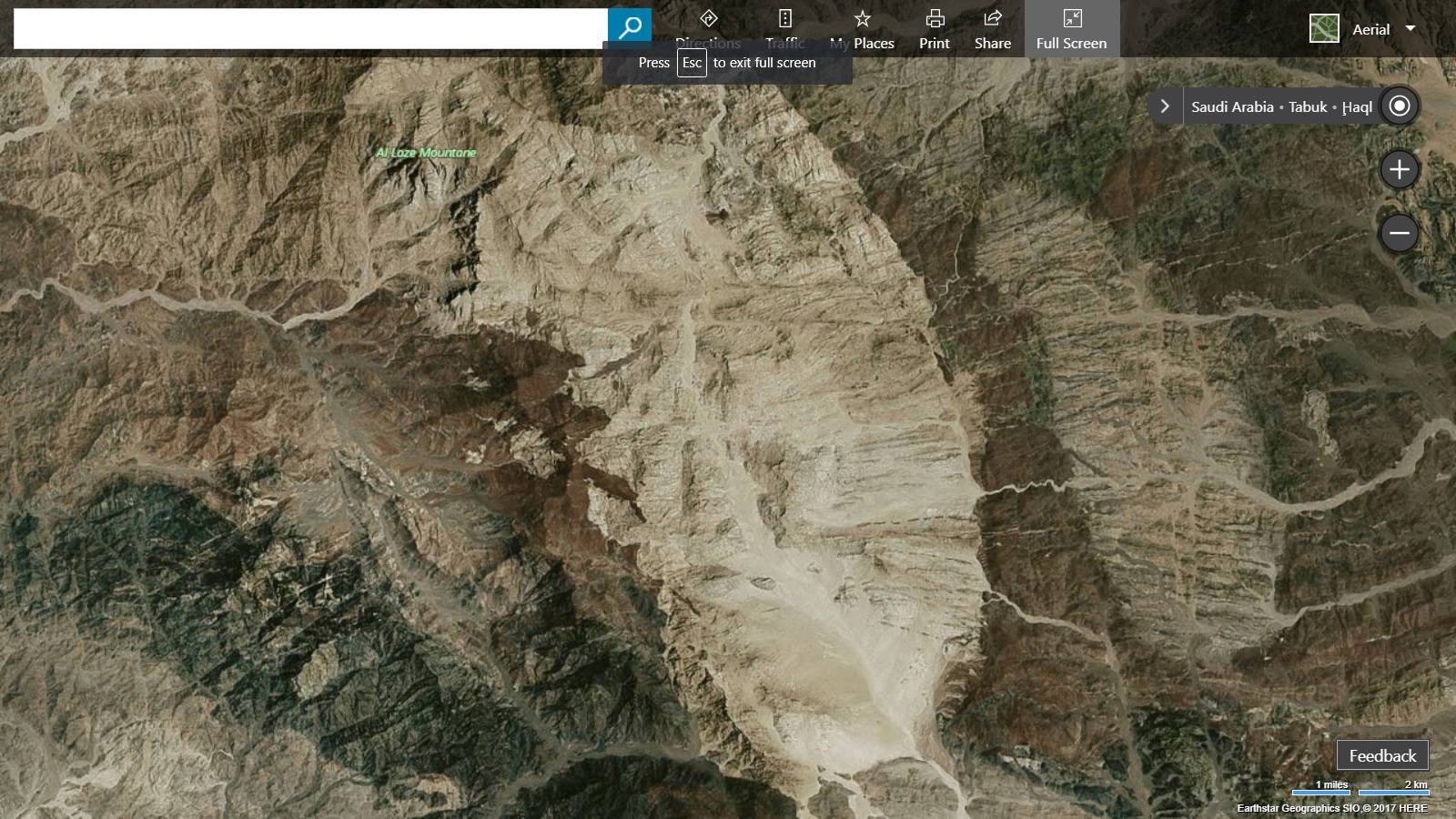
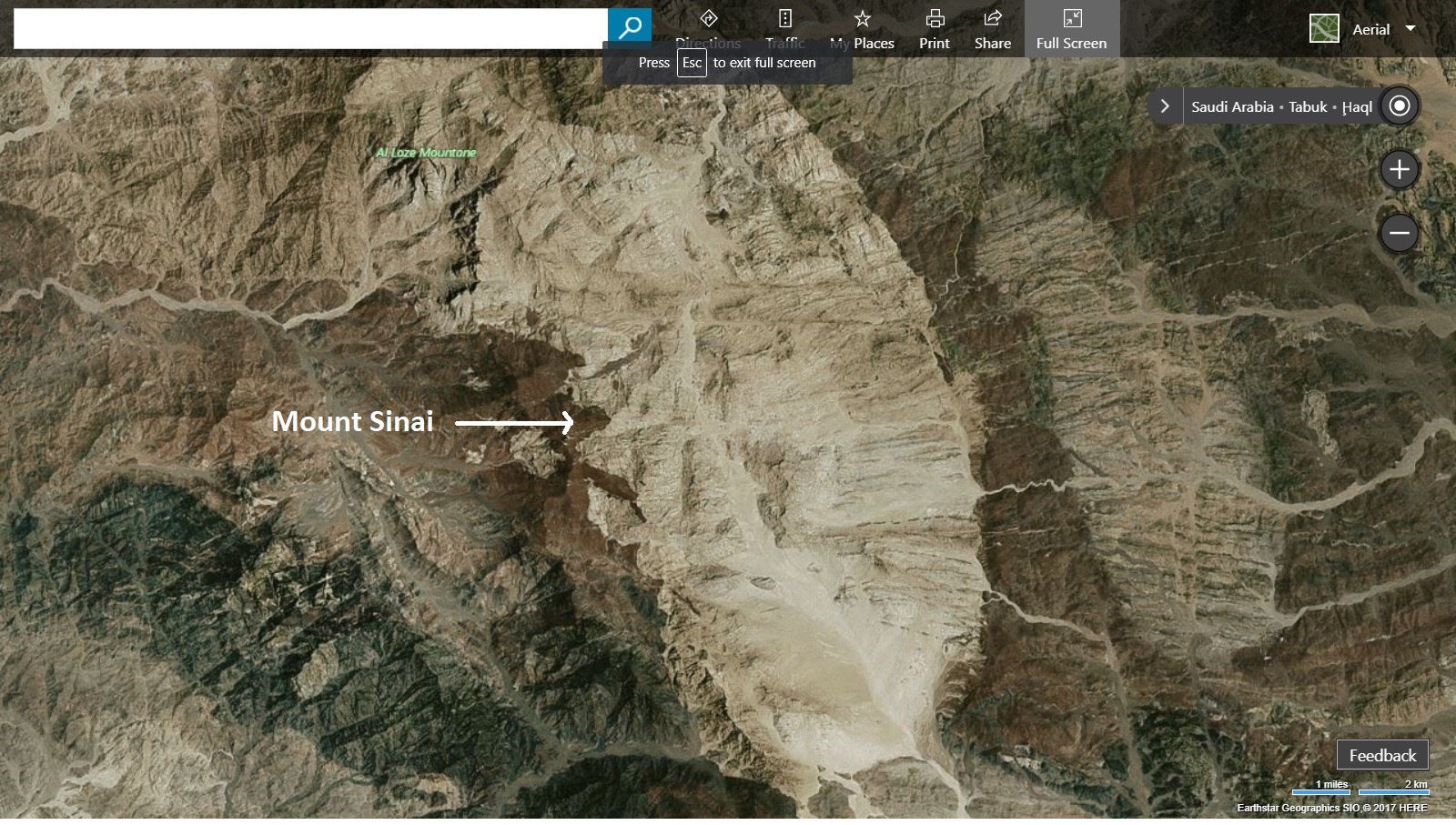
Looking into this circular area where Mount Sinai and the items related to Mount Sinai are located
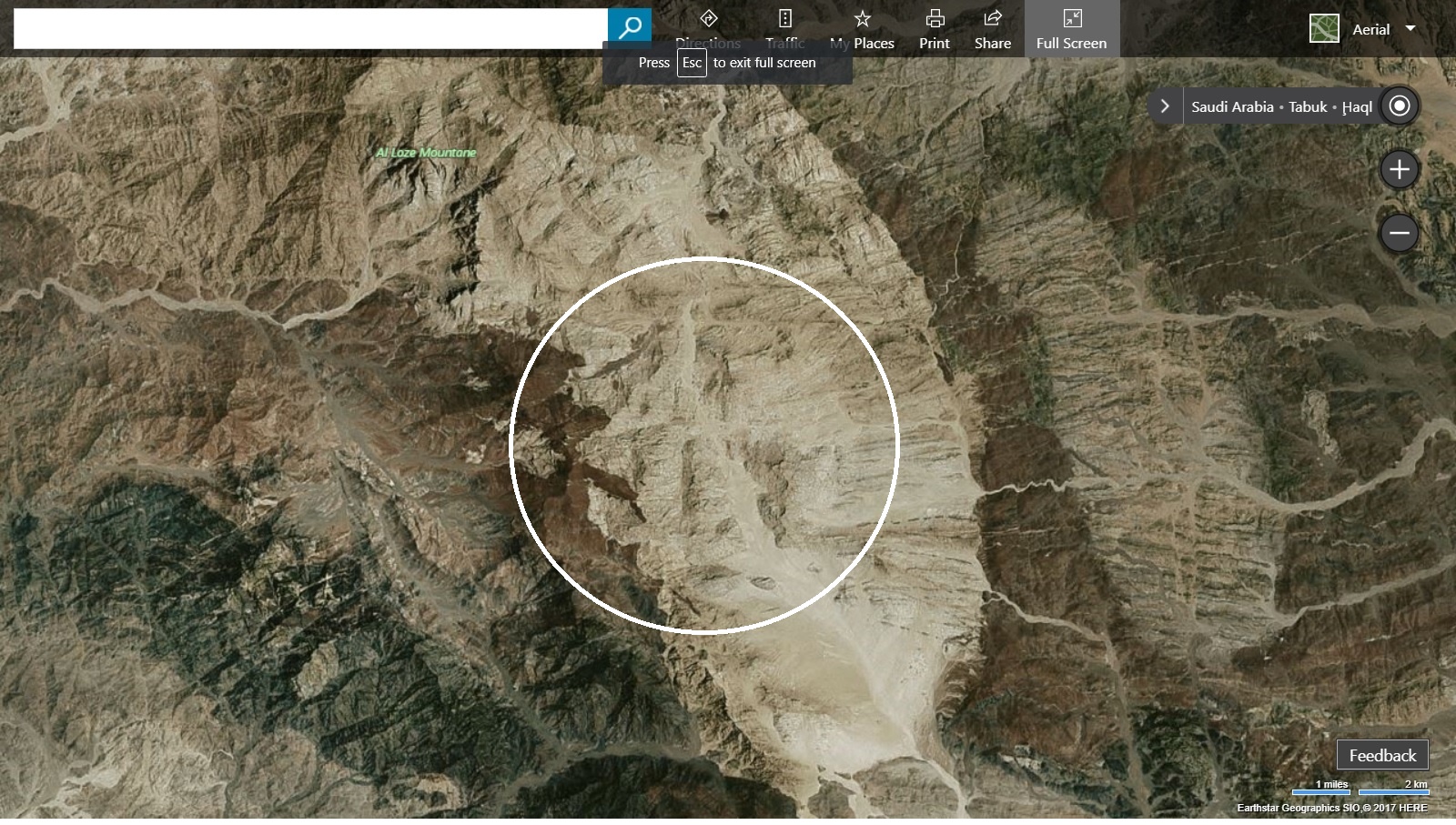
Does this circular area look like something relating to a part of an organ of the human body? How about the top view of a brain? The path makes a separation between the two shaped type lobes, with the left lobe and the right lobe noted in the image below
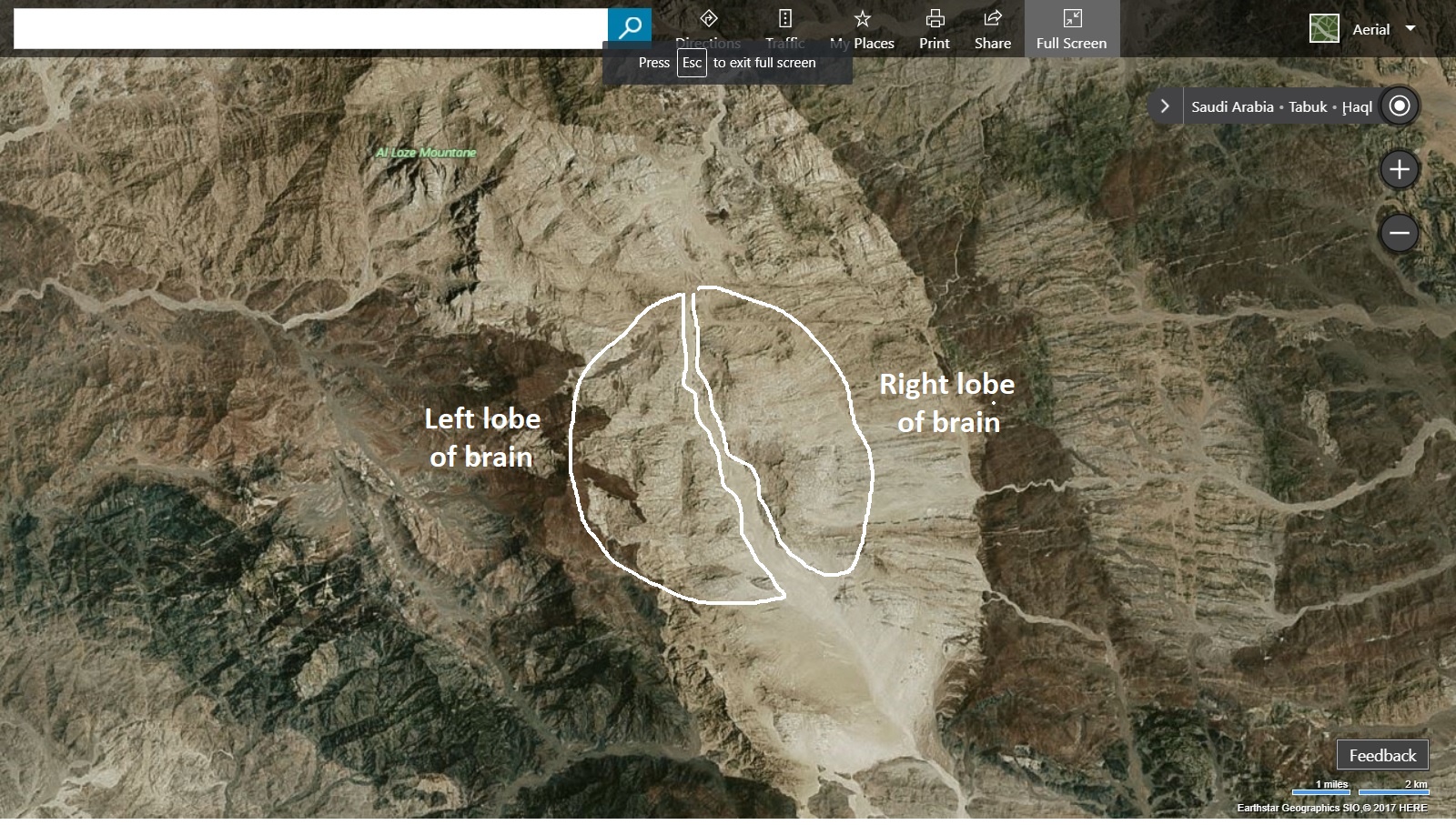
This could reveal to us that the top of the head of the brain is hwhy's "Command Center of Intelligence" where the Israelites received the Ten Words (Commandments). This could also symbolically portray the top of the head of the Israelites male's "uncovered head", so that hwhy could be their covering, which is based in the apostle Paul's letter to the assembly in Corinth
1 Corinthins 11:3 But I would have you know, that the head of every man is Messiah; and the head of the woman is the man; and the Head of Messiah is hwhy. 4 Every man praying or prophesying, having his head covered, dishonoureth his head. 5 But every woman that prayeth or prophesieth with her head uncovered dishonoureth her head: for that is even all one as if she were shaven. 6 For if the woman be not covered, let her also be shorn: but if it be a shame for a woman to be shorn or shaven, let her be covered. 7 For a man indeed ought not to cover his head, forasmuch as he is the image and glory of hwhy: but the woman is the glory of the man.
Looking at an image of this chart below shows the different functions on both sides of the lobes of the brain
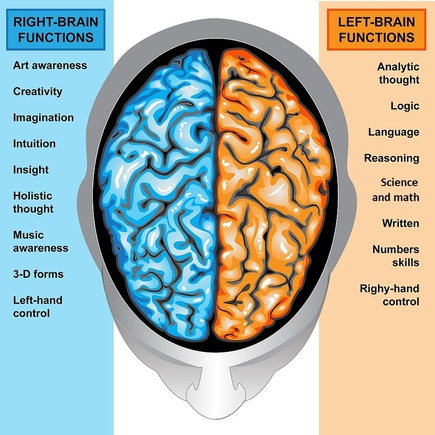
The left lobe is where our logic is located. This left lobe contains the locations of the border pillars that Moses set up at the base of Mount Sinai which is an act of keeping one in check, the altar of Moses which is an act of requirement, and the top of Mount Sinai where Moses received the Ten Words (Commandments) from hwhy which is an act of discipline. On the other hand, the right lobe is where our creativity is located, and this is the side where the Israelites used their creative skills to "create" the the golden calf. This is another satelite image showing both lobe sides with each of the locations in the Mount Sinai area showing the various points of interests
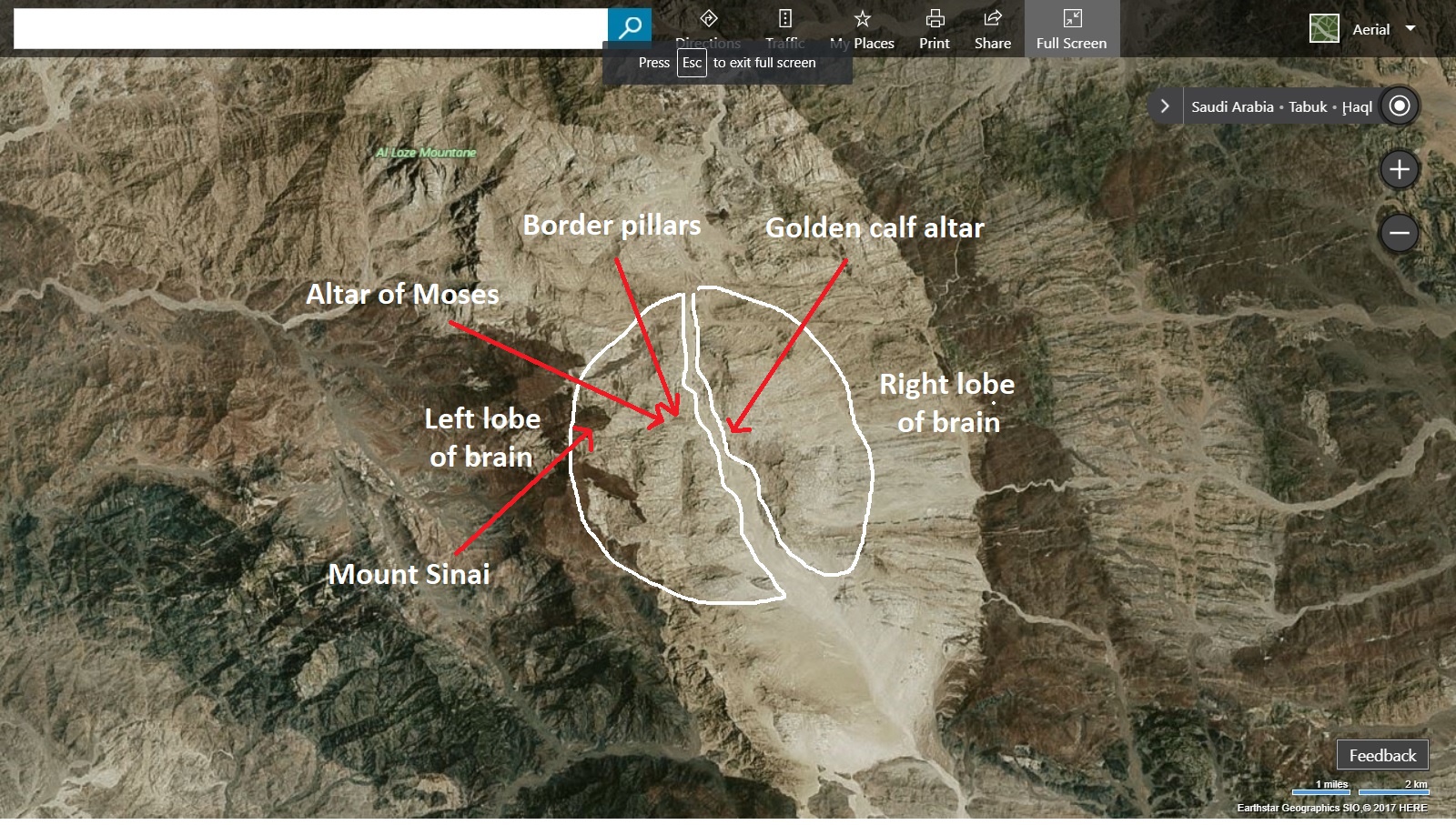
!!!hwhy Kl dbk
Jim and Penny Caldwell of Split Rock Research Foundation have a new DVD out, titled "Exploring Arabia's Sinai", containing four hours of videos and pictures of the Real Mount Sinai of Jubal al Lawz. Click on the image below to go to their website for further information.
- - - - - - - - - - - - - - - - - - - - - - - - - - - - - - - - - - - - - - - - - - - - - - - - - - - - - - - - - - - - - - - - - - - - - - - - - - - - - - - - - - -
DISCLAIMER
The views and opinions expressed are solely those of the personnel and do not necessarily reflect the view or opinions of The Aleph-Tav Project.
- - - - - - - - - - - - - - - - - - - - - - - - - - - - - - - - - - - - - - - - - - - - - - - - - - - - - - - - - - - - - - - - - - - - - - - - - - - - - - - - - - -
JIM AND PENNY CALDWELL
Exploring Arabia's Sinai
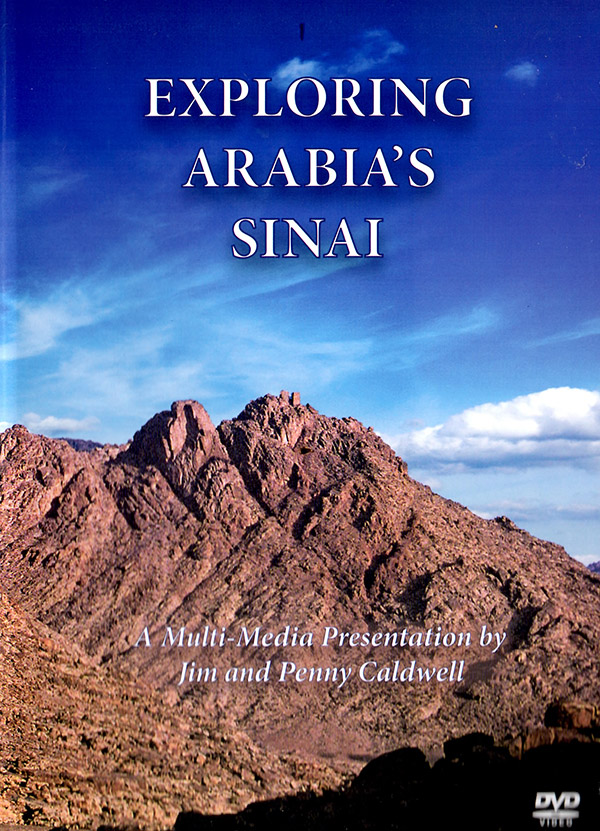
In verse one, it reveals the time the Israelites arrived at Mount Sinai. It clearly states in verse one that it was "this day" in the third month that the Israelites left Egypt.
The question is "What day did the Israelites leave Egypt"? The answer is found in the Torah portion of Masei, in the book of Numbers
Numbers 33:3 And they pulled up (journeyed) from Rameses in the first renewed month, on the five ten (fiveteen, fifteen) day of the first renewed month; after the Passover, the Sons of Israel, they went out on a high hand to the eyes of all of the Egyptians.
They left Egypt on "the fifteenth day" of Aviv/Nissan. That was the first day of their journey in the wilderness.
Going back to this week's Torah portion's passage, the phrase "in this day" is the Hebrew phrase "bay-yohm hazeh" (hzh mwyb), literally "on the day, the this", translated "on this day". An example of this phrase would be that someone would say "on the twentieth day on the month of July, a certain incident occurred on this day seven months ago", meaning that it occurred on January 20th. This is the same manner in verse one in this week's Torah portion. This verse was saying that the day they arrived at Mount Sinai was the same day they left Egypt. The day that the Israelites arrived at Mount Sinai was on the fifteenth day of the third month of Sivan. This means that it took the Israelites sixty days from the day they left Egypt to the time they arrived at Mount Sinai. It is now clear that their arrival to Mount Sinai did not traditionally occur before the Biblical Feast of Shavuoth (Pentecost), which occurs fifty days later during the period of the Feast of Unleavened Bread, between the fifteenth and twenty-first day of Aviv/Nissan.
Verses three and four
3 And Moses ascended her to The Elohim, and hwhy called to him from the mountain, to say, Thus you shall say to the House of Jacob, and you shall tell (declare) to the Sons of Israel; 4 You, you have seen which I did to Egypt, and I have bore (carried, lifted up) you upon wings of eagles, and I brought you to Me.
In relation to verse four where hwhy brought them out upon "wings of eagles", King David gave a memorial regarding King Saul and Prince Jonathan in how they were swifter than eagles in life, which is noted in the book of the prophet Samuel.
2 Samuel 1:23 Saul and Jonathan were lovely and pleasant in their lives, and in their death they were not divided: they were swifter than eagles, they were stronger than lions.
hwhy gives Israel this symbolic and reinforcing gesture to lift up and give hope to the sons of Israel, which is noted in the book of the prophet Isaiah
Isaiah 40:27 Why sayest thou, O Jacob, and speakest, O Israel, My Way is hid from hwhy, and My Judgment is passed over from my Elohim? 28 Hast thou not known? Hast thou not heard, that the everlasting Elohim, hwhy, the Creator of the ends of the earth, fainteth not, neither is weary? There is no searching of His Understanding. 29 He giveth power to the faint; and to them that have no might He increaseth strength. 30 Even the youths shall faint and be weary, and the young men shall utterly fall: 31 But they that wait upon hwhy shall renew their strength; they shall mount up with wings as eagles; they shall run, and not be weary; and they shall walk, and not faint.
Verses five and six
5 And now, if listening, you will listen in My Voice, and you will guard (keep, observe, heed) ta-My Covenant, and you shall be to Me a Special Treasure (Jewel, Peculiar Treasure) from all of the peoples: for all of the Earth belongs to Me: 6 And you, you shall be to Me a Kingdom of Priests, and a Sacred (Holy) Nation. These are the Words which you shall speak to the Sons of Israel.
hwhy was saying in verse five that "I own the earth, and the earth is My Property. Not yours". hwhy did not just owned it, but He created it, which is noted in the Torah portion of B'reyshith, in the book of Genesis
Genesis 1:1 In the first (beginning), Elohim created ta the Heavens and ta-the Earth.
hwhy also said to Moses that they would be a "Kingdom of Priests". That means the men would be Priests for the physical world if they obeyed Him. Today, we in Yeshua are of the Royal Priesthood of hwhy, our Heavenly Father, which the apostle Peter is noted in his epistle
1 Peter 2:9 But ye are a Chosen Generation, a Royal Priesthood, an Holy Nation, a Peculiar People; that ye should shew forth the praises of Him who hath called you out of darkness into His Marvellous Light:
We in Yeshua are Priests of hwhy, which is noted in the apostle John's book of Revelation
Revelation 1:4 John to the seven assemblies which are in Asia: Grace be unto you, and peace, from Him Who Is, and Who Was, and Who Is To Come; and from the seven Spirits which are before His Throne; 5 And from Yeshua, the Messiah, who is the Faithful Witness, and the First Begotten of the Dead, and the Prince of the Kings of the Earth. Unto Him that loved us, and washed us from our sins in His own Blood, 6 And hath made us Kings and Priests unto hwhy and his Father; to Him be glory and dominion for ever and ever. Amen.
Yeshua fulfilled these verses and made us Priests unto Him.
Looking at the word SPECIAL TREASURE
The Hebrew word for special treasure is "s'goo-lah"- Samek, Gimel, Lamed, Heh (hlgo). It is from Strong's Concordance number 5459, and its definition
Feminine passive participle of an unused root meaning to shut up; wealth (as closely shut up): - jewel, peculiar (treasure), proper good, special.
This is where we get our modern English word "goolah". Anyone who watched the Bugs Bunny cartoons, there was a cartoon where Bugs is in bed then water fills his room and floats him down a river to a castle where the mad scientist resides. Later in the cartoon the mad scientist has this big hairy, furry figure come out. The scientist tells it to get the rabbit, and it would receive a spider "goolah". I would not be surprised if Mel Blanc, who was Jewish, the voice of Bugs Bunny, hinted the idea of this word in his dialogue.
Verses seven and eight
7 And Moses came and called to the Elders of the People, and put (set) to their faces ta all of these Words which hwhy commanded him. 8 And all of the People, they answered together, and they said, All which hwhy has spoken we will do [(We will do all which hwhy has spoken)]. And Moses returned ta-the words of the People to hwhy.
This is what was commonly acknowledged as "The Marriage Contract". hwhy was taking the People unto Himself. hwhy was considered as "The Bridegroom" and the Israelites as "The Bride". This would be on the spiritual side of the Israelites.
What came to my attention was the Elders' words in verse eight of this week's Torah portion passage
8 ...All which hwhy has spoken we will do [(We will do all which hwhy has spoken)]....
Looking at the word SPOKEN
The Hebrew word for spoken is the "dah-vahr"- Dalet, Bet, Resh (rbd). It is from Strong's Concordance number 1696, and its defintion
A primitive root; perhaps properly to arrange; but used figuratively (of words) to speak; rarely (in a destructive sense) to subdue: - answer, appoint, bid, command, commune, declare, destroy, give, name, promise, pronounce, rehearse, say, speak, be spokesman, subdue, talk, teach, tell, think, use [entreaties], utter, X well, X work.
Davar means "to speak".
The way the Elders responded, they might as well have said "Yes, master". This response sounded more to what a slave would say rather than "a freed bride". When they left Egypt, even though they were physically free, they were still mentally, emotionally and spiritually slaves. Bill Cloud of Shoreshim Ministries noted this in when the Israelites left Egypt in last week's Torah portion of B'shalakh, in the book of Exodus, they had left Egypt, but Egypt was still in them. Israelites were still in bondage to Egypt. How many of us as believers are still slaves to certain things or matters of the past in our lives that we are still trying to break free. Keep trusting in hwhy, our Heavenly Father, and He will show us how to get free of it. As Yeshua noted in the Gospel of John
John 8:32 And ye shall know the Truth, and the Truth shall make you free.
Yeshua said this in two different means: Yeshua Himself as the Truth, and the revelations that He reveals to us. This is what the Israelite Elders and the People failed to see, and that is why later, in a series of events, that Israelite generation failed to enter into the Promised Land.
Sometimes it could be generational curses, and/or sometimes it was something that happened in our lives from an earlier point in time. One way to find out is to research, but the first thing we should do is what Yeshua noted in the Gospel of Matthew
Matthew 6:33 But seek ye first the Kingdom of hwhy, and His Righteousness; and all these things shall be added unto you.
Verse nine
9 And hwhy said to Moses, Behold, I will come to you in a Thick (Dense, Dark) Cloud in over (in order) that the People may hear in My speaking with you, and also in you, they may (will) believe Me for ages. And Moses told (declared) ta-the words of the People to hwhy.
Think about it. Moses went up to hear what hwhy wanted to say to the People, then goes down and tells them, then goes back up to tell hwhy what the People said, and now Moses had to go back down to tell the People what hwhy said to do. This reminds me of an account, which is noted in the Torah portion of Khai-yey Sarah, in the book of Genesis
Genesis 24:15 And was, before finishing to speak, and behold, Rebekah came out, which was birthed to Bethuel, son of Milcah, woman (wife) of Nahor, brother of Abraham, and her pitcher was upon her shoulder. 16 And the young woman was much good of form (appearance), a virgin, and a man had not known her: and she descended (went down) to the eye-well, and she filled her pitcher, and she ascended. 17 And the servant ran to meet (encounter) her, and said, I shall swallow (drink) now a little water from your pitcher. 18 And she said, Imbibe (Drink), my lord (master): and she hurried (hastened), and she descended (let down) her pitcher upon her hand, and she had him quaff (drink). 19 And she finished to have him quaff (drink), and she said, I will draw for your camels also until if they have finished to imbibe (drink). 20 And she hurried (hastened), and she emptied her pitcher to the trough, and she ran still to the bore-well to draw, and she drew for all of his camels.
Rebekah did a lot of leg work going up and down the slope when she was getting water for Eliezer, his men and the ten camels. It was probably between fifty and a hundred trips before all of them were quenched. Moses had to go up and down the mountain. This could be compared to what Rebekah did after all the trips Moses ascended and descended.
Notice in this week's Torah portion passage that the word "you" is bold in pink. In the Hebrew text, the you is in the feminine gender which tells us that hwhy was speaking to Moses' "soul", in which the soul, whether of a man or of a woman is "feminine". In this case hwhy is going to use Moses' "soul" to speak His Ten Words (Commandments) to the People. This is how Yeshua uses our souls as believers in Him to speak His Words whether via the Scriptures or a revelation or whatever means He uses us to speak to others.
!!!hwhy Kl dbk
Verses ten through thirteen
10 And hwhy said to Moses, Go to the People, and you shall sanctify them the day (today) and tomorrow, and they shall trample wash their clothes, 11 And they will be ready (prepared, established) for the third day: for on the third day, hwhy will descend (go down) to the eyes of all of the People upon Mount Sinai. 12 And you shall border off (boundarize) ta-the People all around, to say, Guard (Keep, Observe, Watch, Take heed) to yourselves, at ascending on the Mountain, and touching on his edge: Anyone that touches on the Mountain, dying, shall die: 13 A hand, she shall not touch on him, for skullstoning (scullcasting, stoning), shall be skullstoned (scullcasted, stoned), or yara-shot, shall be yara-shot; if an animal, if an man, shall not live: In the long sound (extended sound, prolonging) of the Jubilee Horn (yovel-long blast, yovel horn), they shall ascend on the Mountain.
This is an act to prepare and dress themselves and make themselves clean, neat and tidy. In other words, they are being prepared for "The Marriage Contract".
This could be compared of the parable of the wedding banquet, which is noted in the Gospel of Matthew
Matthew 22:1 And Yeshua answered and spake unto them again by parables, and said, 2 The Kingdom of Heaven is like unto a certain king, which made a marriage for his son, 3 And sent forth his servants to call them that were bidden to the wedding: and they would not come. 4 Again, he sent forth other servants, saying, Tell them which are bidden, Behold, I have prepared my dinner: my oxen and my fatlings are killed, and all things are ready: come unto the marriage. 5 But they made light of it, and went their ways, one to his farm, another to his merchandise: 6 And the remnant took his servants, and entreated them spitefully, and slew them. 7 But when the king heard thereof, he was wroth: and he sent forth his armies, and destroyed those murderers, and burned up their city. 8 Then saith he to his servants, The wedding is ready, but they which were bidden were not worthy. 9 Go ye therefore into the highways, and as many as ye shall find, bid to the marriage. 10 So those servants went out into the highways, and gathered together all as many as they found, both bad and good: and the wedding was furnished with guests. 11 And when the king came in to see the guests, he saw there a man which had not on a wedding garment: 12 And he saith unto him, Friend, how camest thou in hither not having a wedding garment? And he was speechless. 13 Then said the king to the servants, Bind him hand and foot, and take him away, and cast him into outer darkness; there shall be weeping and gnashing of teeth. 14 For many are called, but few are chosen.
In this parable, the guests were people from all walks of life. Yet it didn't say, but it became revealed in verse twelve of the Gospel of Matthew that the people were cleaning up and dressing themselves for the wedding. This is the same means for the Israelites back at Mount Sinai.
In verses twelve and thirteen of this week's Torah portion passage, hwhy set boundaries around the mountain, preventing the People and the animals from going beyond it. Though they were to be Priests, there were still restrictions and "boundaries".
Indirectly related, there was another boundary commandment where the Israelites were not to walk close to the Tabernacle and using the Levitical Priests as the barrier of protection surrounding it, which is noted in the Torah portion of B'midbar, in the book of Numbers
Numbers 1:48 And hwhy spoke to Moses to say, 49 Only, you shall not visit (account, count) ta-the tribe of Levi, and you shall not lift up (bear) ta-their heads in the midst of the Sons of Israel: 50 And you shall visit (account, muster, bestow, oversee) ta-the Levites over (upon) the Tabernacle of the Testimony (Witness), and over (upon) all of his Vessels, and over (upon) all which belongs to him: they, they shall lift up (bear, carry) ta-the Tabernacle and ta-all of his Vessels; and they, they shall minister him, and they shall encamp all around the Tabernacle. 51 And in pulling up (journeying) the Tabernacle, the Levites shall take him down [(make him descend)]: and in pitching (camping) the Tabernacle, the Levites shall raise him up: and the stranger that draws near shall die. 52 And the Sons of Israel shall pitch (encamp), a man shall be upon his encampment, and a man shall be upon his standard (banner, flag) to their armies. 53 And the Levites, they shall encamp all around by the Tabernacle of the Testimony (Witness), and shall not be wrath upon the Congregation of the Sons of Israel: and the Levites, they shall keep (guard, observe) ta-the Charge of the Tabernacle of the Testimony (Witness). 54 And the Sons of Israel did as all that hwhy commanded ta-Moses, so they did.
In this week's Torah portion's passage, the fact that hwhy also said they could not touch it, not even a hand. One would say to Him, "Boy, is He strict". It was probably that they were not set apart like Moses was. Also the mountain was "Holy", and they were not set apart to have access to it.
This upcoming event was like an eternal official ceremony. This was huge. It is comparable to a new British king or queen being ceremonially inaugurated into their reign to be the ruler of the country.
Looking at the word JUBILEE HORN (YOVEL-BLAST, YOVEL HORN)
The Hebrew word jubilee horn (yovel-blast, yovel horn) is "yoh-veyl"- Yod, Bet, Lamed (lby). It is from Strong's Concordance number 3104, and its definition
Apparently from H2986; the blast of a horn (from its continuous sound); specifically the signal of the silver trumpets; hence the instrument itself and the festival thus introduced: - jubile, ram’s horn, trumpet.
from 2986 "yah-vahl (lby), and its definition
A primitive root; properly to flow; causatively to bring (especially with pomp): - bring (forth), carry, lead (forth).
This Jubilee shofar blow was a type of a "royal ceremonial sound". I would not be surprised that the year the Israelites left Egypt was in a Jubilee year and would be the very first Jubilee year for the Israelites. That is why the sound should be called "The Shofar Blowing of the Jubilee". This was also the first blowing from the heavens in world history.
Moses was told of this on the fifteenth day of the third month of Sivan. The day was the fifteenth, and tomorrow was the sixteenth. The third day would fall on the seventeenth day of the third month of Sivan, as we will see the account in the next verses.
In verse ten, hwhy told Moses that they were to wash their garments. My question is "How did they wash their garments in a desert area of thorn bushes?". What has been realized at Mount Sinai that there was a brook flowing from the mountain to the base of the Sinai area.
These images reveal the location and the flow of the brook from Mount Sinai
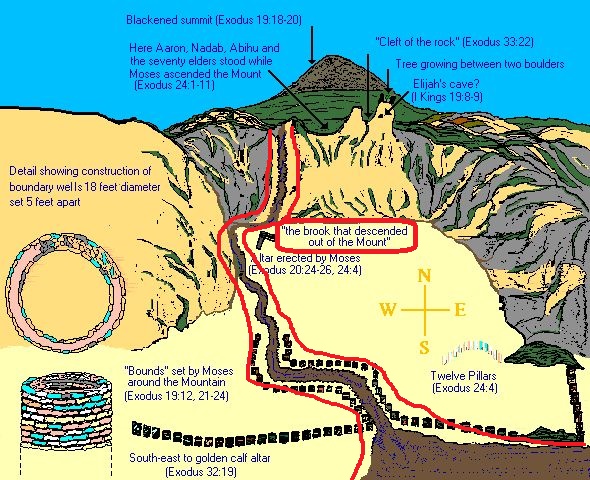
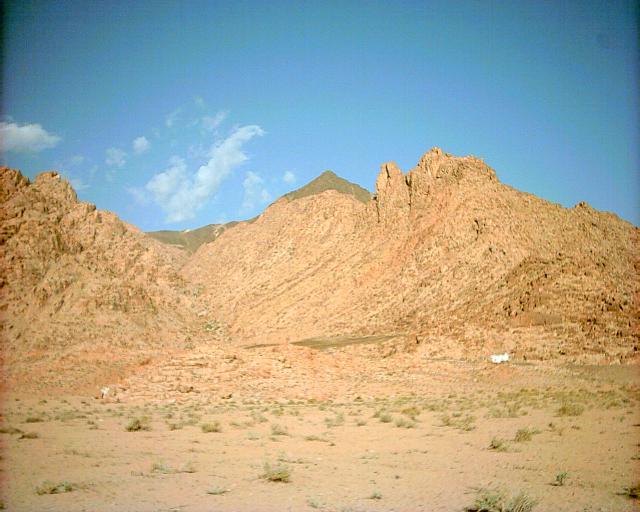
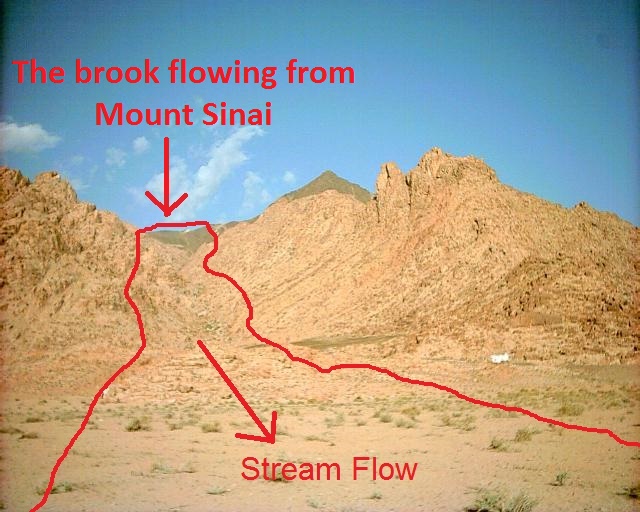

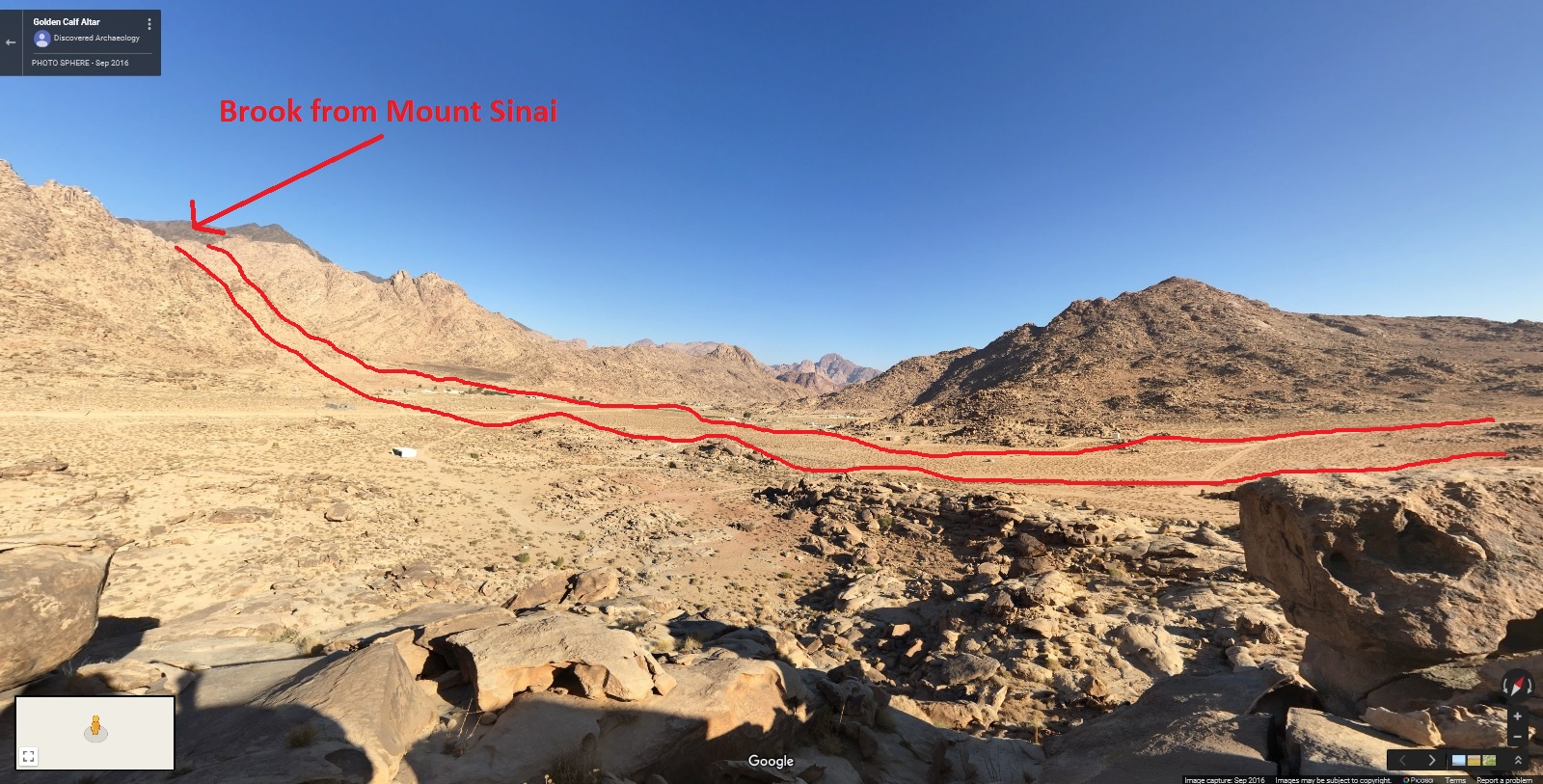
!!!hwhy Kl dbk
Verses fourteen and fifteen
14 And Moses descended (went down) from the Mountain to the People, and sanctified ta-the People; and they trample washed their clothes. 15 And said to the People, Be ready (prepared, established) for three days: you shall not approach to a woman.
Notice that hwhy said for the men not to go near with a woman. Why did Moses say that? Because it would make them unclean for that day, which is the precursor in the Torah portion of M'tsora, in the book of Leviticus
Leviticus 15:16 And if she shall go out of a man from him a copulation (laying) of seed, and shall bathe ta-all of his flesh in the water, and shall be unclean until the mixing period (evening). 17 And every garment and every skin (leather) which shall be a copulation (laying) of seed upon him, and shall bathe in the water, and shall be unclean until the mixing period (evening). 18 And a woman who shall be lain of a man of her has a copulation (laying) of seed, and they shall bathe in the water, and they shall be unclean until the mixing period (evening).
This is, because the men were to be "a Kingdom of Priests". This also tells us that when hwhy and Moses notes "the People", they are noting "the males" of Israel, unlike what the movies portray.
Looking at the word APPROACH
The Hebrew word for approach is "nah-gash"- Nun, Gimel, Shin (sgn). It is from Strong's Concordance number 5066, and its definition
A primitive root; to be or come (causatively bring) near (for any purpose); euphemistically to lie with a woman; as an enemy, to attack; religiously to worship; causatively to present; figuratively to adduce an argument; by reversal, to stand back: - (make to) approach (nigh), bring (forth, hither, near), (cause to) come (higher, near, nigh), give place, go hard (up), (be, draw, go) near (nigh), offer, overtake, present, put, stand.
The phrase, "approach", in this case, is an emphasis to lie with a woman". It also means "religiously to worship", meaning they would encounter "spiritual worship", which hwhy didn't want for those three days until after the meeting. Another purpose of a man and his wife to lie together is an act of "spiritual warfare". When they reach their points it is an act of "worship"- "nagash".
Verses sixteen through nineteen
THE SEVENTEENTH DAY OF THE THIRD MONTH OF SIVAN
THE SIXTY THIRD DAY AFTER THE ISRALITES LEFT EGYPT
16 And was on the third day in being the breaking period (morning), and were sounds and lightnings, and a Heavy Cloud was upon (over) the Mountain, and the voice of a Shofar was much strong; and all of the People which were in the Camp shuddered (quaked, discomfited, trembled). 17 And Moses brought out ta-the People from the Camp to meet (encounter) The Elohim; and they stood on (among) the bottom [(on (among) under, on (among) below)] the Mountain. 18 And Mount Sinai was smoking, all of him, from the facing which hwhy descended (came down) upon (over) him in the Fire: and His Smoke ascended like the smoke of the smelting furnace, and all of the Mountain shuddered (quaked, discomfited, trembled) much. 19 And the sound of the Shofar was continuing (walking), and much strong. Moses spoke, and The Elohim answered him in a Voice.
We have to remember that it was the men only, and not including the women, that came to the base of the mountain. As it said, they are to be a "Kingdom of Priests" not "Priests and Priestesses".
This was hwhy's equivalence of fireworks, bombs bursting in air, fanfare, and a pomp and circumstance of a celebrative introduction to have a relationship with His People.
Indirectly related, there was a similar account of the sounds without the visual effects where Yeshua asked the Heavenly Father to glorfy His Name, which is noted in the Gospel of John
John 12:20 And there were certain Greeks among them that came up to worship at the Feast: 21 The same came therefore to Philip, which was of Bethsaida of Galilee, and desired him, saying, Sir, we would see Yeshua. 22 Philip cometh and telleth Andrew: and again Andrew and Philip tell Yeshua. 23 And Yeshua answered them, saying, The hour is come, that the Son of Man should be glorified. 24 Verily, verily, I say unto you, Except a grain of wheat fall into the ground and die, it abideth alone: but if it die, it bringeth forth much fruit. 25 He that loveth his life shall lose it; and he that hateth his life in this world shall keep it unto life eternal. 26 If any man serve Me, let him follow Me; and where I am, there shall also My servant be: if any man serve Me, him will My Father honour. 27 Now is My Soul troubled; and what shall I say? Father, save Me from this hour: but for this cause came I unto this hour. 28 Father, glorify Thy Name. Then came there a Voice from the heavens, saying, I have both glorified It, and will glorify It again. 29 The people therefore, that stood by, and heard It, said that It thundered: others said, An angel spake to Him. 30 Yeshua answered and said, This Voice came not because of Me, but for your sakes.
There is a future event of a precursor to Yeshua coming down to earth in glory, which is noted in the book of Revelation
Revelation 6:12 And I beheld when He had opened the sixth seal, and, lo, there was a great earthquake; and the sun became black as sackcloth of hair, and the moon became as blood; 13 And the stars of the heavens fell unto the earth, even as a fig tree casteth her untimely figs, when she is shaken of a mighty wind. 14 And the heavens departed as a scroll when it is rolled together; and every mountain and island were moved out of their places. 15 And the kings of the earth, and the great men, and the rich men, and the chief captains, and the mighty men, and every bondman, and every free man, hid themselves in the dens and in the rocks of the mountains; 16 And said to the mountains and rocks, Fall on us, and hide us from the Face of Him that sitteth on the Throne, and from the Wrath of the Lamb: 17 For the great day of His Wrath is come; and who shall be able to stand? 18 And there were voices, and thunders, and lightnings; and there was a great earthquake, such as was not since men were upon the earth, so mighty an earthquake, and so great.
Just like the nations of the earth trembled at this future event of the sounds and lightnings and the earthquake, so did the Israelites tremble at this pomp introduction of the same activities at Mount Sinai.
Looking at the word CONTINUING (WALKING)
The Hebrew word for continuing (walking) is "hah-lakh"- Heh, Lamed Caph Sophit (Klh). It is from Strong's Concordance number 1980, and its defintion
Akin to H3212; a primitive root; to walk (in a great variety of applications, literally and figuratively): - (all) along, apace, behave (self), come, (on) continually, be conversant, depart, + be eased, enter, exercise (self), + follow, forth, forward, get, go (about, abroad, along, away, forward, on, out, up and down), + greater, grow, be wont to haunt, lead, march, X more and more, move (self), needs, on, pass (away), be at the point, quite, run (along), + send, speedily, spread, still, surely, + tale-bearer, + travel (-ler), walk (abroad, on, to and fro, up and down, to places), wander, wax, [way-] faring man, X be weak, whirl.
from 3212 "yah-lakh" (Kly), and its definition
A primitive root (compare H1980); to walk (literally or figuratively); causatively to carry (in various senses): - X again, away, bear, bring, carry (away), come (away), depart, flow, + follow (-ing), get (away, hence, him), (cause to, make) go (away, -ing, -ne, one’s way, out), grow, lead (forth), let down, march, prosper, + pursue, cause to run, spread, take away ([-journey]), vanish, (cause to) walk (-ing), wax, X be weak.
This is the same Hebrew word that translates "walk". So one could translate the passage that the Shofar was "walking" on the mountain. This could be compared to an account which is noted in the Torah portion of Lekh L'kha, in the book of Genesis
Genesis 15:10 And took for himself ta-all of these, and chopped (divided) them in the midst, and laid a man of his part by the meeting (encountering, opposite) of his neighbor: and ta-the birds were not chopped (divided). 11 And descended (came down) birds of prey upon the faintish carcases, and Abram dispersed them away. 12 And was at the sun to go down, and a deep sleep (trance, stupor) fell upon Abram; and, behold, a fright (terror) of great darkness fell upon him. 13 And said to Abram, Knowing, you shall know for your seed shall be a sojourner (stranger) in a land not belonging to them, and shall serve them; and they shall afflict them four hundred years; 14 And also ta-the nation, which they shall serve will I judge: and after thus, shall they come out among a great substance (goods, property). 15 And you, you shall go to your fathers in peace; you shall be buried in good (well) satisfaction. 16 And the fourth generation, they shall return here: for the iniquity of the Amorites was not repaid (paid back, complete, whole) until now. 17 And was, the sun had gone down, and was dusk (twilight), and behold, a smoking fire pot (furnace) and a fiery torch which went over between those pieces (parts).
Verse twenty
20 And hwhy descended (came down) upon (over) Mount Sinai to the head of the Mountain: and hwhy called to Moses to the head of the Mountain; And Moses ascended.
How would you like to see Moses go up to the top of the mountain leaving you behind with all the supernatural acts going around you while you are trembling? Wouldn't you like to ask Moses "Where are you going"? "Why are you leaving us"? "How can you leave us in our circumstances"?
Indirectly related, this can be compared to Yeshua to a mountain, which is noted in the Gospel of Matthew
Matthew 17:1 And after six days Yeshua taketh Peter, James, and John, his brother, and bringeth them up into an high mountain apart, 2 And was transfigured before them: and His Face did shine as the sun, and His Raiment was white as the light. 3 And, behold, there appeared unto them Moses and Elias talking with Him. 4 Then answered Peter, and said unto Yeshua, Lord, it is good for us to be here: if Thou wilt, let us make here three tabernacles; one for Thee, and one for Moses, and one for Elias. 5 While he yet spake, behold, a Bright Cloud overshadowed them: and behold a Voice out of the Cloud, which said, This is My Beloved Son, in whom I am well pleased; hear ye Him. 6 And when the disciples heard It, they fell on their face, and were sore afraid. 7 And Yeshua came and touched them, and said, Arise, and be not afraid. 8 And when they had lifted up their eyes, they saw no man, save Yeshua only. 9 And as they came down from the mountain, Yeshua charged them, saying, Tell the vision to no man, until the Son of Man be risen again from the dead.
In my humble but strong opinion, this Gospel account took place at "Mount Sinai", because the two people who were at Mount Sinai before Yeshua's were "Moses" and "Elijah". This is the account of Elijah, which is noted in the book of the Kings
1 Kings 19:7 And the Messenger of hwhy came again the second time, and touched him, and said, Arise and eat; because the journey is too great for thee. 8 And he arose, and did eat and drink, and went in the strength of that meat forty days and forty nights unto Horeb the Mountain of the Elohim. 9 And he came thither unto a cave, and lodged there; and, behold, the Word of hwhy came to him, and He said unto him, What doest thou here, Elijah?
There is a possibility that the apostle Paul was also at Mount Sinai, which is noted in his letter to the assembly in Galatia
Galatians 1:17 Neither went I up to Jerusalem to them which were apostles before me; but I went into Arabia, and returned again unto Damascus.
Because Mount Sinai is located in northeastern Saudi Arabia.
Indirectly related, the apostle Paul compared Mount Sinai to Hagar, which is noted in his letter to the assembly in Galatia
Galatians 4:22 For it is written, that Abraham had two sons, the one by a bondmaid, the other by a freewoman. 23 But he who was of the bondwoman was born after the flesh; but he of the freewoman was by promise. 24 Which things are an allegory: for these are the two covenants; the one from the mount Sinai, which gendereth to bondage, which is Agar. 25 For this Agar is Mount Sinai in Arabia, and answereth to Jerusalem which now is, and is in bondage with her children. 26 But Jerusalem which is above is free, which is the mother of us all.
Verses twenty-one through twenty five
21 And hwhy said to Moses, Descend (Go down), at the testifying (the witness, the warning) against the People, lest (facing) they pull (break through) to see to hwhy, and multiple of them will fall. 22 And also the Priests that are approaching to hwhy, they shall be sanctified, lest (facing) hwhy shall breach (burst forth, press forth) among them. 23 And Moses said to hwhy, The People are not able to ascend to Mount Sinai: for you, you had the testifying (witnessing, warning) against us, to say, border (boundarize) ta-the Mountain, and sanctify him. 24 And hwhy said to him, Go, descend (go down), and you shall ascend, you, and Aaron with you: and the Priests and the People, they shall not pull (break through) to ascend to hwhy, lest shall breach (burst forth, press forth) among themselves. 25 And Moses descended (went down) to the People, and spoke to them.
In verses twenty two and twenty four of this week's Torah portion passage, It shows that hwhy has acknowledged the Israelite males to be "Priests". This would include the mixed multitude males- Cushites, Egyptians, Edomites, Canaanites, etc. This must have been a cool scene. This was the first record of the "Melting Pot Nation" for Israel, about 3,200 years before the United States became the "American Melting Pot".
When hwhy was telling Moses to have the "Priests" come up the mountain, I guess hwhy forgot that He said to set boundaries for the People not to touch the area. Or did He? It was most likely that hwhy was testing Moses to see if he remembered His Words, though hwhy altered the way He said it by saying only noting the Priests. Moses passed the test by reminding hwhy of the Word He said to him. Sometimes hwhy will play dumb on purpose in our lives as believers in Yeshua to see if we remembered what He said to us in an earlier point in time to make us remind Him of His Word. Sometimes the Heavenly Father does this to us, to remind Him what He said to us in an earlier point in time.
When Moses came back up to the mountain, he brought Aaron with him.
The third day is a type of Yeshua, returning on the third day, which is based on the book of the prophet Hosea
Hosea 6:2 Shall keep us alive in two days: shall raise us up in the third day, and we shall live to His Face.
To the kingdom, a day is as a thousand years, which is apostle Peter noted in his epistle
2 Peter 3:8 But, beloved, be not ignorant of this one thing, that one day is with the Lord as a thousand years, and a thousand years as one day.
Yeshua came to earth on the four thousandth year, or in the Kingdom's time, the fourth day. It has been nearly two thousand years since Yeshua's life and resurrection (two days in the kingdom), which will be for us the end of the sixth thousandth year (sixth day). The third day, which would be the seven thousandth year (seventh day), will the the thousand years of rest, or to be biblically called "The Shabbath Millennium".
Notice in verse twenty four of this week's Torah portion passage that the word "you" is bold in pink. In the Hebrew text, the you is in the feminine gender which tells us that hwhy was speaking to Moses' "soul", in which the soul, whether of a man or of a woman is "feminine". In this case hwhy was telling Moses' soul to bring Aaron with him to ascend to the Mountain. This could compare to us as believers in Yeshua that we will ascend to be with Yeshua in the clouds, which is noted by the apostle Paul in his letter to the assembly in Thessalonica
1 Thessalonians 4:13 But I would not have you to be ignorant, brethren, concerning them which are asleep, that ye sorrow not, even as others which have no hope. 14 For if we believe that Yeshua died and rose again, even so them also which sleep in Yeshua will hwhy bring with him. 15 For this we say unto you by the Word of the Adon, that we which are alive and remain unto the coming of the Adon shall not prevent them which are asleep. 16 For the Adon himself shall descend from heaven with a shout, with the voice of the archangel, and with the Trump of hwhy: and the dead in Messiah shall rise first: 17 Then we which are alive and remain shall be caught up together with them in the clouds, to meet the Adon in the air: and so shall we ever be with the Adon. 18 Wherefore comfort one another with these words.
!!!hwhy Kl dbk
CHAPTER 20
Exodus 20:1-26
Exo 20:1 And Elohim spoke ta all of these Words, to say,
2 I am hwhy, your Elohim, which brought you out from the land of Egypt, from the house of bondages (slaves, slaveries).
3 Shall not be for yourself no other elohim upon (over) My Face. 4 You shall not do (make) for yourself a vessel image (carved image), and any image (form, likeness) which is in the Heavens from with above, and the which is in the Earth from below, and the which is in the waters from underneath to the Earth: 5 You shall not bow to them, and you shall not serve them: for I am hwhy, your Elohim, am a Jealous El [(am El Jealous)], visiting the iniquity of the fathers, upon the sons, upon the threes, and upon the fours for hating Me; 6 And doing kindness to the thousands for loving Me, and for keeping (guarding, observing, heeding) My Commandments.
7 You shall not lift up (bear, carry) ta-the Name of hwhy, your Elohim, for vanity (falsehood, useless, naught); for hwhy will not leave guiltless (innocent, unpunished) ta which lifts up (bear, carry) ta-His Name for vanity (falsehood, useless, naught).
8 Remember ta-the Shabbath Day to sanctify him. 9 Six days you shall serve (labor), and you shall do all of your work: 10 And the seventh day is a Shabbath to hwhy, your Elohim: You shall not do any work, you, and your son, and your daughter, your male servant, and your female servant, and your animal, and your sojourner (stranger) which is in your gates: 11 For six days, hwhy did (made) ta-the Heavens and ta-the Earth, ta-the sea, and of ta-all which is in them, and rested (relaxed, settled down) on the seventh day: Upon thus, hwhy blessed ta-the Shabbath day and sanctified him.
12 Honor (Give weight at) ta-your father and ta-your mother, by that, your days may be lengthened (long) upon the ground which hwhy, your Elohim, is giving to you.
13 You shall not murder.
14 You shall not commit adultery [(You shall not adulterate)].
15 You shall not steal.
16 You shall not have a false (deceitful, lying, shamming) witness (testifier) [(a witness (testifier) of falsehood (deceit, lie, sham))] answering (eye-testifying) against your neighbor. [(You shall not answer (eye testify) against your neighbor having a false (deceitful, lying, shamming) witness (testifier) [(a witness (testifier) of falsehood (deceit, lie, sham))])]
17 You shall not covet (desire, delight) the house (household) of your neighbor; you shall not covet (desire, delight) the woman (wife) of your neighbor, and his male servant, and his female servant, and his ox, and his donkey, and anything which belongs to your neighbor.
18 And all of the People saw ta-the sounds, and ta-the flashings, and ta the sound of the Shofar, and ta-the mountain smoking: and the People saw, and they moved back (staggered, staggered back), and they stood from a distance. 19 And they said to Moses, You speak with us, and we will listen: And let not Elohim speak with us, facing (lest) we die [(facing (lest) we be the death)]. 20 And Moses said to the People, Do you not fear: for by in order (in over) The Elohim has come to test (try, prove) you, and in order (in over) His Reverence (Aweness, Fear), she may be upon your faces, by failing you at sinning. 21 And the People stood from a distance, and Moses approached to the gloominess (thickness, dark) which The Elohim was there.
22 And hwhy said to Moses, Thus, you shall say to the Sons of Israel, You, you have seen for I have spoken with you from the Heavens. 23 You shall not do (make) with Me elohim of silver, and you shall not do (make) for yourselves elohim of gold [(and elohim of gold; you shall not do (make) for yourselves)]. 24 You shall do (make) for Me an Altar of Ground, and you shall sacrifice upon him ta-your Elevation Offerings (Ascension Offerings, Burnt Offerings), and ta-your Peace Offerings, ta-your flocks, and ta-your herds: In any of the place which I will memorialize ta-My Name; I will come to you, and I will bless you. 25 And if you will do (make) for Me an Altar of stones, you shall not build them of hewn stone (tampered stone, chiseled stone): For your cutting tool (mattock, pickax) will vibrate (quiver, shake) upon her, and you will profane (wound) her. 26 And you will not ascend on elevated steps (elevated stairs) upon My Altar, that you will not uncover (expose, exile) your nakedness upon him.
(NOTE: Not all words will have comments)
Verse one
THE TEN WORDS (COMMANDMENTS)
THE EIGHTEENTH DAY OF THE THIRD MONTH OF SIVAN, THE SIXTY THIRD DAY AFTER ISRAEL LEFT EGYPT
1 And Elohim spoke ta all of these Words, to say,
In other words, hwhy was saying that He is "the Author" of these Words, which are known as The Ten Commandments, but these are "the Ten Words" which were "SPOKEN"- the Ten "Spoken" Words (Commandments)- before they were written. This goes back to what the Israelites response to Moses in the previous chapter of this week's Torah portion
Exodus 19:7 ...All which hwhy has spoken we will do [(We will do all which hwhy has spoken)]....
Mark Biltz from El Shaddai Ministries noted that is was not called "the Ten Commandments", but "the Ten Words", in the Hebrew "Asereth Ha-D'vareem" (Myrbdh trse), which is noted in the Torah portion of Ki Thisa, in the book of Exodus
Exodus 34:28 And was there with hwhy forty days (daily) and forty nights (nightly); did not eat bread and did not drink water. And wrote upon the Tablets ta the Words of the Covenant, the Ten Words (Myrbdh trse).
Monte Judah of Lion and Lamb Ministries coined these as the "Spoken Commandments", and to make note, these words (commandments) were "spoken" before they were written on the two tables of stones.
I will be noting them as the Ten Words (Commandments).
What hwhy will be speaking in these Ten Words (Commandments) is "The Marriage Contract" between Himself and the Israelite People. Don't forget that hwhy was speaking to the "males", because they are the "heads" of the families. This is also noted in the previous chapter of this week's Torah portion
Exodus 19:5 And now, if listening, you will listen in My Voice, and you will guard (keep, observe, watch) ta-My Covenant, and you shall be to Me a Special Treasure (Jewel, Peculiar Treasure) from all of the peoples: for all of the Earth belongs to Me: 6 And you, you shall be to Me a Kingdom of Priests, and a Sacred (Holy) Nation. These are the Words which you shall speak to the Sons of Israel.... 14 And Moses descended (went down) from the Mountain to the People, and sanctified ta-the People; and they trample washed their clothes. 15 And said to the People, Be ready (prepared, established) for three days: you shall not approach to a woman.
They, as fathers, will be responsible to keep their families, as well as their households, in touch with the Ten Words (Commandments).
The reason is, that we were used to hearing them as "commandments", but that is misleading, in which will be explained a little more on the First Word (Commandment).
As I noted in past Torah portions, Yeshua is "the Living Word" made flesh, which is noted in the Gospel of John
John 1:1 In the beginning was the Word, and the Word was with Elohim, and the Word was Elohim. 2 The Same was in the beginning with Elohim. 3 All things were made by Him; and without Him was not any thing made that was made. 4 In Him was Life; and the Life was the light of men. 5 And the Light shineth in darkness; and the darkness comprehended Him not.... 14 And the Word was made Flesh, and dwelt among us, (and we beheld His Glory, the Glory as of the Only Begotten of the Father,) full of Grace and Truth.
In other words, Yeshua is revealed as "the Living Word made Flesh".
!!!hwhy Kl dbk
Mark Biltz of El Shaddai Ministries noted that Yeshua was tempted by HaSatan in the wilderness by turning the stones to bread, but Yeshua respond by defending the "Spoken Word of hwhy", which is noted in the Gospel of Matthew
Matthew 4:1 Then was Yeshua led up of the Spirit into the wilderness to be tempted of the Devil. 2 And when He had fasted forty days and forty nights, He was afterward an hungred. 3 And when the Tempter came to Him, he said, If Thou be the Son of Elohim, command that these stones be made bread. 4 But He answered and said, It is written, Man shall not live by bread alone, but by every Word that proceedeth out of the Mouth of hwhy.
Verse two
THE FIRST "SPOKEN" WORD (COMMANDMENT)
2 I am hwhy, your Elohim, which brought you out from the land of Egypt, from the house of bondages (slaves, slaveries).
This is what it known as "THE FAITH WORD (COMMANDMENT)" That's why it was "spoken". It is a prerequisite Word (Commandment) to the other Nine Words (Commandments). In order to have faith, one has to "hear" the Word. Monte Judah of Lion and Lamb Ministries noted that the purpose of this Word (Commandment) is "to believe", and hwhy was saying to "Believe in Me". This could be also called "THE WORD (COMMANDMENT) TO BELIEVE".
Picking up earlier, when we hear the word "commandment", we are in a mindset of understanding it to be "do" or "do not", but this First Word (Commandment) is not a commandment, but an "understood impressed Word (Commandment)". For example, a physical father or phyical mother would sometimes say to their children, "I'm your father" or "I'm your mother", in relating to a statement made by either parent when a child doesn't want to accept what a parent said and ask why, and that parent would reply, by saying, "Because I 'said' so".
In the past, I noted that the First Word (Commandment) was in two parts, but now, looking further, hwhy revealed to me that it is in "three parts".
THE FIRST HALF OF THE FIRST WORD (COMMANDMENT)
The first part of the First Word (Commandment)
I am hwhy your Elohim,...
This first part that hwhy was saying to them was they are "to believe in Me, believe who He says He is, and believe that He exists".
Monte Judah also noted in one of his commentaries of the Torah portion of B'shalakh that he was at a seminar where a well known Christian speaker was there. He asked Monte to see him after a session, and asked him regarding when the Shabbath occurs. Monte asked him what the First Commandment was. The Christian first said incorrectly "to make no other gods before me", then Monte replied "No, that is the Second Commandment". Then the Christian replied again incorrectly "Love the Lord, your God, with all of your heart, all of your soul and all of your strength", and Monte replied "No, that is the Greatest Commandment". Then Monte replied "the First Commandment is "I am the Lord"... believe in Me". Then Monte said to the Christian, "If you do not understand the First Commandment, how are you going to understand the Shabbath?".
You can hear Monte's Torah portion teaching on B'shalach at this link on his Livestream channel. It includes his experience with this Christian leader by clicking on the link below.
http://new.livestream.com/LionLambMinistries/events/3770058
When Yeshua was on the earth, He confronted the Jewish leaders for not believing Him for who He was, which is noted in the Gospel of John
John 5:37 And the Father Himself, which hath sent Me, hath borne witness of Me. Ye have neither heard His Voice at any time, nor seen His Shape. 38 And ye have not His Word abiding in you: for whom He hath sent, Him ye believe not. 39 Search the Scriptures; for in them ye think ye have Eternal Life: and they are they which testify of Me. 40 And ye will not come to Me, that ye might have Life. 41 I receive not honour from men. 42 But I know you, that ye have not the Love of hwhy in you. 43 I am come in My Father's Name, and ye receive Me not: if another shall come in his own name, him ye will receive. 44 How can ye believe, which receive honour one of another, and seek not the honour that cometh from hwhy only? 45 Do not think that I will accuse you to the Father: there is one that accuseth you, even Moses, in whom ye trust. 46 For had ye believed Moses, ye would have believed Me: for he wrote of Me. 47 But if ye believe not his writings, how shall ye believe My Words?
Yeshua accused the Jewish leaders for not "believing" Him by not "believing" Moses' Words. If they didn't "believe" in Moses' Words, they couldn't "believe" that Yeshua was who He said He was, and if they didn't "believe" in Yeshua, they couldn't "believe" in His Words.
Yeshua noted this to Nicodemus, which is noted in the Gospel of John
John 3:16 For hwhy so loved the world, that He gave His Only Begotten Son, that whosoever believeth in Him should not perish, but have Everlasting Life.
In other words, we as "believers" in Yeshua, are to "believe" in the "Author" of the Spoken Word, as well as the Word made flesh.... Yeshua.
THE SECOND HALF OF THE FIRST WORD (COMMANDMENT)
2 ...which brought you out from the land of Egypt, from the house of bondages (slaves, slaveries).
Based on Monte Judah's premise, what this second part, hwhy was saying to us, is "Believe in what I did for you".
This second half comes in two parts:
The second part of the First Word (Commandent)
...which brought you out from the land of Egypt,...
This second part of the First Word (Commandment) is for the Israelites to believe that they were delievered from the Egyptian Empire that put them through hell. Symbolically, hwhy brought the Israelites out from the "world", which was the Egyptian world. This also applies to us as believers in the Messiah when we accepted Yeshua as our Saviour and Lord that He spiritually brought us out out from the "spiritual Egyptian world" which is "a sinful world".
!!!hwhy Kl dbk
Indirectly related, we as believers are not to love the world which is note by the apostle John in his epistle
1 John 2:15 Love not the world, neither the things that are in the world. If any man love the world, the Love of the Father is not in him.16 For all that is in the world, the lust of the flesh, and the lust of the eyes, and the pride of life, is not of the Father, but is of the world. 17 And the world passeth away, and the lust thereof: but he that doeth the Will of hwhy abideth for ever.
The third part of the First Word (Commandent)
...which brought you out... from the house of bondages (slaves, slaveries).
This third part of the First Word (Commandment) is for the Israelites to "believe" that hwhy delievered them from the house of the hellish occupation that the Egyptian Empire did to them, which was putting them in "the house of slavery/bondage". We as believers were delievered from the "spiritual bondage" of the spiritual world of being in spiritual bondage to "sin".
!!!hwhy Kl dbk
We as believers are not to go back to the spiritual world of sin and to be in spiritual bondage to sin again. There are times in our lives when the world tempts us, which the apostle James noted in his epistle
James 1:12 Blessed is the man that endureth temptation: for when he is tried, he shall receive the Crown of Life, which the Adon hath promised to them that love Him. 13 Let no man say when he is tempted, I am tempted of hwhy: for hwhy cannot be tempted with evil, neither tempteth he any man: 14 But every man is tempted, when he is drawn away of his own lust, and enticed. 15 Then when lust hath conceived, it bringeth forth sin: and sin, when it is finished, bringeth forth death. 16 Do not err, my beloved brethren.
Notice that hwhy didn't say the First Word (Commandment) in the order that He delivered them first from the house of slavery/bondage first, then the land of Egypt next, but in the land of Egypt first which was the territory, then the House of Slavery/Bondage which was the location in the land which provided their occupation.
FIRST: Delievered from the land (the Egyptian Empire)
SECOND: Delievered from the house (the House of Enslavement/Bondage = their location in the empire, and their occupation)
This can be compared to when hwhy told Abraham in the land of the Kasdim, to move to Canaan, which is noted in the Torah portion of Lekh L'kha, in the book of Genesis
Genesis 12:1 And hwhy said to Abram, Go of yourself from your land, and from your birth place (kindred), and from the house of your father, to the land which I will show you:
Mark Biltz of El Shaddai Ministries noted that hwhy told Abram these three things, in this particular order:
FIRST: Get out of his native land (i.e. the nation of his birth)
SECOND: Get out of his birth place (i.e. the town or city of his birth)
THIRD: Get out of the house of his father (i.e. the house of his family)
As I noted above that normally it's the other way around. One can't leave their land, before leaving their town first, and one can't leave their town before leaving their home first. Why did hwhy say it in an unorthodox way to Abraham? Based on the account when the Israelites left Egypt after hwhy plagued Egypt, and Pharaoh sent the Israelites away, Bill Cloud of Shoreshim Ministries noted that though the Israelites left Egypt, Egypt was still within them. This means that though Abraham would leave his nation, hwhy knew that it would take time for Abram to get rid of these three areas that could have been potentially "sentimental" in his life. This would be the same situation for the Israelites in order to get Egypt out of their lives.
This has happened to all of us being believers in the Messiah for those of us who left our areas of our birth places and home towns, or home cities, and the states where we were born. Though we left the states, our Heavenly Father still knows that it will take time for us to get rid of the other parts in us. That is His act of mercy to us. Thank You, hwhy, for Your mercy. Thank you also, Mark and Bill.
In regards to the second half of the First Word (Commandment), Yeshua noted of His works to the Jews during the time of Khanukkah, which is Hebrew for Dedication, which is noted in the Gospel of John
John 10:22 And it was at Jerusalem the Feast of Hanukkah (Dedication), and it was winter. 23 And Yeshua walked in the Temple in Solomon's Porch. 24 Then came the Jews round about Him, and said unto Him, How long dost Thou make us to doubt? If Thou be the Messiah, tell us plainly. 25 Yeshua answered them, I told you, and ye believed not: the Works that I do in My Father's Name, they bear witness of Me. 26 But ye believe not, because ye are not of My Sheep, as I said unto you. 27 My Sheep hear My Voice, and I know them, and they follow Me: 28 And I give unto them Eternal Life; and they shall never perish, neither shall any man pluck them out of My Hand. 29 My Father, which gave them Me, is greater than all; and no man is able to pluck them out of My Father's Hand. 30 I and My Father are One. 31 Then the Jews took up stones again to stone Him. 32 Yeshua answered them, Many Good Works have I shewed you from My Father; for which of those Works do ye stone Me? 33 The Jews answered Him, saying, For a Good Work we stone Thee not; but for blasphemy; and because that Thou, being a man, makest Thyself Elohim. 34 Yeshua answered them, Is it not written in your Torah, I said, Ye are elohim? 35 If He called them elohim, unto whom the Word of hwhy [that is Yeshua, the Living Word] came, and the Scripture cannot be broken; 36 Say ye of Him, whom the Father hath sanctified, and sent into the world, Thou blasphemest; because I said, I am the Son of Elohim? 37 If I do not the Works of My Father, believe Me not. 38 But if I do, though ye believe not Me, believe the Works: that ye may know, and believe, that the Father is in Me, and I in Him. 39 Therefore they sought again to take him: but he escaped out of their hand,
As Yeshua spoke this to the Jewish People to say "Believe in the Works that I did for you", so is the second half of the First Word (Commandment) by believing in what hwhy did for us, by delivering us from the land of our slavery/bondage and the house of slavery/bondage. This did not apply only to the generations of the Bible period, but to all of us who accepted Yeshua in the past generations since His life and resurrection.
In regards to the First Word (Commandment) as a whole, the apostle Paul noted what the requirements are for those to be saved, which is noted in his letter to the assembly at Ephesus
Ephesians 2:8 For by grace are ye saved through faith; and that not of yourselves: it is the Gift of hwhy: 9 Not of works, lest any man should boast.
Our salvation is the result of "our faith" that Yeshua said who He said He is and did what He did for us, by coming to earth and die in our place and resurrected from the dead so that we might be saved, before we even knew about it. Hence connecting this account to the First Word (Commandment).
Also, this what the apostle Paul noted in his letter to the assembly in Rome
Romans 10:17 So then faith cometh by hearing, and hearing by the Word of hwhy.
This relates to what Moses said, which is noted in the Torah portion of Va-Ethkhanan, in the book of Deuteronomy
Deuteronomy 6:4 Hear, Israel: hwhy our Elohim, hwhy is One: 5 and you shall love ta-hwhy, your Elohim, in all of your heart, and in all of your soul, and in all of your might. 6 And shall be these words which I command you upon your heart today: 7 and you shall sharpen (pierce, prick) them to your sons, and shall speak on them in your dwelling in your house, and in your walking in the way, and in your lying down, and in your rising. 8 And you shall bind them for a Sign upon your hand, and they shall be for Frontlets between your eyes, 9 and you shall write them upon the doorposts on your house, and on your gates.
This also relates to the "Faith Word (Commandment)" which is the First Word (Commandment).
In relation to both halves of the First Word (Commandment), Before digital and record keeping, strangers come by to a door, and say "Hello, I am such and such of such and such, and I have done such and such, like traveling salesmen did. Back in older times, one could mostly be trusted enough at the person's word for who he says he was, where he was from, and what he has accomplished. Today, we find peoples and organizations on websites, or in person. But in today's society, one can't trust anyone unless one searches their record history and credentials, (i.e. via the Better Business Bureau), because there are too many people making false claims of anything.
Once that we as believers in Yeshua understand the First Word (Commandment) to have faith and belief, we are to take the step to act by "walking" in that belief and faith to believe who He is, what territory He delievered us out of, and what occupation He delievered us out from that territory.
Once we do that, we will understand the other Nine Words (Commandments), and in time, they will fall into place.
Verse three
THE SECOND "SPOKEN" WORD (COMMANDMENT)
Originally, I noted that there were two parts to the Second Word (Commandment), but now it is revealed that there are "three parts" to the Second Word (Commandment):
The first part of the Second Word (Commandment)
3 Shall not be for yourself no other elohim upon (over) My Face.
In other words, hwhy was saying to them that were not have an elohim that hwhy already created above, on the earth, or below the earth, or of any person or anything in His Presence. Indirectly hwhy was also saying not to have an elohim that man created that was not from their hands.
Verse four
The second part of the Second Word (Commandment)
4 You shall not do (make) for yourself a vessel image (carved image), and any image (form, likeness) which is in the Heavens from with above, and the which is in the Earth from below, and the which is in the waters from underneath to the Earth:
In other words, hwhy was saying to the Israelites to not make images of elohim from their own hands that are in the heavens, or on the earth, or below the earth. To me, this is worse than the first part, because the Israelites would intentionally take time and energy with the works of their hands to make something that is "visible" to them to "see". In other words, hwhy does not want the Israelites to use their creativity to make something they can see, which goes against "hwhy, the Unseen Elohim".
Verses five and six
The third part of the Second Word (Commandment)
5 You shall not bow to them, and you shall not serve them: for I am hwhy, your Elohim, am a Jealous El [(am El Jealous)], visiting the iniquity of the fathers, upon the sons, upon the threes, and upon the fours for hating Me; 6 And doing kindness to the thousands for loving Me, and for keeping (guarding, observing, heeding) My Commandments.
In other words, hwhy was saying to the Israelites not to bow down to the images, by creation, pre-man made, or of their own making. This would be the worst of the three parts of the Second Word (Commandment) by "taking action" against hwhy by bowing down to the creation whom hwhy created and the vessels they and/or others made in which they can "see".
Regarding the Second Word (Commandment), the point is that hwhy is to remain "unseen", and in connection to the First Word (Commandment), hwhy is to be believed "without" beeing seen at all. In relation, hwhy said this to Moses, which is noted in the Torah portion of Ki Thisa, in the book of Exodus
Exodus 33:17 And hwhy said to Moses, Also ta-this word which you have spoken, I will do: for you have found grace (favor) in My Eyes, and I know you in name. 18 And said, Make me see now ta-Your Glory. 19 And said, I, I will make go over all of My Goodness upon (over) your face, and I will call (proclaim) in the Name of hwhy to your face; and I will engracen (favor) ta-which I will engracen (favor), and I will mercify ta-which I will mercify. 20 And said, You are not able to see ta-My Face: for the Adam shall not see Me, and live.
Also, Yeshua most likely based His statement from the Second Word (Commandment), which is noted in the Gosepel of John
John 20:29 Yeshua saith unto him, Thomas, because thou hast seen Me, thou hast believed: blessed are they that have not seen, and yet have believed.
What Yeshua said could also be applied to the First Word (Commandment).
There is a more detailed example about worshipping to other elohim, which is noted in the Torah portion of Shophtim, in the book of Deuteronomy
Deuteronomy 17:2 When a man or a woman is found in your nearness in one of your gates which hwhy, your Elohim, is giving to you which is doing ta-the evil in the Eyes of hwhy, your Elohim, by going over His Covenant, 3 and has gone out and served other elohim, and they bowed down to them, and to the sun, or to the moon, or to any of the armies (host) of the Heavens, which I have not commanded; 4 And is told to you, and you have heard, and you investigated (questioned, made inquisition, inquired) good (well), and behold, the truth is established, and the word of this abomination (abhorrence) in Israel was done: 5 and you shall bring ta-that man or ta-that woman, ta-the man or ta-the woman which has done ta-this evil word to your gates, and you shall skullstone (stone, stonecast) them on stones, and they shall die.
Anyone know the origins of the Statue of Liberty? That is a pagan deity. According to Jim Staley of Passion For Truth Ministries, the Statue of Liberty is based on a castrated, crossed dressed, long haired, pagan male priest named Attis. Jim Staley said to take the facial features of the Statue of Liberty and you will find that it looks like a male figure. But the point is that the statue is a pagan deity, and it is against the Second Word (Commandment) of hwhy. That is one of the reasons hwhy is a Jealous El, and He has been visiting the iniquities of these generations that exist today.
You can find this video about this pagan priest by Jim Staley titled "True Origin of The Statute of Liberty: (hint: she's not really a lady)". Click on the image below to get to the webpage.
- - - - - - - - - - - - - - - - - - - - - - - - - - - - - - - - - - - - - - - - - - - - - - - - - - - - - - - - - - - - - - - - - - - - - - - - - - - - - - - - - - - - -
DISCLAIMER
The views and opinions expressed are solely those of the personnel and do not necessarily reflect the view or opinions of The Aleph-Tav Project.
- - - - - - - - - - - - - - - - - - - - - - - - - - - - - - - - - - - - - - - - - - - - - - - - - - - - - - - - - - - - - - - - - - - - - - - - - - - - - - - - - - - - -
JIM STALEY
True Origin of The Statute of Liberty:
(hint: she's not really a lady)
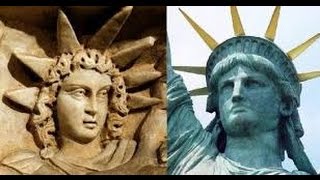
In verse five of this week's Torah portion passage, in common translations, it would say "...upon the third and fourth generation...". The question is "Why did hwhy say the iniquity will be visited on the third and the fourth generations, and not anymore generations after that"? Then a question came to me: "How many generations did hwhy prepare to settle His covenant to create "a Founding Father Dynasty of the Covenant"? The answer is, there were three: Abraham, Isaac and Jacob. Now thinking of a question on the negative end: "How many generations would it take to begin to create "a Founding Father Dynasty of Iniquity"? The answer is... you guessed it... three. Next question: "What generation would it take to begin to create "A Covenant Nation"? It was the fourth... the Twelve Sons of Jacob, the founders of each of the twelve tribes of Israel. That means that in the negative sense, the fourth generation will be the founders to begin to create "An Iniquitous Nation". By then, the fourth generation, who is practicing the iniquity, started by their great-grandfather, will continue that bondage of iniquity to their descendants, and will cause their nation to be enslaved (or in bondage) to the iniquity against the Second Word (Commandment) of worshiping and creation other "visible elohim", other than hwhy, Himself, "the Unseen Elohim". In other words, the third generation is the result of a dynasty, but the fourth generation is the result of "a legacy", which in the negative sense would be "a legacy of iniquity". The further the generations go in their iniquities, the harder it is for the People to get back to hwhy.
This is an example today in our modern generations. This is what hwhy told the prophet Daniel, which is noted in his book
Daniel 12:4 But thou, O Daniel, shut up the Words, and seal the scroll, even to the time of the end: many shall run to and fro, and knowledge shall be increased.
Based on the book of the prophet Daniel, knowledge will increase. It started with the Industrial Reveloution of technology in the mid to late 1800's. Today, knowledge has increased, and look what we have today... Computers, cell phones, mainly iPhones. Now we have "robots", or should I say "elohim of beasts"- "seen objects" that can walk and talk, and are beginning to be created to "think for themselves", starting with the infamous Jeopardy game show episode, where the inteligent computer "Watson" had beaten its competitors. Today's Millenial Generation has become almost completely dependable in today's technological society. There is also a probability that these robots could become "an army of robots" in the end times. This would be the world's manifestation of creating an "elohim of robots", against the Second Word (Commandment). These "wordly acts" of image making will ultimately lead to the upcoming image where a beast will give life to an image, which is noted in the apostle John's book of Revelation
Revelation 13:11 And I beheld another beast coming up out of the earth; and he had two horns like a lamb, and he spake as a dragon. 12 And he exerciseth all the power of the first beast before him, and causeth the earth and them which dwell therein to worship the first beast, whose deadly wound was healed. 13 And he doeth great wonders, so that he maketh fire come down from heaven on the earth in the sight of men, 14 And deceiveth them that dwell on the earth by the means of those miracles which he had power to do in the sight of the beast; saying to them that dwell on the earth, that they should make an image to the beast, which had the wound by a sword, and did live. 15 And he had power to give life unto the image of the beast, that the image of the beast should both speak, and cause that as many as would not worship the image of the beast should be killed.
In the latest technology today, as of 2018, there are now robots that look more human, and talk more human than ever before, and they are programmed to start thinking for themselves. It is most probable that the "second beast" that was given life will most likely be "a robot". This is the scariest thing that mankind has ever created. In my humble, but strong opion, we are nearing the sunset to begin the last seven years, the last week of years as noted in the booko of the prophet Daniel, of the worldwide tribulation.
Verse seven
THE THIRD "SPOKEN" WORD (COMMANDMENT)
7 You shall not lift up (bear, carry) ta-the Name of hwhy, your Elohim, for vanity (falsehood, useless, naught); for hwhy will not leave guiltless (innocent, unpunished) ta which lifts up (bear, carry) ta-His Name for vanity (falsehood, useless, naught).
Looking at the word DESTRUCTIVENESS
The Hebrew word for destructiveness is "shahv"- Shin, Vav, Aleph (aws). It is from Strong's Concordance number 7723, and its defintion
From the same as H7722 in the sense of desolating; evil (as destructive), literally (ruin) or morally (especially guile); figuratively idolatry (as false, subjectively), uselessness (as deceptive, objectively; also adverbially in vain): - false (-ly), lie, lying, vain, vanity.
from 7722 "shoh" (aws), and its definition
From an unused root meaning to rush over; a tempest; by implication devastation: - desolate (-ion), destroy, destruction, storm, wasteness.
This is where we get our modern English word "shove" as in "to "shove" one under the bus".
In other words, one means that we are not to use hwhy's Name is for destructive purposes, or "shoving" hwhy under the bus.
There are a couple of different kinds of examples of this in the Brith Khadashah (the New Covenant). One is an account of an unclean spirit exalting the name Yeshua to get the public's attention that He is the Messiah, which Yeshua didn't want Himself to be revealed to them as the Messiah, which is noted in the Gospel of Mark
Mark 1:23 And there was in their synagogue a man with an unclean spirit; and he cried out, 24 Saying, Let us alone; what have we to do with Thee, Thou Yeshua of Nazareth? art Thou come to destroy us? I know thee who Thou art, the Holy One of hwhy. 25 And Yeshua rebuked him, saying, Hold thy peace, and come out of him. 26 And when the unclean spirit had torn him, and cried with a loud voice, he came out of him.
The unclean spirit was revealing Yeshua for who He was, in order to distract Him by "exalting" Him in front of the public, like one of the tempations by HaSatan to show Himself for who He is, but in a destructive way, from doing the purpose of the Heavenly Father's Will by not revealing Himself as the person, which the Jewish people want.
Another example was to defeat hwhy's Will for Paul, in general, to preach the Gospel, which is noted in the book of the Acts
Acts 16:16 And it came to pass, as we went to prayer, a certain damsel possessed with a spirit of divination met us, which brought her masters much gain by soothsaying: 17 The same followed Paul and us, and cried, saying, These men are the servants of the Most High Elohim, which shew unto us the way of Salvation. 18 And this did she many days. But Paul, being grieved, turned and said to the spirit, I command thee in the Name of Yeshua, the Messiah, to come out of her. And he came out the same hour.
But the best example is the one Yeshua spoke to His disciples, which is noted in the Gospel of Matthew
Matthew 24:4 And Yeshua answered and said unto them, Take heed that no man deceive you. 5 For many shall come in My Name, saying, I am Messiah; and shall deceive many.
There are two theories, one theory is that people will say that Yeshua is the Messiah (exalting Him), but will use His Name to deceive the people for their own purposes (an act of destruction). The other theory is that people will they that they are Messiahs and will deceive many, which goes against the Second Word (Commandment). Yeshua wanted Himself revealed through the Works that the Heavenly Father commanded Him to do, which is noted in the Gospel of John, which I noted earlier.
Also, there were examples of people persecuting Jews in the name of the Messiah. One example relating to breaking the Third Word (Commandment) to exalt hwhy for destructive means is taken from the Wikipedia website, which is taken from the account of the Crusades:
Massacre of Jerusalem
"Jews fought side-by-side with Muslim soldiers to defend Jerusalem against the Crusaders. Saint Louis University Professor Thomas Madden, author of A Concise History of the Crusades, claims the "Jewish Defenders" of the city knew the rules of warfare and retreated to their synagogue to "prepare for death" since the Crusaders had breached the outer walls. According to the Muslim chronicle of Ibn al-Qalanisi, "The Jews assembled in their synagogue, and the Franks burned it over their heads." One modern-day source even claims the Crusaders "[circled] the screaming, flame-tortured humanity singing 'Christ We Adore Thee!' with their Crusader crosses held high." However, a contemporary Jewish communication does not corroborate the report that Jews were actually inside of the Synagogue when it was set fire. This letter was discovered among the Cairo Geniza collection in 1975 by historian Shelomo Dov Goitein. Historians believe that it was written just two weeks after the siege, making it "the earliest account on the conquest in any language." However, all sources agree that a synagogue was indeed burned during the siege".
There are other examples, like the Nazis during World War II, that some say they are doing this in the Name of Yeshua, but were really not.Alan Horvath of AlanHorvath.com noted that this Word (Commandment) is saying to not bring his Name to "nothing" by, for example, taking credit for ourselves and others that rightly belongs to hwhy. As I noted earlier in the definition, it is an act of throwing hwhy under the bus. Thank you Alan.
Verses eight through eleven
THE FOURTH "SPOKEN" WORD (COMMANDMENT)
8 Remember ta-the Shabbath Day to sanctify him. 9 Six days you shall serve (labor), and you shall do all of your work: 10 And the seventh day is a Shabbath to hwhy, your Elohim: You shall not do any work, you, and your son, and your daughter, your male servant, and your female servant, and your animal, and your sojourner (stranger) which is in your gates: 11 For six days, hwhy did (made) ta-the Heavens and ta-the Earth, ta-the sea, and of ta-all which is in them, and rested (relaxed, settled down) on the seventh day: Upon thus, hwhy blessed ta-the Shabbath day and sanctified him.
This originally came from the beginning of creation, which is noted in the Torah portion of B'reshith, in the book of Genesis
Genesis 2:1 And the Heavens and the Earth and all of their host (armies), they were finished. 2 And in the seventh day, Elohim finished His work which was done (made), and reposed (desisted, rested, relaxed) on the seventh day from all of His work which was done (made). 3 And Elohim blessed ta-the seventh day and sanctified him, for in him had reposed (desisted, rested, relaxed) from all of His work, which Elohim created for the doing (making).
hwhy also reminded Moses and the People that He created the heavens and the earth for six days and rested on the seventh day. The Shabbath was "a non-physical creative event". This is like the Father saying to His children to "follow His Lead". If any of us remembered the first thing we started following the Messianic/Hebraic Roots movement, what did we start with?..... "keeping the Shabbath". hwhy knew and still knows today that this is key for us believers in Yeshua to get back to the Hebraic Roots of Christianity today. Also, regarding Shabbath, Yeshua noted that the Shabbath was made for man, and not man for Shabbath, which is noted in the Gospel of Mark
Mark 2:23 And it came to pass, that He went through the grain fields on the Shabbath day; and His disciples began, as they went, to pluck the ears of grain. 24 And the Pharisees said unto Him, Behold, why do they on the Shabbath day that which is not lawful? 25 And He said unto them, Have ye never read what David did, when he had need, and was an hungred, he, and they that were with him? 26 How he went into the House of hwhy in the days of Abiathar, the High Priest, and did eat the bread of faces, which is not Torahful to eat but for the Priests, and gave also to them which were with him? 27 And He said unto them, The Shabbath was made for man, and not man for the Shabbath: 28 Therefore the Son of Man is Lord also of the Shabbath.
What Yeshua was saying is that "the Shabbath" is "Yeshua, the Living Shabbath". In other words, hwhy set the date for the Shabbath, the seventh day, for the benefit of mankind, but man does not make the Shabbath in his own way for the benefit of hwhy. , and that means "changing the Shabbath Day", as the Roman Church did in the fourth or fifth century AD by changing the day from the dominant day of Saturday (Friday sundown through Saturday sundown) to the Gregorian day of midnight Sunday through 11:59 PM Sunday night. That would be doing it in works without hwhy, and man would take the credit and acknowledgment away from hwhy, in connecting the Third Word (Commandment) in taking His Name, "Yeshua, the Living Shabbath", to nought.
Also, this is what the apostle Paul wrote, which is noted in the book of Hebrews
Hebrews 3:16 For some, when they had heard, did provoke: howbeit not all that came out of Egypt by Moses. 17 But with whom was he grieved forty years? Was it not with them that had sinned, whose carcases fell in the wilderness? 18 And to whom sware he that they should not enter into His Rest, but to them that believed not? 19 So we see that they could not enter in because of unbelief. 4:1 Let us therefore fear, lest, a promise being left us of entering into His Rest, any of you should seem to come short of it. 2 For unto us was the Gospel preached, as well as unto them: but the Word preached did not profit them, not being mixed with faith in them that heard it. 3 For we which have believed do enter into rest, as he said, As I have sworn in My Wrath, if they shall enter into My Rest: although the Works were finished from the foundation of the world. 4 For He spake in a certain place of the seventh day on this wise, And Elohim did rest the seventh day from all His Works. 5 And in this place again, If they shall enter into My Rest. 6 Seeing therefore it remaineth that some must enter therein, and they to whom it was first preached entered not in because of unbelief: 7 Again, he limiteth a certain day, saying in David, To day, after so long a time; as it is said, To day if ye will hear His Voice, harden not your hearts. 8 For if Yeshua had given them rest, then would He not afterward have spoken of another day. 9 There remaineth therefore a rest to the People of hwhy. 10 For he that is entered into His Rest, he also hath ceased from his own works, as hwhy did from His. 11 Let us labour therefore to enter into that Rest, lest any man fall after the same example of unbelief.
Mark Biltz of El Shaddai Ministries noted that the Shabbath was also noted in the Torah portion of Ki Thisa, in the book of Exodus
Exodus 31:12 And hwhy spoke to Moses, to say, 13 And you shall speak to the Sons of Israel, to say, Also (Verily, Surely) you shall keep (guard, observe) ta-My Shabbaths: for she is a Sign between Me and between you for your generations for the knowing that I am hwhy sanctifying you [(your Sanctifier)]. 14 And you shall keep ta-the Shabbath; for she is Sacred (Holy) to you: Defiling (Profaning, Polluting) her, dying, shall die: for anyone that does in her, and that soul shall be cut off from the nearness of her People. 15 Six days shall do work; and in the seventh day is a Shabbath Shabbathon (Intermittent Shabbath, Intermittent Rest, Intermittent Repose), Sacred (Holy) to hwhy: Anyone that does work in the Shabbath day, dying, shall die. 16 And the Sons of Israel, they shall keep (guard, observe) ta-the Shabbath for the doing ta-the Shabbath for their generations. A Covenant of Ages. 17 She is a Sign between Me and between the Sons of Israel for ages: for six days hwhy did (made) ta-the Heavens and ta-Earth, and on the seventh day had desisted (ceased, rested) and was resouled (refreshed).
Mark Biltz also points out the word "Sign" in the Ki Thisa passage
Looking at the word SIGN
The Hebrew word for sign is "ohth"- Aleph, Vav, Tav (twa). It is from Strong's Concordance number 226, and its definition
Probably from H225 (in the sense of appearing); a signal (literally or figuratively), as a flag, beacon, monument, omen, prodigy, evidence, etc.: - mark, miracle, (en-) sign, token.
from 225 "ooth" (twa), and its definition
A primitive root; properly to come, that is, (impliedly) to assent: - consent.
Mark Biltz noted that in the Paleo-Hebrew that the Hebrew word "oth" is a picture phrase: Aleph is the picture of an ox, resembling a strong one, Vav is the picture of a nail, and Tav is the picture of a cross. It would phrase it this way:
"The strong one that is nailed to the cross"
"The Shabbath Sign" is Yeshua.
Indirectly related, in verse ten of this week's Torah portion passage, hwhy included the stranger to participate in the Shabbath. The stranger is also one of the exceptions to the rule of possible peoples that can partake the Passover, which is noted in the Torah portion of Bo, in the book of Exodus
Exodus 12:47 All of the Congregation of Israel, they shall do (make, prepare) him. 48 And when a sojourner (stranger) shall sojourn with you, and shall do the Passover to hwhy, every remembered one (male) to him shall be circumcised, and then shall come near to do (make, prepare) him; and shall be like the native of the land: and anyone uncircumcised shall not eat on him. 49 One Teaching (Torah) shall be to the native and to the sojourner (stranger) that sojourns in your midst.
In this Bo passage, there are other kinds groups mentioned in this segment of the Passover that can or cannot partake of it, but the strangers can, because if they were circumcised, they could partake the Passover, and would qualify to work or serve. Another reason for allowing strangers to partake in the Passover, because some of the strangers could possibly be "fellow Israelites".
Verses twelve
THE FIFTH "SPOKEN" WORD (COMMANDMENT)
12 Honor (Give weight at) ta-your father and ta-your mother, by that, your days may be lengthened (long) upon the ground which hwhy, your Elohim, is giving to you.
This is an act of a child to give weight to their physical authority, who are the parents. In my opinion, the parents are "the physical bridge" to the first four words (commandments) and to the last five words (commandments). The parents are "the physical vertical eternal connection" to hwhy from the earth, and at the same time, they are the horizontal physical connection to the issues of the earth in the world. The Fifth Word (Commandment) could be nicknamed "The First Bridge Word (Commandment)", which will be explanied in the Sixth Word (Commandment). The parents are the "highest physical relationship" of the household authority on earth. When a child dishonors the parents, the child is temporarily "breaking" the relationship, not just the physical relationship to their parents, but also the Kingdom Relationship to hwhy who made the first man and woman, Adam and Khavah (Eve), the first physical parents on earth. It goes back to the premise that the parents are the "bridge" between hwhy and the world, because both parents are the "Adam and Khavah (Eve)" of birthing children to provide the means of an extended horizontal "and" vertical relationship.
Yeshua set an example of honoring parents by His confrontation against the Pharisees, when Yeshua accused them for using the Karban Offering as an ulterior motive not to help their parents, which is noted in the Gospel of Mark
Mark 7:5 Then the Pharisees and scribes asked Him, Why walk not Thy disciples according to the tradition of the elders, but eat bread with unwashen hands? 6 He answered and said unto them, Well hath Esaias prophesied of you hypocrites, as it is written, This people honoureth Me with their lips, but their heart is far from Me. 7 Howbeit in vain do they worship Me, teaching for doctrines the commandments of men. 8 For laying aside the Commandment of hwhy, ye hold the tradition of men, as the washing of pots and cups: and many other such like things ye do. 9 And He said unto them, Full well ye reject the Commandment of hwhy, that ye may keep your own tradition. 10 For Moses said, Honour thy father and thy mother; and, Whoso curseth father or mother, let him die the death: 11 But ye say, If a man shall say to his father or mother, It is Corban [The Karban Offering from the book of Leviticus], that is to say, a gift, by whatsoever thou mightest be profited by Me; he shall be free. 12 And ye suffer him no more to do ought for his father or his mother; 13 Making the Word of hwhy of none effect through your tradition, which ye have delivered: and many such like things do ye.
Notice in this week's Torah portion passage that the word "you" is bold in pink. In the Hebrew text, the you is in the feminine gender which tells us that hwhy was speaking to Moses' "soul", in which the soul, whether of a man or of a woman is "feminine". In this case hwhy was commanding the People's "soul" to honor their fathers and mothers that they as well as their "souls" will prolong on the ground, particularly in Israel. This also applies to our souls as believers in Yeshua to honor our parents, so that our lives as well as our souls will prolong on the ground where our Heavenly Father has placed us.
!!!hwhy Kl dbk
Also, it is the decision of that child's "soul" to submit to their parent(s) by honoring his and/or her parent(s), becuase it is the child's "soul" that will decide whether to love his or her parents or not. This will also result in his or her "soul" whether he or she will love his or her neighbor as himself or herself as a result of loving his or her parent(s) or not. If his or her soul loves his or her parent(s), they will love their neighbor. If the child's soul does not honor his or her parent(s), they will not love their neighbor. It is the decision of the child's soul that will result in the harmonization or disharmonization the Heavens-Earth connection in connection to the first Five Words (Commandments) to the second Five Words (Commandments).
!!!hwhy Kl dbk
Verse thirteen
THE SIXTH "SPOKEN" WORD (COMMANDMENT)
13 You shall not murder.
Looking at the word MURDER
The Hebrew word for murder is "rah-tsakh"- Resh, Tsade, Khet (xur). It is from Strong's Concordance number 7523, and its definition
A primitive root; properly to dash in pieces, that is, kill (a human being), especially to murder: - put to death, kill, (man-) slay (-er), murder (-er).
Perry Stone of Voice of Evangelism Ministries noted the this Word (Commandment) means to not to commit "premeditated murder".
In general, this is an act of destroying one's own neighbor- a human being, and is destroying the one whom hwhy created. It is not the typical phrase "you shall not kill", because there is a purpose for killing in war as many examples are stated in the Bible, and if we did not fight against Hitler, he and his Axis allies would have taken over the world. This is what Yeshua said, which is noted in the Gospel of Matthew
Matthew 10:34 Think not that I am come to send peace on earth: I came not to send peace, but a sword.
The Sixth Word (Ccommandment) is considered "The Second Bridge Word (Commandment)", because it connects the physical horizontal relationship of the earthly issues to the Fifth Word (Commandment) of vertical relationship of honoring one's parents, as well as the relationship with hwhy through the first four.
The Sixth Word (Commandment) relates to the issue of the slayer, or manslayer, which is noted in the Torah portion of Masei, in the book of Numbers
Numbers 35:16 And if has struck him on a vessel of iron and dies, he is a murderer. Dying, the murderer (slayer) shall die,
17 and if on a stone at hand which shall die on her, strikes him and dies, he is a murderer (slayer). Dying, the murderer (slayer) shall die.
18 or on a vessel of a tree (wood) at hand which shall die on him has struck him, and dies, he is a murderer (slayer). Dying, the murderer (slayer) shall die.
19 The avenger (revenger) of the blood, he shall execute ta-the murderer (slayer): he shall execute him (make him die) in his impinging against him.
20 And if has pushed him in hatred, or has thrown (had cast) upon him in laying of wait (chase), and dies; 21 or in enmity has struck him on his hand and dies: dying, the striker shall die; he is a murderer (slayer): the avenger (revenger) of the blood shall execute (make die) ta-the murderer (slayer) in his impinging on him.
22 And if in a moment (instant) on no emnity he pushed him, or threw (cast) any vessel upon him on no laying of wait (chase), 23 or on any stone which shall die on her in not seeing, and shall fall upon him, and shall die, and he was not an enemy to him, and was not seeking (beseeching) his evil: 24 And the Congregation shall judge between the striker and between the avenger (revenger) of the blood upon these Judgments: 25 and the Congregation shall deliver ta-the slayer from the hand of the avenger (revenger) of the blood, and the Congregation shall return him to the City of his Refuge which had fled there: and shall return in her until the death of the High Priest of whom was anointed him on the Sacred (Holy) Oil.
26 And if going out, the slayer shall go out of ta-the border of the City of his Refuge which had fled there; 27 and the avenger (revenger) of the blood finds out him out from outside by the border of the City of his Refuge, and the avenger (revenger) of the blood slays (murders) ta-the slayer; blood shall not be to him: 28 for was to dwell in the City of his Refuge until the death of the High Priest: and after the death of the High Priest, the slayer can return to the land of his possession. 29 And these shall be to you for a Statute of Judgment for your generations in all of your dwellings.
30 Anyone striking a soul, by the mouth of two witnessess shall slay ta-the slayer: and one witness shall not heed (eye) against a soul to the death.
Rabbi Daniel Lapin of www.rabbidaniellapin.com noted that the Sixth Word (Commandment) is in connection with the First Word (Commandment). According to Lapin, if one murders a person, he or she destroys the people's ability to "believe" that person and the existence of that person, and prevents the people to potentially to "believe" in the future of that person's accomplishments.
Yeshua went further with the Sixth Word (Commandment), which is noted in the Gospel of Matthew
Matthew 5:21 Ye have heard that it was said by them of old time, Thou shalt not kill (murder); and whosoever shall kill (murder) shall be in danger of the judgment: 22 But I say unto you, That whosoever is angry with his brother without a cause shall be in danger of the judgment: and whosoever shall say to his brother, Raca, shall be in danger of the council: but whosoever shall say, Thou fool, shall be in danger of hell fire. 23 Therefore if thou bring thy gift to the Altar, and there rememberest that thy brother hath ought against thee; 24 Leave there thy gift before the Altar, and go thy way; first be reconciled to thy brother, and then come and offer thy gift. 25 Agree with thine adversary quickly, whiles thou art in the way with him; lest at any time the adversary deliver thee to the judge, and the judge deliver thee to the officer, and thou be cast into prison. 26 Verily I say unto thee, Thou shalt by no means come out thence, till thou hast paid the uttermost farthing.
Looking at the word RACA
In the Gospel of Matthew, the Hebrew word for the phrase, raca, is "rah-khah"- Resh, Ayin, Khaph Sophit (Ker). It is from the Hebrew word "rah" (er). It is from Strong's Concordance number 7451, and its definition
From H7489; bad or (as noun) evil (naturally or morally). This includes the second (feminine) form; as adjective or noun: - adversity, affliction, bad, calamity, + displease (-ure), distress, evil ([-favouredness], man, thing), + exceedingly, X great, grief (-vous), harm, heavy, hurt (-ful), ill (favoured), + mark, mischief, (-vous), misery, naught (-ty), noisome, + not please, sad (-ly), sore, sorrow, trouble, vex, wicked (-ly, -ness, one), worse (-st) wretchedness, wrong. [Including feminine ra’ah; as adjective or noun.]
from 7489 "rah-ah" (eer), and its definition
A primitive root; properly to spoil (literally by breaking to pieces); figuratively to make (or be) good for nothing, that is, bad (physically, socially or morally). (associate selves and show self friendly are by mistake for H7462.): - afflict, associate selves [by mistake for H7462], break (down, in pieces), + displease, (be, bring, do) evil (doer, entreat, man), show self friendly [by mistake for H7462], do harm, (do) hurt, (behave self, deal) ill, X indeed, do mischief, punish, still vex, (do) wicked (doer, -ly), be (deal, do) worse.
The Hebrew phrase, raca, means "you evil one". When Yeshua said to not say this phrase, He was saying that if they were say this phrase, they were committing murder through their "words", because it came from thier "hearts". Also in this Matthew passage, that is why at the time Yeshua said to leave the gift at the Altar and get right with the person that was wronged. In other words, Yeshua emphasized that one doesn't have to "murder" the person physically for people from believing, but one can also destroy a person "internally" to destroy the person and prevent himself or herself from believing that person as well as believing his or her individual potential accomplishments.
Continuing with the tongue, this is what the apostle James said regarding the power of the tongue, which is noted in his epistle
James 3:5 Even so the tongue is a little member, and boasteth great things. Behold, how great a matter a little fire kindleth! 6 And the tongue is a fire, a world of iniquity: so is the tongue among our members, that it defileth the whole body, and setteth on fire the course of nature; and it is set on fire of hell. 7 For every kind of beasts, and of birds, and of serpents, and of things in the sea, is tamed, and hath been tamed of mankind: 8 But the tongue can no man tame; it is an unruly evil, full of deadly poison. 9 Therewith bless we hwhy, even the Father; and therewith curse we men, which are made after the similitude of hwhy. 10 Out of the same mouth proceedeth blessing and cursing. My brethren, these things ought not so to be.
This is also what the apostle Peter said, which is noted in his epistle
1 Peter 3:10 For he that will love life, and see good days, let him refrain his tongue from evil, and his lips that they speak no guile:
In relation to Yeshua, someone's tongue who says "Raca", meaning "You evil one", is not just murdering the person whom one is speaking against as well as being in danger of judgment, but that person speaking the evil word is also defiling his or her own body at the same time. It is what Rico Cortes of Wisdom in Torah Ministries calls it "measure for measure". This is also an agricultural phrase "reaping what one sows" in his or her words.
Verses fourteen
THE SEVENTH "SPOKEN" WORD (COMMANDMENT)
14 You shall not commit adultery [(You shall not adulterate)].
Rabbi Daniel Lapin in an interview promoting his Ten Commandments teaching noted that the Seventh Word (Commandment) in committing physical adultery is related to breaking the Second Word (Commandment) by committing spiritual adultery against hwhy by worshiping other elohim, by looking at the elohim image or by creating a physical elohim image, and what factor requires a man to commit adultery? Looking at a "physical image" of a woman.
Yeshua also talked about the Seventh Word (Commandment), which is noted in the Gospel of Matthew
Matthew 5:27 Ye have heard that it was said by them of old time, Thou shalt not commit adultery: 28 But I say unto you, That whosoever looketh on a woman to lust after her hath committed adultery with her already in his heart. 29 And if thy right eye offend thee, pluck it out, and cast it from thee: for it is profitable for thee that one of thy members should perish, and not that thy whole body should be cast into hell. 30 And if thy right hand offend thee, cut it off, and cast it from thee: for it is profitable for thee that one of thy members should perish, and not that thy whole body should be cast into Hell.
Yeshua had to also deal with a matter of adultery, which is noted in the Gospel of John
John 8:2 And early in the morning He came again into the Temple, and all the people came unto Him; and He sat down, and taught them. 3 And the Scribes and Pharisees brought unto Him a woman taken in adultery; and when they had set her in the midst, 4 They say unto Him, Master, this woman was taken in adultery, in the very act. 5 Now Moses in the Torah commanded us, that such should be stoned: but what sayest Thou? 6 This they said, tempting Him, that they might have to accuse Him. But Yeshua stooped down, and with His finger wrote on the ground, as though He heard them not. 7 So when they continued asking Him, He lifted up Himself, and said unto them, He that is without sin among you, let him first cast a stone at her. 8 And again He stooped down, and wrote on the ground. 9 And they which heard it, being convicted by their own conscience, went out one by one, beginning at the eldest, even unto the last: and Yeshua was left alone, and the woman standing in the midst. 10 When Yeshua had lifted up Himself, and saw none but the woman, He said unto her, Woman, where are those thine accusers? Hath no man condemned thee? 11 She said, No man, Lord. And Yeshua said unto her, Neither do I condemn thee: go, and sin no more.
The reason they left starting with the eldest, because the old ones did more sinning in commiting adultery than the younger ones. Some Messianic/Hebraic Roots teachers are in agreement with this factor that the men would not have "known" (a double play on this word) that the woman commited adultery unless they were the ones commiting adultery with her.
The apostle James related this word (commandment) to keeping the whole Torah, which is noted in his epistle
James 2:10 For whosoever shall keep the whole Torah, and yet offend in one point, he is guilty of all. 11 For he that said, Do not commit adultery, said also, Do not kill. Now if thou commit no adultery, yet if thou kill, thou art become a transgressor of the Torah.
Billy Graham of Billy Graham Evanglic Association noted this James passage by saying, "If you break one commandment, you break all of them".
Verses fifteen
THE EIGHTH "SPOKEN" WORD (COMMANDMENT)
15 You shall not steal.
Rabbi Daniel Lapin noted that the Eighth Word (Commandment) to the Third Word (Commandment) to take, or exalt, hwhy's Name in vain, or for destruction. It also brings it to nothing by "nullifying" that person's right to possess what belongs to him or her. In relevence to the Third Word (Commandment), people would exalt themselves for destructive purposes by getting their "fifteen minutes of fame" in the negative sense. Also, their acts would result in stealing, and destroying one's name and use it for their own evil purposes which is also destructive, because what they stole didn't belong to them and was not of their own effort and righteous hard work, and bring hwhy's Name to naught.
Indirectly related, but in relation to this Word (Commndment), Yeshua tells us about storing treasures where people could steal, which is noted in the Gospel of Matthew
Matthew 6:19 Lay not up for yourselves treasures upon earth, where moth and rust doth corrupt, and where thieves break through and steal: 20 But lay up for yourselves treasures in Heaven, where neither moth nor rust doth corrupt, and where thieves do not break through nor steal: 21 For where your treasure is, there will your heart be also.
Yeshua was teaching us not to store up treasures on earth, especially precious metals, i.e. silver, gold, etc. It could also be material things, or it could be reputational matters. These are only temporal, whereas our walk with Yeshua is "eternal". The material possessions is what thieves go after.
Verse sixteen
THE NINTH "SPOKEN" WORD (COMMANDMENT)
16 You shall not have a false (deceitful, lying, shamming) witness (testifier) [(a witness (testifier) of falsehood (deceit, lie, sham))] answering (eye-testifying) against your neighbor. [(You shall not answer (eye testify) against your neighbor having a false (deceitful, lying, shamming) witness (testifier) [(a witness (testifier) of falsehood (deceit, lie, sham))])]
Looking at the word ANSWERING (EYE-TESTIFYING)
The Hebrew word for answering (eye-testifying) is "ah-nah"- Ayin, Nun, Heh (hne). It is from Strong's Concordance number 6030, and its definition
A primitive root; properly to eye or (generally) to heed, that is, pay attention; by implication to respond; by extension to begin to speak; specifically to sing, shout, testify, announce: - give account, afflict [by mistake for H6031], (cause to, give) answer, bring low [by mistake for H6031], cry, hear, Leannoth, lift up, say, X scholar, (give a) shout, sing (together by course), speak, testify, utter, (bear) witness. See also H1042, H1043.
The Ninth Word (Commandment) is based on "false testimony", and it is based on the testimony from the "eye", because it requires the eye to become a false witness. The eye leads one to heed to the wrong people, as well as the wrong acts, if one is not in obedience with the Ten Words (Commandments), starting with the First Word (Commandment). The false witness is taking oneself out of his or her own "rest", and one falsly accusing another is taking the other person out of his or her own "Shabbath" rest.
Rabbi Daniel Lapin noted the connection of the Ninth Word (Commandment) to the Fourth Word (Commandment), in which bearing false witness against ones neighbor is taking the falsely accused person out of their "Shabbath" rest.
The religious officials were hoping for false witnesses to testify against Yeshua as an excuse to put Yeshua to death, which is noted in the Gospel of Mark
Mark 14:55 And the Chief Priests and all the Council sought for witness against Yeshua to put Him to death; and found none. 56 For many bare false witness against Him, but their witness agreed not together. 57 And there arose certain, and bare false witness against Him, saying, 58 We heard Him say, I will destroy this Temple that is made with hands, and within three days I will build another made without hands. 59 But neither so did their witness agree together.
There is an account giving more detail about false witnesses, which is noted in the Torah portion of Shophtim, in the book of Deuteronomy
Deuteronomy 17:2 When a man or a woman is found in your nearness in one of your gates which hwhy, your Elohim, is giving to you which is doing ta-the evil in the Eyes of hwhy, your Elohim, by going over His Covenant, 3 and has gone out and served other elohim, and they bowed down to them, and to the sun, or to the moon, or to any of the armies (host) of the Heavens, which I have not commanded; 4 And is told to you, and you have heard, and you investigated (questioned, made inquisition, inquired) good (well), and behold, the truth is established, and the word of this abomination (abhorrence) in Israel was done: 5 and you shall bring ta-that man or ta-that woman, ta-the man or ta-the woman which has done ta-this evil word to your gates, and you shall skullstone (stone, stonecast) them on stones, and they shall die. 6 Shall die the death upon the mouth of two witnesses (testifiers) or three witnesses (testifiers); shall not die upon the mouth of one witness (testifier). 7 The hands of the witnesses, she shall be among the first on him to have him die, and among afterward the hands of all of the People. And you shall consume (kindle away, fuel away, make waste, brutalize) the evil from your nearness.
If they were caught by the mouth of two or three witnesses, they were to be stoned to death, which is noted in the Torah portion of Shophtim, in the book of Deuteronomy
Deuteronomy 19:15 Shall not arise one witness (testifier) against a man for any iniquity, and for any sin, in any sin which shall sin: shall be arisen a word upon the mouth of two witnesses (testifiers), or upon the mouth of three witnesses (testifiers). 16 If rises a violent witness (testifier) against a man to eye witness (eye) apostasy (a turning away) upon him; 17 and the two men which have the contention (controversy, strife) to themselves, they shall stand to the Face of hwhy, to the face of the Priests and the Judges which they shall be in those days; 18 and shall investigate (question, make inquisition, inquire) the Judges good (well), and behold, a false witness (testifier) is the false witness (testifier) eye witnessing (eyeing) against his brother; 19 and you shall do to him as the which has devised (plotted, planned) to do to his brother: and you shall consume (fuel away, burn away) the evil from your nearness. 20 And the ones remaining, they shall hear, and they shall revere (give awe, fear), and they shall not add any more to do according to (as) this evil word in your nearness, 21 and your eye, she shall not pity; soul on soul, eye on eye, tooth on tooth, hand on hand, foot on foot.
In many words "You lie, you die".
There are a lot of people in this world that falsely accuse others, even in the Messianic community. This was publically noted, in which one of them, of whom I will not name, who falsely accused Eddie Chumney of Hebraic Heritage Ministries International (HHMI), thanks to manipulative "false witnesses" within the organization, and influenced and convinced those in charge to kick Eddie Chumney out of the organization. Some of the Messianic community at large defended Eddie by words or actions. You can find this false account against Eddie Chumney at his Watchman of Zion website
http://www.watchmanofzion.com/?m=201108
Verse seventeen
THE TENTH "SPOKEN" WORD (COMMANDMENT)
17 You shall not covet (desire, delight) the house (household) of your neighbor; you shall not covet (desire, delight) the woman (wife) of your neighbor, and his male servant, and his female servant, and his ox, and his donkey, and anything which belongs to your neighbor.
This word (Commandment) is in two parts:
The first part of the Tenth Word (Commandment)
You shall not covet (desire, delight) the house (household) of your neighbor;...
This pertains to one coveting/delighting "the material" of a fellow Israelite male's owner's possession that doesn't belong to the covetor/delighter, which is the neighbor's house.
The second part of the Tenth Word (Commandment)
...you shall not covet (desire, delight) the woman (wife) of your neighbor, and his male servant, and his female servant, and his ox, and his donkey, and anything which belongs to your neighbor.
This pertains to one coveting "the people and the animals" of a fellow Israelite owner's possession, which is his wife, servants, and his animals.
This is the last and lowest act that a person can do. Rabbi Daniel Lapin noted in an interview that the Tenth Word (Commandment) relates to the Fifth Word (Commandment) which is an act of "disrespecting one's parents".
I don't know if Lapin said this, but this act of coveting/delighting would be "a dishonor" to the person's "parents", hence one "dishonors" his neighbor through the lust of his material, human and animal possessions.
Also, according to Rabbi Daniel Lapin, the Fifth and the Tenth Words (Commandments) connection is the result of the act of unthankfulness that a potential coveter does by not staying in the protection from the righteous upbringing of that coveter's parents. In other words, the parents create "a hedge of protection", both spiritually and physically around their premises. When one goes to covet another's possessions at their property, the coveter/delighter is violating their space and premise and hedge of protection in their property and home, at the same time breaking the spiritual and physical hedge of his own premise as well as his parents' hedge on him in disrespecting the Torah, as well as the torah of his parents.
In relation to the two parts, relating to Rabbi Lapin's revelation, the first part to covet/lust the neighbor's house is breaking the hedge of protection "oustide" the neighbor's home, which includes the plot of land and the building, and the second part to covet/lust the nieghbor's wife and human and animal assets is breaking the hedge of protection "inside" the neighbor's home. This act also affects the heritage of the covetor's/delighter's family name and family legacy.
Indirectly related, Jonathan Cahn of Beth Israel Worship Center noted that the reason the terrorists were able to attack the United States on 9-11, in September 11th, 2001, because hwhy's Hedge of Protection was removed as the result of the United States losing touch with the living Elohim in losing their Judao-Christian foundation by the nation at large turning away from following hwhy. It started when the Supreme Court of the United States ruled that the Bible and Biblical prayer were declared unconstitutional in 1962 and 1963. Also the Johnson Amendment in 1964 prevented non-profit organizations to endorse a political candidate, which would include churches and congregations.
THE TEN "SPOKEN" WORDS (COMMANDMENTS) AT LARGE
Pat Robertson of the 700 Club noted a interesting statement regarding The Ten Words (Commandments), which is noted in the Gospel of Matthew
Mathew 22:35 Then one of them, which was a lawyer, asked Him a question, tempting Him, and saying, 36 Master, which is the Great Commandment in the Torah? 37 Yeshua said unto him, Thou shalt love hwhy, thy Elohim, with all thy heart, and with all thy soul, and with all thy mind. 38 This is the First and Great Commandment. 39 And the second is like unto it, Thou shalt love thy neighbour as thyself. 40 On these two Commandments hang all the Torah and the Prophets.
Pat Robertson noted that the first of these two words (commandments) Yeshua spoke refers to the First Five Words (Commandments), also known as "the Vertical Words (Commandments)" which pertain the relationship with hwhy, and the Second Word (Commandment) applies to the Last Five Words (Commandments), also known as "the Horizontal Words (Commandments)" which pertain the relationship with mankind. This is what is called "the Heavens-Earth Connection. In my opinion, that is one of the best revelations of the Ten Words (Commandments) that I heard from a Christian leader. Thank you Pat.
Rabbi Daniel Lapin at http://www.rabbidaniellapin.com did a teaching called "The Ten Commandments" and noted on TV promoting his teaching that the First Five Words (Commandments) relate to the Second Five Words (Commandments): the first to the sixth, the second to the seventh,... etc. You can get this teaching on his website by clicking the link below to get to the webpage.
- - - - - - - - - - - - - - - - - - - - - - - - - - - - - - - - - - - - - - - - - - - - - - - - - - - - - - - - - - - - - - - - - - - - - - - - - - - - - - - - - - - - -
DISCLAIMER
The views and opinions expressed are solely those of the personnel and do not necessarily reflect the view or opinions of The Aleph-Tav Project.
- - - - - - - - - - - - - - - - - - - - - - - - - - - - - - - - - - - - - - - - - - - - - - - - - - - - - - - - - - - - - - - - - - - - - - - - - - - - - - - - - - - - -
RABBI DANIEL LAPIN
The Ten Commandments
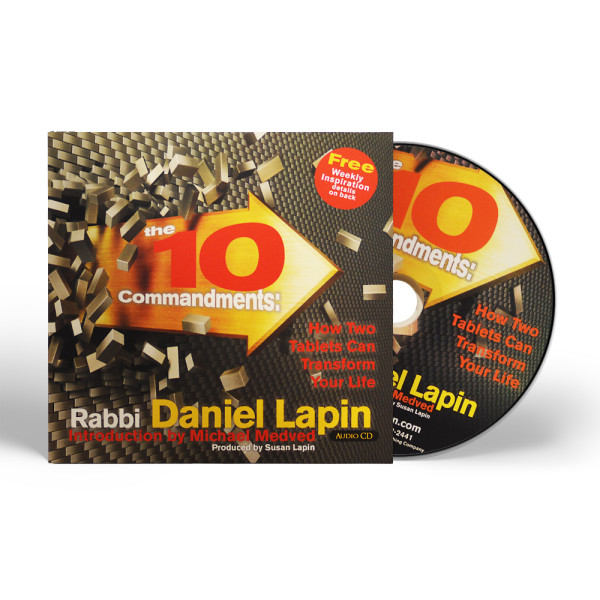
As I noted earlier, these Ten Words (Commandments) were spoken before they were written on two tablets of stones, and it occured later, which is noted in the Torah portion of Ki Thisa, in the book of Exodus
Exodus 32:15 And Moses faced away, and descended (went down) from the Mountain, and the Two Tablets of the Testimony (Witness) were in his hand: the Tablets were written from two of their opposite regions (opposite sides); they were written from this side, and from this side. 16 And the Tablets, they were from the Doing (Work) of Elohim, and the writing was from the Writing of Elohim, he was engraved upon the Tablets.
This is the same tablets that Moses broke, and Moses had to chisel out two new tablets for hwhy to write on them to replace the orignial tablets, which is noted in the Torah portion of Ki Thisa, in the book of Exodus
Exodus 34:4 And two Tablets of Stones were vesseled like the first ones; and Moses rose up early (started early) in the breaking period (morning), and ascended to Mount Sinai as the which hwhy commanded him, and took in his hand the two Tablets of Stones.... 28 And was there with hwhy forty days (daily) and forty nights (nightly); did not eat bread and did not drink water. And wrote upon the Tablets ta the Words of the Covenant, the Ten Words.
There is an element of the Tent of Appointment that is symbolic to the Ten Words (Commandments), which is noted in the Torah portion of T'rumah, in the book of Exodus
Exodus 26:1 You shall do (make) ta-the Tabernacle of Ten Curtains (Hangings) of twisted (twined, fine) linen (six stringed linen, six bleached linen, bleached linen, white linen), and blue, and purple, and crimson (red) worm [(worm of crimson (red))]: of Cherubims of weaving (a weaver, fabricating, a fabricator, embroidering, an embroiderer, plaiting, a plaiter, devising, a deviser, interpenetrating, an interpenetrater), you shall do (make) them. 2 The length of the one Curtain (Hanging) shall be eight and twenty on the cubit, and the breadth of the one shall be four on the cubit: one measure shall be to all of the Curtains (Hangings). 3 The five Curtains (Hangings), they shall be joined a woman to her sister; and the five Curtains (Hangings) shall be joined a woman to her sister. 4 And you shall do (make) Loops of blue upon (over) the lip (edge) of the one Curtain (Hanging) from the end (edge) on the joining (juncture, joining point); and so you shall do (make) on the lip (edge) of the furthest (last) Curtain on the second joining (juncture, joining point). 5 You shall do (make) fifty Loops on the one Curtain (Hanging), and the fifty Loops you shall do (make) in the edge (furthest) of the Curtain (Hanging) that is on the joining (juncture, joining point) of the second; admitting (receiving, holding) the Loops a woman to her sister. 6 And you shall do (make) fifty Buckles (Taches) of gold, and you shall join ta-the Curtains (Hanging) a woman to her sister on the Buckles (Taches): and the Tabernacle shall be one.
These are the symbols used in the Ten Curtains:
Blue: Heaven
Purple: Royalty
Crimson Worm (Scarlet): Blood
Gold: Eternity
Cherubim: Heavenly Host and Heavenly Existence
Fifty: The Jubilee Year/hwhy's Fifty Year Cycle
These united Ten Curtains joined together was the first item mentioned to be made for the Tent of Appointment. This indicates that each of the Ten Curtains are representations of each of the Ten Words (Commandments). The First Five Words (Commandments) are the vertical relationship with hwhy, and the Second Five Words (Commandments) were the horizontal relationship with man. The Ten Words (Commandments) is to be the first set of commandments applied in our lives in our relationship with hwhy, our Heavenly Father, in the Messiah, by the Ruakh HaKodesh (the Holy Spirit).
The fifth curtain is symbolized to the Fifth Word (Commandment) which was the end of one of the united five junctures to the sixth curtain, which symbolizes the Sixth Word (Commandment). These Two Words (Commandments) are the connecting factors from the horizontal relationship of man to the vertical relationship with hwhy via the gold buckles, in which the gold buckles symbolizes the eternal connection through Yeshua, the Messiah.
This is an example of an image of what the ten curtains could have looked like
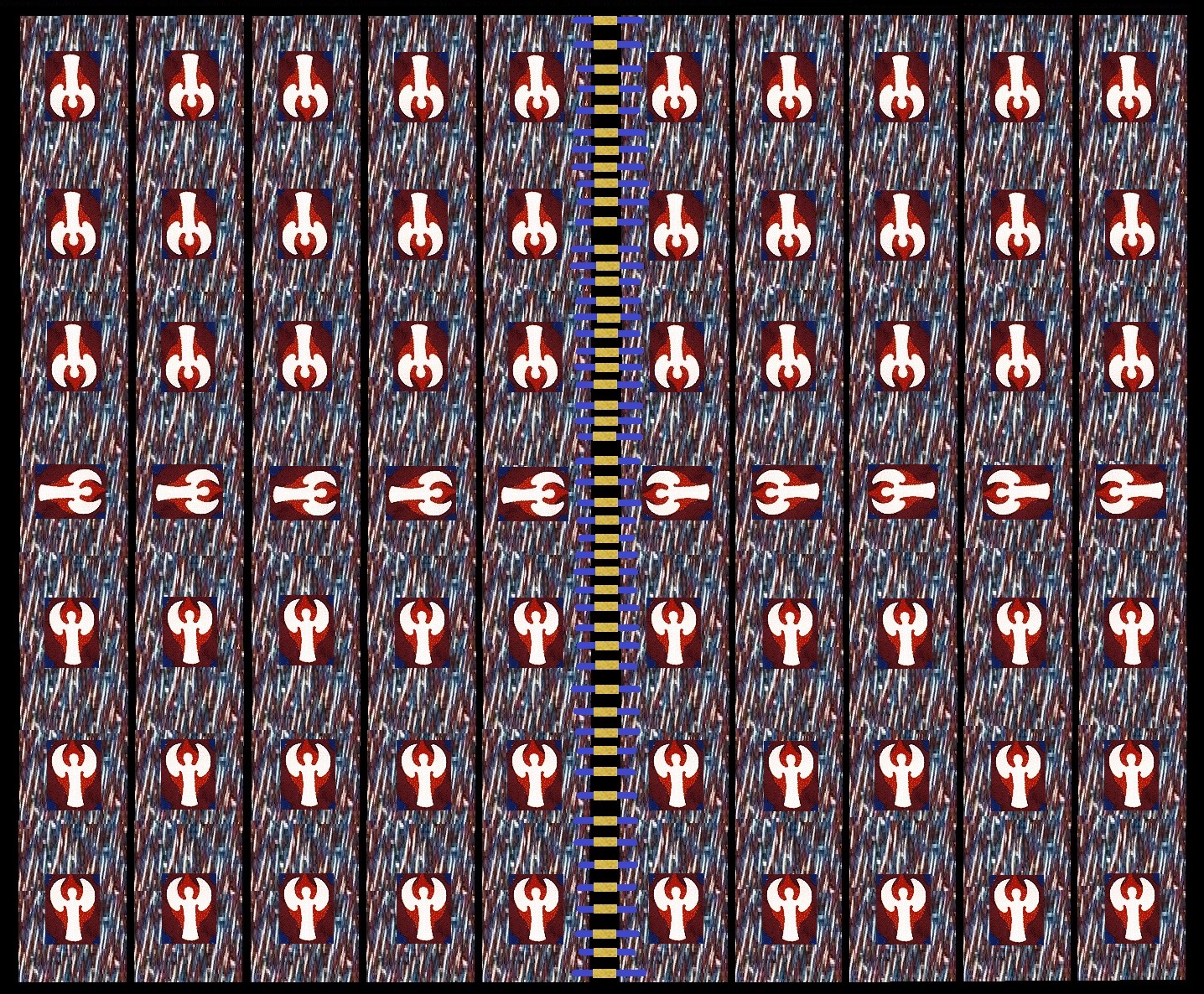
I don't mean to get off track, but I think this information will be of interest to you regarding this T'rumah passage by looking at these two translated words.
Looking at the words:
FURTHEST
The Hebrew word for furthest is "kee-tson"- Kuph, Yod, Tsade, Vav, Nun Sophit (Nwuyq). It is from Strong's Concordance number 7020, and its definition
From H6972; terminal: - out- (utter-) most.
from 6972 "koots" (Uwq), and its definition
A primitive root; to clip off; used only as denominative from H7019; to spend the harvest season: - summer.
from 7019 "kah-yeets" (Uyq), and its definition
From H6972; harvest (as the crop), whether the product (grain or fruit) or the (dry) season: - summer (fruit, house).
This word furthest is based on the root word meaning "harvest" or "summer", as in the furthest point of the sun in the sky throughout the year, but it also means "harvest", meaning, in relation to the Ten Words (Commandments) that the First Five Words (Commandments) in one's relationship to hwhy and the mother and father, is "harvested" in the Last Five Words (Commandments) through one's righteous relationship with mankind by following those Last Five Words (Commandments).
EDGE
The Hebrew word for edge is "kah-tsah"- Kuph, Tsade, Heh (huq). It is from Strong's Concordance number 7097, and its definition
The second form is negative only; from H7096; an extremity (used in a great variety of applications and idioms; compare H7093): - X after, border, brim, brink, edge, end, [in-] finite, frontier, outmost coast, quarter, shore, (out-) side, X some, ut (-ter-) most (part).
from 7096 "kah-tsah" (huq), and its definition
A primitive root; to cut off; (figuratively) to destroy; (partially) to scrape off: - cut off, cut short, scrape (off).
from 7093 "koots" (Uq), and its definition
Contracted from H7112; an extremity; adverbially (with prepositional prefix) after: - + after, (utmost) border, end, [in-] finite, X process.
from 7112 "kah-tsats" (Uuq), and its defintion
A primitive root; to chop off (literally or figuratively): - cut (asunder, in pieces, in sunder, off), X utmost.
In my opinion, these two translated words are related to each other, becuase they are similar in the Hebrew spelling.
This last translated word's definition above explains the circumstance of the Ten Words (Commandments) that the "edge" of the First Five Words (Commandments) are at the "edge" of their vertical point, and the edge of the Last Five Words (Commandments) are at the "edge" of their horizontal point. By the way, these two Hebrew words are where we get our modern English word "cut", as in "cutting off", or cutting to end something.
To keep going with the passage in this T'rumah passage, it shows that they are to be "joined" with gold buckles. The symbol for gold is "eternal", The buckles connect the two sets of the five words (commandments) and makes them "eternal". This is the similar way in our relationship with our Heavenly Father. As it is written by the apostle Paul to the assembly in Rome
Romans 3:23 For all have sinned, and come short of the Glory of hwhy;
Without hwhy, our Heavenly Father, we just have the Last Five Words (Commandments) and the One Word (Commandment) with honoring our father and mother. But there is no relationship with hwhy, and thus we don't have an "eternal relationship", and are missing some of the Ten Words (Commandments), and are not complete. We can't relate to the First Five Words (Commandments) without something, or "Someone" who is "eternal", and this is where Yeshua "the Eternal One" comes to be the symbolic "Eternal Golden Buckle" to "connect" the Last Five Words (Commandments) to the First Five Words (Commandments) where we can have a "relationship" with hwhy, our Heavenly Father, through Yeshua the Messiah, via the Ruakh HaKodesh (the Holy Spirit) and thus makes the completion of the Ten Words (Commandments).
Also in this T'rumah passage, the color blue is symbolic of heaven. When the fifty loops of blue are attached to each of the curtains, it symbolizes that heaven is connected to each of the Ten Words (Commandments) to connect between the heavens and the earth, which is based in the Torah portion of B'reyshith, in the book of Genesis
Genesis 1:1 In the first (beginning), Elohim created ta the Heavens and ta-the Earth.
Thus the blue loops provide "the Heavens-Earth" connection.
Notice also in this T'rumah passage noted above that it says in verse three "her sister piece". It says this in the Hebrew. That means each of the sister pieces of the ten curtains tells us that each of Ten Words (Commandments) are "sisters", because each Word (Commandment) is "female" and relate to our souls which are also feminine. Our souls need to submit to hwhy through these Ten Words (Commandments). Notice this T'rumah passage also states that hwhy says in verse three that they are to attach five curtains to the other five curtains. As I mentioned before, The First Five Words (Commandments) are the vertical words (commandments) referring to hwhy, which are "the vertical sisters", and the Last Five Words (Commandments) are the horizontal words (commandments) referring to mankind, which are "the horizontal sisters". Yeshua summarized them to two commandments, which I will now reveal
Matthew 22:36 Master, which is the Great Commandment in the Torah? 37 Yeshua said unto him, Thou shalt love the hwhy, thy Elohim, with all thy heart, and with all thy soul, and with all thy mind [The First Five Words (Commandments)]. 38 This is the First and Great Commandment. 39 And the Second is like unto it, Thou shalt love thy neighbour as thyself [The Second Five Words (Commandments)]. 40 On these Two Commandments hang all the Torah and the Prophets.
The Ten Words (Commandments) are part of the Torah, and the Torah is feminine.
Even the apostle Paul agreed what Yeshua said of the Second Five Words (Commandments), which is noted in his letter to the assembly in Rome
Romans 13:8 Owe no man any thing, but to love one another: for he that loveth another hath fulfilled the Torah. 9 For this, Thou shalt not commit adultery, Thou shalt not kill, Thou shalt not steal, Thou shalt not bear false witness, Thou shalt not covet; and if there be any other commandment, it is briefly comprehended in this saying, namely, Thou shalt love thy neighbour as thyself. 10 Love worketh no ill to his neighbour: therefore Love is the fulfilling of the Torah.
Monte Judah of Lion and Lamb Ministries noted Yeshua saying to Love Him is to keep His Commandments in the Gospel of John
John 14:15 If ye love Me, keep My (Words) Commandments.
John 15:10 If ye keep My (Words) Commandments, ye shall abide in My love; even as I have kept My Father's (Words) Commandments, and abide in His love.
Indirectly related, it also said that it breaks "the hedge of protection" which the parents trained their child in the child's own upbringing, as it says in the book of Proverbs
Proverbs 22:6 Train up a child in the way he should go: and when he is old, he will not depart from it.
In my literal translation, it says:
Proverbs 22:6 Train up (discipline) a young man upon his way of the mouth: also when is aging, shall not depart (turn away) from her.
This means that the Word, which can be applied to the Ten Words (Commandments), is not to be departed out the man's mouth.
Monte Judah of Lion and Lamb Ministries has a video teaching titled "Ten Commadments". You can find this DVD at his website store by clicking the image below.
- - - - - - - - - - - - - - - - - - - - - - - - - - - - - - - - - - - - - - - - - - - - - - - - - - - - - - - - - - - - - - - - - - - - - - - - - - - - - - - - - - - - -
DISCLAIMER
The views and opinions expressed are solely those of the personnel and do not necessarily reflect the view or opinions of The Aleph-Tav Project.
- - - - - - - - - - - - - - - - - - - - - - - - - - - - - - - - - - - - - - - - - - - - - - - - - - - - - - - - - - - - - - - - - - - - - - - - - - - - - - - - - - - - -
MONTE JUDAH
Ten Commandments
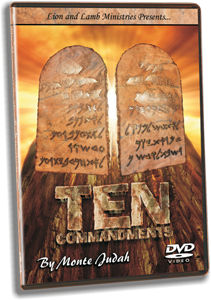
Verse eighteen
18 And all of the People saw ta-the sounds, and ta-the flashings, and ta the sound of the Shofar, and ta-the mountain smoking: and the People saw, and they moved back (staggered, staggered back), and they stood from a distance.
Going back to the account with the men at the mountain, this is almost like Moses running away from his staff turning into a snake when he was with hwhy at Mount Sinai before returning to Egypt. That would have been interesting to see all the men backing away from the base of the mountain.
Also, how did the Israelites "see" the sounds? They could see the lightnings, but how does one see the sounds? Did they see the "vibrations" that formed from the sounds on top of the mount? I don't have an answer to this question at this time.
Monte Judah of Lion and Lamb Ministries noted that when they said to Moses they will do what hwhy says, they didn't know what they were saying until they actually "heard" what He was saying through the sounds, and flashes and the quakings, which they were actually hearing.
Verse nineteen
19 And they said to Moses, You speak with us, and we will listen: And let not Elohim speak with us, facing (lest) we die [(facing (lest) we be the death)].
They were in so much fear, that they thought that if hwhy spoke, they would die. Bill Cloud of Shoreshim Ministries noted that though Israel left Egypt, Egypt was still in Israel, and they thought that hwhy was like a harsh Pharaoh who will say harsh words to them, let alone speak like a Pharaoh. The sounds and thunders were exposing their slave mentality, thinking that hwhy would punish them and kill them, as Pharaoh would potentially have done so to them.
Verses twenty and twenty-one
20 And Moses said to the People, Do you not fear: for by in order (in over) The Elohim has come to test (try, prove) you, and in order (in over) His Reverence (Aweness, Fear), she may be upon your faces, by failing you at sinning. 21 And the People stood from a distance, and Moses approached to the gloominess (thickness, dark) which The Elohim was there.
Moses was trying, in many words, to help them break their "slavery mentality".
Wait a minute! Moses did not say this to them before. hwhy did not say that He was going to test them here either. It is most likely what hwhy said to Moses to tell the Israelites in chapter nineteen of this week's Torah portion
Exodus 19:5 And now, if listening, you will listen in My Voice, and you will guard (keep, observe, watch) ta-My Covenant, and you shall be to Me a Special Treasure (Jewel, Peculiar Treasure) from all of the peoples: for all of the Earth belongs to Me: 6 And you, you shall be to Me a Kingdom of Priests, and a Sacred (Holy) Nation. These are the Words which you shall speak to the Sons of Israel.
In other words, hwhy was testing them on this day to see if they would obey His Voice and keep His Covenant, like hwhy was testing Moses regarding the Priests coming to the mountain, as noted also in the previous chapter of this week's Torah portion
Exodus 19:21 And hwhy said to Moses, Descend (Go down), at the testifying (the witness, the warning) against the People, lest they pull (break through) to see to hwhy, and many of them will fall. 22 And also the Priests that are approaching to hwhy, they shall be sanctified, lest hwhy shall breach (burst forth, press forth) among them. 23 And Moses said to hwhy, The People are not able to ascend to Mount Sinai: for you, you had the testifying (witnessing, warning) against us, to say, border (boundarize) ta-the Mountain, and sanctify him. 24 And hwhy said to him, Go, descend (go down), and you shall ascend, you, and Aaron with you: and the Priests and the People, they shall not pull (break through) to ascend to hwhy, lest shall breach (burst forth, press forth) among themselves. 25 And Moses descended (went down) to the People, and spoke to them.
Verse twenty two
22 And hwhy said to Moses, Thus, you shall say to the Sons of Israel, You, you have seen for I have spoken with you from the Heavens.
Uh, Abba, the Israelites only heard shofar sounds and sounds and lightnings. How could they have heard Your Voice in speaking words if they have only heard the other sounds? Is it a play on words like "Let your fingers do the walking" but it is "Let your shofar blasts do the talking"? The answer is that they heard Him talk via the shofar sounds and the sounds and the lightnings. Even hwhy, the Father, did the same thing during Yeshua's time, which is noted in the Gospel of John
John 12:20 And there were certain Greeks among them that came up to worship at the Feast: 21 The same came therefore to Philip, which was of Bethsaida of Galilee, and desired him, saying, Sir, we would see Yeshua. 22 Philip cometh and telleth Andrew: and again Andrew and Philip tell Yeshua. 23 And Yeshua answered them, saying, The hour is come, that the Son of Man should be glorified. 24 Verily, verily, I say unto you, Except a kernel of wheat fall into the ground and die, it abideth alone: but if it die, it bringeth forth much fruit. 25 He that loveth his life shall lose it; and he that hateth his life in this world shall keep it unto life eternal. 26 If any man serve Me, let him follow Me; and where I am, there shall also My servant be: if any man serve Me, him will My Father honour. 27 Now is My Soul troubled; and what shall I say? Father, save Me from this hour: but for this cause came I unto this hour. 28 Father, glorify Thy Name. Then came there a Voice from the heavens, saying, I have both glorified It, and will glorify It again. 29 The people therefore, that stood by, and heard It, said that It thundered: others said, An angel spake to Him. 30 Yeshua answered and said, This voice came not because of Me, but for your sakes.
If I am correct, the first time hwhy's name was glorified was in this Torah portion at Mount Sinai, and this second time was the coming death and resurrection of His Son Yeshua in the Brith Khadashah (the New Covenant).
Verses twenty three and twenty four
23 You shall not do (make) with Me elohim of silver, and you shall not do (make) for yourselves elohim of gold [(and elohim of gold; you shall not do (make) for yourselves)]. 24 You shall do (make) for Me an Altar of Ground, and you shall sacrifice upon him ta-your Elevation Offerings (Ascension Offerings, Burnt Offerings), and ta-your Peace Offerings, ta-your flocks, and ta-your herds: In any of the place which I will memorialize ta-My Name; I will come to you, and I will bless you.
Right here in this week's Torah portion passage, hwhy was telling them to make an Altar for Him. To me, this sounds like a good remedy, and they could offer sacrifices there. Everyone would have one place they could go, and it is the location where hwhy wanted them to go, which we will see shortly.
Verse twenty five
25 And if you will do (make) for Me an Altar of stones, you shall not build them of hewn stone (tampered stone, chiseled stone): For your cutting tool (mattock, pickax) will vibrate (quiver, shake) upon her, and you will profane (wound) her.
While the Israelites were in the wilderness, they were to have an Altar of "uncut stones".
Looking at the word CUTTING TOOL (MATTOCK, PICKAX)
The Hebrew word for cutting tool (mattock, pickax) is "kheh-rehv"- Khet, Resh, Bet (brx). It is from Strong's Concordance number 2719, and its definition
From H2717; drought; also a cutting instrument (from its destructive effect), as a knife, sword, or other sharp implement: - axe, dagger, knife, mattock, sword, tool.
from 2717 "khah-rahv" or "khah-reyv" (brx, brx), and its definition
A primitive root; to parch (through drought), that is, (by analogy) to desolate, destroy, kill: - decay, (be) desolate, destroy (-er), (be) dry (up), slay, X surely, (lay, lie, make) waste.
In my opinion, if one tries to use anything to tempt to cut a stone for the altar, one would "dehydrate" the life of the uncut stone. The stone represents Yeshua, the Living Stone, if one tries to hewn to Yeshua, the Living Stone, it's like saying one is dehydrating Yeshua and could cause Him to decay and dry up, especially in our lives as following believers. We are not to use any spiritual tools to hew Yeshua in our lives in our relationship with Him.
!!!hwhy Kl dbk
These are satelite maps zooming into the location of the Altar of Moses next to Jebel al Lawz in northeastern Saudi Arabia





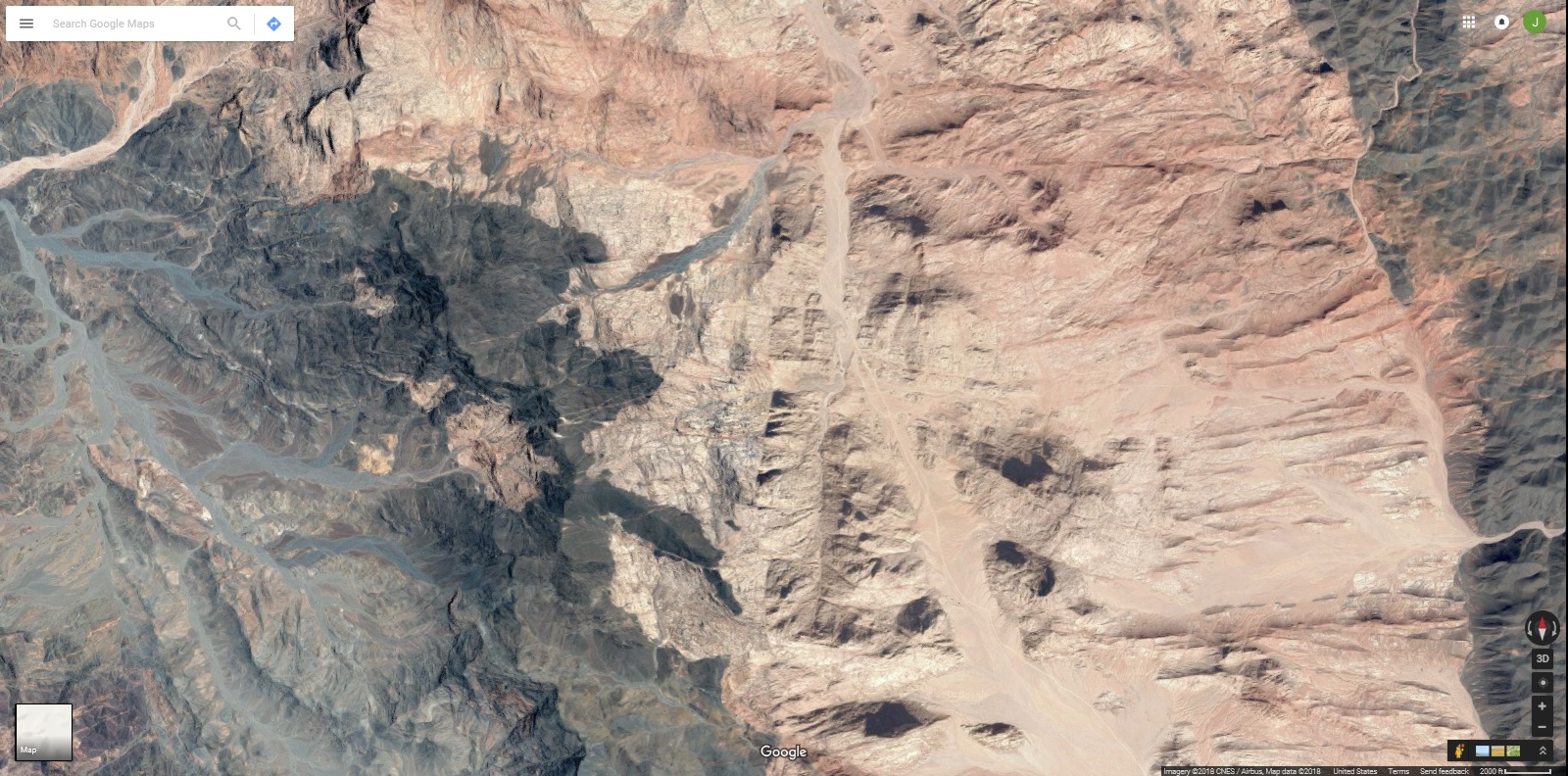

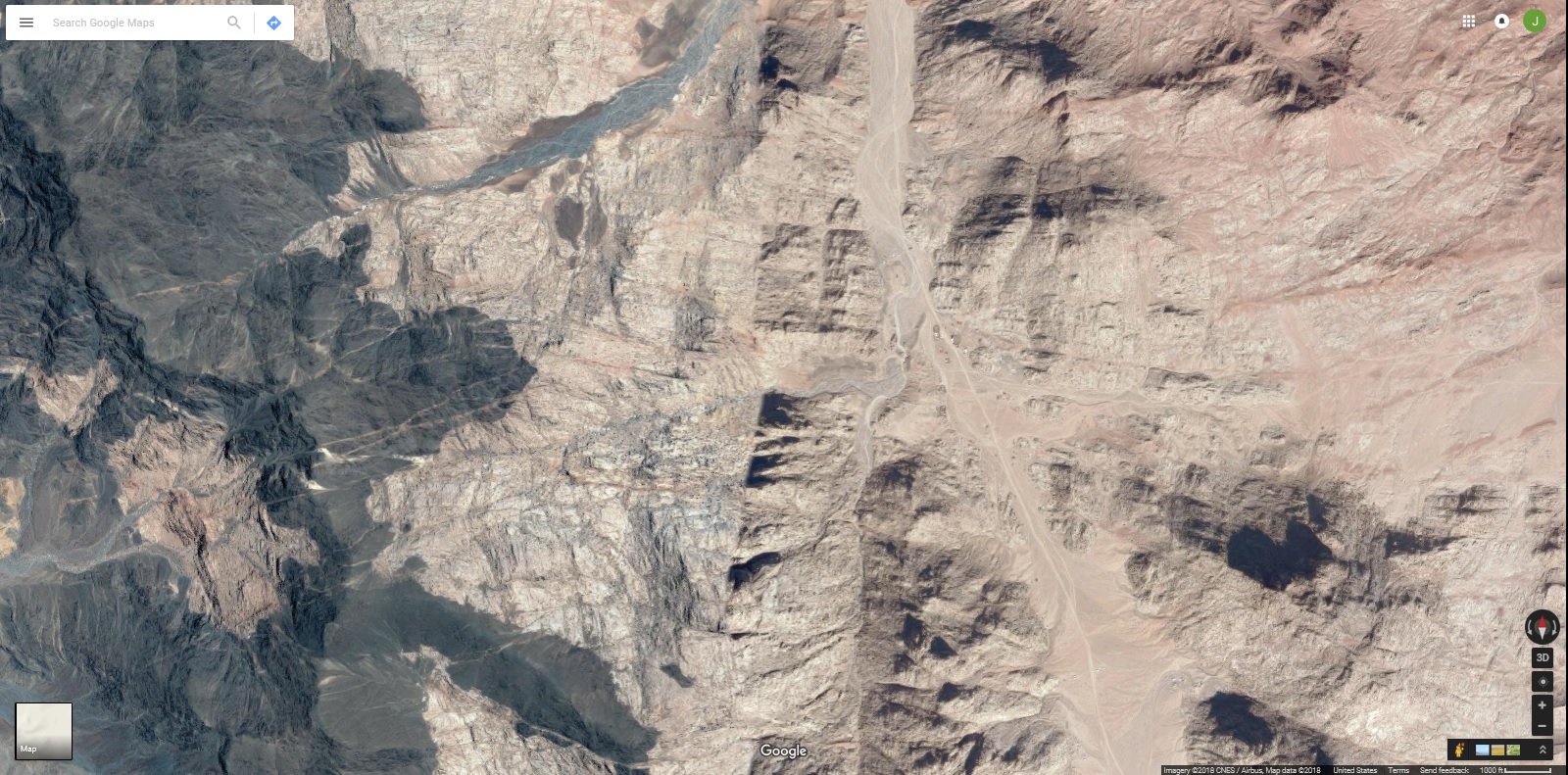
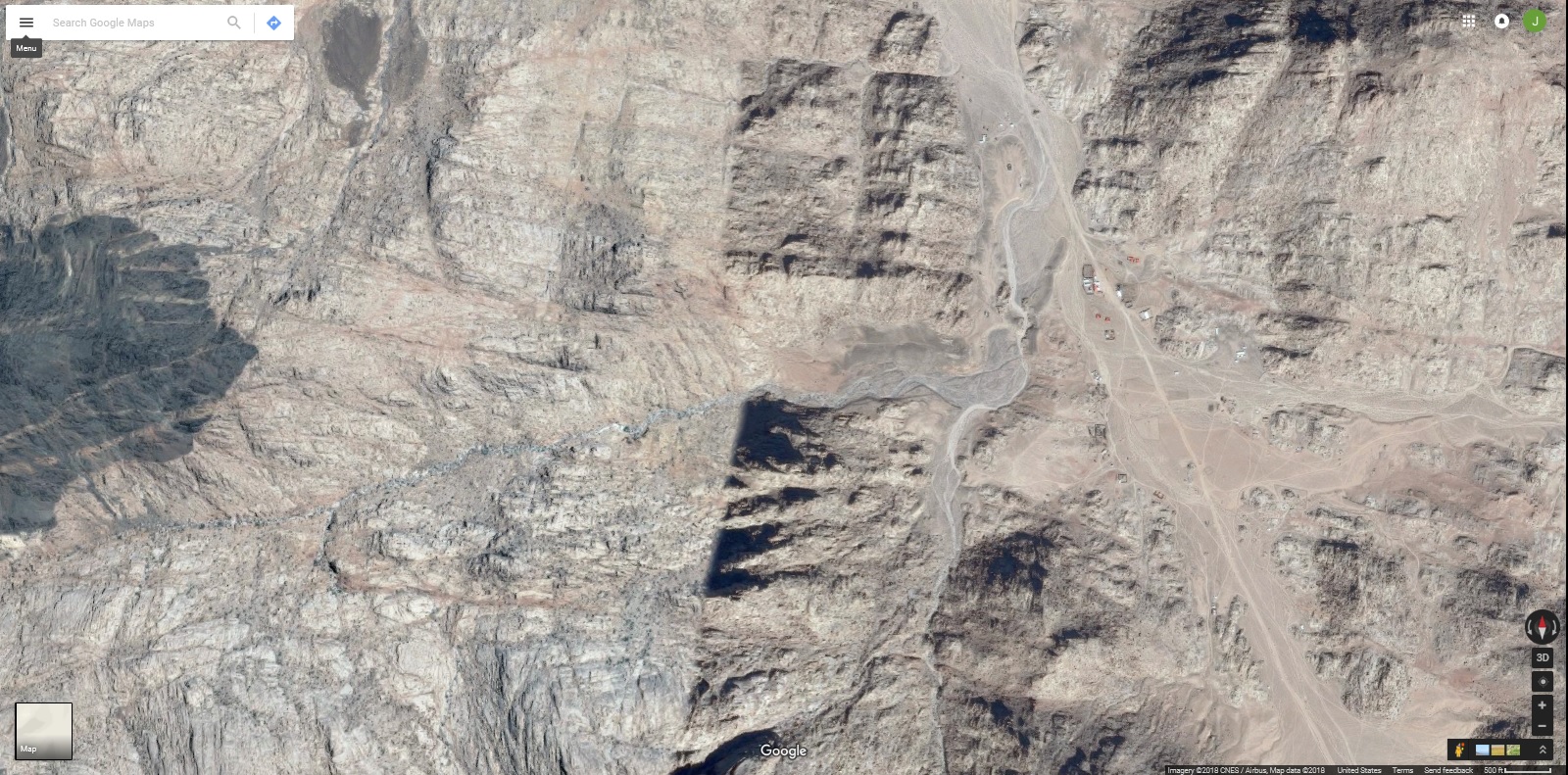
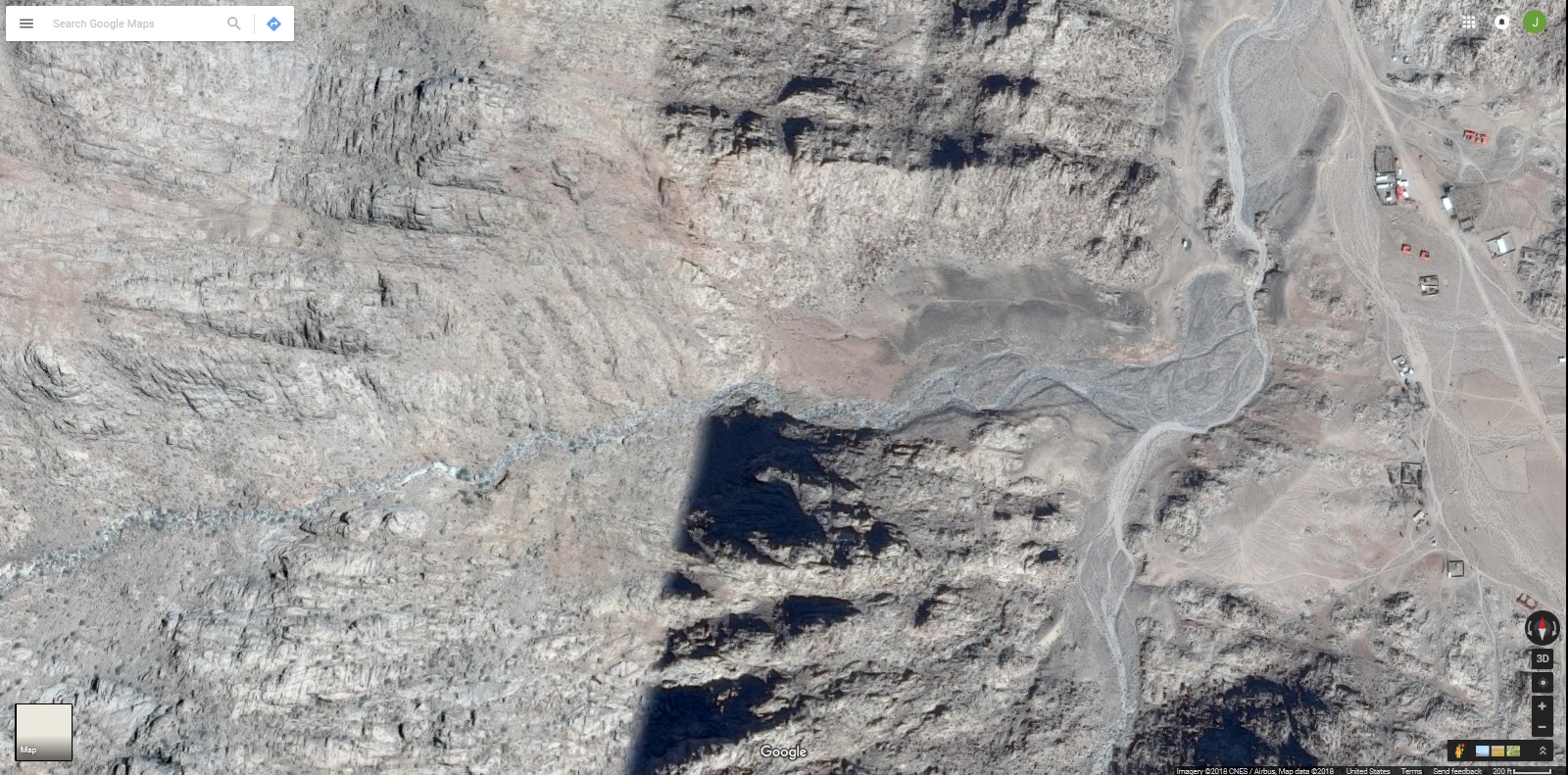
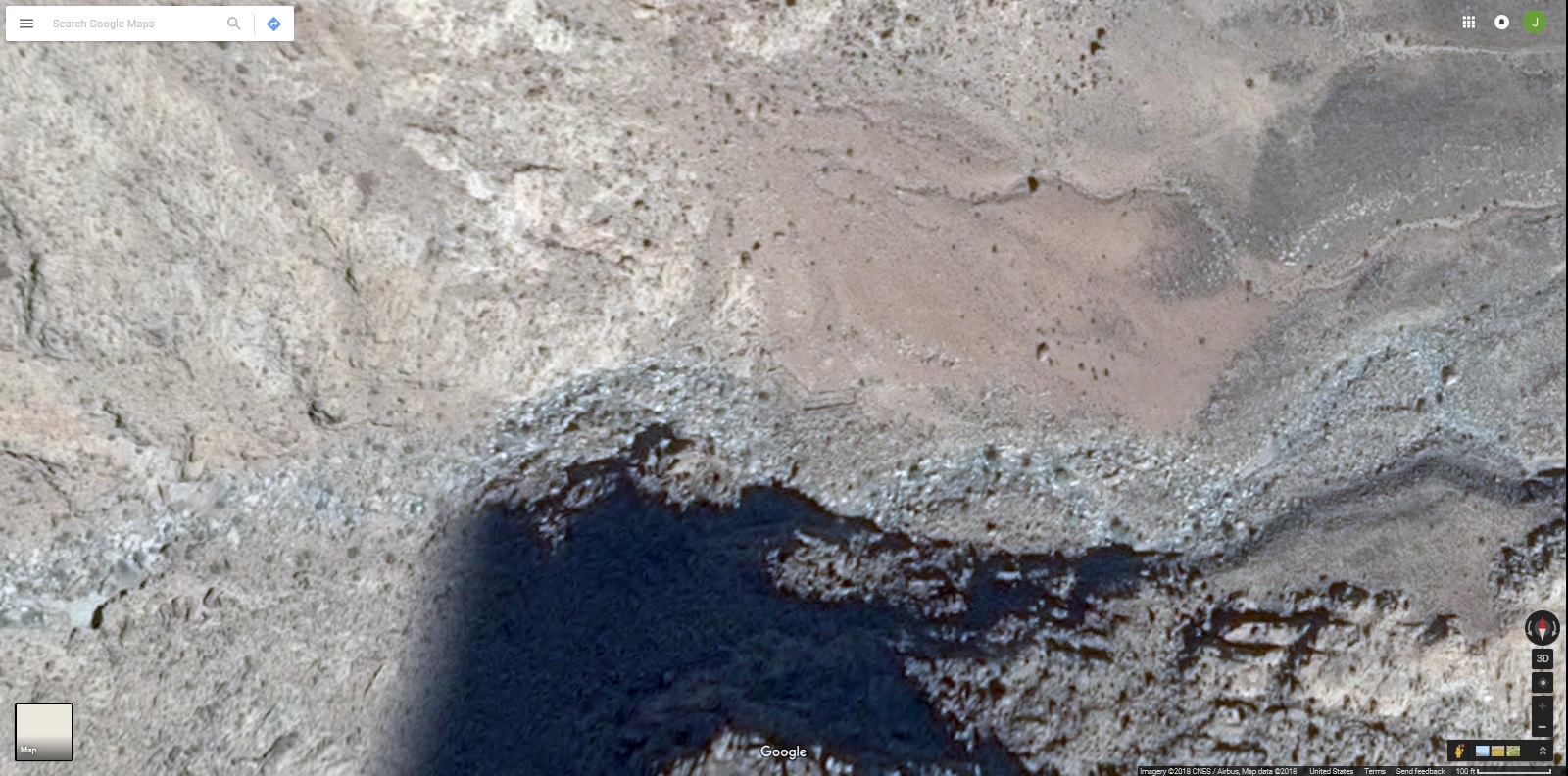
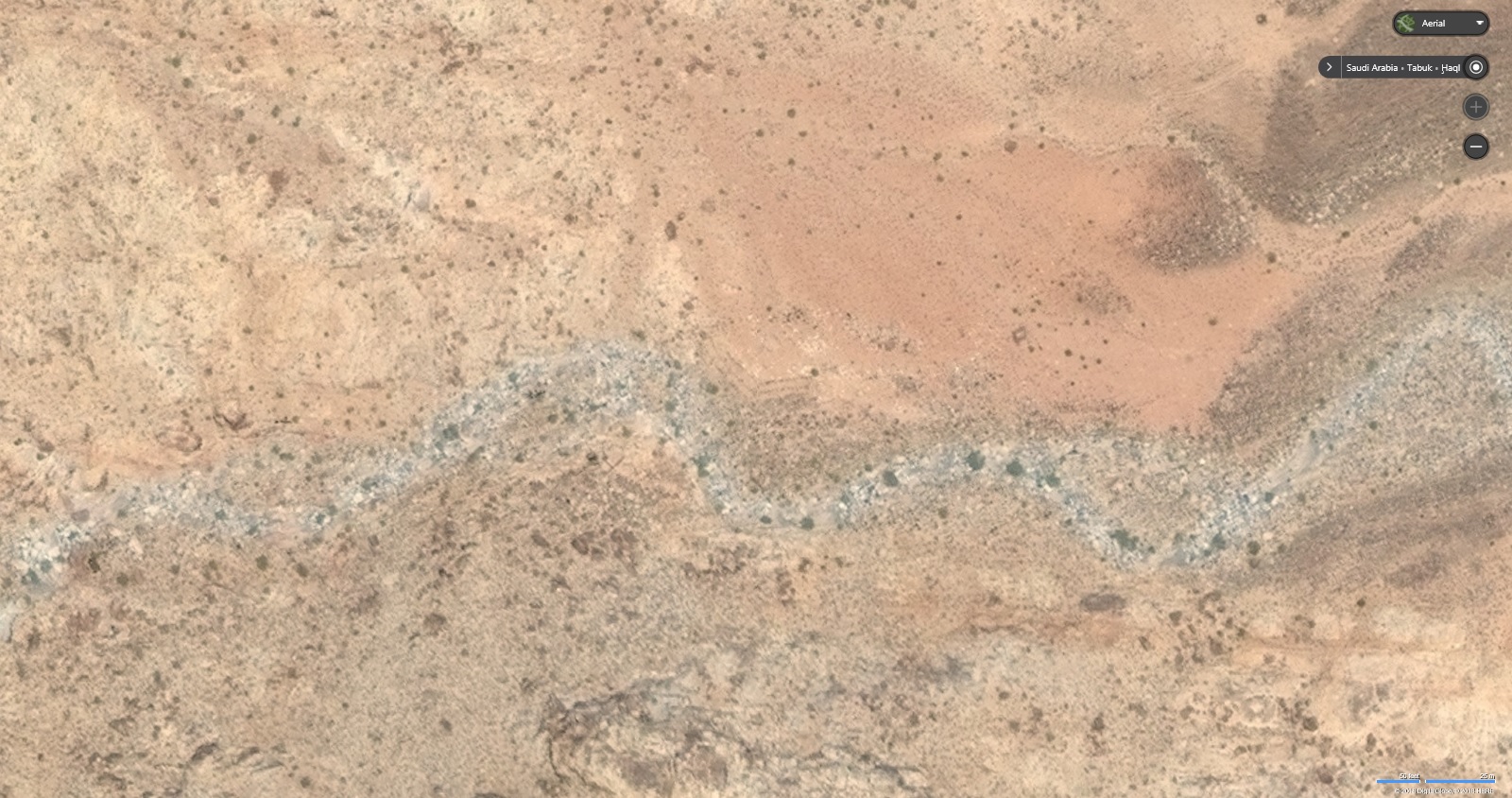
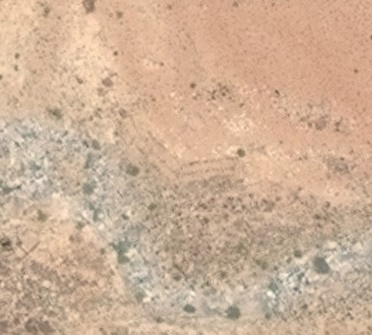
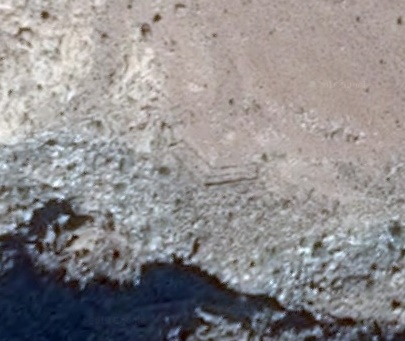
These are images of the Altar of Moses at ground level
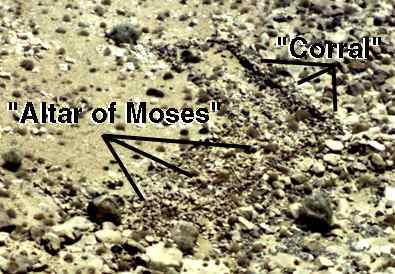
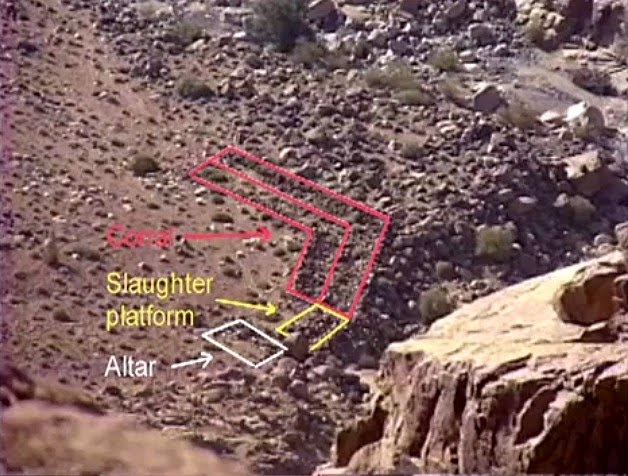
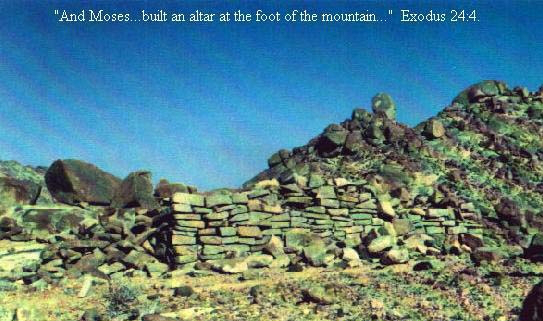
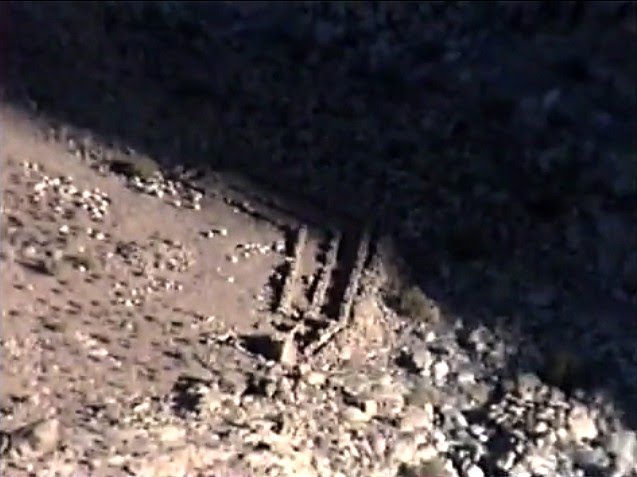
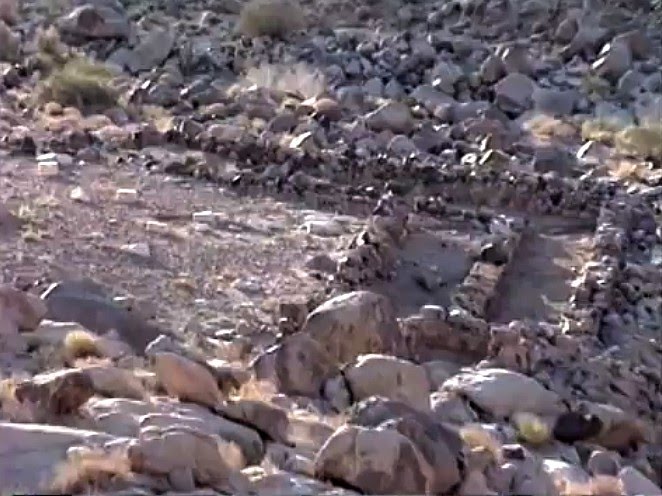
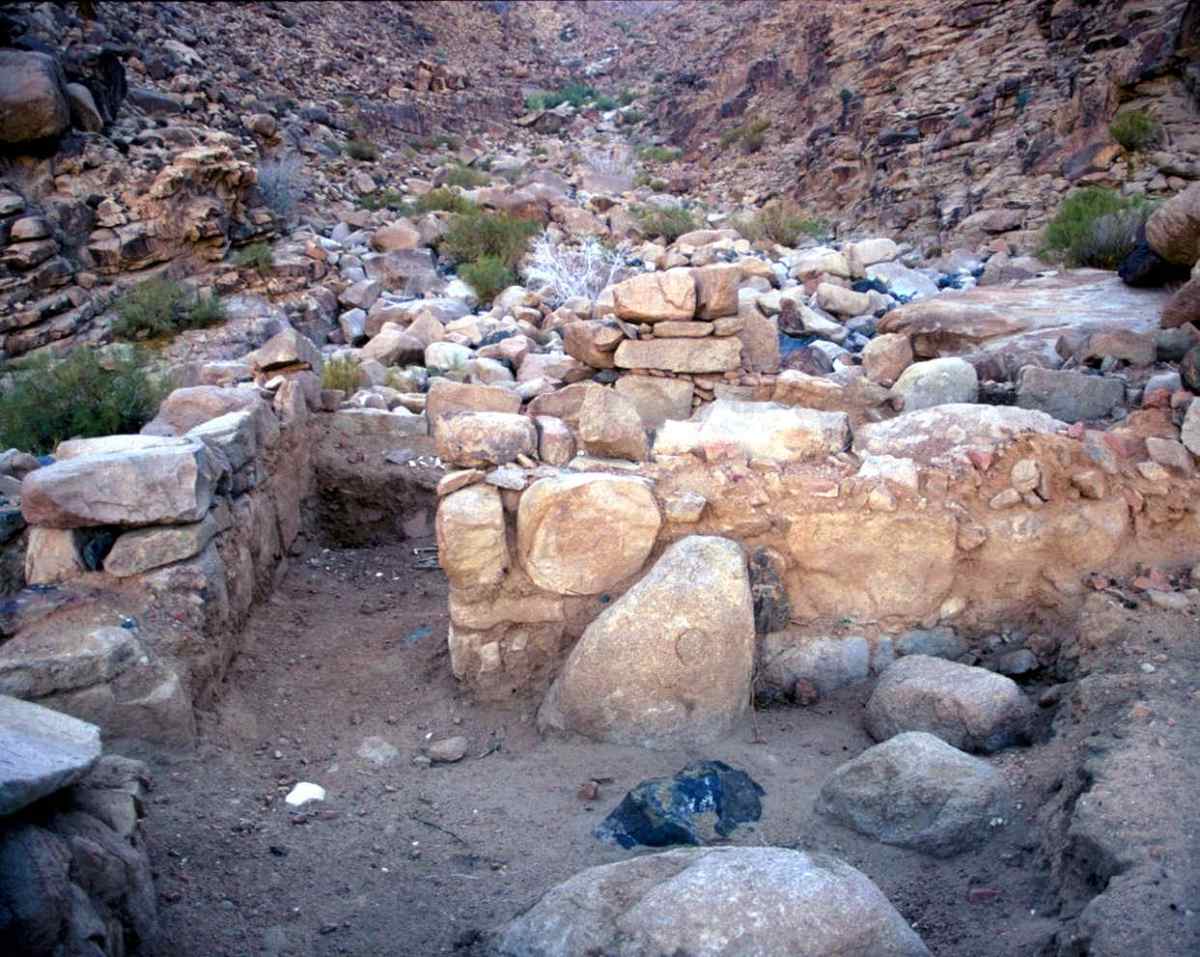
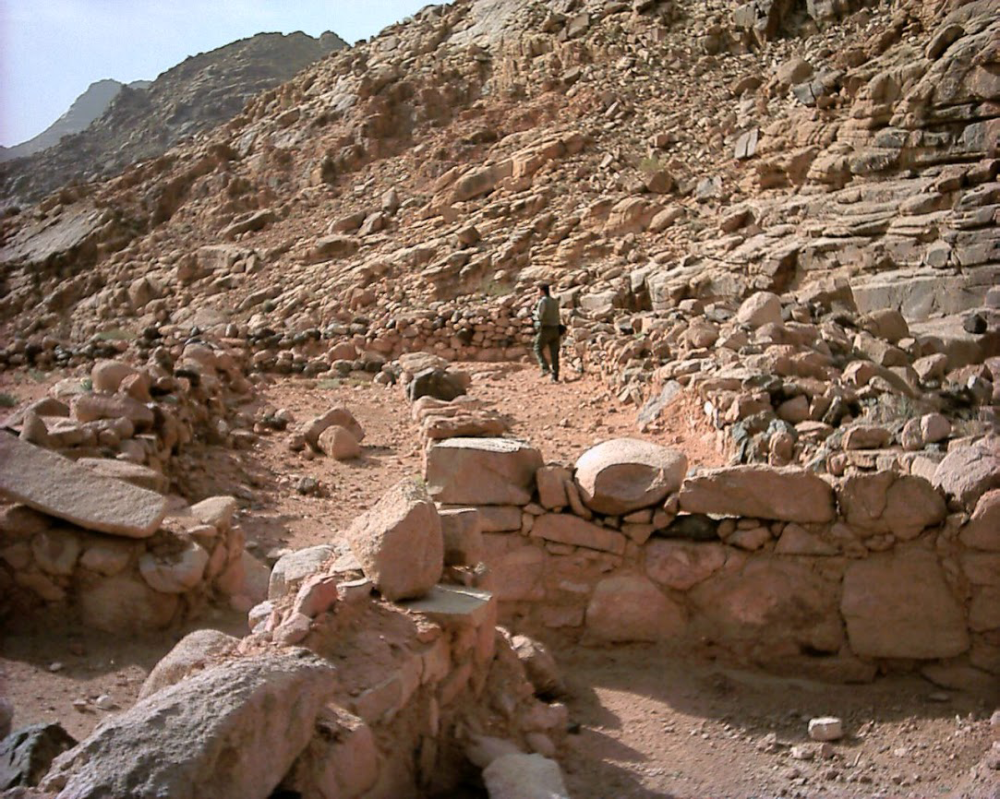
These are images from a 360 degree view at the base of Mount Sinai (Jebal al Lawz)
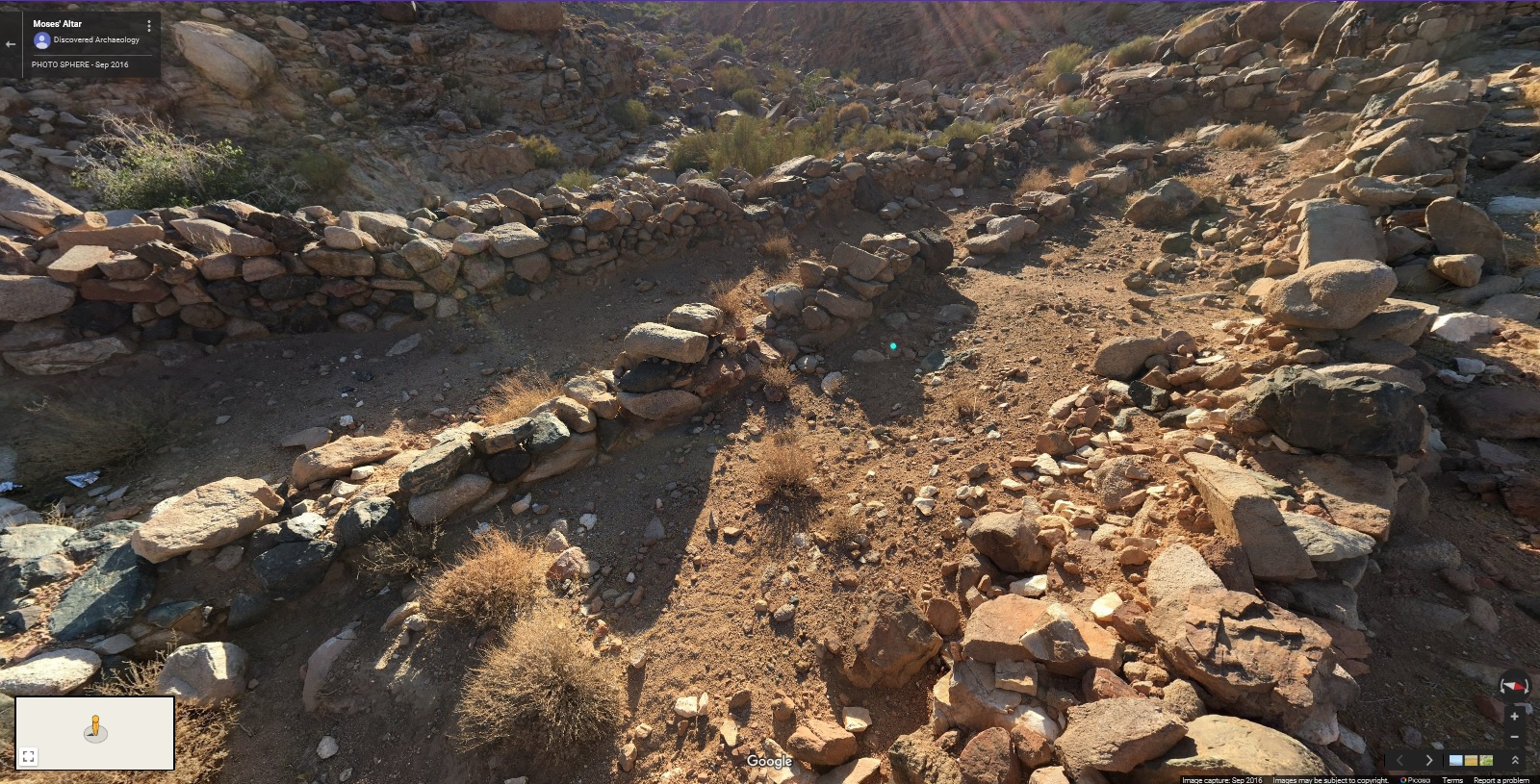
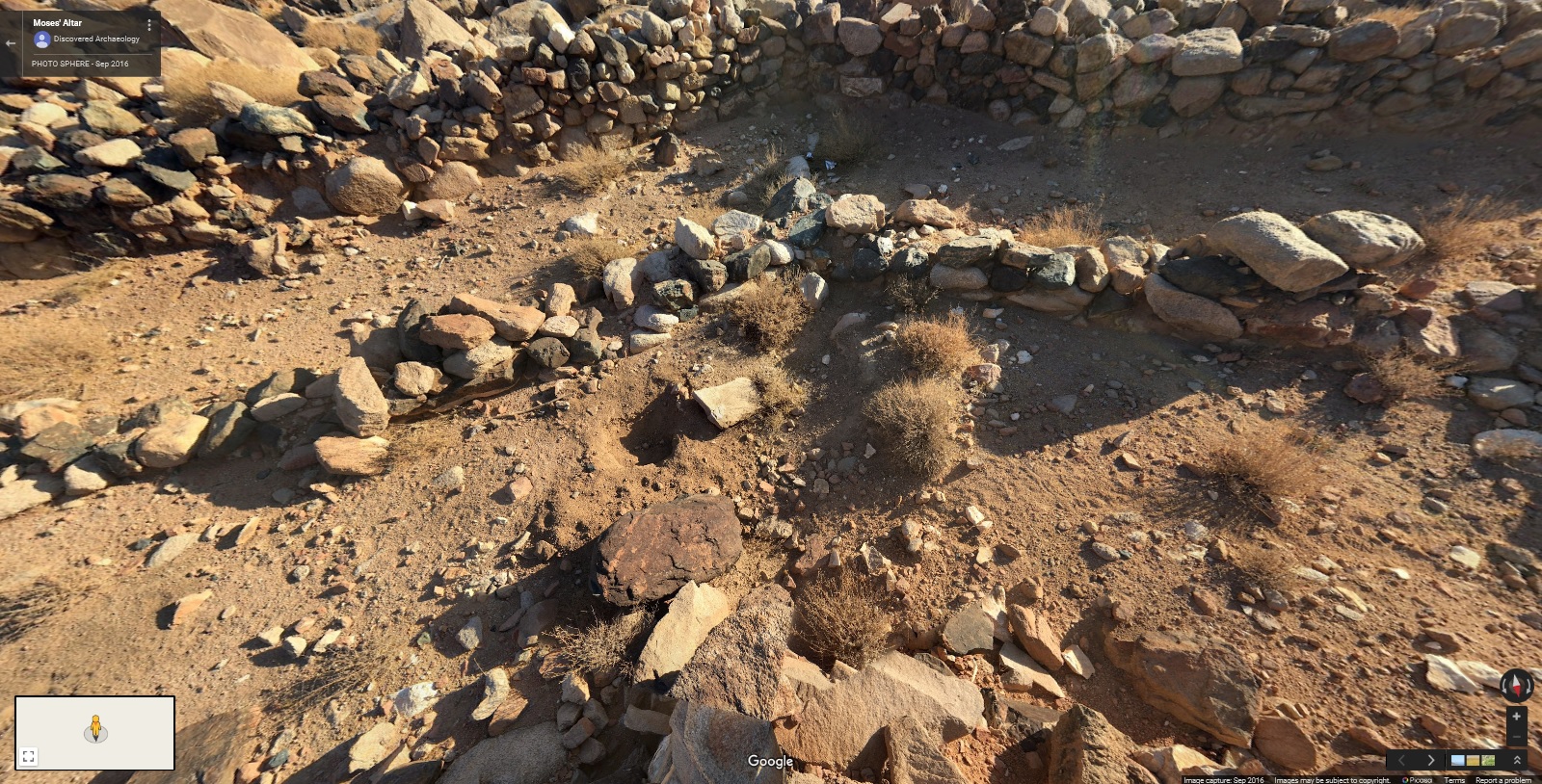
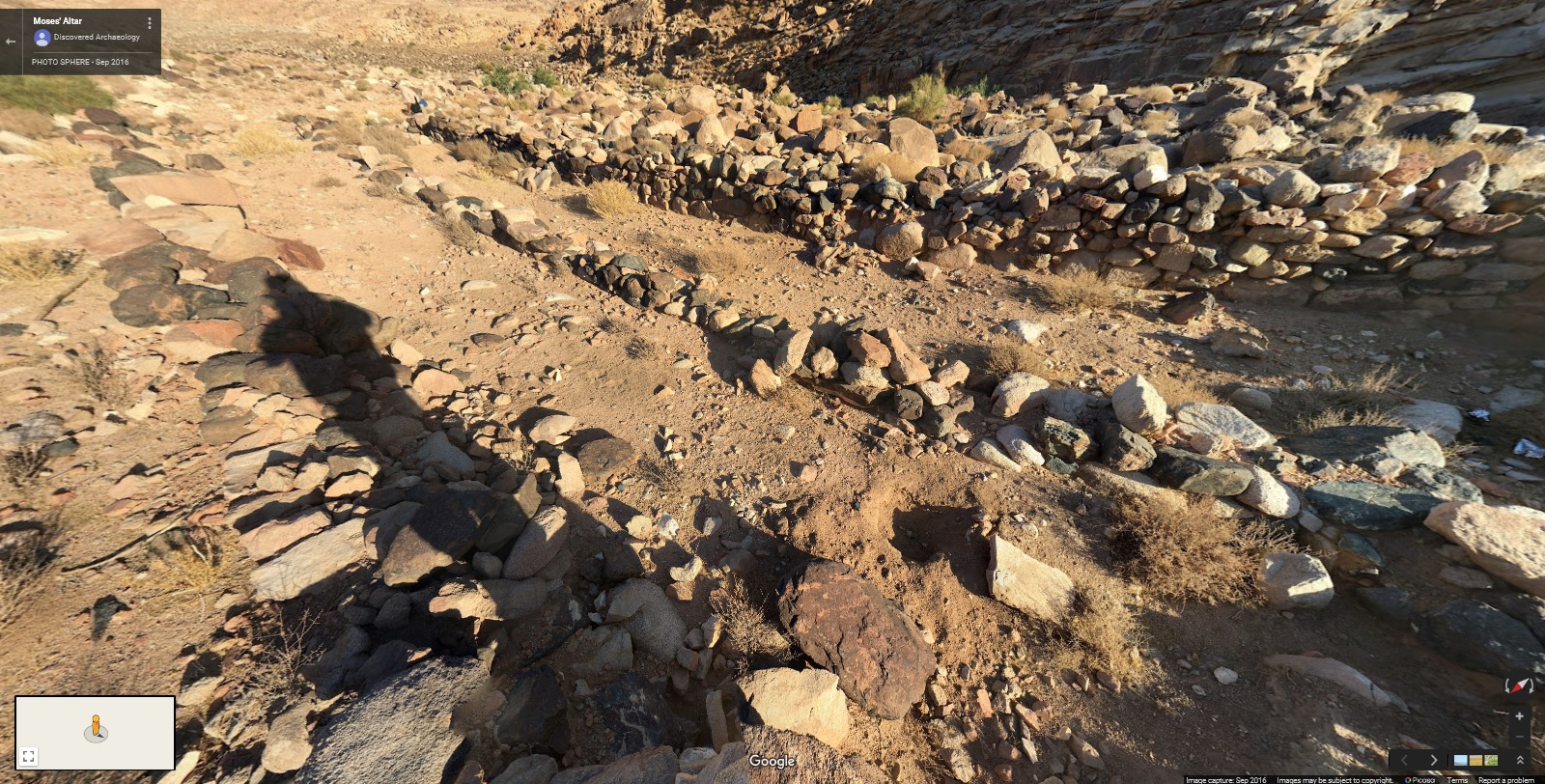
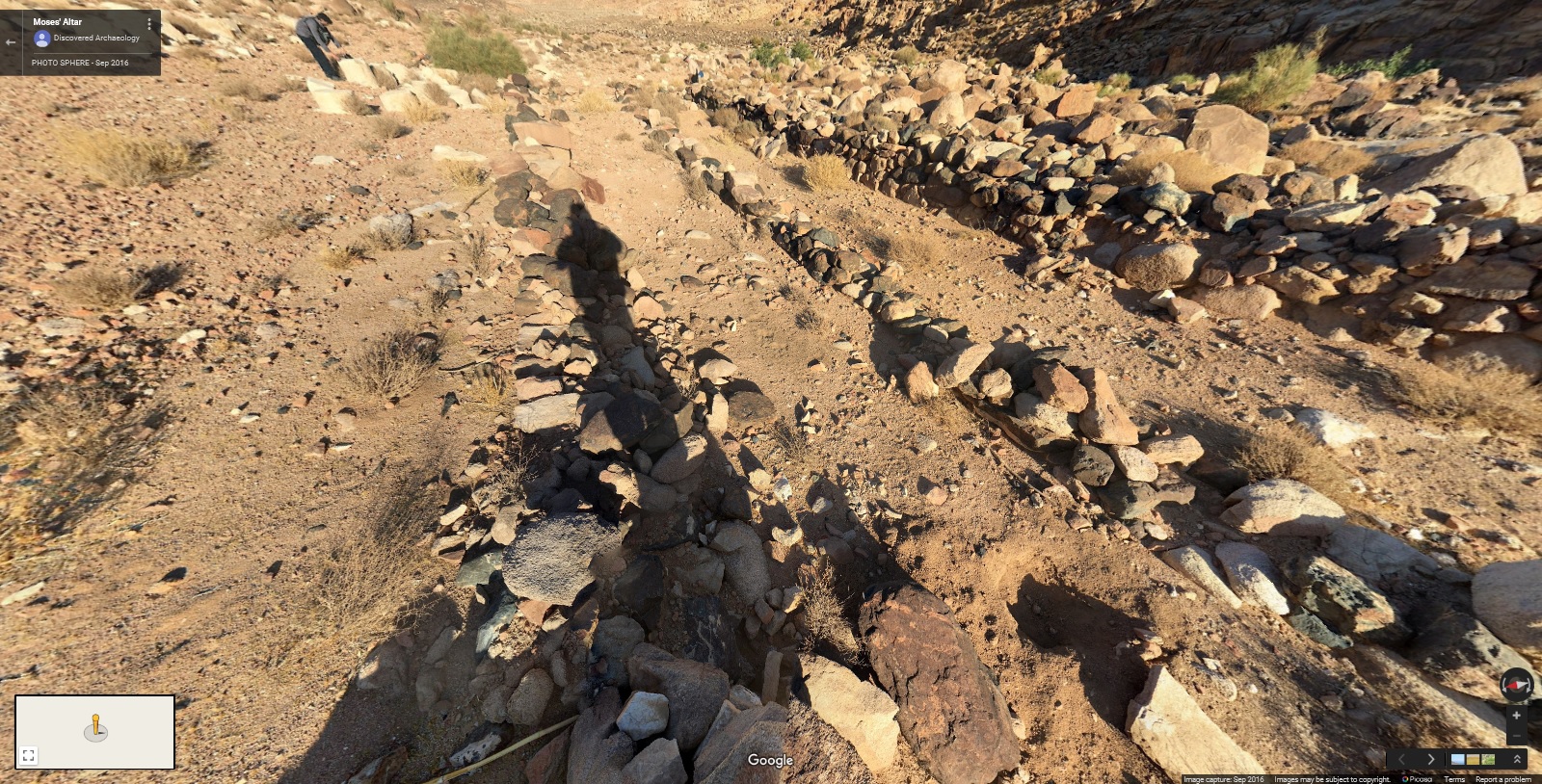
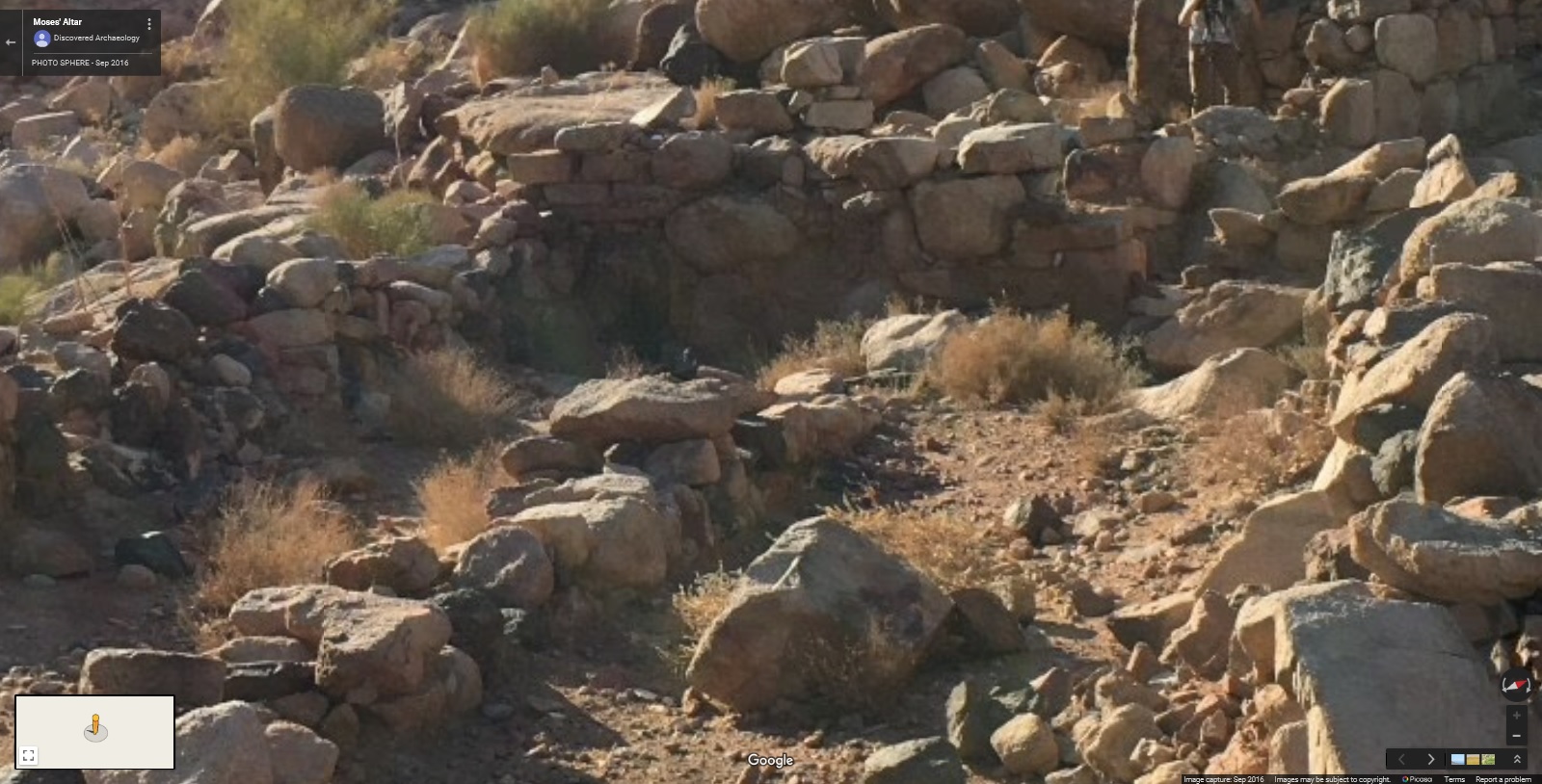
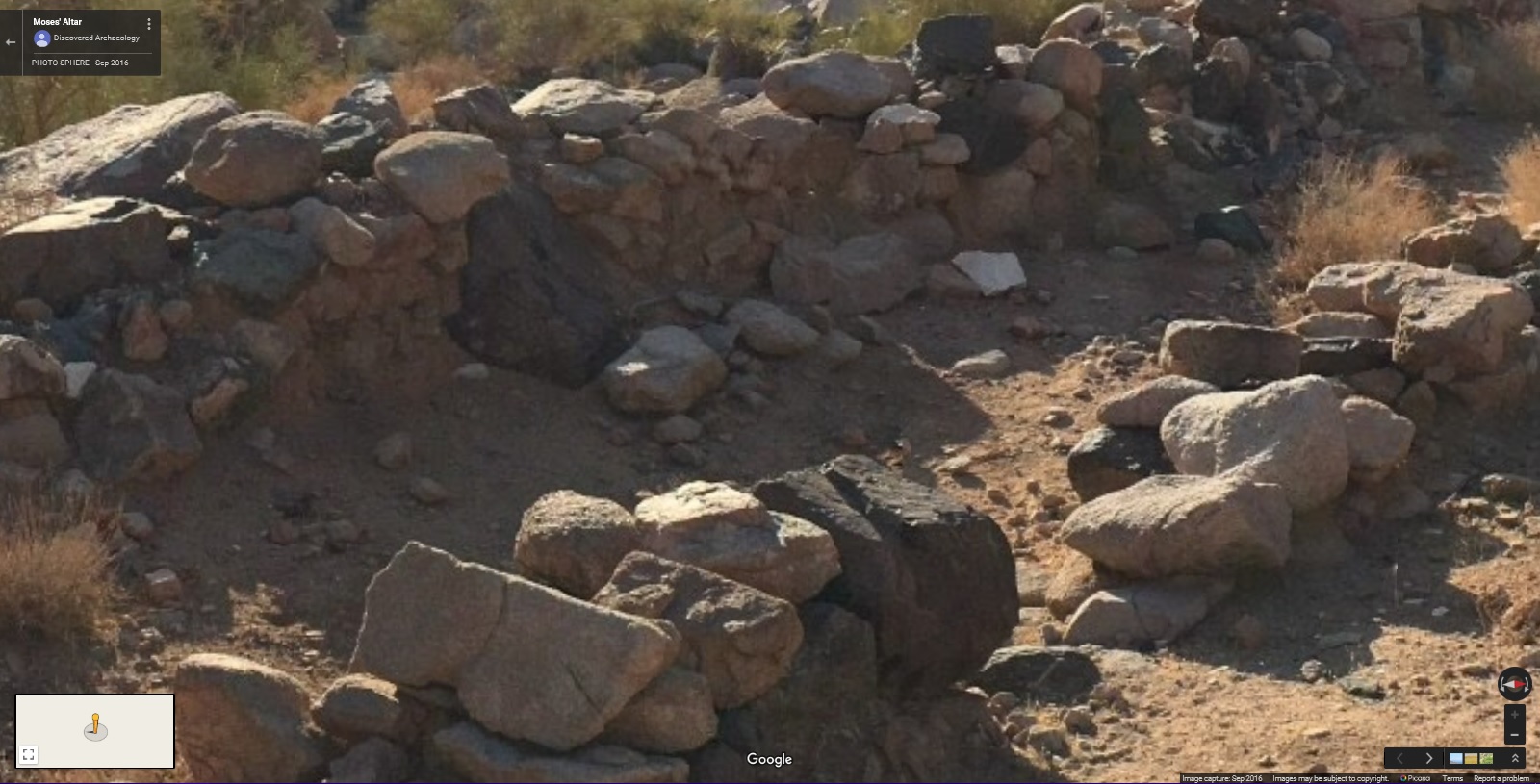
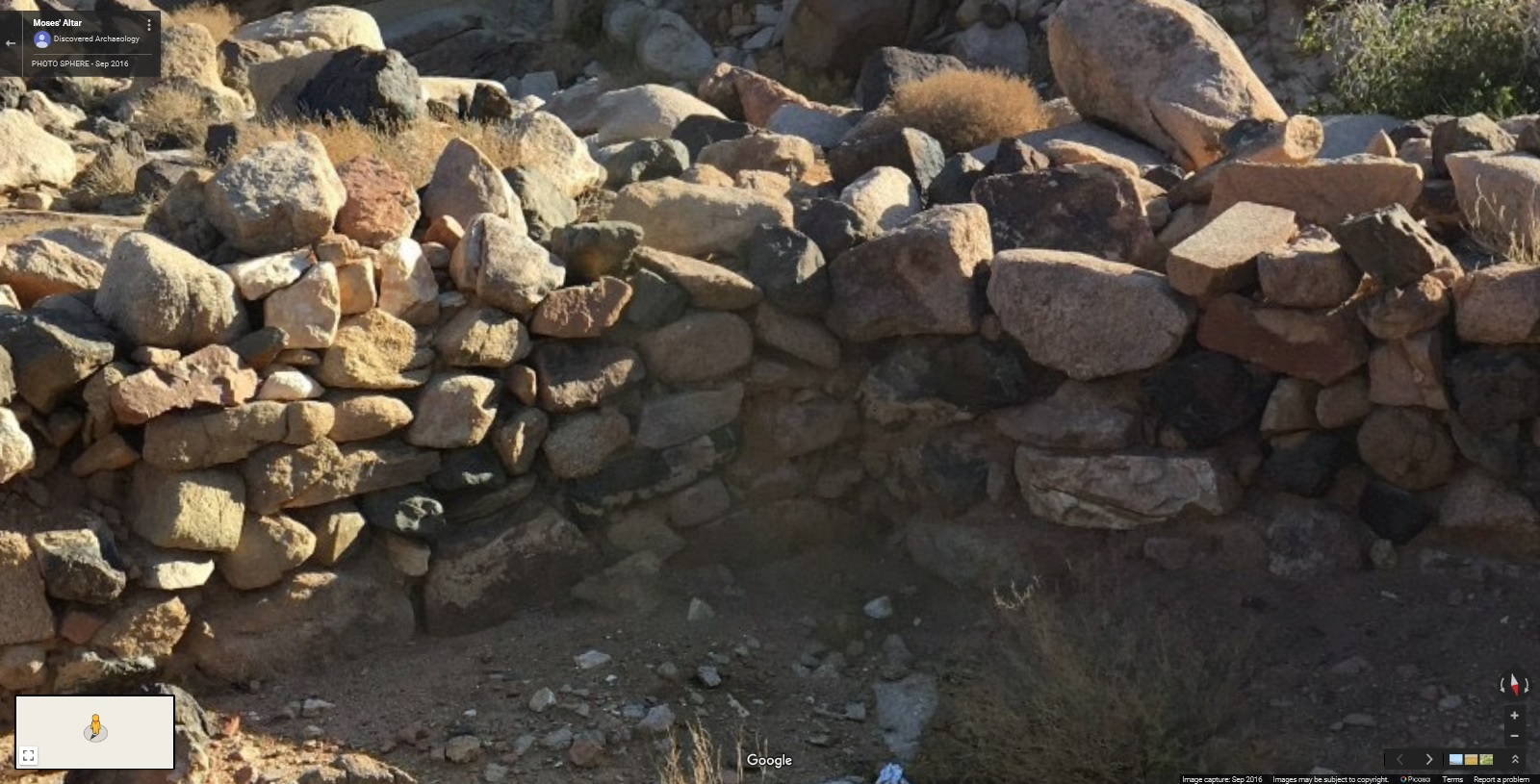
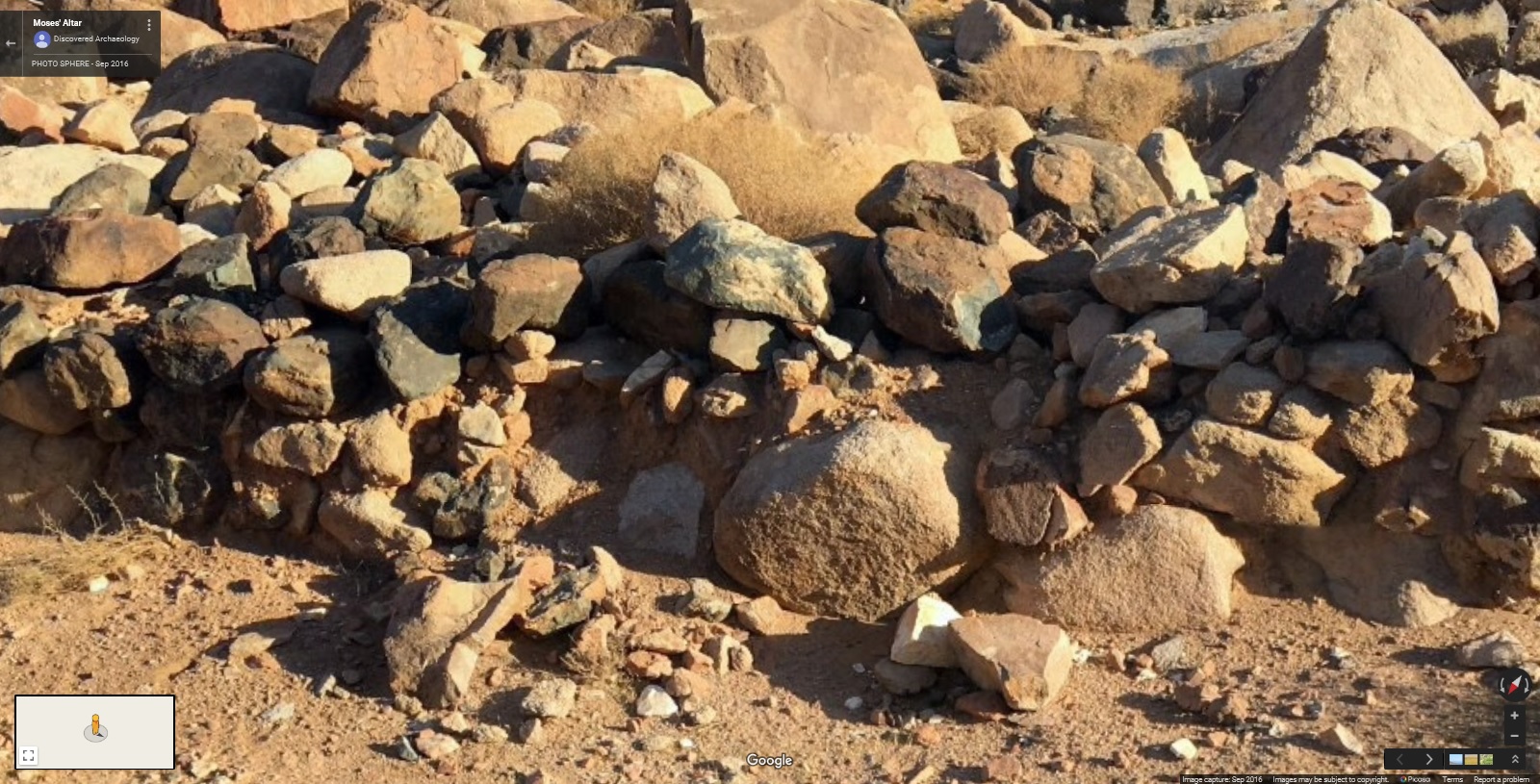
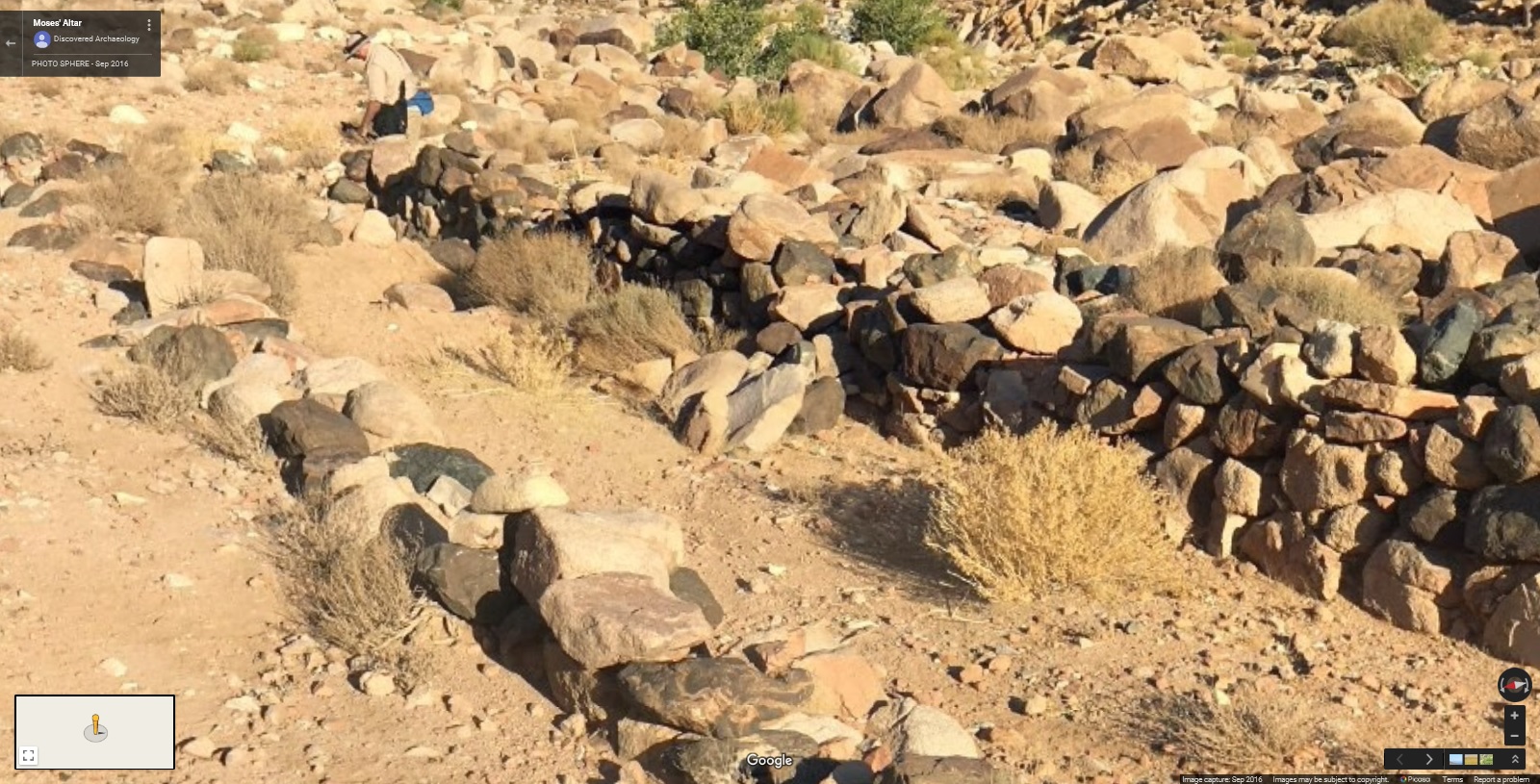
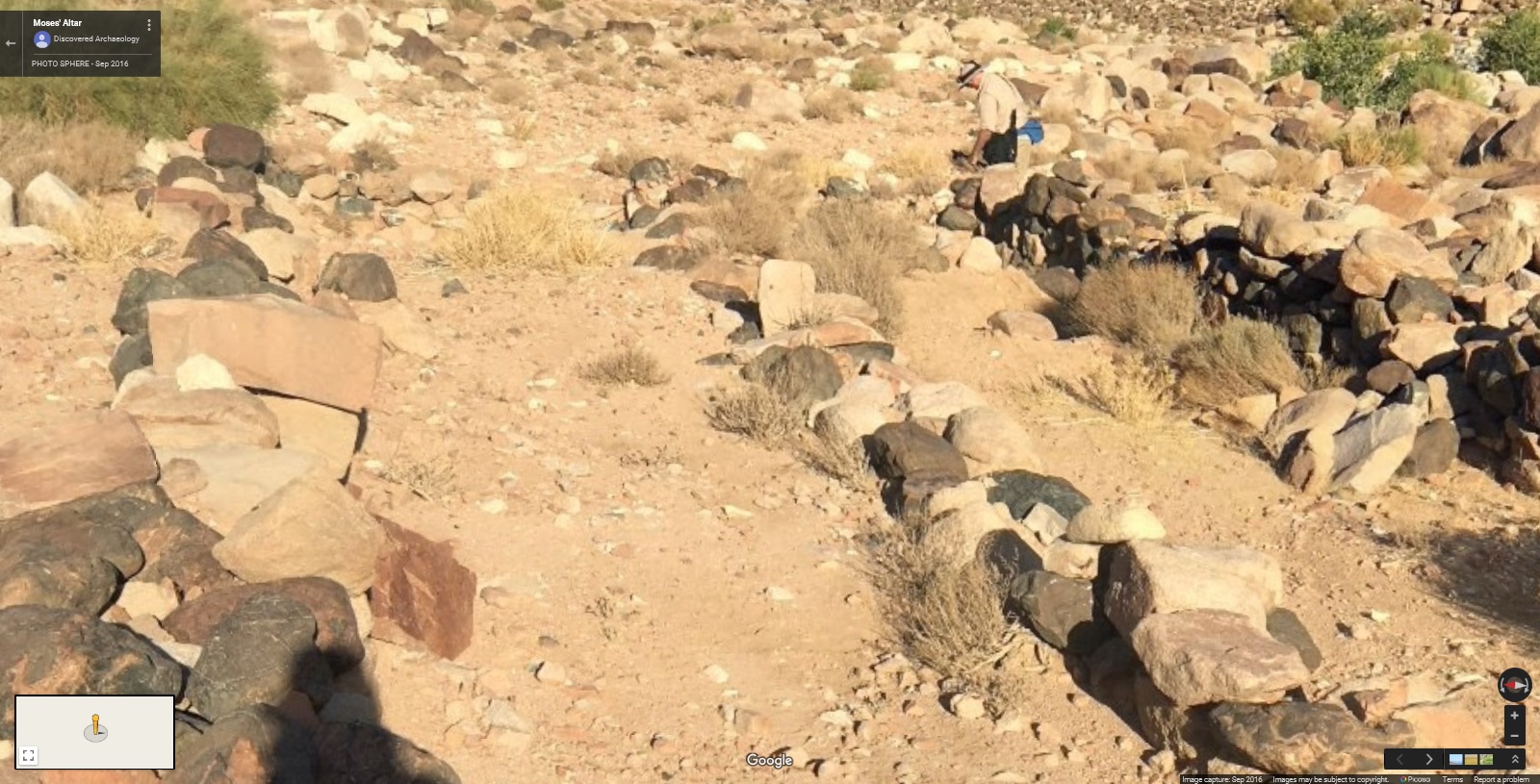
Indirectly related, today, the Jewish People in Israel are in the works of preparing an altar made of uncut stones, and it will only be a matter of time when that will occur. I don't think it will be long before this will happen. It is 2017, fifty years from the last time the Jewish People in Israel conquered a major part of the Israelite terriotry, in which case was the recapture of the eastern part of Jerusalem. There is only one piece of real estate left for the Jewish People to have complete and unlimited access, and that is "the Temple Mount" where they are to rebuild the Altar, as well as the Temple. In my humble, but very strong opinion, we are very, very close for the time of sunset to approach to begin the seven years of worldwide tribulation. This would be that time when the Jewish People in Israel will have their opportunity to build the Temple and the Altar. As of December 2018, President Trump of the United States declared Jerusalem as the capital of Israel, and this occurred during the true Biblical Jubilee Year, which is from March of 2017 until March or April of 2018, depending when the next green ear stage of the Barley is found in Israel to start the next Biblical Year. This is one step closer for the Jewish People to begin building the Third Temple.
Notice in this week's Torah portion passage that the word "them" is bold in pink. In the Hebrew text, the word them is in the feminine gender which tells us that hwhy was regarding the unhewed stones' "souls", in which the souls of the unhewed stones are "feminine". The cutting tools symbolizes the "world", which consists the "flesh", the "eyes" and the "pride of life", which is noted by the apostle John in his epistle
1 John 2:16 For all that is in the world, the lust of the flesh, and the lust of the eyes, and the pride of life, is not of the Father, but is of the world.
The unhewed stones for the Altar are symbolized us as believers in Yeshua, so that His Word, who is "Yeshua" can speak in our lives.
!!!hwhy Kl dbk
Verse twenty six
26 And you will not ascend on elevated steps (elevated stairs) upon My Altar, that you will not uncover (expose, exile) your nakedness upon him.
It was explained later what the Priests were to wear breeches to cover their nakedness, which is noted in the Torah portion of T'tsavveh, in the book of Exodus
Exodus 28:40 And for the sons of Aaron, you shall do (make) Coats (Tunics), and you shall do (make) for them Girdles, and you shall do (make) for them Bonnets for glory and for ornamentalness (gleamness, beauty). 41 And you shall clothe them, ta-Aaron your brother, and ta-his sons with him; and you shall anoint them, and you shall fill (consecrate) ta-their hands, and you shall sanctify them, and they shall do the Priestship (Priestly Acts) for Me. 42 And you shall do (make) for them Breeches of bahd-linen (flax) to cover (conceal) the flesh of the nakedness; they shall be from their waist and unto their thighs (testacles): 43 And they shall be upon Aaron and upon his sons in their entering to the Tent of Appointment, or in their approaching to the Altar to minister in the Sacred Area (Holy Area); and they shall not bear (carry, lift up) iniquity, and they would die: A Statute of Ages to him and to his seed after him.
There was a reason hwhy said to consecrate their hands, because it is their hands that would do the work for hwhy's Service.
Indirectly related, the apostle Paul noted that hwhy used His hands in the beginning, which is located in the book of the Hebrews
Hebrews 1:10 And, Thou, hwhy, in the beginning hast laid the foundation of the earth; and the heavens are the Works of Thine Hands:
Hebrews 2:6 But one in a certain place testified, saying, What is man, that thou art mindful of Him? Or the Son of Man, that thou visitest Him? 7 Thou madest him a little lower than the angels; Thou crownedst Him with Glory and Honour, and didst set Him over the Works of Thy Hands:
hwhy made man and the heavens and the earth through the Works of His Hands- an act from the heavens to the earth, and now, hwhy required Priests use their hand for His Service- an act from the earth to the heavens. This is done, so that the works of the hands would come back full cycle. This is the same demand our Heavenly Father requires us as believers to do by using our hands for His Service, because we are Priests in the Messiah, which is apostle John noted in the book of Revelation
Revelation 1:5 And from Yeshua the Messiah, who is the Faithful Witness, and the First Begotten of the Dead, and the Prince of the Kings of the Earth. Unto Him that loved us, and washed us from our sins in His own Blood, 6 And hath made us kings and priests unto hwhy and His Father; to Him be Glory and Dominion for ever and ever. Amen.
Revelation 5:7 And He came and took the book out of the Right Hand of Him that sat upon the Throne. 8 And when He had taken the Scroll, the four beasts and four and twenty elders fell down before the Lamb, having every one of them harps, and golden vials full of odours, which are the prayers of Saints. 9 And they sung a new song, saying, Thou art worthy to take the Scroll, and to open the seals thereof: for Thou wast slain, and hast redeemed us to hwhy by Thy Blood out of every kindred, and tongue, and people, and nation; 10 And hast made us unto our Elohim kings and Priests: and we shall reign on the earth.
We are all Priests unto our Heavenly Father, and our nakedness has been covered by the Blood of the Lamb.
!!!hy wllh
!!!hwhy Kl dbk
That ends this week's Torah portion commentary.
Any questions or comments can be written to
the.aleph-tav.project@msn.com
SHABBATH SHALOM

_______________________________________________________________________________________________________________________________________________
_______________________________________________________________________________________________________________________________________________
Copyright 2014 The Aleph-Tav Project - NVU's Website Design Software by The Premier Group